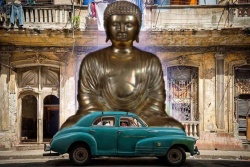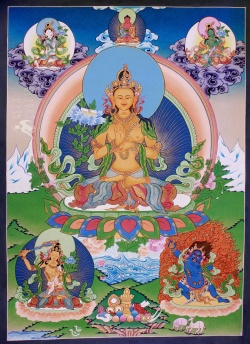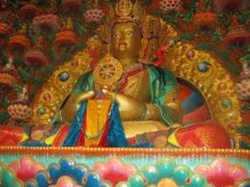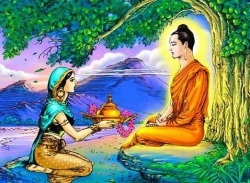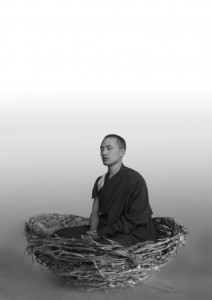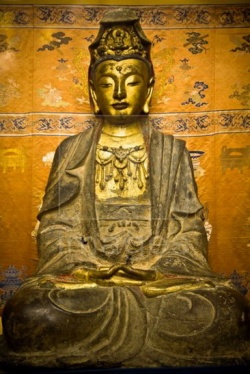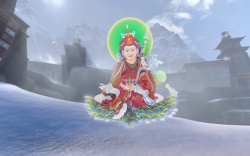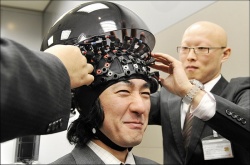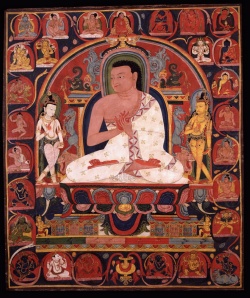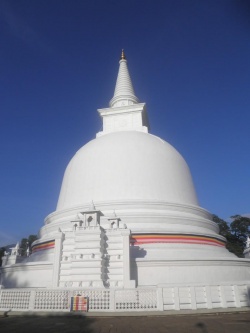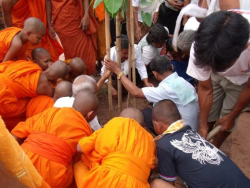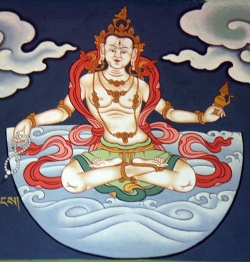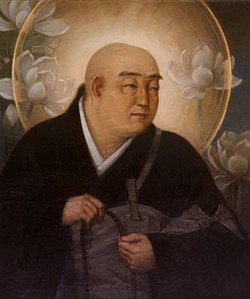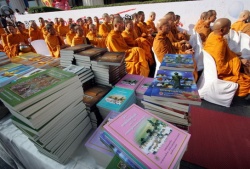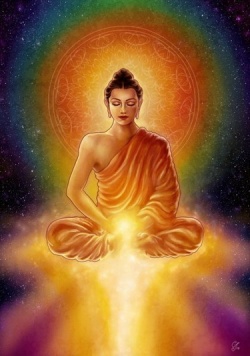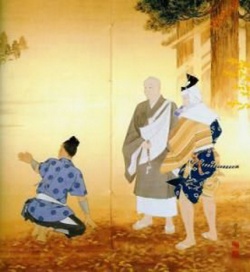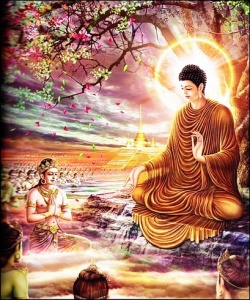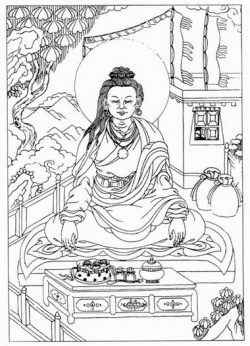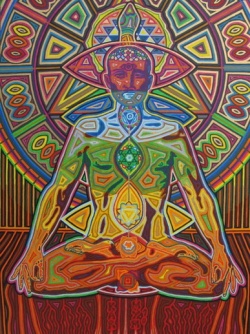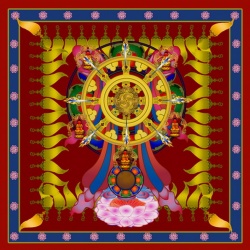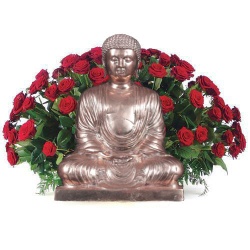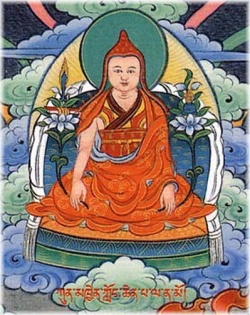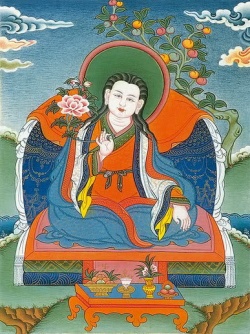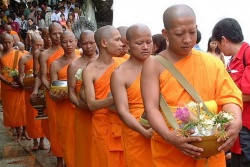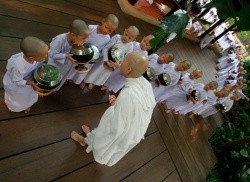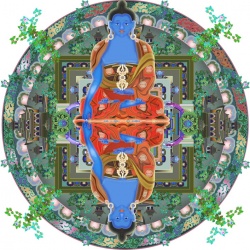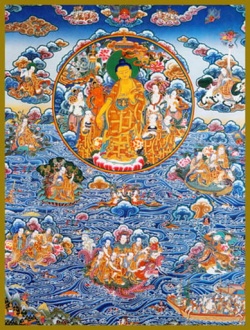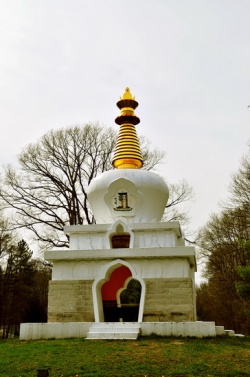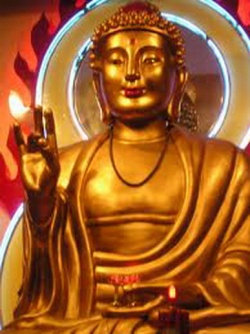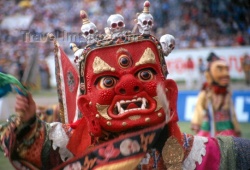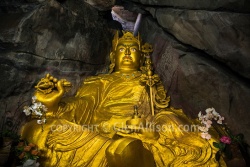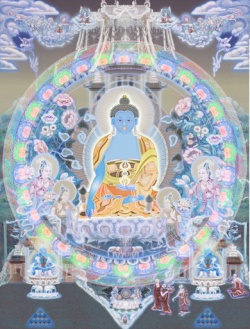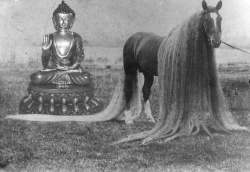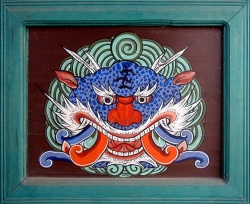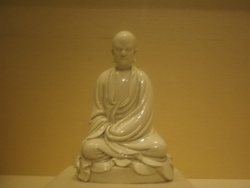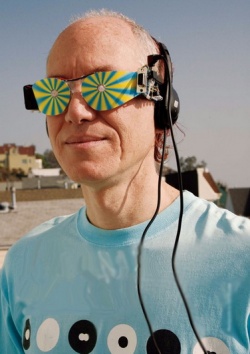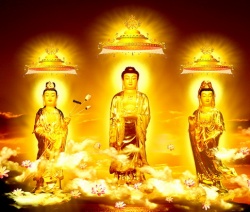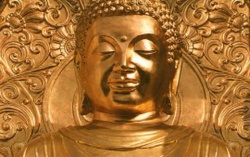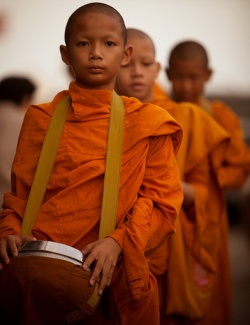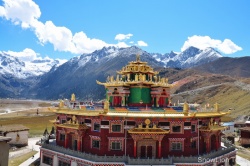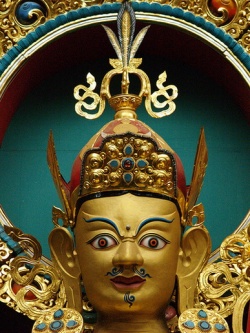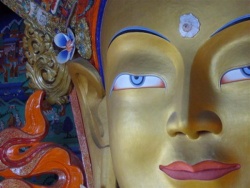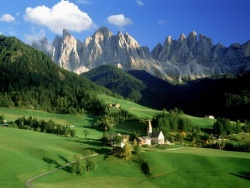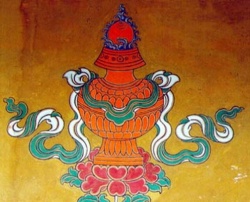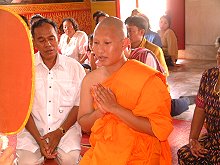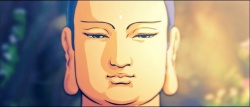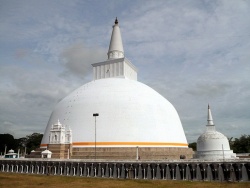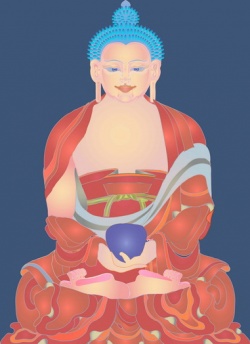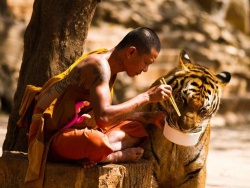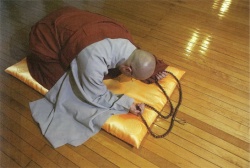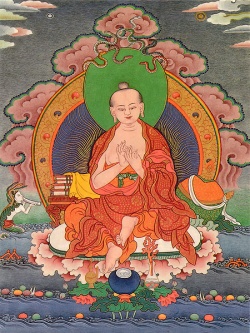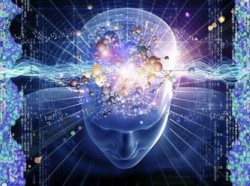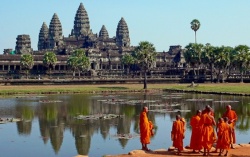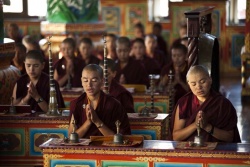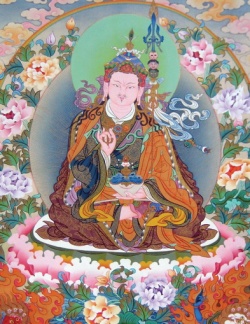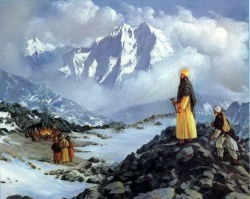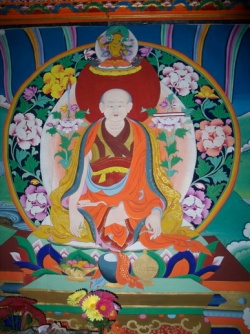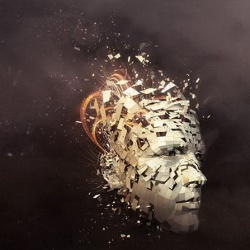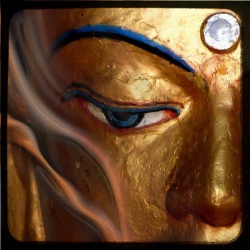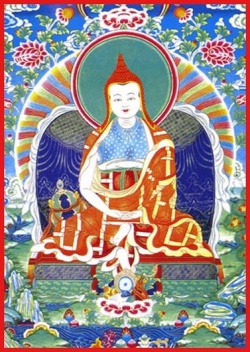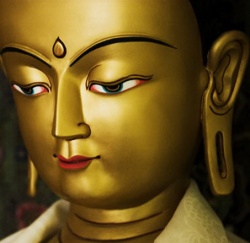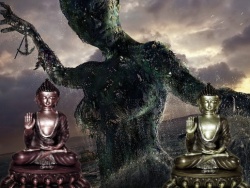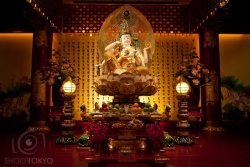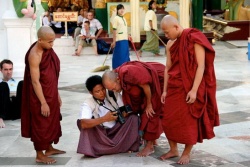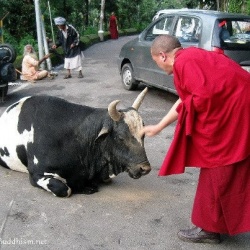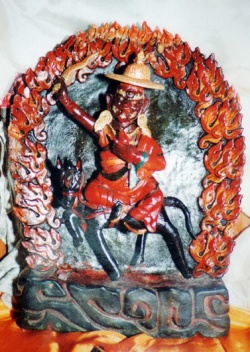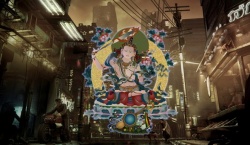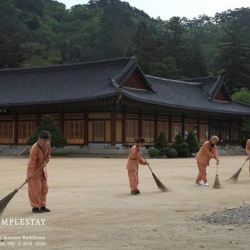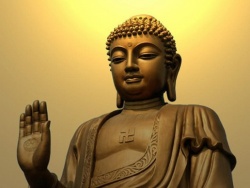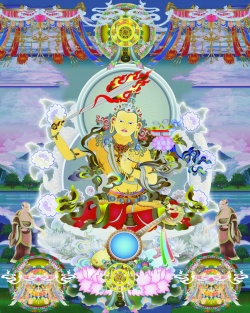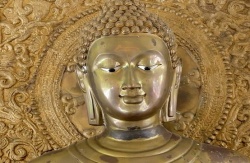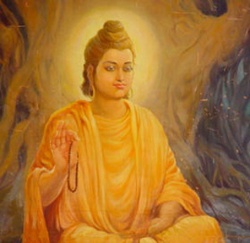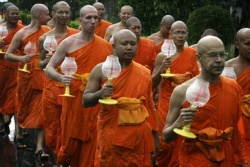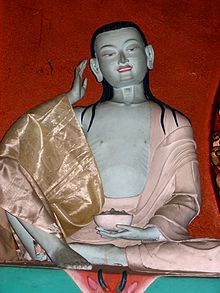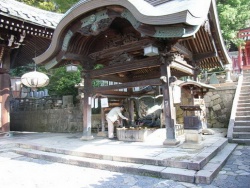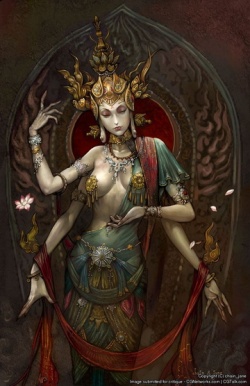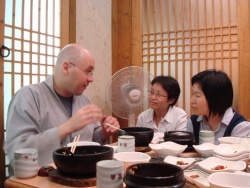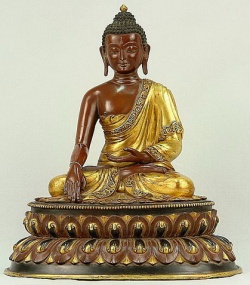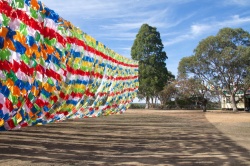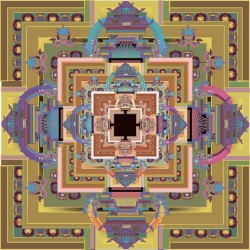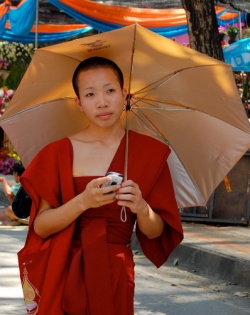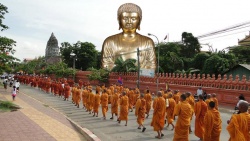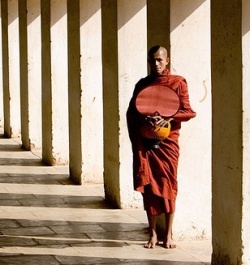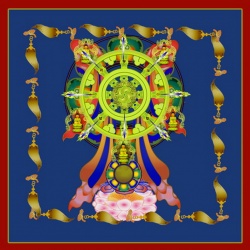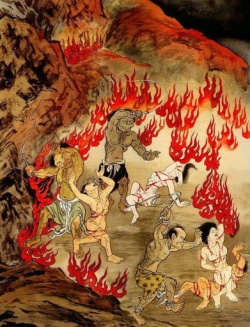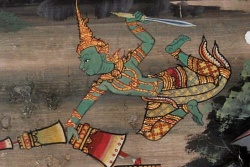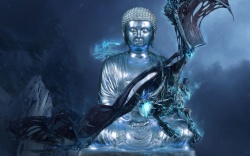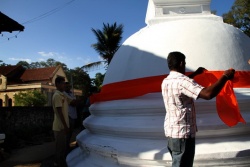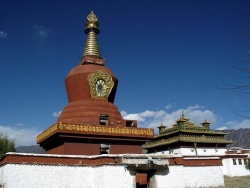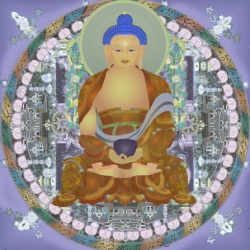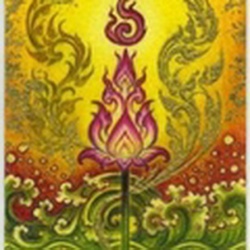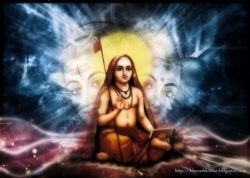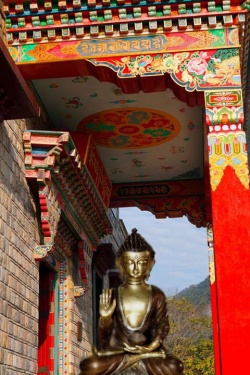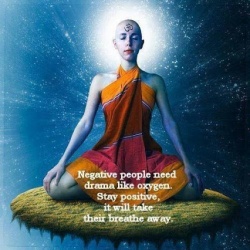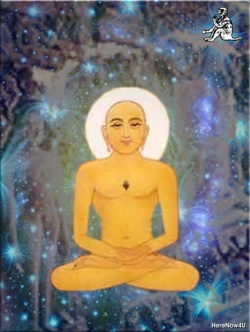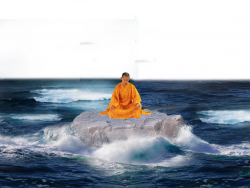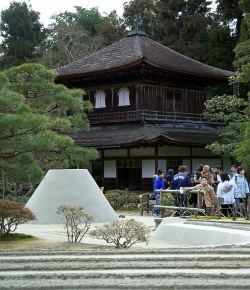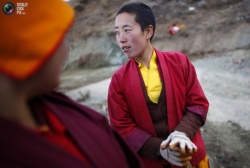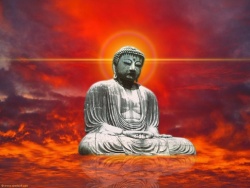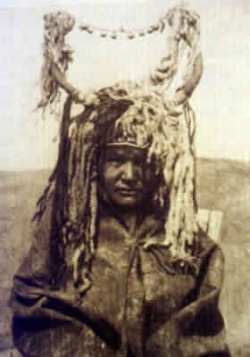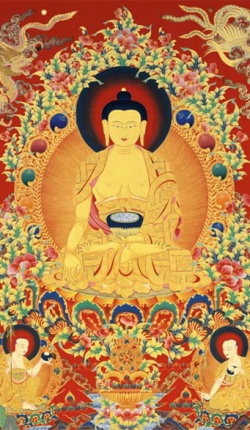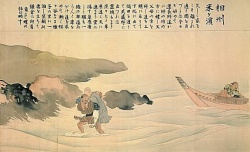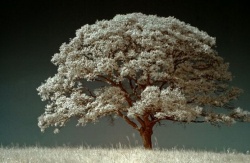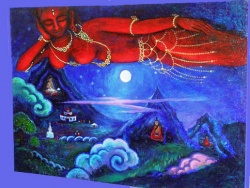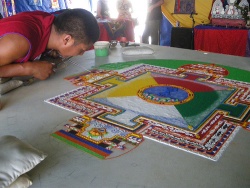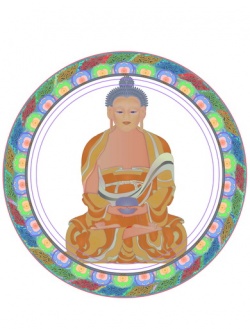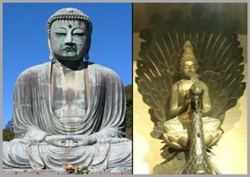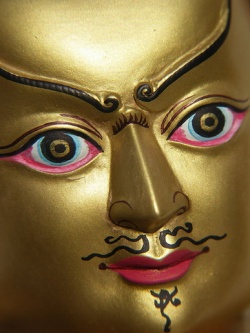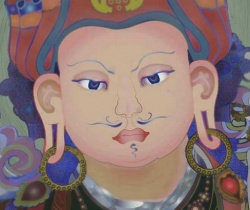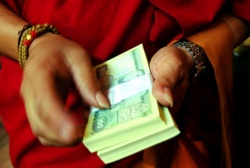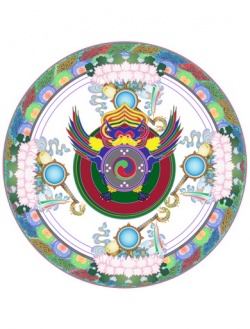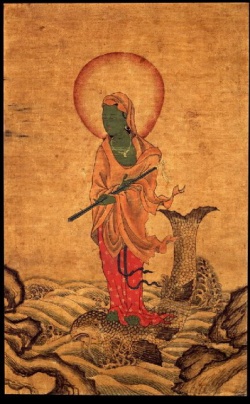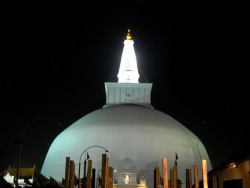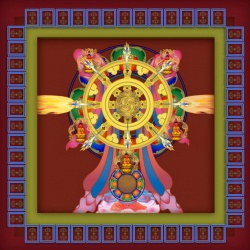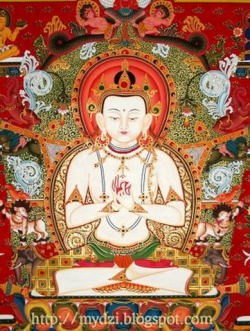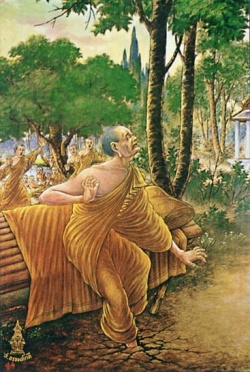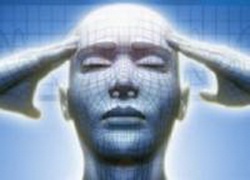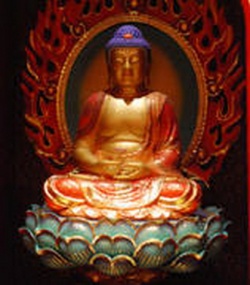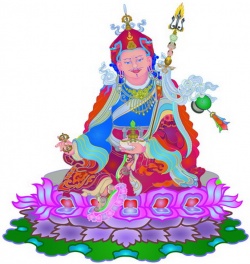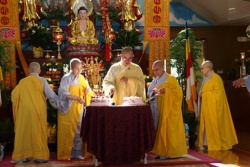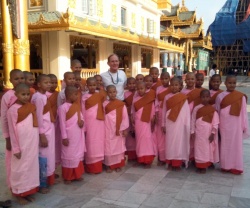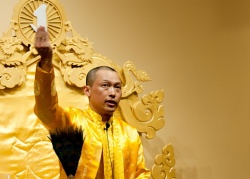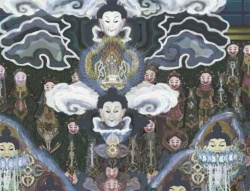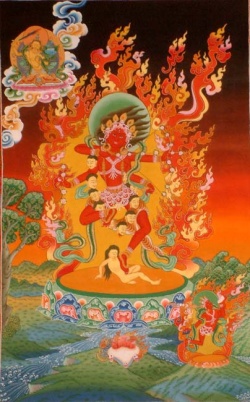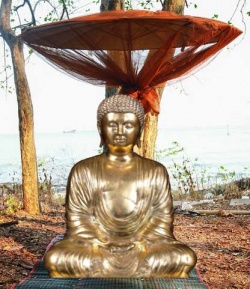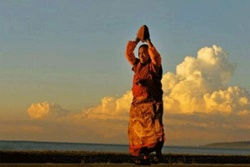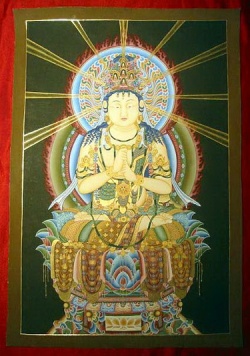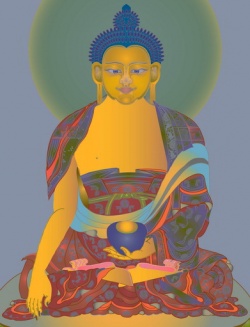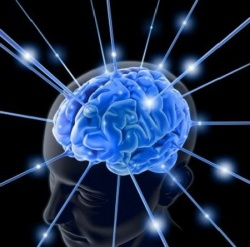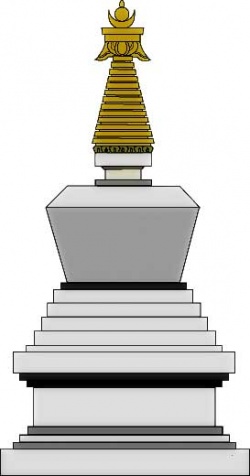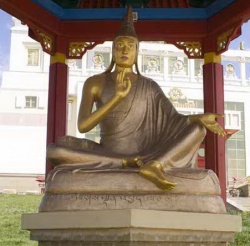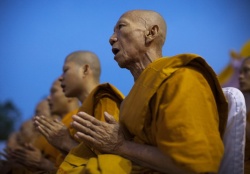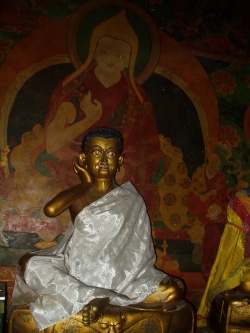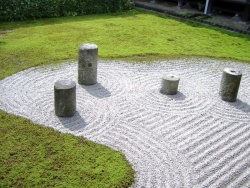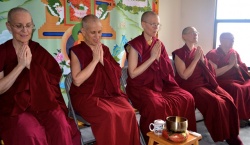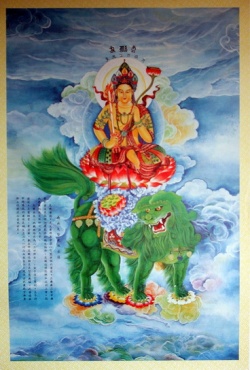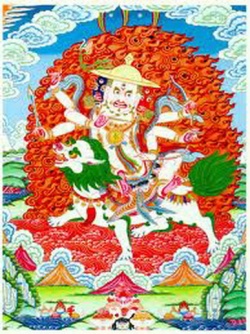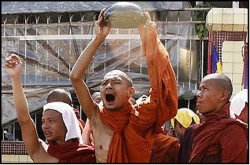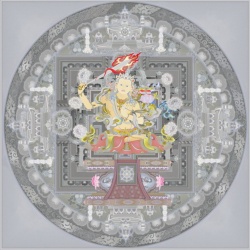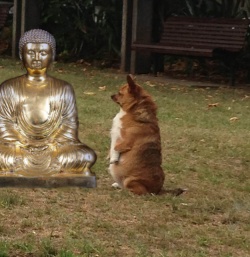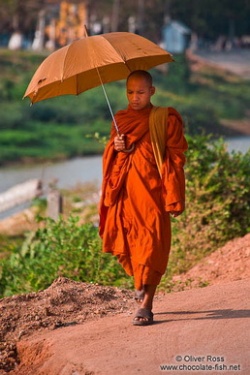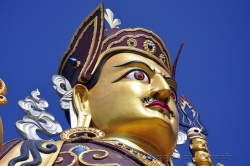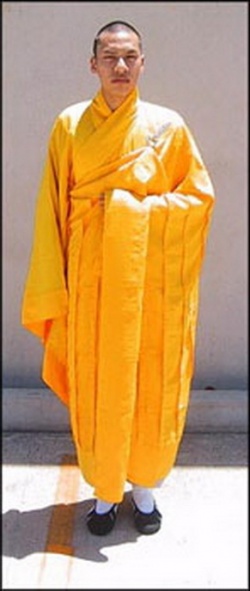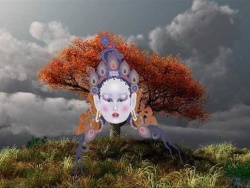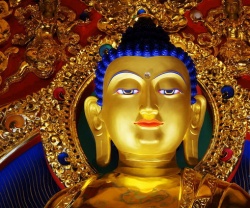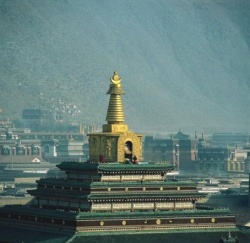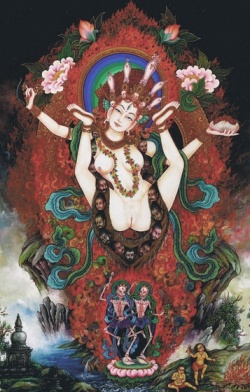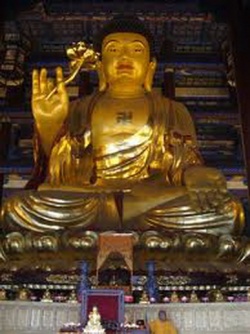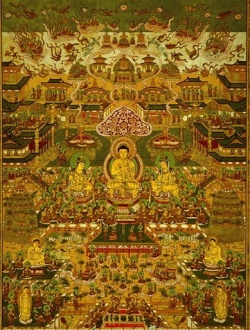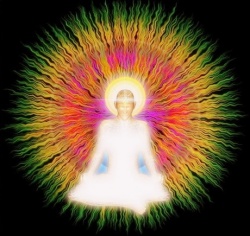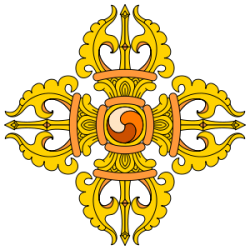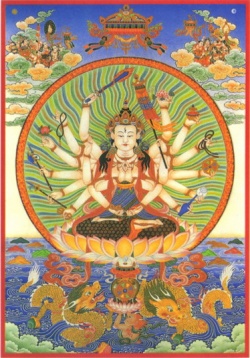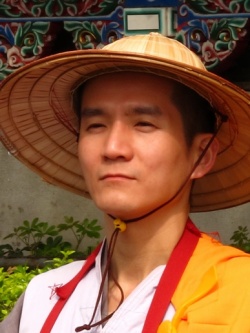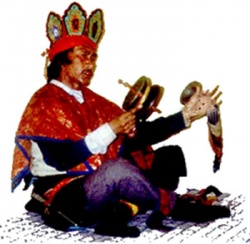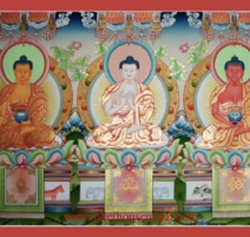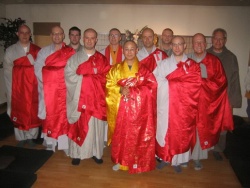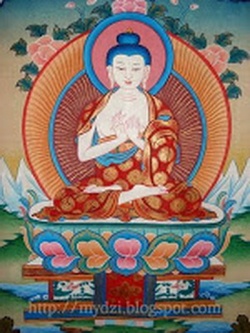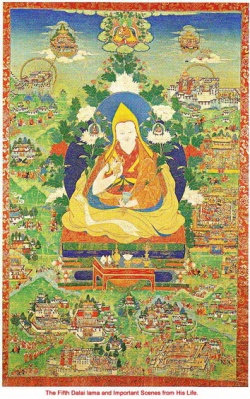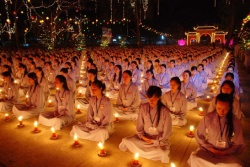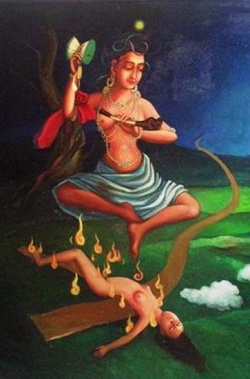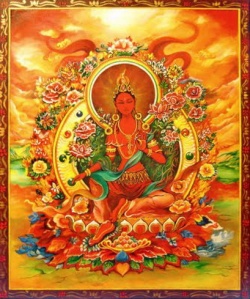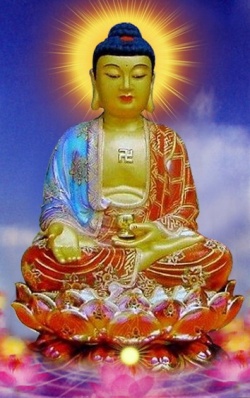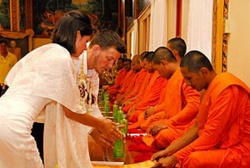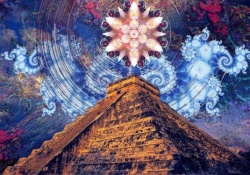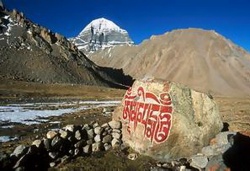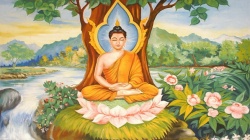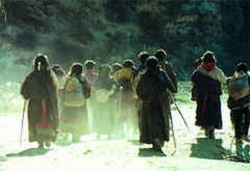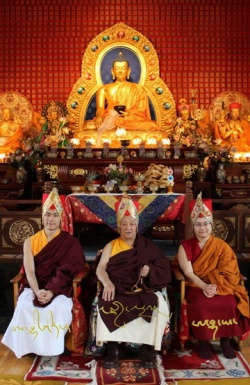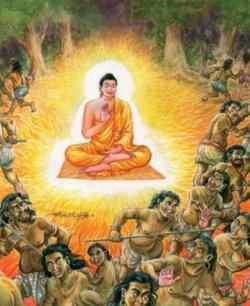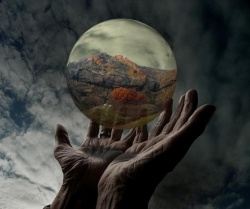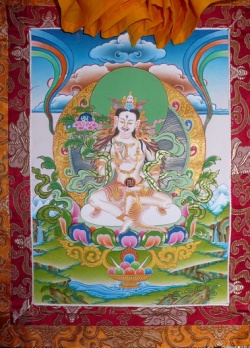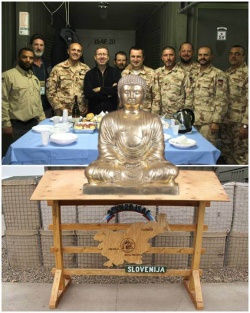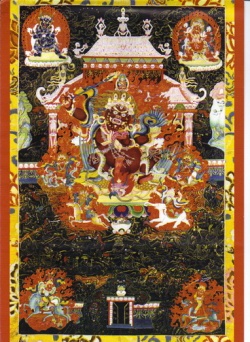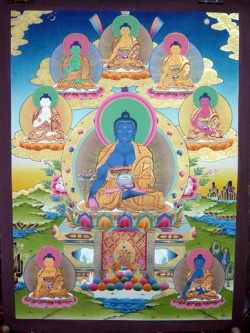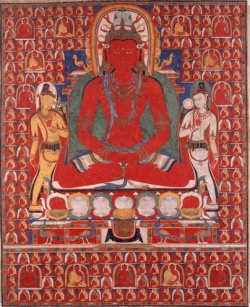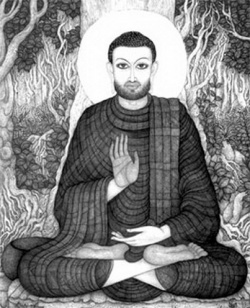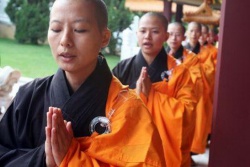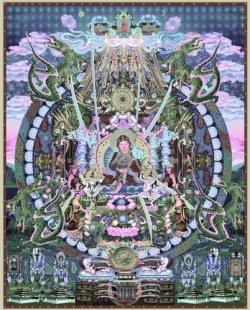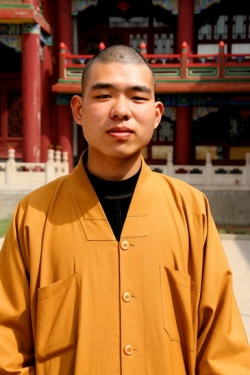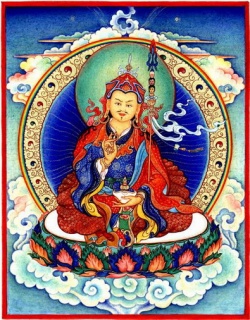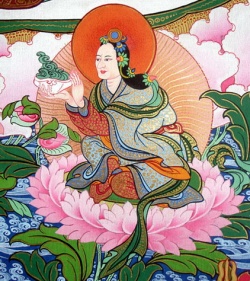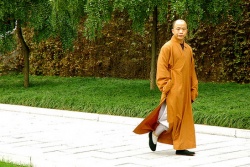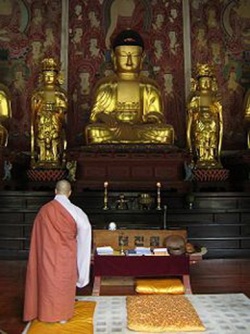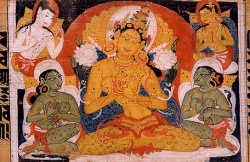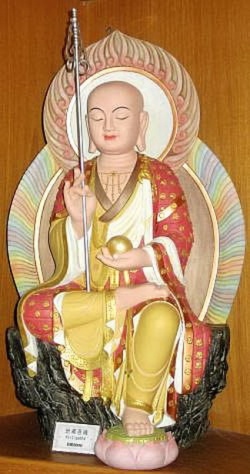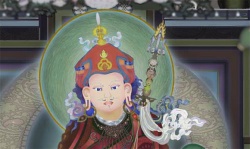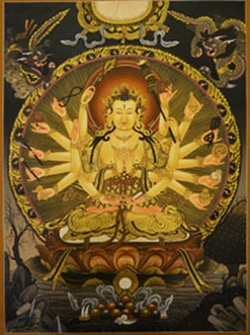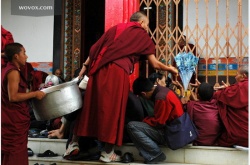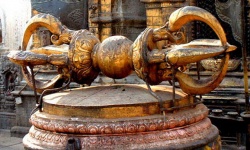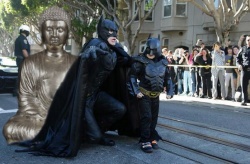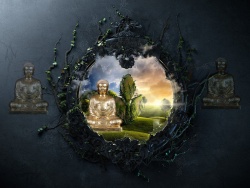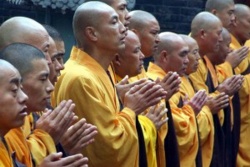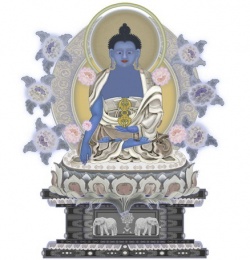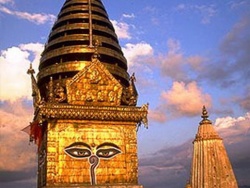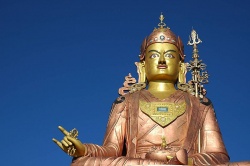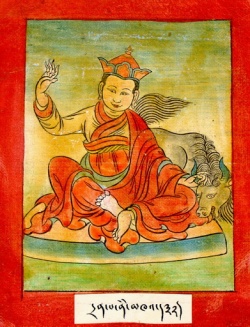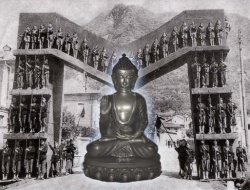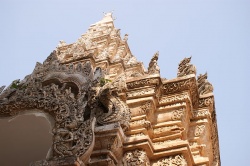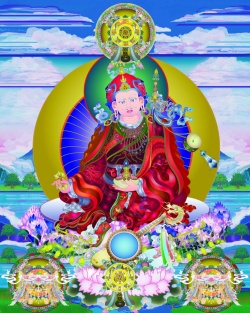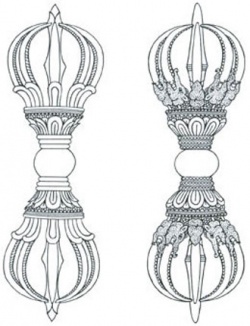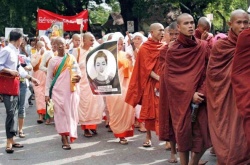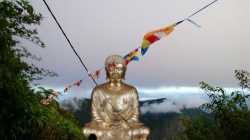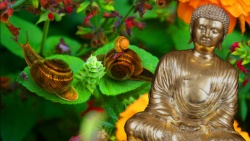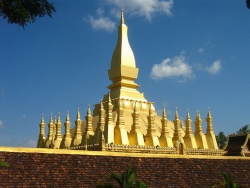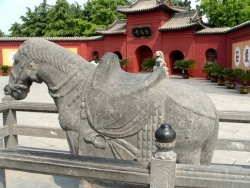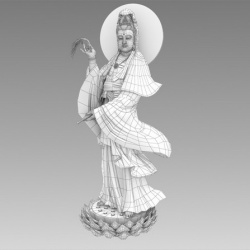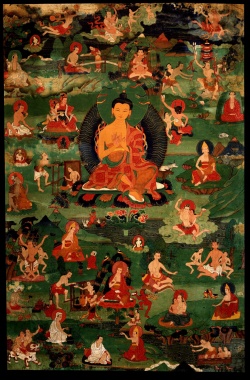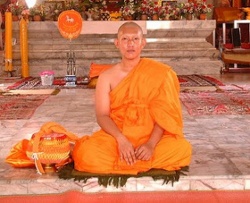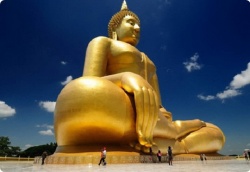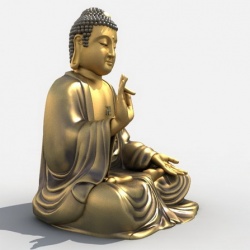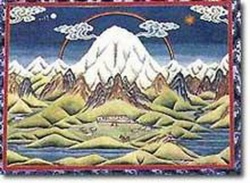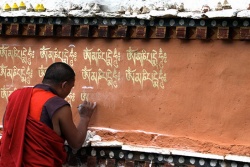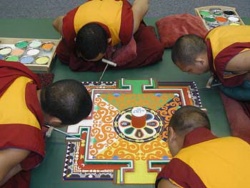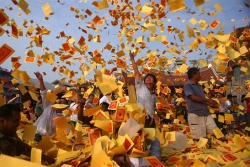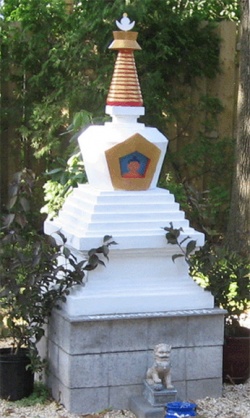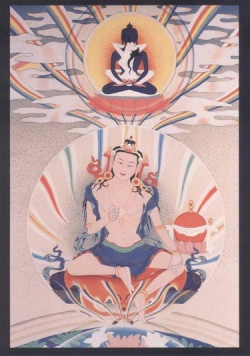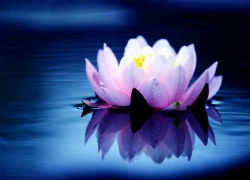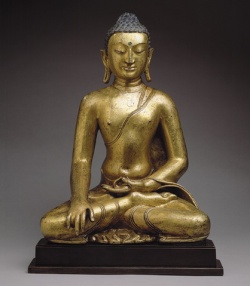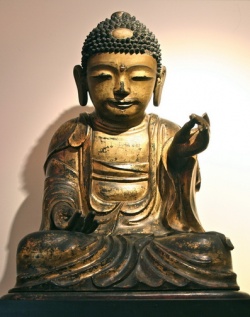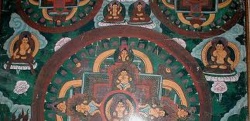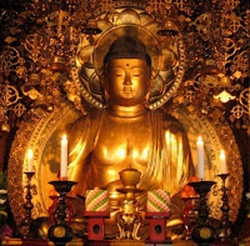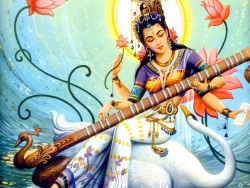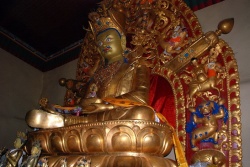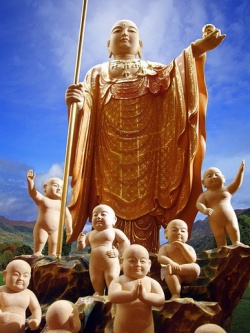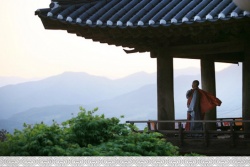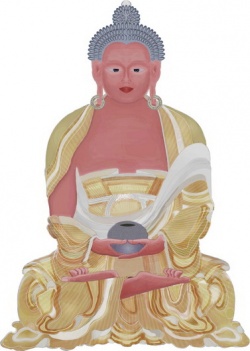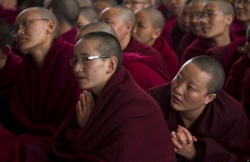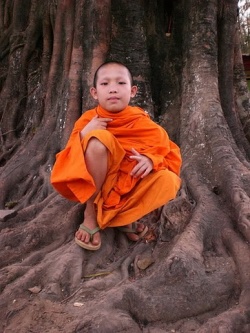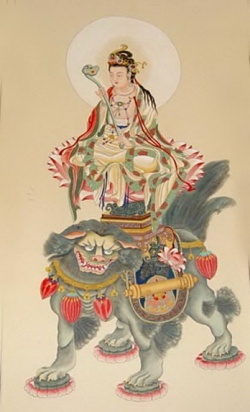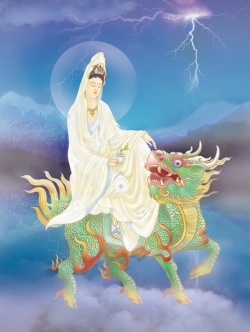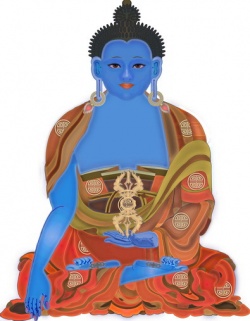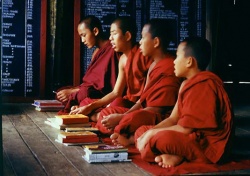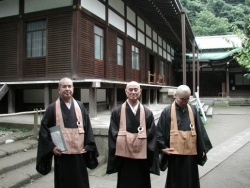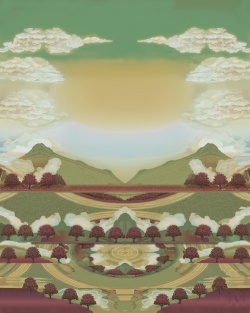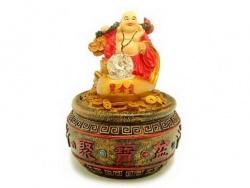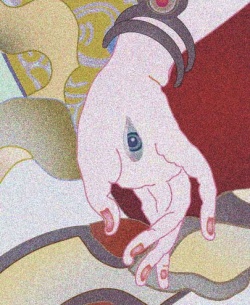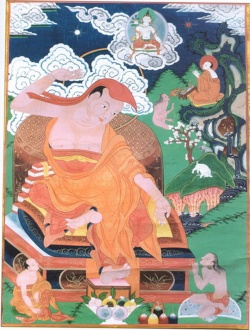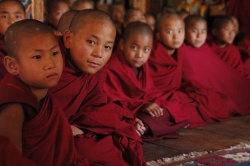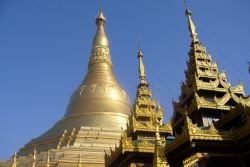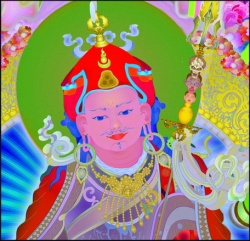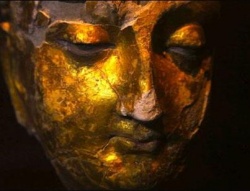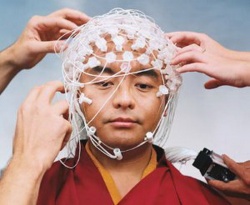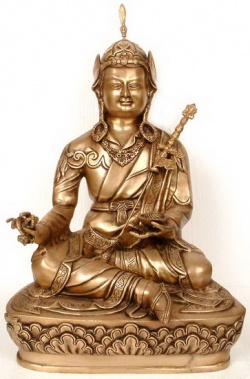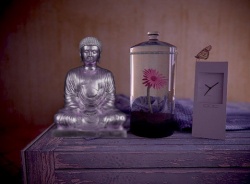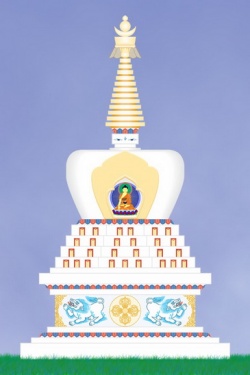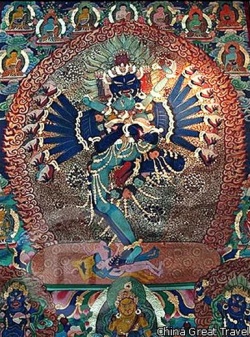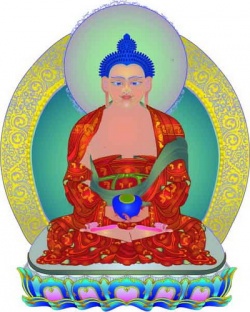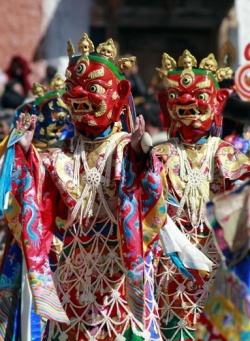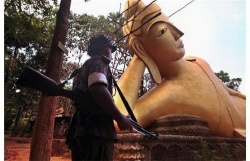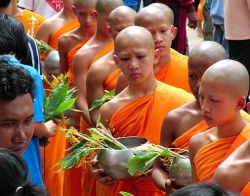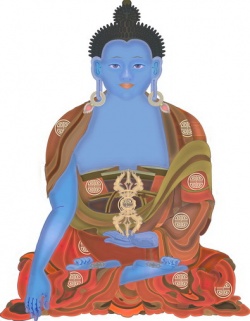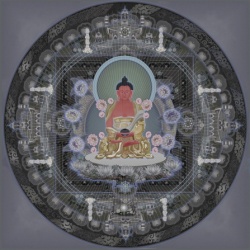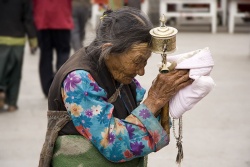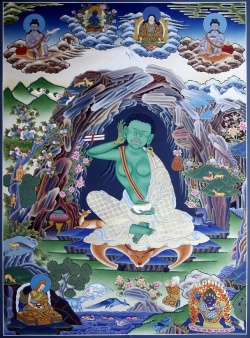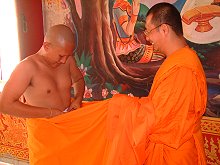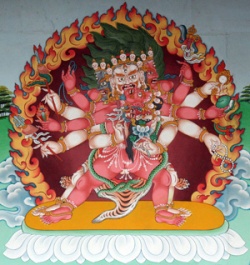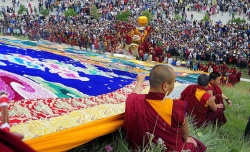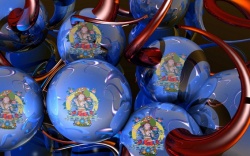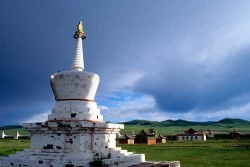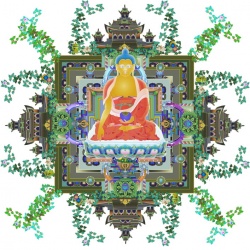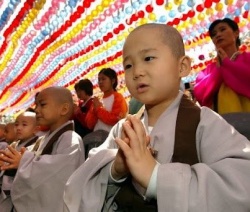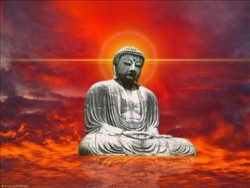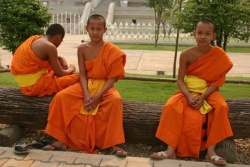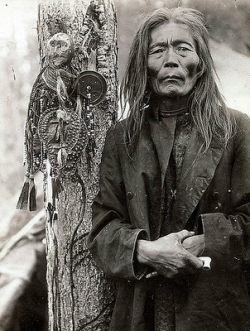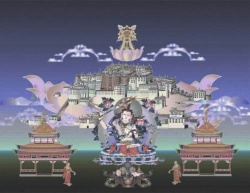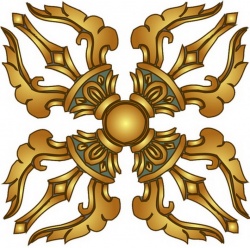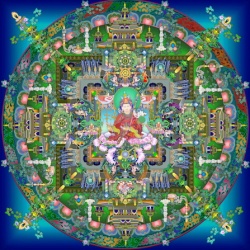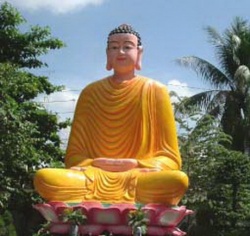The Flower Adornment Sutra: A Commentary by the Venerable Master Hsuan Hua: Chapter One: Part Three
The Flower Adornment Sutra:
A Commentary by the Venerable Master Hsuan Hua
Chapter One: The Wondrous Adornments of the Rulers of the Worlds
Translated in the Tang Dynasty by the Tripitaka Master Srãmana Siksananda of Khotan
Part Three
Moreover, Gandharva King Governing Nations gained a passage into liberation of gathering in all sentient beings with sovereign expedients.
- Commentary
Moreover indicates that a further explanation follows the previous section. Gandharva King Governing Nations, who is the Celestial King of the East, governs all the gandharvas. He has gained a passage into liberation of gathering in all sentient beings with sovereign expedients. “Sovereign” here means not forced, but very much at ease. “Expedients” means speaking Dharma in accord with sentient beings’ potentials—contemplating their potentials and enticing them with a teaching, speaking Dharma according to the person. One proclaims principles of the teaching according to the circumstances—that is how one would use expedients.
“Gathering in” means drawing in all sentient beings. How does one do that? One resembles a magnet that attracts iron filings, wherever they may be. There are two kinds of gathering in: (1) Gathering in by subduing means using a forceful method to subdue obstinate and stubborn individuals. Beings who are stubborn and refractory could only be subdued by methods even more insistent than they are. As a result those beings become tame. (2) Gathering in by compassion means gathering in beings with kindness and compassion. “Gathering in” often includes the idea of subduing as well. Not only this Gandharva King, but all sentient beings, gain this passage into liberation.
Gandharva King Light Resembling Trees gained a passage into liberation of everywhere seeing the adornment of all merit and virtue.
- Commentary
The Gandharva King named Light Resembling Trees gained a passage into liberation of everywhere seeing the adornment of all merit and virtue. He attained a passage into liberation of seeing the merit and virtue cultivated by all Buddhas, which adorn their Dharma bodies.
Gandharva King Pure Eyes gained a passage into liberation of ending the distress and suffering of all beings forever, and inspiring a treasury of happiness in them.
- Commentary
The Gandharva King named Pure Eyes gained a passage into liberation of ending the distress and suffering of all beings forever. Without much to do, sentient beings look for something to do. Without afflictions, they look for afflictions. Without too much trouble to begin with, they find ways to create trouble for themselves.
Now, Gandharva King Pure Eyes ends sentient beings’ worry and suffering forever, thus inspiring a treasury of happiness in them. When worry and suffering end, sentient beings become happy. That is this Gandharva King’s passage into liberation.
Gandharva King Floral Crown gained a passage into liberation of severing all sentient beings’ wrong views and delusions forever. Gandharva King Happy Stride and Universal Sound gained a passage into liberation of spreading everywhere like clouds, shielding and nourishing all sentient beings. Gandharva King Happily Dancing and Splendid Eyes gained a passage into liberation of manifesting an immense, wondrously splendid body, spreading peace and joy to all.
- Commentary
Gandharva King Floral Crown has an especially beautiful flower headdress. He has gained a passage into liberation of severing all sentient beings’ wrong views and delusions forever. Sentient beings are fraught with wrong knowledge and wrong views, which work more quickly and effectively than right knowledge and right views. You have to be taught and inculcated with right knowledge and views, but you don’t need to be taught wrong knowledge and views. You acquire them quite easily on your own. This Gandharva King destroys sentient beings’ wrong views and delusions forever.
One example of wrong knowledge and views is that many people insist that we do not have to hold precepts, cultivate samadhi, or practice wisdom. All of those are examples of wrong knowledge and views. They want to do away with the Three Non-Outflow Studies of precepts, samadhi, and wisdom. They insist on not holding precepts, not cultivating samadhi, and not acting with wisdom. They say that to do those things is unnatural and forced. Such wrong knowledge and views influence many people. Those who have a little bit of worldly knowledge are especially prone to these wrong knowledge and views.
This Gandharva King, however, severs sentient beings’ wrong views and delusions. He has obtained this kind of liberation. He enables sentient beings to obtain right knowledge and right views.
Gandharva King Happy Stride has that name because he enjoys walking, such as taking a stroll in the garden. He also has the name Universal Sound because he enjoys playing music, such as playing the guitar. We have someone here who had a special fondness for guitars. He bought a very expensive, antique guitar. Then he couldn’t let go of it. “Well, what should I do? Could I have my guitar with me when I am a monk? No, that would be impossible. But if I don’t bring it along, where should I put it?” He pondered it over and over, back and forth, and could not sleep a wink for several days. Suddenly, he had an “awakening.” The man with the guitar gave it to his girlfriend; the woman with the guitar gave it to her boyfriend. They were able to give up their guitars and join the monastic life. Now, you’re supposed to truly let go. When you do, it counts. After they had left the home-life though, they were still thinking about their guitars. Why was that? These people are probably the relatives of the Gandharva King Happy Stride and Universal Sound, which explains the influence they have come under. However, this gandharva king has gained a passage into liberation. You should not gain a “passage into bondage” and be bound by your guitar.
Gandharva King Happy Stride and Universal Sound has gained a passage into liberation of spreading everywhere throughout the trichiliocosm like clouds, shielding and nourishing all sentient beings. Whereas before he had a universal sound, now he can universally protect and nourish sentient beings, benefiting all of them. Everyone is shielded as if they had an umbrella over them, protecting them from the sun, and so they feel cool and clear. And so this celestial king has gained this passage into liberation. You should not gain a passage into bondage. Whereas others gain a passage into liberation, you gain a passage that binds you up!
Gandharva King Happily Dancing and Splendid Eyes likes to move around, and he has beautiful eyes. He rolls his eyes, unlike you Americans…when you see someone, you enter a trance. Your gaze is riveted on that person, either on his face or eyes, and you enter samadhi. This Gandharva King’s eyes roll back and forth. He shows off his beautiful eyes on purpose. Those who have beautiful eyes may tend to want to roll their eyes in order to show others. He has gained a passage into liberation of manifesting an immense, wondrously splendid body. Not only does he have splendid eyes, he also has a tall, majestic build. When people see him, they are delighted and respectful. They so revere him that they cannot bear to be apart from him. Thus, he is spreading peace and joy to all. Whoever sees him feels calm and tranquil. One experiences a joy greater than any joy imaginable and peace greater than any peace imaginable. While looking at this Gandharva King, even if they do not eat, they won’t feel hungry. Even if they do not put on clothes, they won’t feel cold. That is how much charisma he has! He commands such great powers of attraction. All sentient beings are absolutely delighted over him. He is of great benefit to sentient beings. As soon as they see him, they become peaceful and joyous!
Gandharva King Lion Banner of Wonderful Sound gained a passage into liberation of dispersing all jewels of illustrious repute everywhere throughout the ten directions. Gandharva King Universally Releasing Jeweled Brilliance gained a passage into liberation of manifesting a brilliant, pristine body and making everyone immensely happy. Gandharva King Banner of Vajra Trees’ Blossoms gained a passage into liberation of everywhere moistening all trees, inspiring happiness in the beholder.
- Commentary
The next Gandharva King has the name Lion Banner of Wonderful Sound. He has gained a passage into liberation of dispersing all jewels of illustrious repute everywhere throughout the ten directions. With his wonderful sound, he scatters jewels throughout the ten directions. Sentient beings in the ten directions all admire this Gandharva King. He has great renown. When sentient beings hear of his great reputation, they will be saved and become enlightened. For this reason, he has the jewels of great renown. He has attained this passage into liberation.
The next Gandharva King is named Universally Releasing Jeweled Brilliance. He radiates the light of every variety of gem. He has gained a passage into liberation of manifesting a brilliant, pristine body and making everyone immensely happy. His passage into liberation consists of manifesting all kinds of happiness and having a pure Dharma body.
The next Gandharva King named Banner of Vajra Trees’ Blossoms gained a passage into liberation of everywhere moistening all trees. All trees are moistened by water, so their branches and foliage become luxuriant, inspiring happiness in the beholder. People are delighted by the sight of these trees. He attained that passage into liberation.
Gandharva King Everywhere Manifesting Adornments gained a passage into liberation of skillfully entering all Buddhas’ states and bestowing peace and joy upon sentient beings.
At that time, Gandharva King Governing Nations received the Buddha’s awesome power, universally contemplated the gandharva multitudes, and spoke the following verse.
- Commentary
Gandharva King Everywhere Manifesting Adornments is skilled at adorning Buddhalands and bodhimandas. Since he is skilled at adorning Buddhalands, he gained a passage into liberation of skillfully entering all Buddhas’ states. He can manifest and adorn the states of all Buddhas, thus bestowing peace and joy upon sentient beings. That is how he dispels the worry, sorrow, and distress of all sentient beings. His heart is filled with great kindness and compassion. His kindness causes him to make beings happy, and his compassion moves him to alleviate their suffering.
Although we have not attained this passage into liberation we who cultivate the Way should always try to make others happy and allay their suffering. If we trouble others, increasing their distress and vexation, then instead of developing affinities, we make them resent us. We ought to use virtue to influence people and earn their respect. We cannot hope to gain their respect or admiration if we oppress them. If we are virtuous, everyone will respect us and will not get upset even if we scold them. However, if we do not behave virtuously, we will not be able to influence others. People will detest us or fear us. When they see us, they will act as if they had seen a wolf, a tiger, a robber, or a poisonous snake. They want to run away and not be around us. Conversely, if we are virtuous, everyone will want to be near us. Even if we are mad at people, they wouldn’t consider our attitude excessive or wrong. Why? Our awesome virtue elicits in sentient beings a reaction of peace and happiness. That Gandharva King gained this passage into liberation.
At that time, when Gandharva King Everywhere Manifesting Adornments attained his passage into liberation, Gandharva King Governing Nations, the leader of the gandharvas, received the Buddha’s awesome power. Relying upon the awesome virtue of the Buddhas of the ten directions and our original teacher, Sãkymuni Buddha, he universally contemplated the gandharva multitudes. He observed all these multitudes to see what kind of Dharma he should speak so as to accord with their potentials. There are different ways to contemplate and observe. One could contemplate from within a state of samadhi, as well as when one comes out of samadhi. From within a state of dhyana concentration, he saw the causes and conditions of the gandharvas and knew what dharmas he should speak to benefit them. He can also observe them after he has come out of samadhi to know what expedients should he use to teach and transform these gandharva multitudes.
And then he spoke the following verse. If he says too much, people will become impatient. They don’t want to listen and take in any more—it is as if they have some problem with their ears. Some people talk as if they were grinding beans for bean curd (tofu), pushing the stone mill back and forth, in which case their audience would become restless. Well, what should one do? One can say less by speaking in verses, for example. That’s why the Gandharva King spoke verses for the gandharva multitudes. Upon observing their causes and conditions, he spoke succinctly and briefly, reiterating the meaning previously explained so that people remember it easily. When they recite this four-line verse, they will remember it quickly. If people have to go over the prose, they might not be able to remember it as easily. For that reason, the meaning is repeated in the following four-line verse.
The innumerable doors to the realm of all Buddhas
Are ones that sentient beings have not yet been able to enter.
Pure in nature, the Well-gone One resembles space.
Everywhere he reveals a proper path for those in the world.
- Commentary
Isn’t this four-line verse easy to remember? You can commit it to memory right away. Whether you have your eyes open or closed, you can still recall this verse. It’s easy to remember.
From within a state of samadhi, Gandharva King Governing Nations observes the past causes of sentient beings; and when he comes out of samadhi, he observes their present situation. Upon seeing the result, one can deduce the causes; observing the causes, one can figure out the result. He is able to understand the cause and effect of all sentient beings.
Why was this sentient being murdered? Ah, it’s because in the past he killed others. Why did that sentient being lose his possessions today? It’s because in the past he stole from others. Why does the husband of this woman always go out and fool around with other women? Because in one of her past lives, the wife was a man who fooled around with many women, and as a result he has to undergo the corresponding retribution in this life. Then there’s the opposite case where a woman goes out and fools around with men. What are the circumstances behind this? “Ah, so it is, so it is!” In the past she did not follow the rules. In general, the men were not faithful to their wives, and the wives were not frank and open with their husbands. They cheated one another. Such being the cause, such is the result. It is just that way. Thereupon you understand everything and you will not be afflicted. If you do not understand, you will be influenced by situations. If you understand, you can influence the situation.
Now the Sutra mentions the innumerable doors to the realm of the Buddhas. There are limitless, boundless doors but they are ones that sentient beings have not able been able to enter. The state of sentient beings and the state of Buddhas are different. Whereas sentient beings are always afflicted, bickering and fighting, and being upside-down, the state of all Buddhas is one of purity and effortlessness. The Buddhas do not act, but there is nothing that is not done. You argue that there is nothing going on, but the Buddha’s state contains everything. This is not something that sentient beings can understand. Therefore, they are not able to enter or reach the Buddha’s state.
Pure in nature, the Well-gone One resembles space. “The Well-gone One” is one of the Buddha’s ten titles. The Buddha’s nature is basically pure. Everywhere he reveals a proper path for those in the world. He opens a proper path for all sentient beings, so they may walk on this road and arrive at Buddhahood.
Some people are saying, “The Dharma Master spoke this Dharma especially for me.” Another person says, “I don’t understand this Dharma. It probably was not spoken on my behalf.” Actually it is not spoken for me or for you. It was spoken for someone else.
Each and every pore of the Thus Come One
Is filled with an ocean of merit and virtue,
Bringing benefit and bliss to all those in the world.
King Light Resembling Trees perceives thus.
- Commentary
“Thus Come One” is one of the Buddha’s ten titles. Each and every pore of the Thus Come One / Is filled with an ocean of merit and virtue. Since the merit and virtue in a single pore surpasses an ocean, the merit and virtue in all those pores cannot possibly be fathomed or known. Bringing benefit and bliss to all those in the world. The merit and virtue is not for the Buddha’s own benefit and bliss, but rather, for the sake of sentient beings of the world.
The world includes the material world. The benefit and bliss do not affect the material world in any significant way, but they do affect the world of sentient beings. All sentient beings are nurtured by the Thus Come One’s merit and virtue. King Light Resembling Trees perceives thus. Gandharva King Light Resembling Trees has understood the state of this passage into liberation.
The colossal ocean of the world’s distress and suffering
Is dried up by the Buddha—not a drop remains.
The Thus Come One’s sympathy commands numerous expedients.
Pure Eyes understands this profoundly.
- Commentary
Beings of the world of sentience live in the colossal ocean of the world’s distress and suffering. Their worry and woe resemble an ocean. Therefore we say, “The sea of suffering is without bounds.” Well, what are we to do? “A turn of the head is the other shore.” Turning around means waking up. We wake up to the fact that this ocean of distress and suffering is measureless and boundless. And we have to let go of it. If we can let go, we attain ease and comfort. Why do we experience distress and suffering? Because we cannot let go. Why can’t we let go? Because we haven’t seen things as they really are. Why can’t we see things truly? Because we lack wisdom. And why do we lack wisdom? Because we do not cultivate the Way. If we cultivate the Way, we will have wisdom. With wisdom we can see things as they are. Having seen things truly, we will let go of them. Who enables us to acquire this wisdom? The next line of the Sutra text tells us.
That ocean is dried up by the Buddha—not a drop remains. The Buddha teaches and transforms us, urges us to cultivate and increase our wisdom. The Buddha is able to rid sentient beings of distress and suffering until none remains, not even a hair’s worth. The ocean of distress and suffering is dried up and vanishes. The Thus Come One’s sympathy commands numerous expedients.
The Buddha kindly and compassionately teaches beings, liberating them all. He pities and sympathizes with all beings. Cultivators should regard everyone with kindness, compassion, and sympathy. We can use kindness to make beings happy all the time, and compassion to relieve their suffering. We should take pity on sentient beings: “How deeply they suffer! We must do everything we can to alleviate their pain.” Then we employ assorted skill-in-means to help sentient beings. Gandharva King Pure Eyes understands this profoundly. He has a deep understanding of this dharma.
The ten directions’ oceans of lands are boundless.
The Buddha’s wisdom light shines on them all,
Universally purifying evil and wrong views.
King Trees’ Blossoms enters this passage.
- Commentary
The ten directions’ oceans of lands are boundless. The oceans of lands in even a single direction are boundless, not to mention in ten directions. Even the oceans of lands right within our body are boundless, how much the more so if we were to discuss this on a broader scope!
Do the oceans of lands within each person’s body have boundaries? Our bodies are connected with the oceans of lands throughout the ten directions. Your own body is your ocean of lands. The bodies of others are oceans of lands of the ten directions. And other worlds are also oceans of lands of the ten directions. This principle can be expanded ad infinitum. There are infinite levels of meanings impossible to fully describe. If you can’t even locate the boundaries of the ocean of lands of your own body, how much the less can you hope to locate the boundaries of other oceans of lands of the ten directions?
Put simply: In your own ocean of lands, how many fine hairs make up your eyebrows? Could you count those fine hairs? They are a small number. Now, consider a larger quantity. Could you count the number of hairs on your head? You may say, “Yes, I can count the number of hairs in my eyebrows. It might take me ten years, but I can certainly count them all. I can even count the number of hairs on my head.”
Okay, you know how to compute. You have learned trigonometry, geometry, and algebra. Can you figure out how many pores and how many hairs there are on your body?
“Yes, I know. There are 84,000 of them.”
That’s just a general number. Maybe there are 85,000 or 86,000 or 83,000. That’s just a rough estimate. You don’t know the exact number for sure. And since we don’t even know clearly the ocean of lands within our own bodies, how much the less are we equipped to know the oceans of lands throughout the ten directions? Therefore, they are said to be boundless.
The Buddha’s wisdom light shines on them all. We do not have this knowledge because we lack the illumination of wisdom. If we had our wisdom eye open, then thoughts as numerous as dust motes in lands could be counted and known. If we could count that many thoughts, wouldn’t it be much easier to count an ocean of lands? The reason ordinary people do not know is that they aren’t enlightened. The Buddha has attained great, perfect enlightenment. The light of his wisdom completely and simultaneously illumines the oceans of lands of the ten directions. Unlike a spotlight or searchlight that shines in one direction but leaves the other directions dark, the Buddha’s light universally shines on all places at once.
What’s so great about this pervasive universal illumination? There must be advantages to it. Otherwise, what would the Buddha’s light shine for? For one, the light functions by universally purifying evil and wrong views. It completely purges and cleanses the evil and wrong views of beings in the ten directions’ oceans of lands. People with evil and wrong views like to bother others. For example, they may enjoy sending a wind over the ocean, stirring up huge waves in water that was originally placid and calm. Such people don’t give themselves any trouble, but create trouble for others. If their views were simply wrong, these people could still be saved. But when their views are evil, then these views become poisonous and sinister. For instance, such people may scheme to kill or eliminate their opponents. At any rate, evil and wrong views are really terrible.
In this liberation, the Buddha purifies those wrong, evil views. Due to his great kindness and compassion, he does not reject beings who have wrong and evil views. The Buddha doesn’t say, “I will not liberate you because you are so bad.” Instead, he universally purifies those wrong and evil views. King Trees’ Blossoms enters this passage. Gandharva King Trees’ Blossoms has understood this dharma.
For measureless eons, the Buddha
Cultivated expedient practices based in great kindness.
He comforts all those in the world.
Universal Sound awakens to and enters this path.
- Commentary
For measureless eons, the Buddha...We are not the only ones who must be respectful when we listen to the sutras and Dharma. The Buddha, before he attained Buddhahood, also listened to the Dharma with respect. He was not lazy at all. It’s not known for how many great eons he cultivated expedient practices of great kindness. He cultivated a heart of great kindness and compassion and an impartial mind that did not discriminate between self and others. He practiced skillful expedients and spoke the most appropriate Dharma for each occasion. The more people listened to his Dharma, the happier they felt. The happier they were, the more they wanted to listen. The Buddha cultivated those expedient practices of great kindness. He comforts all those in the world. What does it means to comfort someone? When a person feels dejected and upset, another person may say, “Cheer up. It is only a small thing. Don’t take it so seriously. Once this blows over, it will be over and done with. Don’t get hung up on it.” Hearing such an exhortation, the first person’s spirits are uplifted and he feels better. That’s an example of comforting someone.
The Buddha comforts all sentient beings, making them peaceful and happy. Universal Sound awakens to and enters this path. Gandharva King Universal Sound understands this principle of this Dharma and skillfully enters this passage into liberation.
All rejoice to see the Buddha’s immaculate body.
He inspires in the inhabitants of this world unending delight.
Causes and effects leading to liberation are gradually achieved.
Splendid Eyes skillfully expounds upon this.
- Commentary
All rejoice to see the Buddha’s immaculate body. Why is the Buddha’s body pure? He has cast out all defilement—all greed, anger, and delusion—and retains only precepts, samadhi, and wisdom. Therefore his body is pure and immaculate. On the other hand, the bodies of sentient beings are filthy and impure, because we haven’t gotten rid of our greed, anger, delusion, and other defilements. That is a general explanation. A detailed explanation could take several great eons and still not be finished. Since the Buddha’s body is pure, all sentient beings rejoice to see it. Everyone is delighted to see the Buddha’s pure Dharma body. People not only rejoice in seeing the Buddha, but also respect and make offerings to him.
Whereas the Buddha has cultivated for measureless eons, we sentient beings have been creating karma for measureless eons all the way up to the present. Even now, we are still creating karma in our thoughts and actions. That’s why no one rejoices to see us. In fact, no one wants to see us. Since we are impure, no one wants to lay eyes on us.
He inspires in the inhabitants of this world unending delight. The Buddha inspires infinite, inexhaustible joy in sentient beings. At the end of every sutra spoken by the Buddha, it is recorded that “The great assembly greatly rejoiced, believed, accepted, and practiced according to the teachings.” That is because the Buddha inspires unending delight in sentient beings.
Causes and effects leading to liberation are gradually achieved. Liberation is not gained instantaneously. A certain period of time must transpire. Those who have not yet planted good roots are led to plant good roots. Those who have already planted good roots are led to increase those good roots. Those who have increased their good roots will bring their good roots to maturity. Those who have mature good roots can attain liberation. There are causes for liberation and effects of liberation. If we have planted causes for liberation at the level of planting causes, we will reap the fruits of liberation as a result. Liberation is attained step by step in gradual succession.
Splendid Eyes skillfully expounds upon this. Gandharva King Splendid Eyes skillfully reveals this principle to sentient beings, helping them to understand the Buddha’s state, cultivate the Dharma, and attain liberation.
Sentient beings, confused and deluded, forever flow and turn,
Most solid and dense is the ignorance that hinders and shrouds them.
For them, the Thus Come One speaks the vast, great Dharma.
King Lion Banner conveys this.
- Commentary
Sentient beings will not admit that they are deeply confused. If you tell someone that he is confused, he retorts, “Wrong! You’re the one who’s confused!” If you tell someone that he’s deluded, he counters, “No, you’re the deluded one!” Why do they snap back? They cannot admit their own ignorance. Everyone feels himself to be wiser and better than others. In fact, this is a case of being confused and deluded and not understanding principle.
“Confused” means unawakened; “deluded” means not understanding, being unclear and doubtful. Once a person is confused and deluded, he does not understand principle. If someone teaches him the Buddhadharma, this person will wonder, “Was there really a Buddha? I wonder if the Dharma is really true.”
Now, if you were to teach this person a vice, he would find it wonderful and would have no doubts. But he is skeptical when you try to teach him a good dharma. Teach him bad dharmas, and he has no doubts. Wouldn’t you say such a person was confused and deluded?
Sentient beings, confused and deluded, forever flow and turn. They may have wanted to come back before, but their karmic obstacles pull them away and so they flow and turn within the six paths of rebirth: suddenly in the heavens, suddenly on earth; suddenly in the realm of humans, suddenly in the realm of ghosts, suddenly in the realm of animals, and suddenly in the hells. They are carried along by the current of their confused and deluded karma. The more they flow, the farther they drift; the more they turn, the more disoriented they become. Sentient beings flow around and around until they are thoroughly deluded.
Most solid and dense is the ignorance that hinders and shrouds them. The obstacles of ignorance form a very solid and dense covering. Someone who is too deeply deluded cannot break through this covering. When such a person is encouraged to study the teachings of wisdom, he will say, “Are you saying that I’m dumb? You are far dumber than I am.” He refuses to admit his own ignorance. The Doctrine of the Mean [a classic Confucian text] speaks of this:
“People invariably claim to be intelligent. But if you were to drive them into a trap, they would not know how to avoid it.”
Would you say they were smart or foolish?
For them, the Thus Come One speaks the vast, great Dharma. The Buddha speaks the vast, great Dharma for these beings, dispelling their confusion and showing them the truth so they will regain their inherent prajña wisdom and no longer be ignorant. King Lion Banner conveys this. Gandharva King Lion Banner expounds freely upon the principles of this Dharma.
The Thus Come One universally manifests wondrous physical bodies, With measureless variation, equal to all sentient beings.
His different expedients shine on all worlds.
Universally Releasing Jeweled Brilliance perceives this.
- Commentary
The Thus Come One universally manifests wondrous physical bodies. The Thus Come One comes from nowhere and goes nowhere. For that reason, he is called the Thus Come One. There is another definition for Thus Come One: “Riding on the path of reality as it is, he comes to accomplish proper enlightenment.” Thus Come One is one of the Buddha’s ten titles. He manifests everywhere; there is nowhere he does not prevail; and there is nowhere he does not appear. Therefore, he “universally manifests.” The Thus Come One’s Dharma body reaches the Heaven of Neither Thought nor Non-Thought above and reaches the uninterrupted hells below.
“Wondrous physical bodies” refers to bodies adorned with the Thirty-two Hallmarks and the Eighty Subtle Characteristics. These wondrous physical bodies pervade the Dharma Realm, with measureless variation, equal to all sentient beings. The differences and kinds of sentient beings are measureless. To sum it up, there are beings born from wombs, eggs, moisture, and transformation. Womb-born creatures come about through emotion; egg-born creatures come about through thought; moisture-born creatures come about through union; and transformation-born creatures come about through separation. There are infinite variations among womb-born creatures, and the same is true of egg-born, moisture-born, and transformation-born creatures. Each category of birth has infinite variations. All of these creatures behold the Thus Come One’s wondrous physical bodies. His different expedients shine on all worlds. The Buddha employs numerous skill-in-means to teach and transform sentient beings, enabling them to attain the light of prajña wisdom. Gandharva King Universally Releasing Jeweled Brilliance perceives this. He understands the principle of this liberation and this state of the Buddha.
Using immeasurable expedients based in great wisdom
The Buddha expounds for flocks of creatures, all and everywhere.
He enters the true practice of supreme bodhi.
Vajra Banner skillfully contemplates thus.
- Commentary
Using immeasurable expedients based in great wisdom . Great wisdom is the wisdom of prajña. One needs prajña wisdom to employ expedient methods and speak expedient dharmas. There are not just one, two, three, four, five, six, seven, eight, nine, or ten expedient dharmas. How many are there? There are infinitely many. Each one of them meets the potentials of some category of sentient beings. There are as many dharmas as there are categories of sentient beings. These expedient dharmas are used to teach and transform sentient beings. First, one observes the causes and conditions of sentient beings and determines what method to use to teach any specific kind of sentient being. One speaks a dharma geared to an individual’s needs, just as a physician dispenses medicine according to the sickness. Basically there is no dharma that is spoken, and yet no dharma that is not spoken. One speaks every dharma, but after speaking it, is not attached to it. That’s why we say there is no dharma that is spoken. Since beings’ minds are different, different dharmas are spoken for them.
The Buddha expounds for flocks of beings, all and everywhere. He expounds expedient doors, measureless doors of great wisdom’s expedients, causing sentient beings to enter the Buddha’s wisdom. He enters the true practice of supreme bodhi . He enters the supreme path of enlightenment and genuinely practices. When you cultivate, you have to really do it. You cannot merely render it lip service. You can’t say, “Since I know how to lecture on a few lines of the sutras, I am satisfied. That’s cultivation.” Nor can you be arrogant and say, “I know how to sit in meditation. I don’t have to cultivate.” And it’s also not the case that having translated a few sutras, you have cultivation behind you. Cultivation must be based on genuine virtue. If you lack virtue, no one will respect you. If you have virtue, no matter where you go, people will recognize you as a person of virtue who has entered genuine doors of practice. Vajra Banner skillfully contemplates thus. Gandharva King Vajra Banner is skilled at contemplating the state of this passage into liberation.
An instant contains hundreds of thousands of eons.
A Buddha’s spiritual power manifests this, yet he remains unmoved.
Comfort and joy he bestows equally upon all sentient beings.
This is the liberation of Delighting in Adornment.
- Commentary
An instant contains hundreds of thousands of eons. Hundreds of thousands of eons are compressed into a single instant; on the other hand, a single instant of time can be expanded to hundreds of thousand of eons. In the eyes of ordinary people, there seem to be short and long intervals of time. However, on the part of the Buddhas, long can become short, and short can become long. Short and long are nondual; they are one and the same. We may feel that a single lifetime is already a long period of time: From youth we progress to our prime, from our prime we move on to old age, and from old age we move on to death. We experience the sufferings of birth, old age, sickness, and death, and we undergo the processes of coming into being, dwelling, change, and extinction; formation, stasis, decay, and emptiness. We pass through several decades and feel that is a long time. However, from the perspective of Buddhas, that is simply a very brief instant of time. Within that single instant, we experience the sorrows and joys of partings and reunions. We suffer when we are separated from those we love, and we also get together again. We take all of this very seriously, considering it all to be real. But once we close our eyes, everything is gone. Isn’t that the same as a dream?
A Buddha’s spiritual power manifests this, yet he remains unmoved. By means of his awesome spiritual power, a Buddha can condense hundreds of thousands of eons into a single instant, and then expand that single instant into hundreds of thousand of eons. Isn’t that wonderful? Comfort and joy he bestows equally upon all sentient beings: With his awesome spiritual power, a Buddha endows sentient beings with peace and joy. This is the liberation of Delighting in Adornment. Gandharva King Delighting in Adornment experiences this kind of joy.
You may bring up any opinion you have, and we’ll discuss it.
Someone was wondering: “Animals are living creatures, and so are plants. Why is it that we are not allowed to eat meat, but we can eat vegetables? And since we are allowed to eat vegetables, why can’t we eat meat?”
This is the way to answer such a question: Living creatures are divided into those that are sentient and those that are not. Vegetables are not sentient. Although they possess some kind of awareness, they do not have emotions or feelings, and so they do not actually qualify as “sentient beings.” They must first be eaten before they will be transformed into sentient beings. That is, they go through the machinery of the human system, undergo a chemical process, after which their nature will become incorporated into the body of a sentient being: A human being is a machine, a scientific instrument. After going through a chemical change that involves the isolation of atoms, protons, and so on, those elements are gathered back into the human “machine.”
When people ask this sort of question, you can tell them, “Since you know that vegetables are also sentient beings and you do not wish to eat them, that’s okay. Don’t force it.” Then see what they will do.
Moreover, Kumbhandha King Growth and Development gained a passage into liberation of eradicating the power of all resentment and harming.
- Commentary
This refers to Kumbhandha King Growth and Development, Celestial King of the South, who governs the kumbhandha ghosts. We have explained the kumbhandhas many times before, but I don’t know whether you remember it or not. If you do, you can explain it for us. There are many kinds of kumbhandha ghosts. They are also called “barrel-shaped ghosts,” since they do not have heads or legs. Since they resemble winter melons, they are also called “winter melon ghosts.”
Why do certain people encounter this kind of ghost? Such people are strong in yin energy but weak in yang energy. A Celestial King has to govern these ghosts, or else they will be even more intractable and unruly. Fortunately, Celestial King Growth and Development keeps them under control, so they do not get out of hand.
Moreover indicates that the following text continues to explain this ongoing topic. Kumbhandha King Growth and Development gained a passage into liberation of eradicating the power of all resentment and harming. “Resentment” means vengefulness and hatred; “harming” means injuring. One who harbors resentment harms others. Now this Kumbhandha King can dispel all resentment, hatred, and harming. He has obtained the power of this passage into liberation.
Kumbhandha King Dragon Ruler gained a passage into liberation of cultivating the ocean of boundless methods of practice.
- Commentary
The next Kumbhandha King is named Dragon Ruler . He has gained a passage into liberation of cultivating the ocean of boundless methods of practice. He cultivates measureless, boundless dharma doors, which are as profuse as the ocean. He attained that passage into liberation.
Kumbhandha King Adorning Banners gained a passage into liberation of knowing the delights of all sentient beings.
- Commentary
The Kumbhandha King named Adorning Banners ornaments all Buddhalands, Way-places, and the pure lands of the ten directions. He has gained a passage into liberation of knowing the delights of all sentient beings. He knows what they like. Thereupon he always accords with sentient beings and speaks Dharma for them. He has attained this kind of state.
Kumbhandha King Magnanimous Practice gained a passage into liberation of universally accomplishing the karma brought about by pure, great light.
- Commentary
The Kumbhandha King named Magnanimous Practice brings benefit to sentient beings, helping all of them. That is his practice. He has gained a passage into liberation of universally accomplishing the karma brought about by pure, great light. “Universally accomplishing” means that he is impartial. He helps all sentient beings and benefits them, aiding all of them to accomplish the karma brought about by pure, undefiled dharmas, a treasury of great brightness of prajña. Here “karma” refers to good karma that will be accomplished. That is the passage into liberation of this Kumbhandha King.
Kumbhandha King Terrifying gained a passage into liberation of revealing to all sentient beings the path of fearlessness that leads to peace and security.
- Commentary
The next Kumbhandha King is named Terrifying. Basically kumbhandhas are pretty frightening, but this one is even more so. All sentient beings are terrified by him, hence his name. However, although he has a frightening appearance, he has a kind and compassionate mind and wants to help sentient beings. He has gained a passage into liberation of revealing to all sentient beings the path of fearlessness that leads to peace and security. When sentient beings do not understand, he uses various dharma doors to facilitate their understanding. Although sentient beings fear him, he shows them the path leading to peace and security so that their fears will be dispelled.
On the subject of fear, the Confucian school says, “The superior person has three fears. He fears the ordinance of heaven; he fears a great person; and he fears the words of a sage.” He is apprehensive and cautious regarding the decree of heaven. When he meets a great personage, he is apprehensive and respectful. And he is also attentive and reverent towards the words spoken by a sage.
In general, people experience many kinds of fear. When they run into a tiger, they are so petrified that their feet turn to jelly and they cannot walk, since tigers can devour people. A person would experience the same kind of fear if he ran into wolves or poisonous snakes. Why do people experience fear?
They have not let go of their attachment to life. If we do not fear death, we will have no other fears to speak of. This Celestial King shows sentient beings the path leading to peace and security. He bestows fearlessness upon them, which is a kind of giving. There is the giving of wealth, the giving of Dharma, and the giving of fearlessness. This Kumbhandha King often gives sentient beings courage, much like Guanshiyin Bodhisattva. He dispels their fears. That is his passage into liberation.
Kumbhandha King Wondrous Adornment gained a passage into liberation whereby he dries up the sea of love and desire of all sentient beings.
- Commentary
The Kumbhandha King named Wondrous Adornment gained a passage into liberation whereby he dries up the sea of love and desire of all sentient beings. He destroys and dries up the love and desire of sentient beings. Due to a single thought of ignorance, sentient beings fall into lower states. Ignorance is a state of not understanding anything. When one understands nothing, one acts in a reckless and unruly manner, behaving improperly. That is, one gives rise to selfish desire and emotional love, which can be as profuse as an ocean. This Kumbhandha King knows how to dry up and extinguish that sea of love and desire, at which point sentient beings can attain the pure Dharma body. That is to have achieved a passage into liberation.
Kumbhandha King Wisdom like a High Peak gained a passage into liberation of universally manifesting a cloud of light in all destinies.
- Commentary
The Kumbhandha King named Wisdom like a High Peak has superior wisdom. He has gained a passage into liberation of universally manifesting a cloud of light in all destinies. “Universally manifesting” means appearing throughout the dharma realms of Bodhisattvas, Hearers, Sages Enlightened to Conditions, gods, humans, asuras, hungry ghosts, animals, and hell beings. He manifests in all those realms and makes appear a cloud of light amidst all destinies. There is darkness in the different destinies, but he manifests a cloud of light, illumining all sentient beings so they achieve great wisdom. That is his passage into liberation.
Kumbhandha King Robust Arms gained a passage into liberation of universally emitting light and destroying heavy obstacles resembling a mountain.
- Commentary
Kumbhandha King Robust Arms is very brave and skilled at battle. His strong and robust arms are as solid as steel; even if you hacked at them with a knife, you wouldn’t be able to cut through them. For that reason he is able to subdue the kumbhandha ghosts and become their king. He has gained a passage into liberation of universally emitting light and destroying heavy obstacles resembling a mountain. His light shines everywhere, dispelling obstacles from offenses as weighty as a mountain. Our karmic obstacles have no shape or form. If they had shape or form, space would burst since it would not be able to contain all of our karmic obstacles. Fortunately, karmic obstacles do not have shape or form, and so space has not burst open. However, karmic obstacles are as heavy as Mount Sumeru . Why is it that we do not have a resolute resolve for the Way? Why is it that we don’t have a long-lasting resolve for cultivation? It’s because we are burdened by these obstacles. They obstruct us so our resolve for cultivation is not firm or enduring.
There are three kinds of obstacles: karmic obstacles, obstacles of retribution, and obstacles of afflictions.
Karmic obstacles derive from karma that we create. Our evil karma covers our wisdom. Therefore, during the refuge ceremony, there is passage that says, “We have created much evil karma, which obstructs and occludes the source of our mind. We are not worthy of being gathered in.”
Obstacles of retribution are present-day retributions resulting from karma we created in our former lives. Cultivators must pay attention to obstacles of afflictions. Take care to not have so many afflictions. Do not have such overwhelming ignorance that you get angry or upset at the slightest provocation. Affliction and ignorance are the absolute worst things in cultivation. Don’t think you can simply get angry if people treat you badly. That is the ugliest, the lowest, the most spineless thing to do. Once you get angry, all the effort you put into cultivation is lost. Cultivation means being patient with what others cannot be patient with, yielding to what others cannot yield.
People who have cultivation and virtue never really get angry. If a virtuous person makes a show of anger, people find it very easy to take. If a person lacking virtue blows up, however, it won’t work. Don’t think, “Now that I have virtue, I can get mad at others.” That will not do. Any indication of anger is a sign of your own stupidity. You cannot be mad at anyone. You shouldn’t get angry even at people who are one or two levels junior to you, or who are lower than you in position, much less your Dharma peers. You cannot attack others because of your own afflictions and ignorance.
From now on, this is how you should observe people: If an individual has truly gotten rid of his temper, afflictions, and ignorance, that individual has promise. Don’t look at his scholarship, wisdom, or eloquence. If he is still prone to ignorance and gets angry often, then, without having to ask, you should know that such a person has no skill to speak of. Not only does he have no skill, but he will soon fall into the hells; after all, he came from the hells. You should to pay attention to this point.
If you are a cultivator, no matter how badly people treat you, you absolutely cannot get angry at them. That’s the most important point. I remind you daily, over and over again: “Don’t get angry,” and yet you insist on getting angry. You insist on letting the tiger out of its cage. This is very pathetic. If you still cannot practice the paramita of patience after having cultivated for such a long time, everything will be to no avail. No matter how much merit and virtue you have, if you aren’t able to be patient, all of your efforts will be annulled. Every one of you should cultivate the dharma of patience. You should not get angry every day. This is important! Pay special attention to this point.
There is another list of two kinds of obstacles: obstacles of afflictions and obstacles of what is known. Getting angry is an obstacle of afflictions. Why aren’t you enlightened? Why haven’t you gained a passage into liberation? It is because you are blocked by obstacles of afflictions. Even if you are on the verge of enlightenment, the door leading to enlightenment closes once you become afflicted. What are the obstacles of what is known? It refers to an attitude of feeling that you know more than others, that your views are more correct than others. “My English is good, my Chinese is excellent, my French is great, and my Spanish is terrific!” Such a person feels he or she knows a great deal, and that is the obstacle of what is known. No matter what kind of obstacles they are, be they obstacles of afflictions or obstacles of what is known, these resemble a mountain that obstructs your mind’s enlightenment. And you will not gain a passage into liberation. Now this Kumbhandha King has gained a passage into liberation of universally emitting light and destroying heavy obstacles that resemble a mountain. Upon hearing this Dharma, we should reflect and be determined to get rid of our temper. Don’t hang on to it. Otherwise, you won’t gain this passage into liberation.
Kumbhandha King Eyes Resembling Flowers of Boundless Purity gained a passage into liberation of revealing a treasury of irreversible, great compassion.
- Commentary
Kumbhandha King Eyes Resembling Flowers of Boundless Purity gained a passage into liberation of revealing to sentient beings, a treasury of irreversible, great compassion. This is the mind of great compassion that universally saves all sentient beings, enabling all of them to leave suffering and attain bliss. This Kumbhandha King has attained this passage into liberation.
Kumbhandha King Vast, Great Range gained a passage into liberation of universally manifesting bodies that traverse all destinies.
- Commentary
The next one is Kumbhandha King Vast, Great Range . [Note: The character for “range” is the same as for “face.”] Does that mean he has a big, wide face? Is his face larger than his body? Does he have a big head, a small body, and short legs? No. Here, it means his scope of influence and control is great. He knows when any kumbhandha ghost misbehaves. The area of his jurisdiction is large, not his face. He rules over many kumbhandha ghosts. He has gained a passage into liberation of universally manifesting bodies that traverse all destinies. He can appear throughout the ten dharma realms, all the paths of rebirth. “Bodies that traverse” refers to going through birth and death, dying and then being born again, revolving on and on without beginning or end. From the human path one drifts into the path of hungry ghosts, and from the path of hungry ghosts one drifts into the heavens.
This Kumbhandha King has attained this dharma and teaches and transforms sentient beings of the various destinies, leading them all to attain this passage into liberation.
At that time, the Kumbhandha King Growth and Development received the Buddha’s awesome spiritual power, universally contemplated the kumbhandha multitudes, and spoke the following verse.
The Teacher of the World achieved the strength of patience and
For the sake of beings, cultivated for measureless eons.
Forever removed from the world’s arrogance and delusion,
His body therefore is most adorned and pure.
- Commentary
At that time, Kumbhandha King Growth and Development received the Buddha’s awesome spiritual power, universally contemplated the kumbhandha multitudes, and spoke the following verse . Whether you are a left-home person or a layperson, you must practice the Dharma after you have heard it. If you don’t practice, then you’d be better off not hearing the Dharma at all. If you practice the Dharma without having heard it, then it’s as if you had heard the Dharma. These lines of verse say:
The Teacher of the World achieved the strength of patience and…We should reflect upon this line of verse. The Buddha is the Teacher of the World who has achieved the strength of patience. Have we achieved that power? Have we achieved the strength of patience, or have we achieved the strength of violence? If we have achieved the strength of patience, in the future we will have a chance to be a Teacher of the World. However, some people acquire the strength of violence instead; that is, they heavy-handedly oppress others with force, authority, and position. Although people may appear to be subdued, they don’t really admire or respect a person who oppresses them. For instance, if my disciples disagree with me, I regard them as my good advisors. They are helping me to realize my strength in patience. You are checking to see if your teacher would be able to endure his disciples’ criticisms. Anyone of you who disagrees with your teacher is a good disciple. If you are impolite and rude to your teacher, you are a good disciple, my good and wise teacher. Those of you who agree with your teacher are not good disciples. If you respond with, “Yes, yes, I’ll do whatever you say,” you are not my good disciple.
For the sake of beings, cultivated for measureless eons. What “beings” does this refer to? It refers to strange creatures—really weird beings. What strange creatures? The strange creature that you are, and the strange creature that he is. What does this really mean? It simply means that people, basically all sentient beings, are “strange creatures.” Wouldn’t you say they are strange? They know how to sleep, eat, put on clothes, take advantage of situations, and they also know how not to take a loss. If these aren’t strange creatures, then what are they? They know how to benefit themselves but do not wish to benefit others. The Buddha cultivated for beings like these. Because of that, although these creatures are strange to start with, they will eventually no longer be strange. The Buddha cultivated on behalf of those strange creatures.
The Buddha considers all these beings his own sons and daughters. That’s why he set out to cultivate, acquired great spiritual penetrations, became enlightened, and perfected the method for ultimately ending birth and death. And then he taught that method to sentient beings, enabling them also to perfect that method of ending birth and death. However, this dharma is not easy to understand. The Buddha, wishing to understand this dharma, bravely underwent myriad sufferings and hardships for measureless eons. He cultivated various ascetic practices so as to rescue those pitiful “strange creatures” from suffering and bring them happiness.
Forever removed from the world’s arrogance and delusion. Take a look. You’ve been studying the Buddhadharma for so long, and yet you are still that arrogant and haughty. Not to talk about anything else, some Bhikshus are extremely arrogant toward Bhikshunis. They demand, “You Bhikshunis must practice the Eight Dharmas of Respect. If you don’t, I won’t be nice to you!” If that’s not arrogance, then what is it? They say, “Bhikshunis are not people. We don’t want to talk to Bhikshunis.” Haughtiness consists of being extremely rude, behaving like barbarians or country bumpkins. However, if a country bumpkin were to renounce his arrogance, he could become a Patriarch. On the other hand, if you claim to be a Patriarch to begin with, you couldn’t even be a country bumpkin given your arrogance.
His body therefore is most adorned and pure. Free from every arrogance and defilement, the Buddha’s body is the most splendid and pure, the most wonderful and majestic. He is endowed with the Thirty-two Hallmarks and Eighty Subtle Characteristics. People want to keep staring at the Buddha, never letting up their gaze.
In the past, in all places, the Buddha cultivated an ocean of practices, Teaching and transforming measureless multitudes in the ten directions. With various expedients he benefits all sentient beings. Dragon Ruler attains this passage into liberation.
- Commentary
In the past, in all places, the Buddha cultivated an ocean of practices. For measureless eons, the Buddha universally cultivated all dharmas and practices, not just one. He cultivated and practiced any and every dharma. He cultivated the Six Paramitas and the myriad practices. These were not practiced for just one lifetime. Maybe in one lifetime the Buddha exclusively worked on the paramita of giving and exhausted his efforts in giving. In his next lifetime he would work on the paramita of precepts. The lifetime after that he would work on the patience paramita. The lifetime after that he would work on the vigor paramita, and then the dhyana-paramita and the prajña-paramita, in subsequent lives.
The Buddha would focus on one paramita in each lifetime, making that the theme of his cultivation, but he would also complement that paramita with other practices. That’s how we work at Gold Mountain Monastery. Here, we take translation of the sutras as our main work, but we also study various languages and cultivate many dharmas. That is “in all places, one cultivates an ocean of practices.” The Six Paramitas and the myriad practices are as profuse as an ocean; they’re inexhaustible and unending.
Teaching and transforming measureless multitudes in the ten directions. Having cultivated that sea of practices to perfection, the Buddha then uses those practices to teach and transform sentient beings, leading all beings to follow the same path and universally cultivate an ocean of practices. The Buddha teaches and transforms measureless multitudes in the ten directions. With various expedients he benefits all sentient beings. In his every move, the Buddha cultivates on behalf of sentient beings. Therefore, after completing his own work in the Way, he employs various expedients and methods to benefit all beings. Kumbhandha King Dragon Ruler attains this passage into liberation.
With great wisdom, the Buddha rescues sentient beings.
He knows and understands their minds without exception.
He tames and subdues them with various feats of self-mastery.
Adorning Banners sees this and rejoices.
- Commentary
With great wisdom, the Buddha rescues sentient beings. The Buddha is someone who has reached Great, Perfect Enlightenment. There is nothing he does not know and nothing he cannot do. Therefore, with great wisdom, he saves sentient beings. How does he teach them? He tames and subdues them with various feats of self-mastery , many expedients. For every kind of sentient being, the Buddha will appear in the appropriate form to save that being and speak Dharma for him. For each being, the Buddha will speak the most suitable Dharma for liberating that being. He contemplates their potentials and teaches them the Dharma accordingly. Since beings have different faculties, they need to be taught and transformed using different methods. Thus it takes great wisdom to save and protect sentient beings. The Buddha uses great wisdom to teach sentient beings, saving all of them. Who recognizes their potential and the dharmas they need? Only the Buddha. He knows and understands their minds without exception. “The Thus Come One completely knows and sees all the various thoughts of sentient beings.” Since he completely knows and sees them, the Buddha knows which dharmas to use to teach and transform sentient beings. He selects dharmas suited to their individual dispositions.
He tames and subdues them with various feats of self-mastery: “Feats of self-mastery” refers to different kinds of spiritual powers that the Buddha uses to regulate and subdue beings. Sentient beings are very stubborn, but the Buddha uses various methods to eventually persuade them to develop the strength of patience. To greedy and stingy beings, the Buddha explains the practice of giving, enabling them to renounce their stinginess and greed. Some beings are very scattered and do not observe the rules, much less the precepts. To those beings the Buddha speaks of the precepts. He influences them to follow the rules, cast out all unwholesome dharmas and cultivate all wholesome dharmas, abstain from evil and practice goodness. Some sentient beings have huge tempers. They exhibit “the fire of ignorance and the spirit of a tiger.” The Buddha speaks the dharma of patience for them, teaching them to be tolerant. He does the same with the other paramitas of vigor, dhyana concentration, and prajña wisdom.
Whatever way sentient beings can be taken across, the Buddha will use that method, that spiritual power and wonderful functioning, to tame and subdue sentient beings, causing them to reform and renew themselves.
Adorning Banners sees this and rejoices. Kumbhandha King Adorning Banners understands this dharma door. He has achieved the samadhi of this passage into liberation. He is delighted upon seeing this.
In response, his spiritual powers manifest, like light and shadow.
The Dharma wheel he turns is true and actual, identical to space.
For unending eons, he abides in the world.
This is the realization of King Magnanimous.
- Commentary
In response, his spiritual powers manifest . The Buddha’s spiritual powers manifest everywhere in response to potentials. His wisdom universally sheds light on sentient beings. Since the Buddha is endowed with wisdom, he—knows how to utilize his spiritual powers. His spiritual powers can also aid his wisdom. Therefore the Buddha appears according to the different kinds of sentient beings, to teach and transform them, like light and shadow. This works like a light that disperses shadows. Once the light appears, the shadows vanish. Sentient beings’ karmic obstacles resemble shadows. The Buddha’s spiritual powers and wisdom resemble light. Sentient beings’ karmic obstacles also resemble ice, while the Buddha’s spiritual powers and wisdom-light resemble the sun, which melts the ice. At that point, sentient beings can return to the origin and go back to the source. Although sentient beings are laden with karmic obstacles, after being illumined with the Buddha’s wisdom-light, their karmic obstacles will disperse. That is, although you may have karmic obstacles, if you cultivate according to the Buddhadharma, you can get rid of them.
The Dharma wheel is true and actual, identical to space. The great Dharma wheel constantly turns, and this is something that truly and actually happens. Although it is true and actual, you should not become attached to it. Do not be attached to the notion that there is a Dharma wheel that is turning, or that there are sentient beings who should be liberated. Once you become attached, you have an attachment to dharmas. Therefore, although the Dharma wheel is true and actual, it resembles space, which is intangible. You cannot find anything in empty space. The Buddha’s constant turning of the Dharma wheel resembles space.
For unending eons, he abides in the world. The Buddha is not attached to anything he does. That is the way he deals with the world and teaches and transforms sentient beings. He abides throughout countless, measureless great eons. He performs the Buddha’s work, which is like an image in a mirror, and sits in a Way-place resembling the moon’s reflection in water. In other words, he is not attached. This is the realization of Kumbhandha King Magnanimous. That king understands and has realized this passage into liberation.
Sentient beings are ever blinded by the cataract of ignorance.
The Buddha’s radiance lights up the path to peace.
Rescuing and protecting them, he frees them from suffering.
This is the dharma door contemplated by Terrifying.
- Commentary
Sentient beings are ever blinded by the cataract of ignorance. Why are sentient beings, sentient beings? Because of a single thought of unenlightened ignorance, they fall and become sentient beings. However, although sentient beings are unenlightened, they are still endowed with their original Buddha nature. But that unenlightened state covers them over. What is the lack of enlightenment? It is ignorance, which resembles cataracts in one’s eyes, blurring one’s vision. Since one cannot see clearly, one continues doing muddled and confused things. From this state of muddled confusion, beings give rise to many doubts and delusions. For example, they doubt the Buddha, the Dharma, and the Sangha. They are supposed to rely on the Buddha, but they do not believe in the Buddha. They are supposed to rely on the Dharma, but they do not study the Dharma. They are supposed to rely on the Sangha, but they do not revere the Sangha. They do not believe in, study, or revere the Triple Jewel. For that reason, they are “ever blinded.”
The Buddha’s radiance lights up the path to peace. This is a path leading to peace and security, upon which there are no calamities or perils. Why are there no calamities? The Buddha’s light drives calamities away. Rescuing and protecting them, he frees them from suffering: The Buddha acts as a kind father and guiding master for sentient beings. He works to protect sentient beings, like a nurse. The Buddha is a nurse for sentient beings. Sentient beings have so many problems that it seems likely they would make the Buddha nervous. Likely, I said, because that’s only my conjecture. It might not be that way. The Buddha has great samadhi power. No matter what happens, he remains thus, thus unmoving. Even if you oppose the Buddha, he acts as if nothing is going on. Even when you slander the Buddha, he considers your words to be praise. He enables beings to leave suffering and experience joy.
This is the dharma door contemplated by Terrifying. Kumbhandha King Terrifying understands this dharma door, and so he enters this passage into liberation.
Full of woes, beings drift and flounder in the sea of desire.
The Buddha’s wisdom shines universally, vanquishing misery entirely.
Dispelling their suffering, he speaks Dharma for them.
Wondrous Adornment has enlightened to this.
- Commentary
Full of woes, beings drift and flounder in the sea of desire. Everyone has desire, which is as profuse as water in the sea. Some people have the desire for leadership. They want to be the leader, number one. They may wish to be President, governor, mayor, and so forth. Some people exhaust their means and wealth in order to be elected to office, and then afterwards they want to get their money back. How do they go about doing it? They take bribes and become corrupt. Some people have a desire for wealth. They go into business, farming, or some other profession, but no matter what they do, their goal is to make money. They desire wealth. Then there are those who desire fame. They want a good name. They cannot bear to hear others say even one uncomplimentary thing about them. To them, praise is sweeter than candy, but criticism is as bitter as huanglian [a bitter herb similar to goldenseal]. That’s the desire for fame.
Some people want to live in fancy houses, wear beautiful clothes, or buy fine pairs of shoes. Their desire may be great or small, but it is desire nevertheless. Some men want to find a girlfriend; some women want to find a boyfriend. That’s the desire between men and women, which is the most difficult to cut off. For that reason, sentient beings drift to and fro in the sea of desire. From the shore of birth and death, they are borne along the current of afflictions. It’s very difficult for them to arrive at the other shore of nirvana. They drift about, and eventually, they sink to the bottom of the sea.
This sea is “full of woes.” For instance, someone falls from the realm of the gods to the human realm. From the human realm he falls to the realm of asuras. From the realm of asuras he falls to the path of animals. From the path of animals he falls to the path of hungry ghosts. From the path of hungry ghosts he winds up in the hells. Day by day he sinks lower. Day by day he drifts farther and farther away.
He keeps drifting farther away from the Buddhadharma. He sinks down farther and grows distant from his original Buddha nature. For that reason, the sutra says, “Full of woes, beings drift and flounder in the sea of desire.” That sea is full of woes, or sufferings. First of all, there are the Three Sufferings: (1) the suffering within suffering, (2) the suffering of decay, and (3) the suffering of process. Then there are the Eight Sufferings: (1) birth, (2) old age, (3) sickness, and (4) death; (5) the suffering of being apart from those you love; (6) the suffering of being together with the ones you hate; (7) the suffering of not getting what you seek; (8) the suffering of the raging blaze of the five skandhas. That’s a general description. A detailed explanation would include measureless and boundless sufferings.
The Buddha’s wisdom shines universally, vanquishing misery entirely. The Buddha’s wisdom light shines upon the evil paths and dispels all the suffering therein. Dispelling their suffering, he speaks Dharma for them: After getting rid of their suffering, the Buddha teaches them the Dharma, leading them from confusion back to enlightenment, from suffering to bliss. Wondrous Adornment has enlightened to this state. This is the passage into liberation understood by Kumbhandha King Wondrous Adornment.
The Buddha’s body responds universally, nowhere unseen.
He transforms the multitudes, using an array of expedients.
With a voice like thunder, he lets fall the Dharma rain.
Lofty Wisdom enters this dharma door .
- Commentary
The Buddha’s body responds universally, nowhere unseen.
The Buddha is like a clear, cool moon,
Forever coursing in space.
When the water in sentient beings’ minds is clear,
Enlightenment is reflected therein.
The Buddha resembles a clear, cool moon, roaming easily in the void. When the water in the minds of sentient beings is pure, the Buddha’s clear cool moon will be reflected in the bodhi of their minds. That is how the Buddha’s body universally responds.
In a thousand pools of water, there will be a thousand moons.
Extending ten thousand cloudless miles, there will be ten thousand miles of sky.
One moon universally appears in all bodies of water.
The moons in those bodies of water all trace back to one moon.
One moon’s reflection appears in all bodies of water, meaning that it appears in the minds of all sentient beings. All the moons in those bodies of water can be traced back to the moon in the sky. They all come from that one moon. When sentient beings face the moon, they all feel that the moon is shining on them. They argue among themselves, insisting that the moon is shining on them alone. The moon might say, “Don’t fight among yourselves. I shine on everyone. I am not biased. Don’t fight.” That’s the same idea behind the Buddha’s body universally responding so that no one fails to see it. Just as there is no one who doesn’t see the moon, there is no one who fails to see the Buddha’s body.
He transforms the multitudes, using an array of expedients. The Buddha does not employ only one dharma door. He uses an assortment of skill-in-means. He dispenses the teaching according to the person. He dispenses medicine according to the illness. If he sees a child, he may say, “You study hard now. Learn to recite the sutras and mantras.” The child thinks, “If I learn my characters, I’ll be able to recite the sutras and mantras. Won’t that be cool?” The prospect of being able to recite the sutras and mantras spurs him on to study. That is one example of an expedient method, from which you can understand many others. The Buddha, out of great compassion, designs clever, provisional methods to teach and transform sentient beings.
With a voice like thunder, he lets fall the Dharma rain. The Buddha’s voice resembles a thunderclap. When thunder roars, sentient beings hear it. The Buddha sends down the rain of Dharma, speaking Dharma for sentient beings. Lofty Wisdom enters this dharma door. Kumbhandha King Lofty Wisdom enters this passage into liberation.
Pure, clear light is not released in vain.
Encountering it, beings find their severe obstacles dispelled.
The proclamation of the Buddha’s merit and virtue is boundless.
Robust Arms understands this profound principle.
- Commentary
Pure, clear light is not released in vain. This refers to the Buddha’s light, which is the light of wisdom. It is never released in vain. The Buddha may not release this light. If he does release it, however, it will most definitely have an impact. It has its function. What is this function? Encountering it, beings find their severe obstacles dispelled. Once the Buddha’s pure light shines on you, no matter how tremendous your obstacles are, they will be dispelled. What are severe obstacles? They include acts such as patricide, matricide, killing an Arhat, destroying the harmony of the Sangha, and shedding the Buddha’s blood—offenses for which one cannot repent. However, even these heavy obstacles can be eradicated. Once the Buddha’s light shines on you, your obstacles, however great, are dispelled. Whereas grave obstacles are like an iceberg, the Buddha’s light is like sunlight. Sunlight can melt an iceberg. The proclamation of the Buddha’s merit and virtue is boundless. If you try to describe the Buddha’s merit and virtue in detail, you will be unable to find its boundaries. There is no way to finish talking about it. Robust Arms understands this profound principle. Kumbhandha King Robust Arms has attained this profound, wonderful principle.
The Flower Adornment Sutra appears to have many repetitive passages. There are often sets of ten in everything that is brought up, such as ten kings and ten sets of verses. There seems to be no fear of repetition. The principles of the Flower Adornment Sutra are infinitely multi-layered and inexhaustible. There’s no way to finish talking about them. There are kings who oversee the kumbhandhas, gandharvas, asuras, kinnaras, garudas, gods, dragons and the rest of the eightfold division. Each king has his job and his own subordinates. Therefore, in translating the sutras, we should not be intimidated by the complexity of the work. Don’t be afraid of adding more names to our committees. The more people you have, the more you can pool their strength and resources. There isn’t just one Kumbhandha King, or one Gandharva King. There are always ten. By the same token, at the very least, we should have ten translators. We must emulate the states described in the Flower Adornment Sutra to produce fine work. Therefore, in the future, at least ten people should be involved in publishing the sutras. When we get ten people together, we will succeed in our job.
Wishing to bring comfort and joy to sentient beings,
He cultivates great compassion for measureless eons.
With various skill-in-means, he relieves their pain:
Flowers of Purity sees thus.
- Commentary
Wishing to bring comfort and joy to sentient beings...The Buddha wishes that all sentient beings be peaceful and happy. Most sentient beings are too deeply immersed in worry, sorrow, and suffering; thus they do not wish to leave their suffering. They are constantly wallowing in worry, sorrow, pain, and vexation. Every person has his own suffering and vexation. A king has his own suffering and vexation, a president has his suffering and vexation. Every family creates its own movie or performs its own play. Every individual also has his or her internal conflicts. Therefore, the Buddha willingly takes on suffering himself so that sentient beings can be happy. He cultivates great compassion for measureless eons. He took on various ascetic practices and cultivated great compassion. It was not the case that he practiced this great compassion for only one or two days. For measureless eons until the present, he has been cultivating this practice of great compassion to universally save all sentient beings. With various skill-in-means, he relieves their pain: Having perfected his great compassionate mind and practice, the Buddha adopts various provisional methods to dispel sentient beings’ sufferings, enabling them to leave suffering and attain bliss. Flowers of Purity sees thus. Kumbhandha King Flowers of Purity understands this principle.
The self-mastery of his spiritual powers is inconceivable.
His body appears universally in the ten directions,
Yet neither arrives nor departs:
King Vast Visage understands thus.
- Commentary
The self-mastery of his spiritual powers is inconceivable. The Buddha’s spiritual powers are measureless and boundless, and so is the spiritual strength of his self-mastery. Spiritual powers derive from a very spontaneous kind of wisdom. Self-mastery comes from samadhi power. If you have true wisdom, you will acquire spiritual powers. If you have true samadhi power, you will attain self-mastery. If you lack samadhi power, you will not have self-mastery. The Buddha’s spiritual powers and his self-mastery are both inconceivable. They cannot be conceived of by the mind or expressed with words.
His body appears universally in the ten directions. Since the Buddha’s self-mastery and spiritual powers are inconceivable, his body can universally appear in the worlds of the ten directions, yet neither arrives nor departs . Actually, the Buddha has not gone to the ten directions, nor has he come from any specific direction. The Buddha neither comes nor goes. The one can manifest the many; the many can manifest the one. One and many are mutually non-obstructive. One is just many; many are just one. One and many are nondual. Therefore, there is no coming or going. The Vajra Sutra says, “The Thus Come One neither comes nor goes.” He is different from us because if we go there, we are no longer here; and if we are here, we are not there. The Buddha has this free and easy, wondrous functioning of spiritual powers:
Without moving from the Way-place,
He pervades the Dharma Realm.
Although the Buddha is stationed at the Way-place, he manifests his body throughout the worlds of the ten directions. What is more, sentient beings throughout the worlds of the ten directions can also see the Buddha and hear the Dharma.
King Vast Visage understands thus. Kumbhandha King Vast Visage has attained this samadhi and understands the principle of this passage into liberation.
Let me explain how dragons became dragons, and how tigers became tigers. Dragons harbor much hatred. They have huge tempers and become angry at the drop of a hat. On the other hand, they are very courageous and vigorous when it comes to cultivation; they do not fear suffering or difficulty. Unfortunately they do not observe the precepts. They are “fast with the Vehicle, but slow with the precepts.” They are very quick in cultivating the Great Vehicle, but they are slow and lax when it comes to holding the precepts. They do not pay attention to the precepts. They say, “There’s no need to hold the precepts. They’re very unnatural.” They do not regard the precepts highly. Since these people were fast with the Vehicle, they acquired spiritual powers. Since they were slow with the precepts, they fell into the animal realm. Although they have become animals, they have the spiritual powers to make themselves big or small and to come and go at will. Dragons can fly and transform themselves in inconceivable ways. However, they experience four kinds of suffering.
1. The suffering of being eaten by the birds with golden wings. Golden-winged peng birds like to gobble up dragons. It’s one thing if the dragons do not appear, but should they appear, a golden-winged bird can swoop down and gobble them up the way we swallow noodles. Golden-winged birds can spot dragons from 108,000 miles away. As soon as they see them, they immediately fly over to devour them. Dragons lose their spiritual powers at the very sight of a golden-winged bird. They freeze on the spot and wait helplessly to be gobbled up. Why is that? Because golden-winged birds specialize in subduing dragons. Dragons become very tame when they meet a golden-winged bird. They lie there as if in a drunken stupor, oblivious to everything. Although they have spiritual powers, they are finished once they see a golden-winged bird.
2. The suffering of manifesting their original body during intercourse. When dragons are engaged in intercourse, they no longer look like dragons. They assume their original shape and look like snakes. Usually they have golden-colored scales, but when they engage in intercourse they look like big snakes.
3. The suffering of having parasites lodged in their scales. Tiny parasites lodge themselves right in the scales of a dragon, gnawing at the dragon and making it unbearably itchy. Tiny bugs bite the dragon from within every scale, making it unbearable for the dragon.
Then what do you suppose the dragon does? It wants to rub its body against something to relieve the itch. When people have an itch on their body, they scratch it. Since the dragon’s claws cannot reach those itchy places, the dragon wants to rub its body against some surface to relieve the itch. It goes to the beach and rubs its scales against the sand. The sand, baked by the sun, feels like fire against the dragon’s body and is very painful.
4. The suffering of rubbing its body against hot sand. Rubbing against this fiery sand is an agonizing experience for the dragon.
Those are the four sufferings of a dragon, and they are quite a handful for it to deal with. You shouldn’t think, “Dragons are so free, soaring through the skies with total ease and independence. They can instantaneously go anywhere they please, without needing to buy an plane ticket.” You may think a dragon’s life is one of ease and comfort, but that is not the case.
Moreover, Dragon King Virupakshagained a passage into liberation of dispelling the burning agony of all those in the path of dragons.
- Commentary
Moreover, Dragon King Virupakshagained a passage into liberation of dispelling the burning agony of all those in the path of dragons. There are many kinds of dragons, and they experience many kinds of suffering. “Burning” describes a raging blaze. The pain they experience is so agonizing, it is as if they are being burned by fire.
Dragon King Sagara gained a passage into liberation of manifesting the bodies of limitless sentient beings by transforming his own dragon body in a single thought.
- Commentary
Dragon King Sagara lives in a salty sea. He has gained a passage into liberation of manifesting the bodies of limitless sentient beings by transforming his own dragon body in a single thought. Not necessarily over a long period of time, but just in one thought, he transforms his own dragon form, manifesting the bodies of measureless sentient beings. No matter what bodies sentient beings have, he will manifest in a corresponding body. To creatures that fly, he manifests as a flying creature. To sentient beings that swim, he manifests as an aquatic creature. To mammals, womb-born beings, he manifests as a womb-born being. To beings born from eggs, he manifests as an egg-born creature. He manifests in various bodies to teach and transform sentient beings. That is his passage into liberation.
Dragon King Banner of Cloud-like Sounds gained a passage into liberation of uttering the ocean of the Buddha’s boundless names with a refreshing sound amidst all destinies.
- Commentary
Dragon King Banner of Cloud-like Sounds has a sound resembling cloud and thunder, as well as a banner. He has gained a passage into liberation of uttering the ocean of the Buddha’s boundless names with a refreshing sound amidst all destinies—the twenty-five levels of existence within the three realms of existence. This includes the paths of rebirth of the gods, humans, asuras, animals, hungry ghosts, and hell beings. To speak of them in a general way, there are six paths of rebirth. When broken down in further detail, there are twenty-five levels of existence. All these levels of existence fall within the Desire Realm, the Form Realm, and the Formless Realm. Within those Three Realms, this Dragon King speaks Dharma with a pure sound.
A person’s voice or sound is important. If your voice is loud and clear, everyone enjoys hearing the Dharma you speak. If your voice is not pure or resonant, even if you speak Dharma that is good, people will not enjoy hearing you. Pure sound is like music. If your voice is like music, people become mesmerized by your voice to the point that they forget all of their idle thoughts. They enjoy hearing your pure sound.
This Dragon King has the passage into liberation of “uttering the ocean of the Buddha’s boundless names with a refreshing sound.” Each Buddha has 10,000 names; and 10,000 Buddhas have 100 million names. That is why it is called the “ocean of names.” In the beginning each Buddha had 10,000 names, but sentient beings could not manage to remember so many, and so the number was reduced to 1,000. But even then sentient beings could not manage to remember so many, since their dispositions were coarse and inferior. They could not remember so many names. Then the number was decreased to 100, but even that was too many. Sentient beings’ memories had deteriorated, and so they couldn’t remember the 100 names of the Buddha. Finally this was changed to ten names, which are: Thus Come One, One Worthy of Offerings, One of Proper and Pervasive Knowledge, One of Perfect Understanding and Conduct, Well-Gone One Who Understands the World, Unsurpassed Lord, Taming and Subduing Hero, Teacher of Gods and Humans, Buddha, and World Honored One. After the number of Buddhas’ names was reduced to ten, it was easy for people to remember them.
Since each Buddha has 10,000 names, this is called the passage into liberation of “the ocean of the Buddha’s boundless names,” all of which this Dragon King can remember.
Dragon King Mouth Aflame gained a passage into liberation of universally appearing in boundlessly many Buddhalands differently established.
- Commentary
Dragon King Mouth Aflame can emit fire from his mouth that turns into a volcano. The fire he spouts can melt a mountain, hence his name. He gained a passage into liberation of universally appearing in boundlessly many Buddhalands that are differently established throughout the ten directions . Every Buddha world is established or brought into being differently. For example, the Western Land of Ultimate Bliss was set up by Amitabha Buddha. The Saha world is where Sãkyamuni Buddha propagates the Buddhadharma; he has set up this world. The worlds that the Buddhas set up are different. Each world has its unique individual features, and so the text says, “differently established.” Some worlds have been set up over a long period of time; others have been set up over a short period of time. Some worlds are adorned, while others are not. These worlds are manifestations with which the Buddhas respond to the potential of sentient beings, so as to save them. That Dragon King has attained that particular passage into liberation.
Dragon King Blazing Eyes gained a passage into liberation of learning how the Thus Come One’s kind sympathy dispels coverings and fetters of all sentient beings’ hatred and delusion.
- Commentary
Dragon King Blazing Eyes, by means of his spiritual powers, emits a fiery light from his eyes. He has gained a passage into liberation of learning how the Thus Come Ones’ kind sympathy dispels the coverings and fetters of all sentient beings’ hatred and delusion. Hatred is prompted by ignorance, afflictions, and temper. Those who have huge tempers have intense hatred in their hearts. That is the covering of hatred. Then there is the covering of delusion. Delusion covers wisdom; and hatred covers compassion. When sentient beings are bound by these fetters of hatred and delusion, they lose their freedom.
“The Thus Come One’s kind sympathy”: Since sentient beings’ coverings and fetters of hatred and delusion obstruct their cultivation of the Way, the Buddha brings forth great kindness and compassion to dispel those coverings and fetters of greed, anger, and delusion. That is the passage into liberation of dispelling the three poisons of greed, anger and delusion, which brings about the perfection of the Three Non-Outflow Studies of precepts, samadhi, and wisdom.
Dragon King Banner of Clouds gained a passage into liberation of revealing to all sentient beings the sea of great happiness, joy, and blessings.
- Commentary
Dragon King Cloud Banner gained a passage into liberation of revealing to all sentient beings the sea of great happiness, joy, and blessings. When sentient beings do not understand, he reveals and explains a principle to them, after which they understand. Since sentient beings are obstructed by delusion, after they hear his explanation, their obstruction of delusion goes away. He enables beings to give rise to great happiness and joy. Because they obtain blessings and wisdom, they are immensely happy. The great happiness, joy, and blessings continue to increase until they become like a sea. That is his passage into liberation.
When we listen to the sutras and investigate the Buddhadharma, we should have this attitude: “Renew yourself constantly; become a new person day after day.” Every time you listen to a sutra, you should act as if you are hearing it for the first time. Do not think, “I have heard it so many times already.” If you are hearing a sutra for the first time, you are bound to be very attentive. You will not think about other things or doze off. However, if you think, “I’ve heard this so many times. We hear sutras today, tomorrow, and the day after that. It’s too much…,” then it will be rather meaningless to you. Being bored, you will fall asleep or have false thinking and not pay attention. If, however, you can think to yourself, “This is the first time I am hearing the sutra. I must pay attention and not let this pass in vain.” Then you will most certainly attain something. If you listen to one sentence, you will understand that sentence. If you listen to one chapter, you will understand that chapter.
In the past, at Jiangtian Monastery on Gold Mountain in Zhenjiang Province of China, there lived a monk known as the “Living Buddha of Gold Mountain.” Wherever he went to listen to the sutras, he always knelt when he listened. He did not kneel on a cushion or a bowing mat. He knelt on the tile floor, placing his palms together very respectfully. If the Dharma Master lectured for two hours, he would kneel there for two hours, being very respectful and not lazy in the least bit. He wasn’t like some of you who, after listening to the lecture for a while, hunch over the table and fall asleep, or lean against the wall and doze off. Therefore, you should keep in mind that, “it’s not easy to be able to hear the Buddhadharma.” Then you won’t be lazy.
Dragon King Taksaka gained a passage into liberation of eradicating all fears by means of a pure sound that rescues and protects.
- Commentary
Dragon King Taksaka gained a passage into liberation of eradicating all fears by means of a pure sound that rescues and protects. This Dragon King attained a pure sound that rescues and protects. When any being hears his sound, all the fear and terror in that being’s mind will vanish. That’s the passage into liberation gained by this Dragon King.
Dragon King Boundless Stride gained a passage into liberation of manifesting all Buddhas’ bodies as well as the successive stages of their dwelling.
- Commentary
Dragon King Boundless Stride can fly and soar in the air and undergo changes and transformations. He has extensive spiritual penetrations. He has gained a passage into liberation of manifesting all Buddhas’ bodies— not just the body of one Buddha, but the bodies of all Buddhas—as well as the successive stages of their dwelling , the stages of a Buddha’s life in the world: his appearing in the world, dwelling in the world, turning the Dharma wheel, taking across sentient beings, and entering nirvana. This Dragon King has obtained this passage into liberation and understood this principle.
Dragon King Swift Pure Color gained a passage into liberation of giving rise to the ocean of all sentient beings’ great aspirations and happiness.
- Commentary
Dragon King Swift Pure Color can fly and undergo transformations very swiftly. He has gained a passage into liberation of giving rise to the ocean of all sentient being’ great aspirations and happiness. He enables sentient beings to attain profuse aspirations and rejoicing, which are inconceivable and ocean-like. That is his passage into liberation. He can make sentient beings very happy. What are they happy about? They are happy about the Buddhadharma. What do they aspire toward? They aspire toward the Buddhadharma. He can influence sentient beings to turn away from confusion and return to enlightenment, renounce the deviant and follow the proper. He has attained this particular passage into liberation.
Dragon King Booming Sounds Carrying Everywhere gained a passage into liberation of manifesting all impartial, delightful, and unobstructed sounds.
- Commentary
Dragon King Booming Sounds Carrying Everywhere is so named because he releases a great Dharma sound throughout the Dharma Realm. He has gained a passage into liberation of manifesting all impartial, delightful, and unobstructed sounds. Originally they weren’t there, but now he makes them appear. This kind of sound is impartial. Any sentient being can hear this Dharma sound. Upon hearing this Dharma sound, sentient beings are delighted at heart and extremely happy. How happy are they? They arrive at the state of nonobstruction. These sounds are unobstructed, and for that reason all sentient beings simultaneously get to hear this impartial, delightful, unobstructed sound. This Dragon King has obtained this passage into liberation.
Dragon King Free from Burning Afflictions gained a passage into liberation of a cloud of great compassion that overspreads everywhere, eradicating all the suffering in the world.
At that time, Dragon King Virupakshareceived the Buddha’s awesome spiritual power, universally contemplated the dragon multitudes, and spoke the following verse.
- Commentary
The next Dragon King is named Free from Burning Afflictions. What dragons fear most is heat. Once it gets hot, the dragons cannot take it. They undergo the suffering of having hot sand burn their bodies. Dragons cannot stand the heat. They like inclement weather, overcast with clouds. During such times they are free from heated afflictions, and feel clear and cool. He has gained a passage into liberation of a cloud of great compassion that overspreads everywhere. This cloud is brought about by the power of his great compassionate vows. It spreads out in the sky above, protecting sentient beings. This is the passage into liberation of eradicating all the suffering in the world. He is able to dispel all worldly suffering. That is his liberation.
At that time, the Dragon King Virupakshareceived the Buddha’s awesome spiritual power, universally contemplated the dragon multitudes, all those in the dragon path, and spoke verses to reiterate his meaning.
Behold the Thus Come One’s Dharma, ever thus,
Benefiting all sentient beings.
With the power of immense kindness and empathy,
He rescues those who have fallen into the fearsome paths.
- Commentary
Behold. This is telling all sentient beings to contemplate the Thus Come One’s Dharma, ever thus. It is always that way. It accords with conditions and does not change; it does not change but accords with conditions. Benefiting all sentient beings. The reason the Thus Come One speaks Dharma is to benefit sentient beings. When sentient beings obtain the nourishment of the Buddha’s Dharma rain, their Dharma body and wisdom-life are nurtured. With the power of immense kindness and empathy, the Buddha sympathizes with and has pity for all sentient beings. By means of the power of great compassion, he rescues those who have fallen into the fearsome paths. He pulls sentient beings out of the three fearsome paths of hell-beings, hungry ghosts, and animals. The beings in those three paths are terrified, trapped, and in peril. When sentient beings sink and fall into the three evil paths, the Buddha feels pity for them and pulls them out of suffering so they can attain bliss.
Sentient beings with all their differences
Manifest completely on a single hair’s tip.
His spiritual transformations fill the world.
Thus, Sagara contemplates the Buddha.
- Commentary
Sentient beings with all their differences / Manifest completely on a single hair’s tip. This is referring to the tip of a hair on the Buddha’s body, not on the Dragon King’s body. Dragons have scales, not hair. This describes the Buddha’s state, not the state of dragons. You should pay attention to this point. Dragons have scales, not hair. If the text were in fact referring to dragons, it would say, “Completely manifesting on the edge of a scale.”
Sentient beings with all their differences. This includes beings born from womb, egg, moisture, and transformation, those with thought, those without thought, those not completely with thought, and those not completely without thought; those with form, those without form, those not completely with form, and those not completely without form. Sentient beings have various differences, due to their different karmic retributions. Some beings undergo the retribution of suffering, some undergo the retribution of joy, while others undergo the karmic retribution of neither suffering nor joy. In general, they become deluded, create karma, and undergo the retribution. Driven by confusion, they create bad karma and undergo an unpleasant retribution. They have to suffer. Differences in karmic retribution result in different experiences such as suffering, joy, or neither suffering nor joy. All those differences manifest completely on a single hair’s tip. All of those various karmic retributions manifest. The kind of karmic retribution sentient beings undergo depends on the kind of karma they have created: Everything manifests on the tip of a hair on the Buddha. Although that is an incredibly tiny surface, different karmic retributions of all beings appear therein.
His spiritual transformations fill the world: Why is the Buddha able to do this? The Buddha has spiritual powers. He can manifest many within one, and one within many. He can make the small encompass the great, and the great encompass the small, so that great and small are mutually nonobstructive. The endless changes and transformations of the Buddha’s spiritual powers fill the lands of the universe. Thus, Sagara contemplates the Buddha. Since he understands the Buddha’s state, he attains this passage into liberation and this samadhi. Sagara means “ Salty Sea ,” because this dragon king lives in a salty ocean, but he does not fear the saltiness.
The Buddha, with the unlimited strength of his spiritual powers,
Extensively proclaims his epithets equal to the number of sentient beings. He enables all to hear according to their likes and pleasures.
Cloud-like Sounds enlightens thus and understands.
- Commentary
Dragon King Banner of Cloud-like Sounds spoke this verse. The Buddha, with the unlimited strength of his inconceivable and indescribable spiritual powers / Extensively proclaims his epithets equal to the number of sentient beings. The Buddha has many titles. In the beginning, each Buddha had 10,000 titles. Then, since beings’ memories grew worse, 9,000 were taken away so only 1,000 remained. However, people still could not manage to remember and so 900 were taken away, leaving 100 titles. Even then people could not remember his titles clearly. Sentient beings were confused by too many titles, and so 90 were taken away, leaving only ten titles. Therefore, the Buddha has ten titles, which are easy to remember. All Buddhas have these ten titles.
But, as described in this verse, the Buddha extensively proclaims Buddhas’ titles as many as there are sentient beings. There is another meaning to this line. The Buddha extensively proclaims the titles of Buddhas so as to awaken sentient beings. When sentient beings hear the Buddhas’ titles, they plant good roots and bring forth the great bodhi resolve. That’s the idea behind pronouncing titles of Buddhas as many as there are sentient beings.
He enables all to hear according to their likes and pleasures . The Buddha universally gives sentient beings a chance to hear the Dharma they enjoy hearing, according to their potentials. Dragon King Cloud-like Sounds enlightens thus and understands the state of this passage into liberation.
Multitudes in measureless, boundless lands,
The Buddha encompasses in a single pore.
The Thus Come One then sits–serene amidst the assemblies.
So perceives Mouth Aflame Dragon.
- Commentary
Multitudes in measureless, boundless lands are such that the number of sentient beings in those Buddhalands cannot be known. The number of beings in Buddhalands is measureless and boundless, their thoughts are measureless and boundless, and their accomplishments are also measureless and boundless. Although there are so many sentient beings, the Buddha encompasses them all in a single pore. A single pore of the Buddha can contain all those beings The Thus Come One then sits–serene amidst the assemblies. The Buddha allows all those Bodhisattvas to dwell in his pores, while he peacefully abides amidst the assemblies in the Buddhalands of the ten directions. So perceives Mouth Aflame Dragon. The Dragon King who emits flames from his mouth sees this and understands this state.
The angry, hateful thoughts of all sentient beings,
The fetters, coverings, and delusions—as deep as the ocean
Are completely eradicated by the Thus Come One’s sympathy.
Blazing Dragon observes this with lucidity.
- Commentary
The angry, hateful thoughts of all sentient beings...“Angry, hateful” means having a big temper and often blowing up. People with big tempers tend to harbor much anger and be impatient. Actually, all sentient beings have hateful and angry thoughts. These thoughts act as coverings and fetters. They cover over their wisdom light and bind sentient beings up so that they are no longer free. The fetters, coverings, and delusions—deep as the ocean…Sentient beings bind themselves up, depriving themselves of freedom, like a silkworm spinning a cocoon around itself, imprisoning itself inside. Just as a silkworm spins a cocoon and imprisons itself, people imprison themselves with the fetters and coverings of three poisons: greed, anger, and delusion. They are bound up by their extreme delusion. The more greedy, angry, and deluded sentient beings are, the deeper those poisons become, to the point that sentient beings cannot extricate themselves from the mire. They lose their freedom. Therefore the text describes these fetters being “deep as the ocean.” Sentient beings will never be able to pull themselves out.
All those problems are completely eradicated by the Thus Come One’s sympathy . The Thus Come One, out of kindness and pity, rescues sentient beings and dispels their greed, anger, and delusion. Blazing Dragon observes this with lucidity. Dragon King Blazing Eyes clearly perceives and recognizes this state. He attained this passage into liberation.
If sentient beings can let go of their greed, anger, and delusion, they will all attain ease and comfort. It’s just because they cannot renounce greed, anger, and delusion that they lack ease and comfort. We should model ourselves after Dragon King Blazing Eyes, understand this principle deeply, and then let go of our attachments and quickly attain ease and comfort.
The power of all sentient beings’ blessings and virtue
Completely manifests within the Buddha’s pores.
Now they return to the ocean of great blessings:
So contemplates Banner of High Clouds.
- Commentary
The power of all sentient beings’ blessings and virtue…Sentient beings have both blessings and offenses. Offenses refer to transgressions; and blessings refer to wholesome merit and virtue. If you create offenses, you will fall into the realms of the hells, hungry ghosts, and animals, and be a guest to the three evil paths. If you create wholesome merit and virtue, you will be rewarded with blessings and be reborn in the realms of gods, asuras, and humans. You will be a guest to the three paths of wholesome rebirth. But in either case, you will not be in control.
Blessings come from the accumulation of meritorious deeds. When you have amassed a great deal of goodness and merit, you will have virtue. The Buddha is replete with both blessings and wisdom. His blessings are perfect and full, and so is his wisdom. Blessings and wisdom come from cultivation. If you cultivate you will have blessings; if you do not cultivate, you will not have blessings. Wisdom comes from learning. Therefore, Dharma Master Yongming Shou in his song called “ Samadhi and Wisdom Aid Each Other” says, “Samadhi must be cultivated; wisdom comes from learning.” You have to cultivate samadhi through investigating Chan and sitting in meditation. Wisdom comes from listening to the sutras and Dharma. If you listen to the sutras and Dharma often, your wisdom will unfold. Therefore, samadhi must be cultivated and wisdom comes from learning. By listening to the sutras and Dharma every day, you develop wisdom. When your mind reaches a single focus, you will develop great wisdom. If you do not focus your mind, you will develop a little wisdom. When a large quantity of blessings and virtue are amassed, they develop a strength of their own. If you have a large amount of blessings and virtue, you will have great power; if you have a small amount of blessings and virtue, you will have little power; and if you do not have them at all, you will have no power. Whether it is the power of blessings or that of virtue, it completely manifests within the Buddha’s pores. All the power of blessings and virtue of sentient beings throughout the ten directions and the three periods of time, to the ends of space and the Dharma Realm, are completely manifest within the one of the Buddha’s pores.
Now they return to the ocean of great blessings. Within a single pore of the Buddha, limitless sentient beings manifest. After that, sentient beings throughout the Dharma Realm of the ten directions are brought back to the sea of great blessings. That is, they become Buddhas and attain great blessings. So contemplates Banner of High Clouds. Dragon King Banner of High Clouds attains this samadhi, enters this passage into liberation, and understands this state .
The Buddha’s pores release the light of wisdom.
His brilliance proclaims wondrous sounds that reach everywhere.
Those who hear cast out worry and fear.
Taksaka Dragon awakens to this path.
- Commentary
This verse is spoken by the Dragon King Taksaka in praise of the Buddha’s wisdom-light. He says: The Buddha’s pores release the light of wisdom. Every pore on the Buddha’s body emits boundless, immaculate wisdom-light. Right within the light, wondrous Dharma is proclaimed to teach and transform sentient beings. His brilliance proclaims wondrous sounds that reach everywhere. Within the wisdom-light treasury of the Buddha, the Dharma wheel is turned to teach and transform sentient beings and the inconceivably wondrous Dharma is proclaimed.
“Everywhere” refers to the entirety of space and the Dharma Realm. There is not a single place that is not illumined by the Buddha’s wisdom-light.
Those who hear cast out worry and fear: Their apprehension and distress are dispelled. Taksaka Dragon awakens to this path. Among the Dragon Kings, Taksaka is the one with “many tongues.” What does his name mean? In proclaiming the Buddhadharma, this Dragon King can speak simultaneously in many languages. He has understood this principle, this samadhi, and this passage into liberation.
All the Thus Come Ones of the three periods of time,
Their lands, adornments, and the sequence of their eons
Manifest within the body of the Buddha.
Vast Stride sees the strength of these spiritual powers.
- Commentary
All the Thus Come Ones of the three periods of time—the past, present and future. In the past there were boundlessly many Buddhas. In the present there were boundlessly many Buddhas. In the future there will also be boundlessly many Buddhas. For this reason the sutra says, “All Thus Come Ones of the three periods of time,” indicating there are many Buddhas.
Some people fail to understand the three periods of time. “Why is it that there are the three periods of time—including past lives, present life, and future lives? I don’t accept this principle.”
You might find this unreasonable. But do you accept the fact that there was last year, this year, and next year? You can understand that, can’t you? There was last year, this year, and the year to come—those are the three periods of time. You have forgotten over half of what happened last year. Even if you remember, your memory will not be very clear. As for the events of this year, you might have forgotten a smaller portion and still remember the greater half of them. As for the events that will happen next year, you have absolutely no notion of them now, not so much as half of what will happen.
The same principle applies to the three periods of time. We have forgotten virtually all of what happened in our past lives. In our present life, we remember a bit of what has happened. And we have no idea of what will happen in our future life. Drawing the comparison to last year, this year, and next year, you can understand the workings of past life, present life, and future life. You can compress the scope and talk about last month, this month, and next month. Then you will get an even better understanding.
And if you still think the time intervals are too long, you can talk about yesterday, today, and tomorrow. You have forgotten most of what happened yesterday, but you still remember a little bit of what went on. You remember most of today’s events and have forgotten some. You don’t have any idea about what will happen tomorrow, however. You argue, “But I know that I have several appointments tomorrow.” Appointments do not count. It only counts if you know beforehand what will happen during the times when you don’t have an appointment. If you know what will transpire tomorrow without being told by anyone, then it counts. And if you admit that you don’t really know, that’s just the principle behind past life, present life, and future life.
Their lands, adornments, and the sequence of their eons: The lands of Buddhas are adorned and wondrously splendid. For example, the Western Land of Ultimate Bliss is adorned with the seven precious things: Gold, silver, vaidurya, crystal, mother-of-pearl, rubies, and amber. Our Saha world, on the other hand, is adorned with tiles, stone, earth, and wood. The Eastern Land of Medicine Master Vaidurya Light is adorned with vaidurya. Therefore, each Buddha’s land and Way-place has its own ornamentation. As for the timing of their events: for how many great eons, or small eons, does the Proper Dharma dwell in the world after a Buddha realizes Buddhahood? Which Buddha comes first, and which Buddha comes later? There is a clear order to all of this. It is not jumbled up. Manifest within the body of the Buddha: These states of all the Buddhalands do not manifest elsewhere; they appear right within a single pore on the Buddha’s body.
Vast Stride sees the strength of these spiritual powers. Dragon King Boundless Stride has seen this state of wonderful functioning of the Buddha’s spiritual penetrations.
I observe the Thus Come One’s past practices
How he made offerings to the oceans of all Buddhas
How his happiness and joy increased:
Thus enters Swift Dragon.
- Commentary
The text puts it very plainly. The first line says, “I observe,” and the last line says, “This is what the Dragon King Fast and Swift enters.” It’s obvious that the Dragon King himself is making that contemplation.
He says: I observe the Thus Come One’s past practices . What practices? Making offerings to the Buddhas of the three periods of time. I contemplated how he made offerings to the oceans of all Buddhas . Since there are that many Buddhas there is no way to enumerate them, and so the text describes them as “seas of all Buddhas.” How his happiness and joy increased. In the past when the Buddha was making offerings to all Buddhas, he his happiness and joy increased before all of those Buddhas. Thus enters Swift Dragon. This kind of samadhi, this liberation, this enlightenment, belongs to Dragon King Swift. He understands this principle and enters this passage into liberation.
The Buddha, with expedient sound that adapts to various kinds of beings,
Speaks Dharma for them, inspiring happiness.
His pure and elegant sound pleases the multitudes.
Carrying Everywhere hears and rejoices.
- Commentary
The Buddha, with expedient sound that adapts to various kinds of beings. In teaching and transforming sentient beings, the Buddha uses various skill-in-means. For the sake of the actual, he dispenses the provisional. For the sake of the Bodhisattva path of the Great Vehicle, he speaks the Dharma of Hearers of the Small Vehicle. Expedients refer to clever, provisional methods. The Buddha speaks Dharma for sentient beings with those clever, provisional methods.
The Buddha speaks Dharma with a single sound, And sentient beings understand it according to their kind.
The Buddha speaks Dharma for them, inspiring happiness. All sentient beings are filled with the bliss of Dharma. They get to understand their mind and see their nature. His pure and elegant sound pleases the multitudes: Not to mention the Buddha’s words, people become enlightened if they just hear the Buddha’s voice. “Pure” means clear and resonant. The Buddha’s voice, unlike most people’s voices, is especially splendid and also elegant. It makes people immensely happy.
Carrying Everywhere hears and rejoices. When the Dragon King Carrying Everywhere sees this state and hears this wonderful sound, he becomes happy at heart. He has understood this passage into liberation.
Sentient beings oppressed in the realms of existence
Drift and flounder in karma and delusion, with no one to save them.
The Buddha liberates them with great compassion.
Great Dragon Free from Burning realizes thus.
- Commentary
Sentient beings are born from a collection of conditions. They transmigrate within the three realms: the Desire Realm, the Form Realm, and the Formless Realm, drifting endlessly. Sentient beings are oppressed in the realms of existence . The realms of existence refer to the twenty-five levels of existence within the Three Realms. People are so oppressed in these levels of existence that they live as if drunk and die as if in a dream. They drift and flounder in karma and delusion, with no one to save them. They flow and turn in the Three Realms, driven by the power of the sea of their karma. They give rise to delusion, create karma, and undergo the retribution. They go around and around in this cycle.
Coming out of a horse’s belly,
They enter a donkey’s womb.
How many times have they gone to King Yama’s court?
Having just passed through Lord Sãkra’s palace,
They come once again to the boiling vats in the hells.
Suddenly sentient beings are in the heavens; suddenly they are in the hells. People are like motes of dust that bob up and down in space. Within a boundless sea of karma they float and drift. Suddenly they are hungry ghosts; suddenly they are animals. As they revolve in karmic delusion, there is no one who delivers them from their plight, no one who saves them from this sea of karma, no one who rescues them from the three realms.
The Buddha liberates them with great compassion. By means of his wisdom boat of great compassion, the Buddha saves all beings. He guides those who have not planted good roots to plant them; those who have planted them to make them grow day after day; those whose good roots have grown to bring them to maturity; and those with mature good roots to be liberated. By means of his wisdom boat of great compassion, the Buddha rescues all beings from the sea of karma.
Great Dragon Free from Burning realizes thus. He understands this principle and this state of the Buddha, and enters this passage into liberation.
What do you think of this explanation? If I have explained a certain line incorrectly, you should bring it up for discussion. Do not be afraid to speak up if you hear something explained incorrectly. Now is the time for you to open your mouth and talk. Does anyone have an opinion? As for delusion, it is the root of ignorance. There are coarse delusions, subtle delusions, delusions of ignorance. There are also view delusions, thought delusions, and delusions as many as dust motes and sand. What are thought delusions? They arise when, “confused about principle, one gives rise to discrimination.” What are view delusions? They occur when, “coming face to face with a state, one gives rise to greed and love.” Face to face with a state, you give rise to greed and craving. You lose your samadhi and become confused. For instance, when people who like to gamble go to Reno and start playing with the slot machines, they become so confused that they forget everything. They aren’t even aware that they have lost all their money. That’s one kind of delusion. Why are they confused? They have greed and craving. They are greedy and wish to win, and they are in love with money. That is “coming face to face with a state, one gives rise to greed and love,” which constitutes view delusions.
Thought delusions arise when, “confused about principle, one gives rise to discrimination.” When one’s mind is unclear, one makes many distinctions, yet one is still unclear after that. And there are delusions as many as dust motes and sand grains. No one knows how many delusions are there. Delusions stem from ignorance. From ignorance come three kinds of delusion. Based on those delusions, sentient beings create karma. Why do they create karma? It is because they do not understand. They steal, kill, engage in improper conduct, lie, and take intoxicants. They violate the precepts against killing, theft, lust, lying, and taking intoxicants. Why do they violate the precepts? It is because they do not understand. They are confused. That’s creating karma. And, having created the karma of killing, they will undergo the retribution of killing. The karma of theft will bring about the retribution of theft. The karma of lust will bring about the retribution of lust. You will undergo the retribution for whatever karma you create. If you kill someone’s father, someone will kill your father. If you kill someone’s brother, someone will kill your brother. Retribution is evident in many situations. That is the process of becoming deluded, creating karma, and undergoing retribution. The power of the sea of karma is just that way. Take a look at how much karma people create. The karma each individual creates is very complicated; it is not only one kind of karma. Therefore, the power of karma resembles a great sea. People are blown and tossed about by the winds of karma.
Moreover, Yaksha King Vaishravanagained a passage into liberation of rescuing and protecting evil sentient beings with boundless skill-in-means.
- Commentary
Take a look at Vaisravana, who truly has great kindness and compassion. Most people or Buddhas and Bodhisattvas tend to rescue sentient beings who do good. However, he vows to save evil beings. Moreover, Yaksha King Vaishravana(“Wide Renown”), the Celestial King of the North, gained a passage into liberation of rescuing and protecting evil sentient beings with boundless skill-in-means. He regards all evil beings as his friends. No matter what evil someone might do, he will rescue and protect that being. This Yaksha King is truly compassionate. He gained this passage into liberation.
Yaksha King Sovereign Sound gained a passage into liberation of universally contemplating sentient beings, rescuing them with expedients.
- Commentary
The next Yaksha King is named Sovereign Sound. When he speaks Dharma, sentient beings who hear him feel very much at ease, hence his name. He has gained a passage into liberation of universally contemplating the dispositions of sentient beings, rescuing and protecting them with expedients. This is part of the Buddha’s state. He understands this state.
Yaksha King Sternly Holding Weapons and Insignia gained a passage into liberation of nourishing and benefiting all emaciated and evil sentient beings.
- Commentary
Yaksha King Sternly Holding Weapons and Insignia. “Sternly” means strictly and cautiously; “holding” means brandishing. He holds weapons and insignia. In ancient times, when Chinese officials went out, they always had attendants hold up large signs that said, “Silence” and “Maintain Distance,” meaning that people on the streets should keep quiet or go back to their houses and keep out of the way. The roads had to be cleared for the officials. What the attendants held up were insignia. Others also brandished spears, knives, chains, and rods. All of those fall into the category of “weapons and insignia.” Great officials had their weapons and insignia, and so did this Yaksha King. He gained a passage into liberation of nourishing and benefiting sentient beings. He may aid them with provisions and wealth, or aid them with his wisdom, which is to give them Dharma. Moreover, he may dispel the suffering and difficulties of sentient beings, which is the giving of fearlessness. This Yaksha King nourishes all emaciated and evil sentient beings—poor, emaciated people who create a lot of bad karma. Being destitute and undernourished, they need help from others. Therefore, yaksha King Sternly Holding Weapons and Insignia helps those sentient beings change their evil ways, go toward the good, and turn over a new leaf. He gained this passage into liberation.
Yaksha King Great Wisdom gained a passage into liberation of praising the ocean of the meritorious virtues of all sages.
- Commentary
Yaksha King Great Wisdom became king of the Yakshas because he has great wisdom. Among ghosts, Yakshas are the most unruly. They have considerable spiritual powers, and because of that they often lie and do not admit to their improper conduct. However, most Yaksha Kings cannot possibly cheat this Yaksha King endowed with great wisdom. This Yaksha King forever accords with sentient beings and speaks Dharma for them. He gained a passage into liberation of praising the ocean of the meritorious virtues of all sages. Before sentient beings, he praises the sea of merit and virtue cultivated by all sages, including Buddhas, Bodhisattvas, Hearers, Sages Enlightened to Conditions, and all other sages. He says, “Such and such a Buddha, while at the level of planting causes, cultivated such and such meritorious virtues and perfected such and such practices. Such and such a Bodhisattva cultivated such practices and accomplished his work in the Way.” That’s how he praised the sages. He didn’t stop at one or two lines of praise. Instead, day after day, and at all times, he lauded the ocean of meritorious virtues of all sages and worthy ones. That is the passage into liberation of this Yaksha King.
Yaksha King Lord Flaming Eyes gained a passage into liberation of universally contemplating all sentient beings with the wisdom of great compassion. Yaksha King Vajra Eyes gained a passage into liberation of using various skill-in-means to bring benefit and peace to all beings.
- Commentary
Yaksha King Lord Flaming Eyes emits fire from his eyes. He gained a passage into liberation of universally contemplating all sentient beings with the wisdom of great compassion. He observes all sentient beings’ minds, bodies, and dispositions with his great wisdom of compassion. That is his passage into liberation.
Yaksha King Vajra Eyes has eyes that constantly emit light that resembles vajra. There is another way to explain this. Most people’s eyes cannot handle smoke, but his eyes are immune to smoke. They are as solid as vajra, and smoke does not disturb them. Some Yakshas can emit poisonous smoke. Without vajra eyes, you would not be able to open your eyes. This poisonous smoke is somewhat like teargas. It fills people’s eyes with tears so that they cannot see. Some Yakshas have this ability to release teargas bombs. However, Yaksha King Vajra Eyes is not afraid of this smoke, and so he is able to oversee those Yakshas. He has gained a passage into liberation of using various kinds—not just one kind—of skill-in-means to bring benefit and peace to all beings. He brings them benefits and happiness. That is his passage into liberation.
Yaksha King Robust Arms gained a passage into liberation of universally entering the significance of all dharmas. Yaksha King Bravely Opposing Great Armies gained a passage into liberation of guarding all sentient beings, so that they dwell industriously in the Way.
- Commentary
Yaksha King Robust Arms is especially healthy and strong. He has gained a passage into liberation of universally entering the significance of all dharmas. He can understand the meaning of all dharmas. He “deeply enters the sutra treasury and has wisdom like the sea.” Since he has understood the meaning of the treasury of sutras, his wisdom is tremendous.
yaksha King Bravely Opposing Great Armies is very courageous. No matter how many enemies he encounters, he is able to hold them back, hence his name. He gained a passage into liberation of guarding all sentient beings, so that they dwell industriously in the Way. Sentient beings who have wrong knowledge and views get put back on the right path and remain there at all times. They reflect on the wondrous Dharma and do not allow the time to pass in vain. That is his passage into liberation.
Yaksha King Abundant Resources and Wealth gained a passage into liberation of increasing the accumulated blessings and virtue of all sentient beings, thus enabling them to experience perpetual joy. Yaksha King Power to Topple High Mountains gained a passage into liberation of easily recalling and producing the wisdom light of the Buddha’s power.
At that time, the Great Yaksha King Wide Renown received the Buddha’s awesome spiritual power, universally contemplated the Yaksha multitudes, and spoke the following verse.
- Commentary
Yaksha King Abundant Resources and Wealth is very rich and has a great amount of wealth. Although he is rich, he is not a miser. Instead he gives his wealth away to sentient beings. He gained a passage into liberation of increasing the accumulated blessings and virtue of all sentient beings. He gives his wealth to sentient beings, endowing them with increased blessings and virtue, thus enabling them to experience perpetual and boundless joy.
Yaksha King Power to Topple High Mountains is so strong that with a single shove of his hand, he can push over a high mountain. For instance, the cause of the recent earthquake in Mexico was the pushing over of high mountains, probably by Yakshas. It was reported that the earthquake killed over 900 people, but the total death toll is unknown. Mexico is quite close to us. Although they had an earthquake there, we did not experience an earthquake here. It’s not known whether it was the Yakshas or some asuras acting up. [Note: This was said during the lecture on August 29, 1973 . The earthquake had occurred the day before.]
This Yaksha King who is able to destroy high mountains has gained a passage into liberation of easily recalling and producing the wisdom light of the Buddha’s power. He forever accords with sentient beings. He recollects in thought after thought, never forgetting, the light of wisdom of the Buddha’s power and aid. He has attained this passage into liberation.
At that time, the Great Yaksha King Wide Renown received the Buddha’s awesome spiritual power, universally contemplated the Yaksha multitudes and their causes and conditions, and spoke the following verse .
The offenses of sentient beings are severe and terrifying.
For hundreds of thousands of eons, they fail to see the Buddha.
Drifting in life and death, they undergo innumerable sufferings.
Wishing to save them, the Buddha appears in the world.
- Commentary
Vaisravana , Yaksha King of the North, one of the Four Celestial Kings, the King of Wide Renown, contemplated the multitudes of Yakshas and spoke this set of verses.
The first verse says that sentient beings create too many offenses, and for that reason, they do not see the Buddha, hear the Dharma, or see the Sangha. They drift and flow in the sea of birth and death, undergoing various kinds of retribution. For that reason the Buddha appears in the world, wishing to save those sentient beings.
The offenses of sentient beings are severe and terrifying. Sentient beings refers to people, as well as evil beings. They become deluded, create karma, and undergo retribution. Driven by ignorance, they do not understand anything, and as a result create different kinds of evil karma and undergo different kinds of retribution. These offenses are too many; they are very frightening. For hundreds of thousands of eons, they fail to see the Buddha. Because their offense karma is excessive, for hundreds of thousands of myriads of eons they cannot see the Buddha, hear the Dharma, or draw near the Sangha.
Now all of you laypeople can see the Buddha, hear the Dharma, and see left-home people. This proves that you have planted good roots in the past. If you did not have good roots, you would not be able to see the Buddha. Think about the history of the West, stretching back to several thousand years ago: no one left the home-life, studied the Buddhadharma, or bowed to the Buddhas. But now they have begun to do this. Therefore, in hundreds of thousands of years, it is difficult to get to see the Buddha, hear the Dharma, or see the Sangha . “It is difficult to obtain a human birth; it is difficult to get to hear the Buddhadharma; it is difficult to encounter a wise teacher.”
Although those conditions are difficult to encounter, we have encountered all of them now. We have met the Buddha, heard the Dharma, and seen the Sangha. Beings who do not meet the Buddha, hear the Dharma, or see the Sangha, however, are drifting in birth and death. They revolve in the six paths of rebirth: gods, humans, asuras, hell-beings, hungry ghosts, and animals. Sometimes they are born as gods in the heavens. Sometimes they are asuras; sometimes they are born in the human realm; sometimes they fall into the realms of hell-beings, hungry ghosts, or animals. Drifting endlessly in the six paths of rebirth, they undergo innumerable sufferings. Think about it. Every person experiences his or her own afflictions. Every family has its afflictions. Every nation has its afflictions. Every individual has his or her afflictions. How could you call the world a happy place? Everybody has his or her troubles. As the saying goes, “Every family stages eight plays. Every person has a sutra that is difficult to recite.” The “sutra” of each person’s life is not easy to read. Wishing to save them, the Buddha appears in the world. The Buddha appears just to rescue beings that are suffering.
The Thus Come One saves and protects all in the world.
He manifests before all sentient beings
To quell their misery in the dreadful paths of transmigration.
Sound King enters thus this dharma door .
- Commentary
The Thus Come One saves and protects all in the world. He comes into the world for the sole purpose of saving sentient beings. He manifests before all sentient beings. The Buddha is like the moon in space, and sentient beings are like water. The moon is reflected in the water of the minds of sentient beings. Therefore, the Buddha appears before all sentient beings. You see the moon above your head; I see the moon above my head. No matter how far apart we are from one another, even if we are separated by thousands of miles, each one of us feels that the moon is right above our own head. The Buddha is the same way in that he manifests before all sentient beings. Why? To quell their misery in the dreadful paths of transmigration. He wants to stop, to put an end to the fearsome paths—the three evil paths of hell-beings, hungry ghosts, and animals. The three evil paths are fearsome, but the three good paths are not ideal, either. Therefore, the sutra describes it as “misery.” The distress undergone from revolving in the six paths of rebirth can never be fully described in words. But the Buddha is able to stop this anguish of revolving. Sound King enters thus this dharma door. Yaksha King Sovereign Sound understands this passage into liberation.
Evil karma is a heavy obstacle for sentient beings.
The Buddha unveils wonderful principles to help them understand.
He is as a bright lamp, illumining the world.
Sternly Holding Insignia sees this dharma.
- Commentary
Evil karma is a heavy obstacle for sentient beings. Why do sentient beings fail to become enlightened and realize Buddhahood? Their karmic obstacles are too heavy. This is evil karma, not good karma. How do they create evil karma? The body can commit the three evils of killing, theft, and lust. The mouth can commit the four evils of idle speech, false speech, harsh speech, and divisive speech. Idle speech refers to improper speech that involves deviant knowledge and views, speech that is unclean and inappropriate. For example, men like to engage in improper discussions concerning women, and women like to discuss men in an improper way. False speech refers to lying. Some people might not talk, but once they open their mouths, they start to tell lies. What lies do they tell? They say, “The hens we raise at home lay duck eggs. They lay five eggs at a time, and five ducks hatch from those eggs.” They insist that chickens can give birth to ducks. That is impossible, but they insist upon it. Ignorant country people hear this and say, “This is amazing! In our villages, chickens lay chicken eggs, and ducks lay duck eggs. Chickens would never lay duck eggs. This must be some kind of scientific invention. How did you discover it?” The person replies, “I won’t tell you the secret. If I did, my chickens would no longer lay duck eggs.” That’s to engage in false speech—lying.
Harsh speech refers to scolding people. Some people manage to scold others in a very clever way. They are scolding you, but you cannot even come up with a retort. Obviously, they insist that they are not scolding you. Divisive speech refers to gossiping, bringing up Mr. Li’s problems before Mr. Zhang, and discussing Mr. Zhang’s faults with Mr. Li. It’s one thing if such people do not speak, but once they start talking, they berate others and create schisms. Two people may be good friends to begin with, but after this third individual enters the picture and creates a schism, that friendship is ruined. [Divisive speech is literally “double-tongued” speech.] Although the mouth is small, it has some fantastic talents. It is capable of four evils.
The mind has three evils, three tremendous problems. Just about everyone has those three problems: greed, anger, and delusion. Greed is insatiable: “the more the better.” Anger includes hatred. One finds fault with everybody. Delusion is foolishness. Fools are always doing deluded things. Those are the three evils of the mind.
The three evils of the body, three of the mind, and four of the mouth make ten evils altogether. Such evil karma is a devastating obstruction to the Way.
The Buddha unveils wonderful principles to help them understand. Wonderful principles are wonderful Dharma. These wonderful principles counteract your problems and faults. The Buddha enables sentient beings to understand and become enlightened. He is as a bright lamp, illumining the world. The Buddha appears in the world like a bright lamp, or the bright sun, which banishes darkness. Sternly Holding Insignia sees this dharma. Yaksha King Sternly Holding Insignia understands this state and enters this passage into liberation.
Across the oceans of eons, Buddhas cultivate every practice
And praise all Buddhas of the ten directions.
Hence, their own lofty repute spreads far and wide.
King Wisdom understands thus.
- Commentary
Across the oceans of eons, Buddhas cultivate every practice. This can refer to the Buddhas of the ten directions and the three periods of time. The ten directions are east, south, west, and north; southeast, southwest, northeast, northwest; above, and below. The three periods of time are the past, present and future. The Buddhas of the ten directions and the three periods of time include our original teacher Sãkyamuni Buddha. Actually, this line of text is referring to Sãkyamuni Buddha. However, all Buddhas of the ten directions and the three periods of time all realized Buddhahood through cultivating practices for seas of eons. “Every practice” refers to the Six Paramitas and the myriad practices. The Six Paramitas are (1) giving, which counteracts stinginess and greed; (2) holding precepts, which counteracts violation; (3) patience, which counteracts anger; (4) vigor, which counteracts laziness; (5) dhyana concentration, which counteracts the lack of concentration; and (6) prajña, which counteracts delusion. The myriad practices include all practices that benefit sentient beings.
Among all the practices that Buddhas cultivate, the most important one is that they praise all Buddhas of the ten directions. Before every Buddha became a Buddha, he always praised the Buddhas of the ten directions. They all walked that path. They lauded the Buddhas with various praises and songs. If you praise the Buddhas, the Buddhas will also praise you.
Hence, their own lofty repute spread far and wide. Because the Buddha praised the Buddhas of the ten directions, extolling those Buddhas’ titles, the Buddha himself attained a lofty, far-reaching, and great reputation. It is so lofty that all the gods know about the Buddha. It is so far-reaching that the Buddha’s name is known throughout empty space and the Dharma Realm.
King Wisdom understands thus. Yaksha King Great Wisdom understands this passage into liberation. Of the Buddha’s the wisdom powers, one is “the wisdom of knowing what is and is not the case.” The Buddha understands what is logical and what is illogical.
The Buddha’s wisdom is boundless like the void.
His Dharma body is vast, great, and inconceivable.
Accordingly, he appears throughout the ten directions.
Flaming Eyes contemplates thus.
- Commentary
The Buddha’s wisdom is boundless like the void. What appearance does wisdom have? It has no shape or form, just like space. Just as space has no boundaries, wisdom too is boundless. His Dharma body is vast, great, and inconceivable. The Buddha’s Dharma body is vast, without boundaries, and inconceivable, like space. Accordingly, he appears throughout the ten directions. Because the Buddha’s Dharma body is vast and boundless, he appears in worlds throughout the ten directions. yaksha King Flaming Eyes contemplates thus. He deeply contemplates and understands this principle and attains this passage into liberation.
In the midst of all destinies, he proclaims with wondrous sound,
Speaking Dharma to benefit the flocks of beings.
Wherever his sound reaches, the myriad sufferings end.
Vajra Eyes enters this expedient means.
- Commentary
In the midst of all destinies, he proclaims with wondrous sound. Within the six paths of rebirth, the Buddha proclaims Dharma with wonderful and subtle sounds. When all sentient beings hear these sounds of Dharma, they obtain benefit. Speaking Dharma to benefit the flocks of beings. The Buddha speaks Dharma according to the situation, bringing benefit to all sentient beings Wherever his sound reaches, the myriad sufferings of sentient beings end. Once they hear the sounds, they are saved. Yaksha King Vajra Eyes enters this expedient means. He obtains this expedient passage into liberation.
Question: What is meant by passage into liberation? I don’t understand it.
Answer: Your wanting to understand—just that is a passage into liberation. Do you understand? One is free from hang-ups and impediments. One is removed from all delusion. One realizes sagehood and obtains true self-mastery. If you wish to attain liberation, you have to realize the fruition and obtain true comfort and ease. This is not something you can merely talk about or understand just by hearing it. Rather, it’s like eating. You have to put the food in your mouth before you can taste it. A passage into liberation works the same way. After you have attained it, you will understand. If you haven’t attained a passage into liberation, how could you understand? Right now we are merely talking about it. But upon obtaining the passage into liberation, you will enjoy true freedom. You can live if you wish to live; you can die if you wish to die. For example, the Second Chan Patriarch Shenguang was accused of insanity and executed. A sign that he had gained a passage into liberation was that, at his execution, he bled a white, milky fluid instead of regular blood.
If you reach that state, you can be said to have attained the passage into liberation. Even though the Second Patriarch was killed, he felt no pain. He said, “If you wish to kill me, go right ahead!” The Bhikshu Lion was the same way. He entered the passage into liberation. Do you know about the Bhikshu Lion [ Àryasimha ]? He was a Patriarch from India . He came to a country where the emperor believed in heterodoxy, and the emperor had him killed. A white, milky substance flowed from the Patriarch’s body. It tasted sweet and fragrant. If you drank it, you would become a patriarch, too.
Do you understand now? You have understood the meaning, but you haven’t attained this passage into liberation. Keep on working hard. There’s hope for you. Simply use the ten powers of a common person. Hearers have the ten powers of Hearers, and Bodhisattvas have the ten powers of Bodhisattvas. Common people also have their ten powers. Forge ahead vigorously; do not be lazy, and there is hope.
All profound, vast principles
Can be expressed in a single phrase by the Thus Come One.
Such doctrines pervasively fill the worlds.
King Robust Wisdom is enlightened thus.
- Commentary
All profound, vast principles…The Dharma contains boundless, measureless principles. “The supreme, profound, wonderful Dharma.” There is nothing higher, more profound, more wonderfully subtle than the Dharma. “Is difficult to encounter in millions of eons.” It’s not easy to encounter the Dharma. For several thousand years, practically nobody in Western countries has heard the Dharma, seen the Buddha, or seen the Sangha. They have just begun recently. Actually, several thousand years is a very short period of time. Billions of eons is a very long period of time. Throughout that long period of time, it is not easy for one to encounter the Dharma.
Now the text says, “All profound, vast principles,” which encompasses everything the Buddha has spoken. The Buddha’s orations make up the twelve types of literature in the three baskets of the canon [the Tripitaka ]: sutras, vinaya, and Sästras. The twelve types of literature include prose, reiterative verses, etc. All of these are very profound and extensive in meaning. They are extremely vast and profuse, also subtle and fine to the utmost.
Although these dharma doors are wonderful beyond words, they can be expressed in a single phrase by the Thus Come One. In a single sentence, the Buddha can completely proclaim all dharmas. Or you can say that the vast, profound principles of all dharmas stem from a single phrase. The Buddha can explain this vast, profuse meaning with a single phrase.
One is the measureless; measureless are one.
One root divides into a myriad branches.
The myriad branches return to that one root.
Such doctrines pervasively fill the worlds. These vast, profound principles universally pervade the world. For this reason, the purport of Buddhism is perfectly blended and nonobstructive. There are no boundaries. Therefore I often say to you: It’s not the case that only those who believe in Buddhism are counted as Buddhists and those who do not are not considered Buddhists. It doesn’t work that way. According to the purport of Buddhism, whether or not you believe in Buddhism, you are still a Buddhist. This is because Buddhism pervades space and the Dharma Realm. Why do we say that you are a Buddhist whether or not you believe in Buddhism? It’s because all beings are endowed with the Buddha nature. Since they are all endowed with the Buddha nature, all of them can become Buddhas. Even if they do not believe in Buddhism now, in the future they will believe in it. Even if they do not believe in Buddhism in the near future, they will definitely believe in Buddhism in the distant future. Not only that, they themselves will definitely become Buddhas in the future. The dharma doors of Buddhism are all-encompassing. There is not a single sentient being who is outside of Buddhism. Therefore I often tell you that it does not worry me if any of you run away, it only worries me when you come here. If you run away, I can take a break and rest. If you’re here, I have more work. Therefore, I do not fear your running away. Why? You can never run outside of the Dharma Realm. Since you will always be within the scope of the Dharma Realm, you are a Buddhist. Sooner or later you will have to come back. All I have to do is wait long enough for you. If you want to run away now, it’s no problem. Little Guo Fang did not come last night, but tonight she came. It’s the same principle here. Why did she come tonight? Because there’s candy here. Likewise, I have no fear about sentient beings running away. Even if you run away, eventually you will come back, because there is paramita here. Everyone wants to savor paramita, just as everyone likes to eat candy.
If you can become one with space and the Dharma Realm, how vast a scope is that! And so the text says, “Such doctrines as these pervasively fill the world.” King Robust Wisdom is enlightened thus. This is the passage into liberation that Yaksha King Robust Arms understands.
Sentient beings abide in deviant ways.
The Buddha reveals the inconceivable, proper path,
Making everyone in the world into a vessel of the Dharma.
Bravely Opposing Armies enlightens thus and understands.
- Commentary
Sentient beings includes those born from wombs, eggs, moisture, and transformation; creatures which fly, swim, and move; and even vegetation. They abide in deviant ways. Sentient beings are strange. They are skeptical about a proper path that you teach them. They wonder whether it is true or not. But if you teach them a deviant path, they will not entertain any doubts. Towards a deviant path, they believe without doubting. Towards a proper path, they doubt and fail to believe.
What’s meant by a deviant path? It means not holding the precepts. What’s meant by a proper path? It means holding the precepts. People do not hold the precepts against killing, theft, lust, false speech, and taking intoxicants. For instance, if you say to someone, “Come, I’ll treat you to a drink,” they are delighted. Or, if you say, “I’ll treat you to some dope,” they are also delighted. But, if you say, “Let’s go listen to the sutras,” they will probably respond with, “But today I have an important appointment. I would like to go with you, but I cannot cancel that appointment.”
For that reason, we have a saying: “I exhort you to do good, and you don’t have money. Even if you have money, you don’t. But when a disaster hits, you have thousands of dollars. Even if you don’t have money, you do.” In ordinary circumstances, if you exhort someone to donate a hundred thousand dollars to help build a temple, they will say, “No, I don’t have such money.” But when they are kidnapped and a million-dollar ransom is demanded, these people will quickly come up with the money. Even if they don’t have it, they quickly come up with it.
“I wish to discuss wholesome things with you, and you say, ‘I’m too busy.’” Let’s say, you invite someone to go listen to the sutras, and he answers: “Yes, I want to go, but I’m too busy. I don’t have time.”
“But, at the end of your life when you head for the yellow springs (the underworld), even if you’re busy, you’ll still have to go.” When the day comes for you to die, you’ll rush to the underworld where the springs are yellow. No matter how busy you are, you’ll still have to see King Yama. That’s how strange people are. You teach them to abstain from killing and they say, “That’s stupid.” You teach them to abstain from theft, and they say, “Well, that doesn’t really matter.” For that reason, I’ve told you that whoever has the talent can try to steal rice crust from the kitchen. If you teach them how to steal, they are delighted, but if you exhort them to not steal, they have a hard time accepting that. It’s as if their ears are plugged up.
The Sutras say, “Sentient beings abide in deviant ways.” They refuse to listen if you teach them the proper way, but they are glad to listen if you teach them deviant ways. If you say to someone, “Do you have time? We can go watch a burlesque show,” they will be delighted and go with you. Or you say, “Let’s go watch a movie; it’s fantastic!” And they will gladly go with you. But if you invite them to go listen to the sutras, they will not be as delighted. They are born with wrong knowledge and wrong views, and so they abide in deviant ways and refuse to tread a proper path. To put it more plainly, men and women do not behave properly. They do not observe their proper roles.
The Buddha reveals the inconceivable, proper path. Wishing to save these unruly sentient beings, the Buddha points out to them a proper path, which means abstaining from killing, theft, lust, false speech, and taking intoxicants. Just that is the proper path. To take refuge with the Triple Jewel and bring forth the bodhi resolve—that is the proper path. It is inconceivable. If you can walk a proper path and bring forth the bodhi resolve, an inconceivable state occurs. Your offenses will be eradicated and your blessings will grow. Your karma will be exhausted and your emotions will be empty.
Making everyone in the world into a vessel of the Dharma. The Buddha wishes everyone in the world to become vessels of the Dharma. What does that mean? It’s said, “A superior man is not merely a tool,” meaning he is not limited to only one function, like a teacup which can only be used for drinking tea, or a saucer which can only be used for holding a teacup. People are not that way. They are capable of doing many things. Therefore, a superior person is not merely an instrument or a tool, like a teacup that is only used so that people may drink tea. Rather, an outstanding individual has many skills and functions. “Vessels of the Dharma” refers to those who are carriers of the Way. People can carry the Way. They can cultivate, relying on the false to cultivate the true. Do not look upon your stinking skin bag as being that precious. It’s a makeshift house.
The purpose of our living in that house is to cultivate the Way. We are relying on the false to cultivate the true. But don’t become over-attentive to the external trappings of the house, to the point that you ignore the person who lives in it. If the tenant becomes sick or dies, the house is rendered useless. Right now, the tenant of every house is sick. What kind of sickness is it? The sickness of greed, anger, delusion, jealousy, selfishness, laziness, gluttony, and desire for sleep. From morning to night, some people only want to sleep. Having sat down for a while, they say, “Ah, if I get to nap a little, that would be paramita.” Those people attain the sleep paramita. Others attain the eating paramita. Others attain the wearing clothes paramita. Others attain the laziness paramita. Everyone here wants to savor paramita.
The Great Master, the Sixth Patriarch, became a vessel of the Dharma. So did Patriarch Hanshan and Patriarch Dantian. They forged an indestructible body through their cultivation. Although they had a physical body, that body did not decompose or rot after they passed away. They were vessels of the Way.
Bravely Opposing Armies enlightens thus and understands. Yaksha King Bravely Opposing Armies understands this principle.
All the blessed acts done in any world
Are illumined by the Buddha’s light.
The ocean of the Buddha’s wisdom cannot be fathomed.
Abundant Wealth is liberated thus.
- Commentary
All the blessed acts done in any world…Blessings come from doing good works. If you engage in good works, you will achieve blessings, but if you don’t, you won’t obtain blessings. We often say “rewards of blessings,” which implies that blessings come about through doing good deeds. This line refers to the blessings amassed by all those in the world of sentience. Small blessings accumulate until they become profuse blessings. If you do not amass blessings, they won’t come about. Thus we have the saying,
Families that amass good works will certainly enjoy a surplus of good fortune.
Families that amass unwholesome works will certainly suffer an abundance of calamities.
Families that amass good works will enjoy the rewards of blessings. Families that engage in unwholesome deeds will not enjoy the rewards of blessings. “All the blessed acts” means that there is not just one kind, but many kinds of blessings. Because people have engaged in many good works, they reap blessings. I often say to you:
To endure suffering is to put an end to suffering;
To enjoy blessings is to use up blessings.
If you undergo some suffering, you will put an end to them. If you refuse to undergo suffering, your suffering will never end. On the other hand, you might cash in on your blessings. For example, rich people buy expensive, fine clothes; they are cashing in on their blessings. They also buy a fancy house and eat good food. Thus, they enjoy the best in clothes, food, and housing. Then they get themselves a fancy car and ride in it on all occasions, and they never have to walk again. They fear that people will not notice their beautiful limousine, and so they honk their horn, making a lot of noise so that people will notice that it is a beautiful, expensive Cadillac. For example, a Hong Kong movie actress bought a Cadillac that was $110,000 Hong Kong dollars and showed off everywhere with it. That’s called enjoying one’s blessings.
And still, some people feel this is not classy enough. They go on to purchase a yacht or a boat, and go out fishing on holidays, having a lot of fun. That’s enjoying one’s blessings. And, should these people have more money, they can buy their own airplanes. They can fly anywhere they want. But after they are through with enjoying their blessings, after they use up all their money, they don’t have any left. Therefore we say, “To enjoy blessings is to use up blessings.”
Now where do those many deeds of blessings” come from? They are illumined by the Buddha’s light. It’s only because of the aid of the Buddha’s light that we are endowed with blessings and enjoyment. The ocean of the Buddha’s wisdom cannot be fathomed. The Buddha’s wisdom is measureless and boundless like an ocean. There is no way to know or understand it. There’s no way to reckon how great that ocean is. Abundant Wealth is liberated thus. Yaksha King Abundant Resources and Wealth understands this principle and has attained this passage into liberation.
Recollecting how, during countless eons in the past,
The Buddha cultivated the Ten Powers
And was able to perfect every power;
Thus King Lofty Banner understands.
- Commentary
“Recollecting” means reminiscing about past events and always reflecting upon them. What does this yaksha King recollect? He thinks back on past eons, kalpas, very long periods of time reaching into the distant past. Kalpa is Sanskrit and refers to a tremendously long interval of time, estimated to be 139,600 years, but it may be longer or shorter; it’s not fixed. Since it’s not fixed, we can explain a kalpa in terms of a period of increase and a period of decrease.
A small kalpa is made up of a period of increase and a period of decrease. What’s meant by increase? Every hundred years, the average human life span increases by one year and the average human height increases by one inch. When this increase reaches its ultimate point, a period of decrease sets in. Every hundred years, human life span decreases by one year, and human height decreases by one inch. Right now we are in a period of decrease. During Sãkyamuni Buddha’s time, the average life span was 70 years. Now, the average life span is 60 to 65. Although some people live longer, I am talking about the average age. Every hundred years, human life span decreases by one year and human height decreases by one inch. This decrease happens until the average human life span gets down to ten years, and average human height gets down to about one or two feet. At that time, people will resemble midgets. Nowadays people are protesting that the door handles of most stores are too high, and that these midgets cannot reach the door handles. They are saying that the door handles should be lowered. But then people who are seven or eight feet tall voice the opposite complaint that the door handles of stores are too low. They insist that the door handles be placed higher, so that it would be more convenient for tall people. As you can see, short people and tall people disagree, while we average people have no need to disagree about anything at all.
My feeling on this issue is: with today’s scientific advancements, we might as well have three door handles, accommodating people who are short, medium, and tall. That would silence the objections. But it would also require a lot of expenditure.
When people’s life span reaches an average of ten years, however, they will be shorter than a midget. They will be shorter than a child. A child’s hands can reach the door handle now. Actually, there are many issues worth protesting. An infant could protest, “Why was I born so little? I should be big right from birth.” Old people can protest, “Why should I age? I want to remain young forever.” If you dwell on these matters, there will never be peace on earth. There will be chaos everywhere instead. And right within this chaos, there will be major calamities.
When the kalpa of decrease reaches its end, another period of increase sets in. Every hundred years, human life span will increase by one year, and human height will increase by one inch. This increase continues until human life span reaches 84,000 years, at which point another period of decrease sets in. When human life span decreases to 80,000 years, Maitreya Bodhisattva will appear in the world to teach and transform sentient beings. Unlike Sãkyamuni Buddha who spoke Dharma for 49 years in over 300 assemblies, this Bodhisattva will manage to finish teaching and transforming all the sentient beings with whom he has affinities in a single day and night. He will do it very quickly.
Recollecting how, during countless eons in the past, / The Buddha cultivated the Ten Powers. It’s not known how many kalpas the Buddha has cultivated. A period of increase and a period of decrease comprise one kalpa. One thousand of those kalpas make up a small kalpa. Twenty small kalpas make up one medium kalpa. And four medium kalpas make up one great kalpa. Imagine how great a number that is. It’s hard to reckon. Professor Cheng Xi wrote an interesting book called Chan Sayings of the Mind. In one of the sections he said, “From a young age I wanted to think up the greatest number. But how should one write out this large number? Add a zero to 1, and you have 10. Add another zero, and you have 100. Add three zeros, then there is 1,000. Four zeros will make it 10,000. Five zeros will make it 100,000. Six zeros will make it 1,000,000 (one million). Seven zeros will make it 10,000,000 (ten million).” Cheng Xi kept on adding more zeros until numbers filled up the entire room, the floor, the whole ceiling, the walls, and so on, but the numbers hadn’t run out. Then he went outside to draw more zeros, at which point he filled all of space with zeros. Not only did he not know how big the number was, he could not even count how many zeros there were. Well, the number of great kalpas resembles the number he wrote.
For hundreds of thousands of times more than this present analogy, the Buddha cultivated. In those countless kalpas the Buddha cultivated the Ten Powers. Some of you have left the home-life two-and-a-half days, and you complain, “But I haven’t attained anything.” Well, what do you want to attain? You think you receive something two-and-a-half days after you became a monk or nun? That’s a joke. The Buddha cultivated the Ten Powers for countless kalpas. These powers are developed gradually, bit by bit.
And was able to perfect every power . The Ten Powers enable one to perfect and achieve all powers. Thus King Lofty Banner understands. Yaksha King Power to Topple High Mountains Like Banners has understood this principle.
Moreover, Mahoraga King Kind Wisdom gained a passage into liberation of helping sentient beings amass merit and virtue by using all the expedients of spiritual powers.
- Commentary
Mahoraga means “big belly-goer” and also “great python.” They resemble pigs, except that they have no legs. In China, many people eat pythons. They cage the pythons and feed them until those pythons become very fat. It’s difficult to kill a python since the python is slippery and is hard to grasp.
People place a knife on the latch of the cage. Once the python slides over the latch, the knife rips open its stomach and kills it. Then the people eat the flesh. Pythons are not as long and slender as snakes. They are full and round, like pigs without legs. They are fierce, too. They can bite people and kill them. They are one division among the eight divisions of Dharma-protecting ghosts and spirits.
Moreover, Mahoraga King Kind Wisdom gained a passage into liberation of helping sentient beings amass merit and virtue by using all the expedients of spiritual powers. He understands that the Buddhas make use of all the spiritual powers. There are Six Spiritual Powers:
1. the heavenly eye
2. the heavenly ear
3. the knowledge of others’ thoughts
4. the knowledge of past lives
5. powers derived from a spiritual basis
6. the ending of outflows
The Six Spiritual Powers work in the same way as the Ten Powers, in that the spiritual powers of the Buddhas differ from the spiritual powers of the Bodhisattvas. The spiritual powers of the Bodhisattvas differ from those of Hearers and Sages Enlightened to Conditions, which in turn differ from those of the ghosts and spirits. They are of varying levels of achievement. For example, the spiritual powers of an Arhat allow him to see the workings of cause and effect within 80,000 great kalpas. A Bodhisattva is able to contemplate the workings of cause and effect within and beyond 80,000 great kalpas. A Bodhisattva can contemplate the workings of cause and effect within a hundred worlds. But the Buddha can contemplate the workings of cause and effect of innumerable kalpas.
It is different for different people. For example, if a pure youth leaves the home-life, his spiritual powers will be very different from those of a person who leaves the home-life in his middle age. The spiritual powers of a person who starts cultivating in his middle age are vague and unclear. But someone who cultivates from early childhood can see things very distinctly. He knows the past, present and future very clearly. People who start cultivating in their middle age, especially if they had a loose lifestyle in the past, will only have vague perceptions, if they perceive any states at all. The state will appear to exist and yet not exist. They cannot recognize things clearly. Often when they come upon these states, they are confused by them and run off to the hells. This is because they fail to recognize these states. They lack the eye of wisdom.
As for “expedients,” there are many gateways. These are skillful, clever expedients tailored to suit the situation and the time. They are provisional and flexible, not rigid. They help sentient beings to amass merit and virtue. Starting from a small amount, the merit and virtue accumulates. Once the merit and virtue is gathered together and becomes great, he understands. That is his passage into liberation.
Mahoraga King Clear, Majestic Sound gained a passage into liberation of enabling sentient beings to eradicate their afflictions and gain a cool, clear joy.
- Commentary
The Mahoraga King named Clear, Majestic Sound understands the Buddha’s state. He has gained a passage into liberation of enabling sentient beings to eradicate their heated afflictions and gain a cool, clear joy. This means cooling off the fiery temper of sentient beings, so they become cool and comfortable. That is his passage into liberation.
Mahoraga King Supreme Wisdom and Ornamented Topknot gained a passage into liberation of universally leading sentient beings of wholesome and unwholesome insights to enter pure dharmas.
- Commentary
The Mahoraga King named Supreme Wisdom and Ornamented Topknot gained a passage into liberation of universally leading sentient beings of wholesome and unwholesome insights to enter pure dharmas. There are beings with wholesome insights, and those with unwholesome ones. Those who are wholesome have wholesome insights; the unwholesome have unwholesome insights. These “enlightened” beings understand a lot of principles; they understand some wholesome principles, as well as some unwholesome principles. It’s very easy for these sentient beings to go down the wrong track, because they feel they understand, but in actuality they do not truly understand. It’s easy for them to go astray. And for that reason, this Mahoraga King causes them to enter pure, unconditioned dharmas and walk on a proper path. That is his passage into liberation.
When the Buddha walks, the soles of his shoes are two inches above the ground, so his shoes do not get soiled. A sage who has realized the first stage of Arhatship can fly. The soles of his feet do not touch the ground when he walks; his distance above the ground is almost imperceptible, comparable to the thickness of a piece of paper.
That way he won’t crush any bugs. In response to a sage’s virtue, bugs will, on their own, move at least eight inches away from his feet. The bugs run away so that a sage will not crush them to death. Wouldn’t you say that is wonderful?
Mahoraga King Lord Wondrous Eyes gained a passage into liberation of understanding and arriving at total nonattachment to blessings and virtue, ease and comfort, and impartiality.
- Commentary
Mahoraga King Lord Wondrous Eyes has beautiful eyes, hence his name. He gained a passage into liberation of understanding and arriving at total non-attachment. He understands nonattachment. Who is unattached? The Buddha. The Buddha is not attached to any state. He is not attached to any phenomena, but he is not apart from phenomena, either. The sutra says, “total non-attachment.” To what is he not attached? To blessings and virtue, ease and comfort, and impartiality. He is not attached to anything. The Buddha and the Sangha comprised of the Buddha’s disciples are fields of blessings for sentient beings. Therefore we have the saying, “Although clay dragons cannot send rain; when you seek rain you have to go to clay dragons.” The clay dragons in the temple cannot make it rain. However, when you pray for rain, you must make your request before the clay dragons. “The common Sangha cannot help you plant blessings. But when you seek blessings you must rely on the common Sangha.”
People who cultivate blessings must be cautious at all times. Do not squander your blessings; do not disturb others. If you upset others, right there you are losing your blessings. Why is it that we undergo so much suffering in the world? Because we don’t cultivate blessings. Blessings can be cultivated anywhere. Simply remember to not give others trouble. Be mindful at all times not to squander your blessings. That means watching yourself in everything you do. Check and see if you have been doing deeds of blessings and virtue.
To be unattached means not being attached to either emptiness or existence. Those are two extremes, not the Middle Way . The Middle Way is neither emptiness nor existence. The Buddha contemplates all sentient beings impartially; they are all seen as Bodhisattvas and Buddhas. The Buddha regards all sentient beings as his past parents and future Buddhas. If we regard everyone as our past parents and future Buddhas, how could we possibly give them trouble? How could we give trouble to the Buddhas and Bodhisattvas? Therefore we must regard all beings equally. If we can do that, we will attain ease and comfort. Why will we enjoy ease and comfort? Because we will have blessings and virtue. If you have blessings and virtue, you will attain ease and comfort. If you have ease and comfort, you will attain impartiality. That is the passage into liberation of this Mahoraga King. That is his samadhi.
Mahoraga King Lamp-like Banner gained a passage into liberation of instructing all sentient beings, causing them to leave dark and frightening paths.
- Commentary
The Mahoraga King named Lamp-like Banner often releases light, which is a manifestation of his wisdom. Lamp-like Banner exemplifies his wisdom. He has gained a passage into liberation , the Buddha’s state, of instructing all sentient beings. This means opening the Buddha’s knowledge and views, revealing to them the Buddha’s knowledge and views, and causing them to enlighten to and enter the Buddha’s knowledge and views. That is opening, revealing, enlightening to, and entering the Buddha’s knowledge and views. He instructs the sentient beings of the six paths of rebirth, causing them to leave dark and frightening paths. What is darkness? It is a state of being without light so that one cannot see anything. Frightening means terrifying. Why is one afraid? Because there is darkness and no light, and so one becomes terrified. But now this Mahoraga King is able to cause sentient beings to leave the dark and fearsome paths, that is, the three evil paths.
The path of the hells is dark, the path of hungry ghosts is dark, and so is the path of animals. The beings there lack wisdom. But when they meet Mahoraga King Lamp-like Banner, they will attain light and wisdom. That is his passage into liberation.
Mahoraga King Supreme Light Banner gained a passage into liberation of rejoicing in the knowledge of all Buddhas’ merit and virtue.
- Commentary
The next Mahoraga King is named Supreme Light Banner. This light is most sublime, more brilliant than other lights. He gained a passage into liberation and understood the Buddha’s state of rejoicing in the knowledge of all Buddhas’ merit and virtue. He recognizes that all Buddhas are adorned with merit and virtue.
The Buddhas are replete with the myriad virtues, which is why they became Buddhas. They are brought to accomplishment by merit and virtue. Since this Mahoraga King understands this state, he can help sentient beings understand it, too, and become happy. That is his passage into liberation.
Mahoraga King Lion Chest gained a passage into liberation of, with audacious strength, acting as a savior for all sentient beings.
- Commentary
Mahoraga King Lion Chest—this refers to the area around the stomach. He has gained a passage into liberation of, with audacious strength— he is the bravest and strongest—acting as a savior for all sentient beings. He takes rescuing and protecting all sentient beings as his responsibility. If even a single sentient beings has not become a Buddha, he will not rest. That’s how he acts as a rescuing and protecting master for sentient beings. Whenever sentient beings encounter disasters, he saves them. If they are drowning in water, he delivers them from drowning. If they are being burned by fire, he delivers them from the fire. That is his passage into liberation.
Mahoraga King Sound of Many Wondrous Adornments gained a passage into liberation of causing sentient beings to give rise to boundless happiness and joy according to their recollection.
- Commentary
The Mahoraga King named Sound of Many Wondrous Adornments has a beautiful voice. When people hear this sound, they forget all their worry and distress, hence his name. He has gained a passage into liberation of causing sentient beings to give rise to boundless happiness and joy according to their recollection. They forget all their worry and afflictions. That is his passage into liberation.
Mahoraga King Sumeru Chest gained a passage into liberation of remaining determined and unmoving in the face of all conditions, until he reaches the other shore satisfactorily.
- Commentary
The Mahoraga King Sumeru Chest gained a passage into liberation of remaining determined and unmoving in the face of all conditions—all states and situations. No matter what state he encounters, he will definitely not move or waver until he reaches the other shore satisfactorily. And he will definitely arrive at the other shore, perfecting paramita. That is his passage into liberation.
Mahoraga King Adorable Brightness gained a passage into liberation of revealing a path of equality for sentient beings, who are not equally alike.
At that time, Mahoraga King Awesome Light of Kind Wisdom received the Buddha’s awesome spiritual power, universally contemplated the mahoraga multitudes, and spoke the following verse.
- Commentary
The next Mahoraga King is named Adorable Brightness. Everyone likes him. He has gained a passage into liberation of revealing a path of equality for sentient beings, who are not equally alike. He has attained the Buddha’s state. Why does he say that sentient beings are not equally alike? There are some who are rich, some who are poor, some who are wise, some who are foolish, some who are honored, and some who are lowly. There are many cases of inequality. For their sakes, he reveals to them the path of equality in cultivation, where everybody can become a Buddha in the end. He instructs sentient beings on those principles. That is his passage into liberation.
At that time, Mahoraga King Awesome Light of Kind Wisdom received the Buddha’s great, awesome spiritual power, universally contemplated the mahoraga multitudes, those huge pythons that crawl on their bellies, and spoke the following verse to reiterate this meaning.
You should contemplate the Thus Come One’s pure nature,
Universally manifesting awesome light to benefit all kinds of creatures.
He reveals the path of sweet dew, giving rise to their clarity and coolness.
The myriad sufferings disappear forever, with nothing to rely upon.
- Commentary
Mahoraga King Awesome Light of Kind Wisdom spoke the verse: The first line is an exhortation to all the mahoraga multitudes to observe the purity of the Buddha’s nature. You should contemplate the Thus Come One’s pure nature. All of you mahoraga retinues: Observe how the Buddhas’ nature is fundamentally pure and undefiled. Universally manifesting great, awesome light to benefit all kinds of creatures. When sentient beings are illumined by the Buddha’s light, all of them attain benefits He reveals the path of sweet dew, giving rise to their clarity and coolness. The Buddha shows how sentient beings can obtain the flavor of sweet dew. What is sweet dew? It is the elixir of immortality. When hungry and thirsty sentient beings obtain sweet dew, they will become full and content. When sentient beings laden with karmic offenses obtain sweet dew, those karmic offenses will be eradicated. Even if beings are caught in the hells, when they obtain sweet dew, the hells of boiling water will transform into a lotus pond. In short, no matter what unpleasant situation you happen to be in, you will feel cool and clear and attain benefit if you obtain sweet dew. The myriad sufferings disappear forever, with nothing to rely upon. Once the Buddha’s awesome light shines on you, all your sufferings will be wiped away. Why? Because karmic obstacles are dispelled, and so suffering is cast out. What do the many sufferings rely upon? They are based in karmic obstacles. They exist because of karmic obstacles. Without karmic obstacles, the many sufferings disappear, having nothing to rely upon.
All sentient beings inhabit the ocean of existence,
Ensnaring and shrouding themselves with the delusion of evil karma.
He shows them the practice of still and quiet dharmas.
Awesome Sound Undefiled deftly understands thus.
- Commentary
All sentient beings inhabit the ocean of existence. Sentient beings stay in the great ocean of the Three Realms—the Desire, Form, and Formless Realms—and the twenty-five levels of existence. Ensnaring and shrouding themselves with the delusion of evil karma. Each of the twenty-five levels of existence within the Three Realms has its own karma. Sentient beings in the Desire Realm have their own karma; those in the Form and Formless Realms each have their own karma. From evil, karma is created. Karma deepens one’s delusion and confusion. Karmic delusions are like chains and fetters that bind us up so we are not free. We are also blind in the sea of karma. Since we cannot see the light, we are deluded and do not develop wisdom.
Sentient beings must repent of their karmic offenses and reform before those offenses can be eradicated. “Repentance can dispel offenses so massive they fill the sky.” However, if people’s karmic obstacles are deep, they do not want to repent and reform. They have no shame and remorse.
He shows them the practice of still and quiet dharmas. Sentient beings with evil karma are shown still and quiet dharmas of the Buddha. What are still and quiet dharmas? I will tell you clearly. They refer to the absence of afflictions. They refer to dhyana-samadhi, without a trace of ignorance or afflictions Awesome Sound Undefiled deftly understands thus. That Mahoraga King can understand this passage into liberation.
The Buddha’s peerless wisdom defies conceptualization.
He thoroughly knows the mind of every sentient being.
He clarifies pure dharmas for them.
The mind of Ornamented Topknot is enlightened thus.
Measureless Buddhas appear in the world,
Becoming fields of blessings for all sentient beings.
Their vast oceans of blessings are unfathomably profound.
Great King Wondrous Eyes completely sees thus.
All sentient beings dread and fear suffering.
The Buddhas arrive before them, saving and protecting them,
No matter where they are throughout the Dharma Realm and space.
Thus, Lamp-like Banner courses in this state.
The meritorious virtue within a single pore of a Buddha
Could not be measured by the united efforts of all beings in this world.
It is boundless and inexhaustible, like space.
Vast, Great Light Banner thus perceives.
- Commentary
The Buddha’s peerless wisdom defies conceptualization. The Buddha’s wisdom is as vast and boundless as the ocean. It has no equal, and it cannot be conceived or imagined. There is nothing the Buddha does not know and understand. For that reason, he thoroughly knows the mind of every sentient being. The Buddha is very clearly aware of all the idle thoughts going through sentient beings’ minds. He clarifies pure dharmas for them. Since their minds are obscured by their desire for fame and benefit, sentient beings give rise to ignorance. The Buddha, wishing to teach beings how to leave suffering and attain happiness, speaks pure dharmas for them. He teaches them how to cultivate the Three Non-Outflow Studies of precepts, samadhi, and wisdom, and how to pull out the roots of the Three Poisons of greed, anger, and delusion.
The mind of Ornamented Topknot is enlightened thus. Mahoraga King Supreme Wisdom and Ornamented Topknot awakens to and understands this dharma door.
Measureless Buddhas appear in the world . There are infinitely many Buddhas in the ten directions and the three periods of time. They are equal in number to sentient beings. There are as many Buddhas as there are sentient beings. Buddhism maintains this, because it teaches that everyone has the Buddha nature and can become a Buddha. As long as people cultivate, they have a chance to become Buddhas. It’s similar to how all people have the chance to become a president or head of state. As long as they are adequately qualified in terms of possessing knowledge and expertise, capability, public spirit, and good health, they have the opportunity to become a president or head of state.
Limitless, boundless numbers of Buddhas appear throughout the worlds, becoming fields of blessings for all sentient beings, giving all beings an opportunity to plant blessings. There is inconceivable merit and virtue in making offerings to the Triple Jewel. However, the merit and virtue will be great only if one makes offerings without greedy expectations. The merit and virtue in a single fruit or flower offered with a pure mind is incalculable.
Their vast oceans of blessings are unfathomably profound. Making offerings with a sincere heart that seeks nothing in return, one gains an ocean of blessings that is vast, deep, and difficult to measure. The greater the merit and virtue, the deeper the ocean of blessings. Every Buddha cultivated blessings and wisdom for three asamkhyeyas of eons, making offerings to all Buddhas, realizing Buddhahood only after perfecting both their blessings and wisdom.
Great King Wondrous Eyes completely sees thus. Mahoraga King Wondrous Eyes Lord fully perceives this kind of situation.
All sentient beings dread and fear suffering. All beings are distressed and afraid of having to suffer painful retributions. Having planted evil causes in their greed for momentary pleasures, they cannot escape the unpleasant consequences. Bodhisattvas, on the other hand, fear causes rather than results. When planting causes, they are especially cautious to avoid the slightest false thinking. They receive bitter retributions calmly and willingly, without cursing heaven or blaming others, for they know that the law of cause and effect is fair and exacting.
The Buddhas arrive before them, saving and protecting them . The Buddhas from the ten directions and the three periods of time appear in front of those sentient beings who have strayed onto crooked, perilous paths. Those beings, under the influence of ignorance, have lost their clarity of mind and their wisdom, and have departed from the broad, great Way to follow uneven, twisted, and dangerous trails. Out of pity for them, the Buddhas steer their ships of compassion back to this world in order to rescue these beings from the sea of suffering.
No matter where they are throughout the Dharma Realm and space. Throughout the Dharma Realm and space, there isn’t a single place where the Thus Come One does not sacrifice his body to save sentient beings. Thus, Lamp-like Banner courses in this state. That is the state that the Mahoraga King Lamplike Banner cultivates, and the passage into liberation that he understands.
The meritorious virtue within a single pore of a Buddha. The Buddha’s merit and virtue is measureless and boundless. Not to mention all of his merit and virtue, even just a fraction of it—the amount within one of the Buddha’s pores—is already measureless and boundless. Why is this? It is because when the Buddha cultivated on the cause-ground, when he first brought forth the resolve, he always sought to benefit others. He wanted to benefit sentient beings, and so he acquired merit and virtue. If you don’t benefit sentient beings, you won’t acquire merit and virtue. How does one benefit sentient beings? First, you should set up a Way-place and support the Triple Jewel. The Triple Jewel is the field of blessings for sentient beings. If sentient beings seek blessings, they should seek them with the Triple Jewel. No matter how large or small a meritorious deed is, you should try to do it. Every Buddhist should try his or her best to support and make offerings to the Triple Jewel. That’s the basic duty of every Buddhist disciple.
At the level of planting causes, the Buddha cultivated all kinds of merit and virtue: drawing near to, taking refuge with, protecting, and making offerings to the Triple Jewel. He created every kind of merit and virtue, whether great or small. He did not stand on the side and watch. He did not say, “That’s fine, you can do the merit and virtue. I’ll be an onlooker.” He wasn’t like that. Even if that merit and virtue was as infinitesimal as a mote of dust, the Buddha still did it. Even if that merit was so large that it filled up space and pervaded the Dharma Realm, the Buddha also tried it. As a Buddhist, he made offerings to the Triple Jewel to the best of his ability. After making many offerings, his merit and virtue multiplied until it became infinite. That being so, the merit and virtue in every one of his pores also became measureless and boundless. Why? Because every one of the Buddha’s pores contains all the sentient beings throughout space and the Dharma Realm. In every pore he turns the great Dharma wheel and teaches and transforms sentient beings. Who among us ordinary people has those spiritual penetrations and merit and virtue? None of us. Why? Because we are unwilling to take that kind of initiative. We only know how to be selfish and self-seeking. We only care about our own advantages. We will do anything that benefits us personally, but refuse to do anything that brings us no advantages. For that reason, sentient beings remain sentient beings. Since we have refused to perform any kind of merit and virtue for measureless eons, we are still miserable sentient beings. The Buddha, on the other hand, has delighted in creating merit and virtue for measureless eons, and so he has become a Buddha. There is immeasurable, boundless merit and virtue in every one of his pores.
The Buddha’s meritorious virtue could not be measured by the united efforts of all beings in this world. “Measured” is explained this way in the Book of Odes: “The other person has a certain thought. I try to measure it.” Somebody has a false thought. You try to figure out what it is. Whereas this Chinese word for “measured” is usually pronounced du, here it should be pronounced in the fourth tone, duo. Even if everyone in the world collectively speculated on the measure of merit and virtue, the amount would still be incomprehensible. Since the Buddha is always creating merit and virtue, even if everyone in the world put their minds together and tried to measure his merit and virtue, they would not be able to know how much there is. It is boundless and inexhaustible, like space. You cannot find its boundaries. There’s no way to completely calculate the amount of the Buddha’s merit and virtue. Therefore it is inexhaustible. It resembles space in being boundless and unending. The Buddha has created so much merit and virtue that its measure is equal to space.
Vast, Great Light Banner thus perceives. Who understands this passage into liberation? Mahoraga King Vast, Great Light Banner clearly understands this state.
The Thus Come One penetrates all dharmas,
Brightly illuminating their nature.
Unshaken, he remains—like Mount Sumeru.
Lion Chest thus enters this dharma door .
- Commentary
The Thus Come One penetrates all dharmas. Since the Buddha wishes to benefit and save all sentient beings, he himself cultivated all sorts of merit and virtue. Having perfected them, he can deeply enter the sutra treasury and have ocean-like wisdom, and he can penetrate all dharmas. To penetrate all dharmas means to understand and know how to use all dharmas. Brightly illuminating their nature. He completely understands the nature of every gateway of the 84,000 dharmas.
His wisdom-light illumines the reality of dharmas clearly. What is this like? Unshaken, he remains—like Mount Sumeru , Wonderfully High Mountain. The Heaven of the Four Kings is half way up that mountain. The summit of Mount Sumeru is higher than the Heaven of the Four Kings. The Trayastrimshä Heaven is situated on top of Wonderfully High Mountain. This mountain is forever unmoving. An earthquake cannot move it; even if the sky caves in, it still won’t move.
It is thus, thus, unmoving. The reality of dharmas resembles Mount Sumeru in samadhi. With the power of courageous vigor, the Buddha saves and protects all beings. Who is the savior of all beings? It is the Buddha. Lion Chest thus enters this dharma door . Mahoraga King Lion Chest understands and enters this dharma door and this state. He has attained this passage into liberation.
Throughout vast eons in the past, the Buddha
Amassed an ocean of happiness—bottomless in depth.
Hence, those who see him are delighted without exception.
Sound of Adornments so enters this dharma.
- Commentary
If I make a mistake in reciting the sutra text, you should quickly correct me, since I am reciting the “wordless” sutra with my eyes closed. And so if you have your eyes open and see that I have made a mistake, tell me. Throughout vast eons in the past, the Buddha , Sãkyamuni Buddha, countless eons ago, amassed an ocean of happiness—bottomless in depth. The Buddha did not get upset for even a moment. He only gave rise to happiness, which was as profuse as an ocean. He was unlike those of us who feel that we’ve been happy long enough and that we should get angry from time to time. Your teacher has to drag you by the ear and admonish you repeatedly, “Do not get angry. Do not become afflicted. Do not give rise to hatred.” I have done this for so many years. Every year I ask for a donation from you—a large contribution, not a small one. What kind of donation? A donation of your greed, anger, and delusion. I want you to give me your greed, anger and delusion, and I can exchange them for precepts, samadhi and wisdom. However, you cannot part with your greed, anger and delusion. The more I ask for a donation from you, the more you aren’t willing to part with those things. But the Buddha is not like this. If someone asks for greed, anger and delusion from him, the Buddha willingly gives it to him. The Buddha is always happy and never worries about anything. His happiness is as deep and infinite as an ocean. That means he is happy with anyone he sees. At the level of planting causes, the Buddha felt happy for all sentient beings he saw. He resolved to save every being he met. No matter how badly that sentient being treated him, the Buddha would not say, “I’ll not save you anymore.” For instance, the Buddha vowed that when he became a Buddha, he would take across King Kali.
Hence, due to the Buddha’s amassing an ocean of happiness, those who see him are delighted without exception. There is no one who isn’t delighted when they see the Buddha. Sound of Adornments so enters this dharma. Mahoraga King Sound of Many Wondrous Adornments attained this passage into liberation.
“If people scold me, I should accept the retribution.” If you can think that way, you won’t lose your temper. However, stubborn sentient beings are hard to tame and subdue. In cultivating, you must cultivate the paramita of patience, the paramita of vigor, the paramita of holding precepts, the paramita of dhyana concentration, and the paramita of wisdom. Don’t be so foolish. The most worthless, shameful, and lowly way for a cultivator to behave is to constantly lose his or her temper. Not only do you lose your status of the Way, you lose your human character altogether. Take a look at wise and intelligent people in the world. They don’t blow their tops at the drop of a hat. Their demeanor is definitely very different from most people.
When one understands the Dharma Realm to be formless,
The ocean of paramitas is thoroughly perfected.
Magnificent light universally rescues sentient beings.
Chest Like a Mountain knows this expedient thus.
- Commentary
When one understands the Dharma Realm to be formless. One clearly understands and knows that the Dharma Realm has no form or appearance. What is the Dharma Realm? Last year, someone came here to listen to the Flower Adornment Sutra. After the lecture, he said, “There is nothing that does not flow forth from the Dharma Realm, and nothing that does not return to the Dharma Realm.” He sounded as if he really understood the Buddhadharma. Then I asked this person, “What is the Dharma Realm?”
He opened his mouth so wide that he couldn’t manage to close it. He didn’t know what the Dharma Realm was. Isn’t that a case of eating food but not digesting it? Isn’t that a case of talking about food or counting others’ treasures? He knew how to say, “There is nothing that does not flow forth from the Dharma Realm, and nothing that does not return to the Dharma Realm.” But he couldn’t explain what the Dharma Realm was. Actually, the Dharma Realm is the true mind of sentient beings. Our true mind fills the Dharma Realm. The Dharma Realm is not apart from our true mind. Therefore, it’s said,
If people wish to understand
The Buddhas of the three periods of time,
They should contemplate the nature of the Dharma Realm:
Everything is made from the mind alone.
It’s like composing an essay. First of all, you must be clear about the topic. For instance, suppose you are given the topic, “The Superior Great Man.” You might interpret it this way, “ Superior means such a person is ascending. He is a big man who is trying to climb up a ladder.” Isn’t that ridiculous? Actually, “Superior Great Man” is another title for Confucius. In the past that’s the way we used to address him. “Great Man” refers to a sage. However, if you interpret it to mean someone trying to get to heaven by climbing up a ladder, you have misunderstood the topic. Professor Hsieh, who is here right now, will certainly agree with me. Moreover, there is no ladder that goes up to heaven, so how could you write such an essay?
By the same token, you must understand the Dharma Realm. The Dharma Realm is the mind of sentient beings. Well, what does the mind look like? It doesn’t have an appearance. If it had an appearance, it wouldn’t be the mind. You say, “I know, my heart is red.” [In Chinese, the same character is used to mean ‘heart’ and ‘mind’.] Well, that’s different from my heart. My heart is black.
You ask, “Have you seen your heart?” Well, have you seen it?
“No, I haven’t seen that your heart is black.”
And I haven’t seen that your heart is red. The ordinary, flesh heart, is red. Your heart and my heart are both red. However, that is not our true mind. Our true mind pervades all places. It exhausts the empty space and pervades the Dharma Realm; all of that comes into being because of our true mind. So, the Dharma Realm is just the true mind. “I don’t believe this,” you say. “How could the mind become the Dharma Realm?”
So, you are incredulous. Now I’ll tell you: The ten dharma realms are not beyond a single thought of the mind. The ten dharma realms are: the dharma realm of Buddhas, the dharma realm of Bodhisattvas, the dharma realm of Sages Enlightened to Conditions, the dharma realm of Hearers, the dharma realm of gods, the dharma realm of humans, the dharma realm of asuras, the dharma realm of animals, the dharma realm of hungry ghosts, and the dharma realm of hell beings. None of these goes beyond a single thought of the mind. What’s meant by Dharma Realm? It is transformed from the Dharma. Within the dharma realm of Buddhas there are measurelessly many Buddhas. The dharma realm of Bodhisattvas, the dharma realm of Sages Enlightened to Conditions, the dharma realm of Hearers, and so forth, are all brought about by various transformations of the Dharma. Divided, we say there are ten dharma realms. When put together, there is only one Dharma Realm, which is but a single thought of the true mind. What is the form and appearance of the true mind? Can you show it to me? No, it has no form or appearance. “Without form or appearance” is a definition of the Dharma Realm. And so the text says, “When one understands that the Dharma Realm is without form or appearance,” one realizes that the Dharma is empty, without anything being emptied. Even emptiness is done away with. That which empties and that which is emptied are both done away with. That is the Dharma Realm.
The ocean of paramitas is thoroughly perfected. Once you understand that the Dharma Realm is formless, you will understand the basic substance of your intrinsic nature, which is thus, thus unmoving, constantly clear and bright. There are six paramitas, ten paramitas, and thousands upon thousands of paramitas. We could say there are 84,000 paramitas, since there are 84,000 dharma doors. If you understand that the Dharma Realm is formless, you will be replete with the sea of paramitas. Magnificent light universally rescues sentient beings. This refers to the light of wisdom that emanates from your cultivation. Your wisdom light is infinite, exhausting empty space and pervading the Dharma Realm, without leaving anything out. Whenever that great light treasury illumines sentient beings, those sentient beings will be saved. They will stop suffering and experience bliss. They become one with the Buddha’s great light, and so they are rescued. They are no longer as deluded as before. Illumined by the Buddha’s light, they bring forth brilliant wisdom, enter the great light treasury, and are saved. “All sentient beings” includes you and me, because we have not escaped the realm of sentient beings. Don’t assume that you are not a sentient being. If you are not a sentient being, then what are you? You think it over. You say, “I am a ghost.” Even ghosts are sentient beings. They haven’t run outside of the realm of sentient beings. So how could you not be a sentient being? That’s impossible. However, there’s one way to get out of it: become a Buddha! After you become a Buddha, you are no longer a sentient being, and yet you are not apart from sentient beings. Even after you have become a Buddha, you are not divorced from sentient beings. You are still one with them. You are two and yet not two. If you refuse to admit that you are a sentient being, then are you a piece of wood? Wood is something insentient. However, in the future it will also become a sentient being. “Beings, whether sentient or insentient, together perfect the Wisdom of Modes.” Don’t you think that’s wonderful?
Chest Like a Mountain knows this expedient thus. Mahoraga King Sumeru Chest knows this skill-in-means. Other sentient beings, such as ourselves, have to keep on cultivating before we will be able to understand this dharma door. Even so, it’s good for us to hear about it.
Contemplate the Thus Come One’s powers of self-mastery.
Consistently he appears everywhere in the ten directions.
All sentient beings are illumined and led to enlightenment.
Wondrous Brightness enters this proficiently.
- Commentary
Mahoraga King Adorable Brightness says, “Contemplate. Take a look.” At whom? Contemplate the Thus Come One’s powers of self-mastery. See how comfortable, carefree, and wonderful he is? He’s wonderful beyond words. Consistently he appears everywhere in the ten directions. Throughout the worlds of the ten directions, his Dharma body appears by transformation, and his awesome virtue descends. His transformation-bodies go everywhere in the ten directions, appearing in equal measure in all places. This is like rain coming down. Big trees obtain more rain, small trees obtain less rain, and the grass obtains an even smaller amount. Sentient beings all obtain what is appropriate to their measures. They receive however much they deserve. It is completely unbiased, impartial, public-spirited, and fair. There is nothing unbalanced or unequal about this. It is the most balanced and equal. Those with great roots obtain great nourishment; those with lesser roots obtain lesser nourishment. Each obtains what is appropriate for his measure. It’s neither excessive nor deficient. This is like the food and drink in the Land of Ultimate Bliss . Whatever beings there wish to eat, that food will appear before them. In the Saha world, people who are waiting for bread or cake to fall down from the ceiling, will never get anything. However, in the Land of Ultimate Bliss , without having to wait, food and drink will arrive. All a being there needs to do is give rise to a single thought, “Ah, wouldn’t it be nice this morning to have steamed dumplings!” And immediately a dozen dumplings will appear before him. He eats one, and it’s delicious. He eats a second one and it tastes even better. He goes on to eat three, four, five, six, seven, eight, nine, ten, and eleven. There’s only one left. He still isn’t completely full. He finishes the last one and feels just full. It’s perfect, not too much and not too little. That’s “the perfection of twelve dumplings” [a pun that sounds like “enlightenment to the twelve conditions” in Chinese, shi er yuan jiao.] There’s no left-over, and nothing extra. That’s the principle of each obtaining the appropriate amount.
All sentient beings are illumined and led to enlightenment: When the Buddha’s great light treasury shines upon them, they are enlightened. You can try it out, too. Have the Buddha’s light shine on you, and you can become enlightened, too. If you want to try it out, I’ll connect the electric wiring for you. You can go through this kind of electrotherapy, and you will recover from any illness you might have.
Wondrous Brightness enters this proficiently. Adorable Brightness is the name of this Mahoraga King. He uses the Buddha’s light to eradicate your karmic offenses. This wondrous light is even more effective than X-ray or other rays. Upon being illumined by it, you will be cured of every sickness.
Moreover, Kinnara King Bright Heaven of Kind Wisdom gained a passage into liberation of universally generating happiness and joy through all deeds. Kinnara King Wonderful Floral Banner gained a passage into liberation of experiencing unsurpassed bliss of Dharma, bestowing peace and joy upon all.
- Commentary
The state of the Flower Adornment Sutra is infinitely multi-layered. Now, continuing with the principle not yet completely explained previously, the text says: Moreover, Kinnara King Bright Heaven of Kind Wisdom. In a while we’ll have some people explain what kinnaras are. This Kinnara King gained a passage into liberation of universally generating, which means causing all sentient beings to generate, happiness and joy through all deeds. If sentient beings create good karma, they will enjoy happiness and joy. If they create evil karma, they will suffer from anxiety and woe. That is his passage into liberation.
Kinnara King Wonderful Floral Banner gained a passage into liberation of experiencing unsurpassed bliss of Dharma. He has understood this state of the Buddha, which fills him with the bliss of Dharma. He takes the joy of dhyana as his food. When he listens to the sutras and the Dharma, he is filled with Dharma bliss. Although he does not eat, he does not feel hungry, and although he does not sleep, he doesn’t feel tired.
As the saying goes, “He spurs himself on and forgets to eat; he is so happy that he forgets his worries.” Because he has obtained the bliss of Dharma, he forgets all his worries. This Kinnara King experiences unsurpassed, the highest, bliss of Dharma, bestowing peace and joy upon all. It does not count if he alone obtains the bliss of Dharma. He is further able to enable all sentient beings to receive comfort and joy. That’s “benefiting oneself and benefiting others; enlightening oneself and enlightening others.” He himself is happy, and he enables others to feel likewise. That is his passage into liberation.
Kinnara King Assorted Adornments gained a passage into liberation of achieving a treasury of tremendous, pure faith and understanding resulting from the perfection of all merit and virtue.
- Commentary
The next Kinnara King is named Assorted Adornment. He has many kinds of adornment, not only one kind. This refers to a kind of wonderful, sublime beauty that adorns Buddhalands. He has gained a passage into liberation of achieving a treasury of tremendous, pure faith and understanding resulting from the perfection of all merit and virtue. He has perfected all merit and virtue from cultivating various acts of blessings. His merit and virtue, once perfected, is tremendous, and he experiences a treasury of pure faith and understanding. “Pure” means not going crazy. If one goes crazy, then one is not pure. Pure means not being defiled. One does not give rise to thoughts when encountering states. It means:
The eyes see forms, yet inside there is nothing.
The ears hear mundane sounds, but the mind does not know.
It’s as if you see, but don’t see. You hear music in your external environment, such as the sounds of drums and cymbals, but your mind is not attached to the state. You hear as if you haven’t heard. When one reaches the state of hearing as if not hearing, seeing as if not seeing, one obtains a treasury of pure faith and understanding.
An icchantika is someone who is deficient in faith. But now, one has faith, and so one is not an icchantika. One can foster the source of merit and virtue, and cause the forest of merit and virtue to grow. The very first requisite that the Flower Adornment Sutra brings up is faith. Next comes understanding, then practice, and then realization. Those are the four stages of the Flower Adornment ;Sutra: faith, understanding, practice, and realization, which all of us should study in detail. In this verse, faith and understanding are profuse and so they are described as a “treasury.” One obtains this passage into liberation. Who? Kinnara King Assorted Adornments has attained this state.
Yesterday I received several books from Taiwan, a few of which were about the Living Buddha of Gold Mountain. In the past, someone wrote a biography of the Living Buddha of Gold Mountain, which was an inconceivable story. I have read several selections from this version of his biography. I have remembered a few sections, and I will relate them to you. The incidents described in this book may be hard for most Westerners to believe. Being unable to do such things themselves, they may draw the conclusion that the facts are unsubstantiated. There is no concrete evidence and no scientific explanation for such events. However, these things did happen as a matter of fact.
Gold Mountain is located in Zhenjiang County . Most people call it Gold Mountain Monastery, but actually that’s a mistake. The monastery itself is called Jiangtian Monastery, and the mountain on which it is built is called Gold Mountain. Gold Mountain is a very well-known Way-place. And the Living Buddha lived at that monastery, cultivating ascetic practices. He performed all sorts of chores, but most people disliked him. Most of the monks complained that he did not observe the rules of the monastery. It wasn’t the case that he did not observe the rules, but that his state was rather inconceivable. His disregard for the rules was like the disregard for the rules that some of us show. Some of us say, “You people can go ahead and do something, but I’m not going along with you. I want to do my own thing.” The Living Buddha wanted to do his own thing, too. What did he want to do? For example, if people ate peanuts, no matter where they dumped the peanut shells, the Living Buddha would pick up the shells and eat them. The same applied to the shells of melon seeds. He did not eat the kernel inside; he ate the shell. After people ate their bananas and threw away the peels, the Living Buddha would pick up the peels and eat them. Of course nothing would happen if he didn’t see those discarded things. But if he did see them, then he would move very swiftly. People could not fend him off fast enough. Even if they didn’t want him to eat such things, he would grab them before they could stop him. He was incredibly fast. Because of those incidents, most people complained that he did not follow the rules.
He was also known for another unique feat. Before he ate, he would blow his nose and let some of his snot and saliva run into the bowl. He would then stir them up in the bowl and eat the mixture. People who sat at the same table would feel like vomiting because he was simply too dirty. Also, he would pick up newspapers and the like and eat those, too. He could eat paper. He had a disdain for paper with words printed on it, saying that it was just such printed matter that was harming the world the most because of the turmoil those words created. And so he ate up printed words. Whether he could digest all this stuff or not, we don’t know. However, that was what he ate. And that was how he did not comply with the rules. Any one of you who is able to manage that, anyone who can eat that stuff, is welcome to disregard the rules. The Living Buddha ate what others rejected. He could eat smelly and rotting stuff that had maggots in it.
Moreover, he could cure illnesses. A certain incident happened in Burma. One of his refuge disciples sent an old woman to him with a message, a written invitation to a meal. When the Living Buddha saw the note, immediately he slapped the old woman on the face, yelling, “If you want to invite me to a meal then do so. Why bother to write me a note?” The old woman wanted to blow up because she was slapped. However, she knew that most people called him the Living Buddha, and she did not dare to get angry. Suddenly she realized that whereas she had been suffering from a severe toothache, right after she was slapped across the face, her toothache was gone. There were many such strange feats in which the Living Buddha cured people of their sicknesses. He concocted a soup called prajña soup. What ingredients did the prajña soup have in it? Its stock was his foot-washing water. Then he would spit into the water, or put something dirty from his body into the water and stir it up. That was what he called prajña soup. People were told to take it home and drink it, after which they recovered from their illnesses. If they had an internal sickness, they were given prajña soup. If they had an external sickness, then the Living Buddha would punch them to heal them.
He was able to cure people’s illness, and everyone called him the Living Buddha, but he was someone who did not comply with the rules. Any one of you who does not wish to not follow the rules can first try eating the stuff that he ate. If you can manage that, I’ll permit you to disregard the rules. However, you must be able to digest the stuff. Then it counts. You cannot throw up after eating it. Those are a few things about the Living Buddha of Gold Mountain. The author of his biography met him in his youth. Very often, the Living Buddha lived in the homes of his lay disciples, most of whom were rich and famous people. One time when he was about to go to the house of a lay disciple, this layman told the author, “In a couple days a Living Buddha will visit.”
The author asked, “Is he a lama from Tibet ?”
“No,” said the host, “This is the Living Buddha of Gold Mountain.”
The author had heard the name too, and so he was excited, and asked, “Can I meet him too?”
“Yes, of course,” said the layman.
Then the author, who was a monk, asked, “How do you know that he is going to visit? Did he write you a letter?”
“No, every time he is about to come, everyone in our household gets a dream. And he will arrive without fail. Last night everyone in our family dreamed of him, and so he will definitely come.”
The author said, “In that case, I will wait for him.”
Soon after that, everyone ran outside to welcome the Living Buddha. When the refuge disciple saw the Living Buddha, he bowed to him outside. Well, what happened then? When his disciples bowed to them, he bowed back to them. He wasn’t like any of you, and he wasn’t like me, either. When laypeople or left-home people bow to me, I just stand there and take it. There’s also a Bhikshuni who does the same. When people bow to her, she just stands there. Those are places where we don’t match up to the Living Buddha. When his lay disciples bowed to him, he also bowed back to them. They engaged in a series of bows. When the author saw this, he thought to himself, “What kind of Living Buddha is this? He doesn’t even understand the rules of etiquette. When did left-home people ever bow to lay people? That’s ridiculous!” Immediately he had no respect for Living Buddha. He was quite displeased, in fact.
After they welcomed the Living Buddha into the house, the Living Buddha said, “By rights, left-home people should not bow to lay people. However, a left-home person should bow to a monk when he encounters one. Thereupon he got up and bowed to the author, who thought, “I was criticizing him in my mind, but he read my thoughts.” He felt this was very strange, and did not dare to be disrespectful after that. He knew that the Living Buddha was unusual.
The Living Buddha then said, “Tonight we can stay in the same room.”
The servant wanted to bring in another bed, but the Living Buddha said, “No, there’s no need. I can sit on this square stool.”
The author thought that since they were sharing the same room, there would be a chance to talk to the Living Buddha that night. However, right after the meal, the Living Buddha put his legs in full lotus and started to meditate. He did not utter a single word. Then at midnight , he started to speak on his own. What did he say? Now, originally the author had some doubts about the Living Buddha. He was wondering, “How did this title Living Buddha come about? His name is Miao Shan. He’s not really a Living Buddha; it’s just that most people call him that.”
Just as the author was entertaining those doubts, the Living Buddha spoke his thoughts out loud, as if he was completely cognizant of what was going on in his mind. The author was shocked. From that time on, he had an especially good impression of the Living Buddha.
The thing about the Living Buddha that most merits our respect is that he did not want money. He did not hold the precept against not holding money. When people gave him money, he simply put it into his mouth and swallowed it. He would accept however much money you gave him. He did not refuse it. That was his special dharma door.
He had a dharma treasure. From morning to night, he would intone, “Who is mindful of Namo Amitabha Buddha? Who is mindful of Namo Amitabha Buddha?” He would intone this in his special chanting style, with a clear, resonant voice. He especially liked to sing out loud at night. When everyone else had gone to sleep at night, the Living Buddha would sing at the top of his lungs, “Who is mindful of Namo Amitabha Buddha?” That’s why most people thought he was a nuisance.
Kinnara King Delightful Roar gained a passage into liberation of constantly emitting every delightful sound, thereby dispelling the sorrow and terror of all who hear.
- Commentary
The next Kinnara King is named Delightful Roar. He delights the mind by means of his roars, which are like the lion’s roar, a great sound. That’s the name of this musical spirit. He has gained a passage into liberation of constantly emitting every delightful sound. Often he makes pleasing sounds, thereby dispelling the sorrow and terror of all who hear. Those who hear his sound will be apart from fear. Although he has attained this state, he is not the only one who has that state. Rather, the Buddha is replete with this kind of pleasing, roaring sound. When sentient beings hear this sound, they are happy and leave behind all worry and fear. Their worries, sorrow, suffering and distress are alleviated, and they feel joyful. That is his passage into liberation.
Brilliance of Bejeweled Trees gained a passage into liberation of establishing sentient beings in great compassion, enabling them to enlighten to their original conditions.
- Commentary
The Kinnara King named Brilliance of Bejeweled Trees gained a passage into liberation of establishing sentient beings in great compassion, enabling them to hear the Dharma and enlighten to their original causes and conditions. These sentient beings awaken to the fact that originally their nature is pure. That is his passage into liberation.
Kinnara King Everywhere Delighting the Beholder gained a passage into liberation of manifesting bodies of a myriad wondrous forms. Kinnara King Adornment with Supreme Light gained a passage into liberation of understanding the karma that leads to perfecting all sorts of supreme adornments.
- Commentary
The next Kinnara King is named Everywhere Delighting the Beholder. Because he manifests wondrous form bodies, sentient beings are delighted to see him. He gained a passage into liberation of manifesting bodies of a myriad subtle, wondrous forms. He also knows how the Buddha manifests wonderful bodies to teach and transform sentient beings, causing them all to be happy.
Kinnara King Adornment with Supreme Light gained a passage into liberation of understanding the karma that leads to perfecting all sorts of supreme adornments, which is just the Buddha fruition. What kind of karma brought about this fruition of supreme adornment? He understands this passage into liberation.
Kinnara King Exquisite Flower Banner gained a passage into liberation of capably contemplating the retributions that result from all worldly karma.
- Commentary
Kinnara King Exquisite Flower Banner gained a passage into liberation of capably contemplating the retributions that result from all worldly karma. He knows the different karmic retributions of those in the world. For whatever causes one plants, one reaps the corresponding results. If you plant a good cause, you will reap a good result. If you plant an evil cause, you will reap an evil result. Reaping an evil result means undergoing an evil retribution. This is a fixed principle. As for sentient beings among the nine dharma realms: how did Bodhisattvas become Bodhisattvas? They cultivated good deeds, the Six Perfections and the Myriad Practices, and so they became Bodhisattvas. Sages Enlightened to Conditions cultivated the karma of the Twelve Causal Conditions, and thereby became Sages Enlightened to Conditions. Hearers cultivated the Four Holy Truths and became Hearers. We plant causes and reap the results. If you plant the causes of good works, merit and virtue, you will be reborn in the three wholesome paths. If you commit offenses and transgressions, you will fall into the three evil paths. Therefore, each has his or her own karmic retribution. This Kinnara King is skilled at contemplating the retributions that sentient beings in the world receive due to their karma. That is his passage into liberation.
Kinnara King Earth-Shaking Power gained a passage into liberation of constantly embarking on any deed to benefit sentient beings.
- Commentary
Kinnara King named Earth-Shaking Power can shake the earth. He is that powerful. He can cause earthquakes. He has gained a passage into liberation of constantly embarking on any deed to benefit sentient beings. He constantly gives rise to a strength that enables him to benefit sentient beings and make them happy. That is his passage into liberation.
Kinnara King Awesome and Brave Lord gained a passage into liberation of fully understanding the thoughts of all kinnaras and cleverly gathering in and directing them.
At that time, Kinnara King Bright Heaven of Kind Wisdom received the Buddha’s awesome spiritual power, universally contemplated the kinnara multitudes, and spoke the following verse.
- Commentary
Kinnara King Awesome and Brave Lord has awesome virtue and is very courageous. He acts as a ruler of kinnaras. He gained a passage into liberation of fully understanding the thoughts of all kinnaras. There are many kinnaras, and their thoughts are hard to decipher. However, this Kinnara King is skilled at knowing their thoughts. Kinnaras are very unruly. From morning to night they are always bouncing up and down. They like to dance. This king is good at cleverly gathering in and guiding them. He employs various skill-in-means to regulate and subdue them. He watches over them. Although he is called Awesome and Brave Lord, he does not rule them with his awesome might. Instead he uses skill-in-means to teach and transform the kinnaras as if teaching young children. That is called “cleverly gathering in and guiding them.” There are two ways to teach and transform: the twin doors of gathering in and of subduing. Subduing means forcefully getting them under control. Sentient beings may be very stubborn. In that case, one has to use a strong method to subdue them. That is the dharma of subduing. On the other hand, there is the dharma of gathering in, which is like coaxing young children so they don’t cry. Guiding them means to regulate them. For example, there are those who insist that they don’t want others to watch over them. This Kinnara King specializes in watching over those who don’t want others to watch over them. That is his passage into liberation.
At that time, Kinnara King Bright Heaven of Kind Wisdom , who was the first Kinnara King mentioned, received the Buddha’s awesome spiritual power, universally contemplated the kinnara multitudes, and spoke the following verse.
As for the Living Buddha of Gold Mountain, he also had some special skills. He could do what most people cannot do, especially Westerners. What skill did he have? If people had sores or carbuncles that were oozing blood and pus, he could press his mouth against the sore and suck out all the blood and pus. He didn’t spit out the contents. He would swallow it. Once there was a woman who had an eye disease. For two months her eyes hurt so bad that she could not open them. She could not see anything. Then she knelt before him and asked for his help. The Living Buddha rubbed her head, while with his mouth he sucked the eye. That woman was screaming as he was doing this. He managed to squeeze out black-colored blood and pus, enough to fill a teacup—it was black and white all mixed up together. Then he told the woman, “You eat half of this, and I will eat the other half. If you eat your half, it will put an end to your suffering.”
The woman did not dare to refuse. Because she couldn’t see anything, she didn’t know what it was, and so she ate one half, and the Living Buddha ate the other half. After they had both finished eating that stuff, he ordered the woman to open her eyes. She did, and she regained her vision. This is something that most people aren’t able to do. But he was able to do it. If you have that kind of skill, then you will come close to him. I don’t have such skill.
All peace and joy in the world
Arise from seeing the Buddha.
The Teacher benefits all sentient beings.
He is a place of universal refuge, saving and protecting them.
- Commentary
All peace and joy in the world of sentience. In this world, some are happy while others are miserable. But now we are talking about happy events, which includes all happy and peaceful events. How do they come about? They arise from seeing the Buddha. “Peace” refers to an absence of disasters and sickness. Not only is one very peaceful, one is also joyous. How do these benefits come about? All of them come about from seeing the Buddha, hearing the Dharma, and seeing the Sangha. Then those happy events arise. The great Teacher of humans and gods, which is another name for the Buddha, at all times benefits all sentient beings. He does not only benefit himself, he benefits himself and benefits others, enlightens himself and enlightens others. When he has perfected the conduct of enlightenment, he becomes a Buddha. After becoming a Buddha, he is a place of universal refuge, saving and protecting them. He continues to teach and transform sentient beings and benefit them. If sentient beings are caught in disasters or difficulties, the Buddha rescues them. He is the true place of refuge for sentient beings. This set of verses was spoken by Kinnara King Bright Heaven of Kind Wisdom.
He proliferates all happiness and joy.
All in the world experience them without end.
No one ever sees the Buddha in vain.
Floral Banner is enlightened to this.
- Commentary
He proliferates all happiness and joy. The Buddha is able to fill sentient beings with the joy of Dharma. When they hear the Buddhadharma, they are delighted. All in the world experience them—these feelings of happiness and joy—without end. All those in the world can obtain this Dharma joy. It is like water which flows without end. No one ever sees the Buddha in vain: Those who see the Buddha will definitely accrue merit and virtue. None of it will pass by in vain. Whoever sees the Buddha will obtain Dharma joy. Whoever obtains Dharma joy will cultivate according to the Dharma and realize the fruition. This effort will not be in vain. Floral Banner is enlightened to this. Kinnara King Floral Banner has understood this state, this passage into liberation.
The ocean of the Buddha’s merit and virtue is infinite.
Its boundaries cannot be found.
His light shines throughout the ten directions.
This is the liberation of King Adornment.
- Commentary
The ocean of the Buddha’s merit and virtue is infinite, measureless and boundless. Not to talk about all of the Buddha’s merit and virtue, even the merit and virtue in one of his pores is measureless and boundless, like an ocean that is infinite.
In the heavens above and below there is no one like the Buddha. Throughout the worlds of the ten directions, none can compare with him. Sentient beings in worlds of the ten directions do not have merit and virtue that can compare to the Buddha’s.
I have seen everything in the world, but no sentient being can match the Buddha. Therefore, the ocean of the Buddha’s merit and virtue is without measure or end.
Its boundaries cannot be found. Since this ocean is too immense, you will not be able to find its boundaries, its shores. It is vast and great and without boundaries, lofty and deep and unfathomable. It is higher than Mount Sumeru and deeper than any ocean. There’s no way to know its boundaries. His light shines throughout the ten directions. The Buddha’s light shines on the worlds of the ten directions. When sentient beings in worlds of the ten directions obtain the aid of the Buddha’s light, they return from confusion and return to enlightenment, renounce the deviant and follow the proper.
This is the liberation of King Adornment. The state described in this four-line verse was spoken by Kinnara King Assorted Adornments. He has attained this passage into liberation.
The Thus Come One’s magnificent sound issues forth always,
Revealing the true dharma of leaving worries behind.
When sentient beings hear, they rejoice with delight.
Roar believes, and thus accepts.
- Commentary
The Thus Come One’s —the Buddha’s—vast, magnificent sound, also his perfect sound, Dharma sound, issues forth always. He proclaims Dharma without interruption. For this reason, once when Great Master Zhi Zhe (“Wise One”) of Tiantai Mountain was reciting the Dharma Flower Sutra and realized the Dharma Flower Samadhi, the single-revolution dharani, he saw that the Dharma Assembly on Vulture Peak still had not dispersed. Great Master Zhi Zhe saw that Sãkyamuni Buddha was still speaking Dharma there. This proves that the Buddhadharma can move countlessly many eons from the past to the present, and also move countlessly many eons in the future to the present. The past is not the past; the future is not the future. What about the present? It cannot be obtained. Therefore, it’s said, “Past thought cannot be got at. Present thought cannot be got at. Future thought cannot be got at.”
“Proclaim” means to expound, to explain in a very free, expressive way, saying what one wishes to say, speaking the Dharma and principles one wants to utter, like water that flows on and on without stop. Revealing the true dharma of leaving worries behind. He teaches sentient beings how to separate from worry, sorrow, suffering, and distress, how to leave suffering and attain bliss. This is the dharma door he reveals to sentient beings. How does one separate from worry, sorrow, suffering, and distress? By cultivating precepts, samadhi, and wisdom. With those three, one is no longer worried. When one does not have hang-ups and impediments, one has no more worries. That is a true and actual dharma for leaving worries behind. Cultivating precepts, samadhi, and wisdom is a true and actual dharma spoken by the Buddha. This is not a false dharma for cheating people.
When sentient beings hear, they rejoice with delight. When they hear the Buddha’s actual and true dharma, all of them are delighted. They are all happy, and they believe, accept, and put it into practice. Roar believes, and thus accepts. This Kinnara King deeply enters this state, and he understands, believes, and accepts this passage into liberation.
I contemplate the Thus Come One’s power of self-mastery,
Arising from his cultivation in the past.
With great compassion he rescues beings, leading them to purity.
King Bejeweled Trees enlightens thus and enters.
- Commentary
Kinnara King Brilliance of Bejeweled Trees spoke this verse: I contemplate the Thus Come One’s power of self-mastery. How did the Buddha obtain this spiritual power of self-mastery? It didn’t come about easily. Arising from his cultivation in the past. If the Buddha hadn’t cultivated, he would not have such power of self-mastery. Because he cultivated, he obtained this spiritual power of self-mastery. With great compassion he rescues beings, leading them to purity: The Buddha, endowed with great compassion, rescues all sentient beings, guiding them to return to their origin, turn away from confusion and return to enlightenment, renounce the deviant and follow the proper. He wants them to return to their original purity. King Bejeweled Trees enlightens thus and enters. Kinnara King Brilliance of Bejeweled Trees understands and enters this state, this passage into liberation.
To see and hear the Thus Come One is difficult indeed.
Only after millions of eons do sentient beings encounter him.
His many marks are adorned and complete.
King Delighting the Beholder sees thus.
- Commentary
It is not easy to meet the Buddha. It’s not known how many great eons have to pass before one can encounter the Buddha, listen to the Dharma, and see the Sangha. To see and hear the Thus Come One is difficult indeed. Although the Buddha’s Dharma body pervades all places, most sentient beings who do not have the Five Eyes cannot see the Buddha’s Dharma body. As for the Buddha’s form body, it is not easy to encounter that, either. Not only is it not easy to encounter it, it is also hard to get to hear the Buddha’s name. It is not easy to get to hear, “Namo Fundamental Teacher Sãkyamuni Buddha,” or “Namo Amitabha Buddha.” It’s also not easy to get to hear the titles of Buddhas of the worlds of the ten directions.
It is not easy to get to see or hear the Buddha. Only after millions of eons do sentient beings encounter him. Not only one million, but throughout hundreds of thousands of myriads of millions of eons, still it’s not easy to encounter the Buddha. After that long of a time, sentient beings who have affinities with him finally get to see the Buddha. As for sentient beings lacking the requisite affinities:
They have ears but do not hear the perfect, sudden teaching. They have eyes but cannot see Nisyanda Buddha.
His many marks are adorned and complete. Instead of “many marks” (zhong xiang), my edition of the sutra says “sentient beings” (zhong sheng). When you corrected me, it caused me to be “enlightened.” Anyway, I noticed that “sentient beings” already occurs in the previous line, so I believe this is a misprint. Furthermore, it doesn’t make much sense to say, “Sentient beings are adorned and complete.” It makes more sense to say, “His many marks are adorned and complete.” The “many marks” refer to the Thirty-two Marks and the Eighty Subtle Characteristics. The subtle characteristics are implicitly included along with the marks. All the marks are adorned and perfect. King Delighting the Beholder sees thus. Kinnara King Delighting the Beholder understands this kind of state and passage into liberation.
You may observe the great wisdom of the Thus Come One:
He universally responds to the wishes of all sentient beings.
He proclaims all paths of wisdom without exception.
Supreme Adornment understands thus.
- Commentary
Kinnara King Supreme Adornment says: You may observe the great wisdom of the Thus Come One. Take a look at the immense wisdom of the Buddha. It is inconceivable and unfathomable.
With wonderful functioning, he always universally responds to the wishes of all sentient beings. No matter what sentient beings desire and think about, he will grant their wishes. He fulfills all their desires. He proclaims all paths of wisdom without exception: He expounds upon all the principles that cause sentient beings to develop wisdom, omitting none.
He expounds upon the true appearance of all dharmas, causing all beings to attain great wisdom. There is nothing he holds back and fails to explain. Kinnara King Supreme Adornment understands this passage into liberation thus.
The sea of karma is unimaginably wide.
Sentient beings’ suffering and joy arise from it.
The Buddha demonstrates these truths.
King Flower Banner is thus aware.
- Commentary
The sea of karma is unimaginably wide. The karma created by sentient beings may be good or evil. Good karma leads to enjoyable rewards. Evil karma leads to bitter retributions. Good karma results in pure conditions. Evil karma creates defiled conditions. You are always accompanied by your karma; it never leaves you. Your good karma follows you, and so does your evil karma. They follow you like a shadow, never leaving you for a moment. Suppose you create the karma of killing. You will then undergo the retribution of being killed. In the hells, you will constantly be boiled in the cauldron of oil, sent up the mountain of knives, and so on. If you engage in theft, you will also undergo agony in the hells. The hand with which you stole will be chopped off. If you stole with both hands, both of your hands will be chopped off. You will have to undergo that kind of retribution.
Some people create the karma of lust. What do I mean by “the karma of lust”? It means being wanton or promiscuous. For instance, although a man may be already married, he still wanders around looking for an affair with a woman. Or there may be a married woman who looks for an affair with another man. These people will fall into the hells in the future. What kind of hell will they enter? They will fall into the hell of Molten Copper. The hell of Molten Copper is truly inconceivable and marvelous.
The molten copper is actually a red-hot chunk of burning copper, but when a man looks at it, it appears as the woman he loved the most in his past life. This woman isn’t wearing any clothes, and she looks even more compelling than a strip-tease dancer, so he runs over to hug her. But suddenly as he hugs her, he finds that he cannot let go of her, and his body is burnt to charcoal. Wouldn’t you say this is hard to take? Even though it is hard to take, he still has to endure it. This is the retribution of molten copper, for a man who is promiscuous and indulges his desires.
What happens to a woman who indulges in lust and desire? When she looks at the molten copper, it appears as the man whom she once liked the most; so immediately, she runs forward and hugs him. Once she hugs him, she becomes aware that the contact is painful and unbearable, but she has no way to avoid it. She can’t get away from him and she is burnt to charcoal, and she smells very foul. These are the consequences for the men and women who indulge in sexual misconduct.
After hearing this, some of the audience may be saying, “Really? Is it true?”
Well, if you think it couldn’t happen, nothing is stopping you from trying it out.
If you tell lies, what kind of offense will you get? You may have to go to the hell of “Pulling Out Tongues” where your tongue will be severed, so that you can’t talk in the future. By then, your tongue has been sliced off!
What do you think happens to those who like to take intoxicants? If you like to drink alcoholic beverages, in the future you will go to hell where you suffer from burning in “fiery alcohol.” People have these kinds of retributions because of the karma they have created. If you want to speak extensively about it, the topic is limitless and boundless. Therefore the text says, “The sea of karma is inconceivably vast and great.”
Sentient beings’ suffering and joy arise from it. The suffering and bliss of sentient beings arise from karma. The Buddha demonstrates these truths. The Buddhas are able to instruct sentient beings about principles such as these, and can bring them to understand cause and effect. King Flower Banner is thus aware. Kinnara King Floral Banner can understand these principles and this method for liberation.
The Buddhas’ spiritual powers are perpetual.
In all directions, the earth trembles eternally.
Although no sentient beings apprehend,
Immense Power constantly perceives and understands these things.
- Commentary
The Buddhas’ spiritual powers are perpetual. The Buddhas of the ten directions have same awesome spiritual powers. “Unceasing” means non-stopping. All Buddhas of the ten directions turn the great Dharma wheel and use all kinds of wisdom light to teach and transform sentient beings and cause them to become enlightened. They turn the great Dharma wheel eternally, without stopping. It is therefore called “the ever-turning Dharma wheel.”
In all directions, the earth trembles eternally. Sometimes, if the earth quakes, it is the Buddha manifesting his spiritual power. And sometimes it is a demon showing his spiritual power. The Buddhas and Bodhisattvas reveal their spiritual power in order to let sentient beings realize that the world is impermanent and changing. The demon, however, shows his spiritual power because he wants to delude sentient beings so they enter the door of birth and death, leave the Bodhi path behind, and become one of his retinue.
Although no sentient beings apprehend. No sentient being can understand these kinds of state and principles. Although Buddhas constantly benefit sentient beings, sentient beings still do not recognize the Buddhas’ kindness and compassion. Immense Power constantly perceives and understands these things. This is a state of Kinnara King Earth-Shaking Power. He understands this state.
Among the multitudes, the Buddha demonstrates his spiritual powers. His resplendent brilliance enlightens them.
He reveals all the states of the Thus Come One.
Awesome and Brave Lord thus observes.
- Commentary
Among the multitudes, the Buddha demonstrates his spiritual powers. The Buddha turns the Dharma wheel and teaches and transforms multitudes of sentient beings in Dharma assemblies in all Buddhalands of the worlds of ten directions. In each and every sea-vast Dharma Assembly there are sentient beings listening to the Dharma. When the Buddha is lecturing, he will manifest all kinds of spiritual powers to cause sentient beings to become enlightened on their own. Thus the text says, “demonstrates his spiritual powers.” His resplendent brilliance enlightens them. The Buddha radiates great wisdom light to cause all beings also to attain the same kind of wisdom light, and likewise to attain proper knowledge and proper views and get rid of deviant knowledge and deviant views. “Great light” means wisdom, the light of prajña that shines upon all sentient beings and causes them to become fully enlightened. He reveals all the states of the Thus Come One. The Buddha employs many varieties of spiritual powers to reveal the states of the Buddhas. And thus all these states appear. The states of the Buddha are unfathomable like empty space. Awesome and Brave Lord thus observes. Kinnara King Awesome and Brave Lord is able to understand this door of liberation.
Moreover, Garuda King Swift and Powerful gained a passage into liberation of universally contemplating the realms of sentient beings with an eye free from attachment and obstruction.
- Commentary
Moreover, since the meaning of this entire passage has not been fully explained, the explanation continues here. The text continues to discuss the principles of the Flower Adornment Sutra and the oceanic multitudes present at the Dharma Assembly. Now the discussion focuses on the Garuda Kings, one of the eightfold division of ghosts and spirits. Garuda is Sanskrit and means “golden-winged bird.” Garudas are able to subdue dragons. When dragons happen to meet these birds, they immediately lose all their spiritual powers and can only wait for these great birds to eat them. In this world, one creature subdues another. When a lion roars, all the animals are subdued. When the great golden-winged peng bird appears, the dragons are subdued. A garuda’s wings can extend to 330 yojanas. One small yojana is equal to forty miles, one middle yojana is equal to sixty miles, and one great yojana is equal to eighty miles. From this, we see that even 330 small yojanas cover a huge area. Therefore, with one flap of the garuda’s wings, all the water in the sea is gone. Since there isn’t any water left, all the dragons are exposed to view. The peng bird swoops down, picks up these several-hundred-foot-long dragons with his beak, and devours them in a single gulp, like a person eating noodles.
The dragon species was fast becoming extinct. The garuda, being extremely large, would eat a lot of dragons. There weren’t enough dragon sons and grandsons for him to eat, and if he were to swallow just one large dragon, he still wouldn’t get full. He would swallow two or three at a time. And since he kept on eating the dragons, it’s not surprising that the dragons were nearing extinction.
The Dragon King could not endure it anymore, and he went seeking for help, but to no avail. Finally, the dragon went to seek protection from the Buddha at the Dharma Assembly. The Buddha agreed to help by giving the Dragon King his precept sash. He told the dragon king to distribute it among the dragons, so that in the future, the peng bird would not be able eat them. And it really worked! Once they were covered by the Buddha’s sash, the peng bird was unable to see the dragons anymore. The peng bird, however, had nothing to eat and would soon starve to death.
The peng bird went to see the Buddha because he suspected that it might be the Buddha’s spiritual power that prevented him from eating the dragons. He asked the Buddha, “World Honored One, since you don’t allow me to eat the dragons, I will starve to death. You can’t call this a practice of compassion. You are compassionate towards the dragons, but not towards me. You have no compassion for me, and I will soon die of hunger. This proves that the Buddha’s compassion is not universal.” This is how the peng bird tried to reason with the Buddha.
The Buddha said, “Very well, from now on during lunch time, I will instruct my disciples to give you some of their food. You may eat their food, but only on the condition that you can’t eat any more dragons. You must become vegetarian and recite the Buddha’s name from now on.”
So the great golden-winged peng bird took refuge with the Buddha and became one of the eightfold division of Dharma-protectors. In this way, the dragons did not become extinct, and the garuda still has food to eat. That’s why during the meal offering ceremony, left-home people make offerings to the peng bird.
They recite a verse that goes like this:
To the great golden-winged peng bird,
To the multitude of ghosts and spirits in the wilderness,
and To the rakshasa mother and all her children:
May you all be filled with sweet dew.
This is the story behind our daily offering to the great golden-winged peng bird at noon.
Garuda King Swift and Powerful gained a passage into liberation of universally contemplating the realms of sentient beings with an eye free from attachment and obstruction. He has attained the Buddhas’ unattached and unobstructed eye. “Free from attachment and obstruction” means it is boundless and unhindered. This Buddha eye can contemplate throughout space and the Dharma Realm, and it can contemplate all sentient beings in worlds throughout the ten directions. He can observe the causes and conditions of sentient beings everywhere. That is his passage into liberation.
Let me say some more about the Living Buddha of Gold Mountain. One time the Living Buddha went to Hong Kong. In Hong Kong there was a wealthy man who had one wife and five concubines. Because he simply had too much money, his household was Westernized. What does it mean to be Westernized? For example, in Chinese homes, people usually use chopsticks. In his household, however, they used knives and forks instead. They ate in the manner of Westerners. Everything they ate had to be absolutely fresh. For example, if they were to have chicken, the bird would be bought alive and killed just before it was to be cooked. Fish were also brought home alive and killed just before being eaten.
The manager of a certain Hong Kong monastery took the Living Buddha to this wealthy businessman’s home. This “boss” looked down on the Living Buddha of Gold Mountain, but his third concubine believed in the Living Buddha and insisted that he stay for a meal at their home. When invited, the Living Buddha accepted. For everyone else, the table was set with knives and forks, but for the Living Buddha they set chopsticks. The Living Buddha may have seen knives and forks before, but maybe he hadn’t and didn’t know what they were. The boss was sitting beside him, and the Living Buddha picked up the boss’s knife and fork and began to play with them. When the boss saw his eating utensils being handled by such dirty hands, he was extremely indignant and said, “Hey, monk, you should learn to have a little samadhi. Even if you have never seen these things before, still you can’t just casually act like a monkey that grabs things at random without the least bit of samadhi.”
The Living Buddha replied, “Yes, you are right. I have never seen these things before, and I don’t have any samadhi.” Everyone continued eating. After they finished eating, the Living Buddha put his legs up in the full lotus posture and began to meditate right there at the table. The things were all cleared from the table, and he continued to sit there. He sat until dinnertime. The table was set for supper and the Living Buddha was invited to eat. He did not respond. He just sat there. He sat through the night. The next morning he also did not eat. At noon he did not eat. He just kept sitting there.
By that time the household was in a panic. They thought he had died right there in their house. What should they do? No matter how they pushed at him, he did not move. No matter how they called to him, they could not rouse him. He just sat there with his eyes half open and half shut. He sat for a day and a night. The manager of the monastery came back and the members of the household said to him, “Has that monk that you brought here died on us? Why is he like that?”
The manager asked them, “What did you do? What did you say to him?” The boss admitted that he had criticized the Living Buddha for not having any samadhi.
“Aha!” replied the manager. “Since you said he didn’t have any samadhi, now he’s showing you a little of the kind of samadhi he has.”
Upon hearing that, the boss woke up and immediately knelt to repent before the Living Buddha, whereupon the Living Buddha came out of samadhi. He opened his eyes and gave a big laugh. Thereupon the entire household asked to take refuge with the Living Buddha. The Living Buddha said, “You can take refuge with me if you want to, but after you do, your entire household must become vegetarian.” Thereupon the entire household resolved to become vegetarian, and after that they never used knives and forks again!
Garuda King Indestructible Jeweled Crest gained a passage into liberation of universally dwelling throughout the Dharma Realm to teach and transform sentient beings.
- Commentary
The Garuda King by the name of Indestructible Jeweled Crest gained a passage into liberation of universally dwelling throughout the Dharma Realm. He makes all beings throughout the Dharma Realm peaceful and happy, free from afflictions and worries. The principle involved is that of the Buddha dwelling in the bodhimanda beneath the bodhi tree in all worlds of the ten directions to teach and transform sentient beings, helping all beings to be free from suffering and attain bliss. Sages set forth teachings in order to transform and rescue sentient beings. Garuda King Indestructible Jeweled Crest attained that passage into liberation.
Garuda King Pure Swiftness gained a passage into liberation of achieving a universal strength of vigor that reached paramita.
- Commentary
The Garuda King whose name is Pure Swiftness gained a passage into liberation of achieving a universal strength of vigor that reached paramita. He helps all sentient beings achieve this, having achieved it first himself. His wish is for all sentient beings to have the same accomplishment that he himself has had. Here it refers to achieving paramita. Paramita is a Sanskrit word that means “gone to the other shore.” That is, from this shore, which is birth and death, one passes through the flow of afflictions, and reaches the other shore, which is nirvana. Sanskrit is an Indian language, and in India , when something had been achieved fully, it was described as paramita . Completing something was also called paramita. That’s why for cultivation to be brought to accomplishment is also described as paramita . By extension, if you have afflictions to start with, but later you manage to get rid of them, then you have gained paramita . The power of vigor is required to assist paramita . If you are not vigorous, you can’t attain paramita .
To reach paramita , that is, to achieve something, you must employ the strength of vigor. The Garuda King named Pure Swiftness achieved this kind of paramita and power of vigor, and so he entered this passage into liberation. Right in front of the Buddha, he attained this kind of state. Having attained it himself, he wanted all beings to obtain the advantages of this sort of paramita as well. That’s why his passage into liberation is called achieving a universal strength of vigor that reaches paramita .
The Garuda King gained this passage into liberation through seeing the Buddha, hearing the Dharma, and cultivating. All we sentient beings, upon hearing about the states in the Flower Adornment Sutra, should reflect upon ourselves for every phrase we hear. We should ask ourselves, “Is this dharma door right for me? Can I cultivate it? Am I able to gain this kind of passage into liberation? Do I want to gain passages into liberation, or passages into affliction?” If you prefer passages into affliction, you won’t achieve passages into liberation. To attain passages into liberation, you must first have no passages into affliction. If from morning to night you open the passages into affliction and close the passages into liberation, you will never achieve liberation. After you listen to Dharma and hear sutras lectured, you have to cultivate according to the Dharma. Otherwise it’s futile to listen to sutra lectures and Dharma talks. Don’t fail to pay attention to the Dharma after having heard it for a long time. It’s a mistake to be inattentive to putting the Dharma into practice. Therefore, every time we hear of a passage into liberation or state, we have to pose the question, “Is this dharma doorsuitable for me? Which passage into liberation should I cultivate?” So many passages into liberation have been discussed so far, but if the more you hear the less you want to be liberated, you’re making an even greater mistake.
Garuda King Adorned with Steadfast Resolve gained a passage into liberation of developing a courageous might that brought entry into a state of a Thus Come One.
- Commentary
The Garuda King in this passage is named Adorned with Steadfast Resolve. He would not find a few flea bites intolerable. When you encounter a state, you must recognize it. Then you won’t be turned by the state. Otherwise, the state will turn you. No matter what unpleasant, adverse state this Garuda King faces, he doesn’t retreat. If people slander him, he doesn’t become afflicted or discouraged. As badly as people might treat him, he does not turn back from his resolve for bodhi. His determination to achieve bodhi is irreversible. His name includes the word “Adorned” because not only is he steadfast, he is vigorous. In addition, he wishes to adorn all Buddhas’ lands. Since he never turned back from his resolve, this Garuda King gained a passage into liberation of developing a courageous might, valiant vigor. However great the difficulty, he’s not afraid. He is determined to overcome it. He will come out victorious no matter what demon from the heavens or externalist proponent tries to fight with him. His valiant might and irreversible resolve enable him to have things be as he wishes. He is able to enter the state of a Thus Come One, the state of a Buddha. He obtained that passage into liberation. Note that the Garuda Kings are not garudas. They watch over garudas, which is why they are called kings. Why do we say this? It is because they appear in the bodies of garudas to teach and transform garudas; but basically they are already Bodhisattvas. The Garuda Kings being discussed now and the Kinnara Kings discussed before are all manifestations of Bodhisattvas.
Garuda King Great Ocean’s Power to Gather and Sustain gained a passage into liberation of entering the immense ocean of wisdom of a Buddha’s conduct.
- Commentary
The next Garuda King is named Great Ocean’s Power to Gather in and Sustain. He has wisdom like the great sea, and he has the power to gather all sentient beings into the Buddhadharma and sustain them there. He gained a passage into liberation of entering the immense ocean of wisdom of a Buddha’s conduct. He can deeply enter the practices of a Buddha and cultivate the Buddha’s dharma doors, which are an ocean of vast, great wisdom. He attained the passage into liberation of cultivating a vast ocean of wisdom.
Garuda King Pure Light of Solid Dharma gained a passage into liberation of helping countless sentient beings to each perfect his unique wisdom.
- Commentary
When Garuda King Pure, Bright Light of Solid and Enduring Buddha dharma was at the level of planting causes, his resolve to seek the Dharma was especially solid. As the saying goes:
He was able to practice what is hard to practice,
And able to endure what is hard to endure.
Since he sought the Buddhadharma with that kind of solid resolve, he obtained pure light. That’s why his name is “Garuda King Pure Light of Solid Dharma. He gained a passage into liberation, a kind of state of samadhi, called helping countless sentient beings to each perfect his unique wisdom. Whatever sentient beings may be seeking, he is sure to fulfill their wishes and bring them to accomplishment. He does this not just for one sentient being, but for all sentient beings. What is accomplished is each being’s distinct wisdom. The Chinese character cha should be pronounced qi when it means “different” or “special,” as here. There are two interpretations of this wisdom. The first is that each sentient being has his or her own special kind of wisdom, the wisdom he or she should have. Since each type of being differs from the others, the wisdoms differ too, every category of being having the wisdom that belongs to that category. Another explanation is that each type of sentient being obtains a different kind of wisdom, the wisdom which each kind of being should obtain.
The Buddha speaks the Dharma with a single sound,
Sentient beings understand it according to their kind.
In these cases, the interpretation is “unique” in the sense of “special and different.” A further interpretation is possible, namely that the word should be “differentiating,” referring to the Dharma-selecting eye. One is able to use discernment, differentiating wisdom, to select the dharma doors which one likes and from which one obtains a response. Garuda King Pure Light of Solid Dharma achieved that kind of door of liberation.
Garuda King Wondrously Adorned Crown Cowl gained a passage into liberation of adorning the citadels of the Buddhadharma.
- Commentary
The next Garuda King is named Wondrously Adorned Crown Cowl. The reason for his name is that the crown that he wears on his cowl is extremely beautiful and adorned, and all sentient beings like to see it. This Garuda King gained a passage into liberation of adorning the citadels of the Buddhadharma. He is skilled at decorating the Dharma cities of all Buddhas. All bodhimandas are citadels of the Buddhadharma, including the following:
Bodhimandas where Sutras are lectured,
Bodhimandas where Sutras are recited,
Bodhimandas where one bows to the Buddhas,
Bodhimandas where one recites the Buddha’s name,
Bodhimandas where one bows repentances,
Bodhimandas where Sutras are translated,
Bodhimandas where Sutras are distributed.
In general, all places where one finds the Buddhadharma are citadels of the Buddhadharma. This Garuda King is very good at adorning the cities of Dharma of all Buddhas, making the bodhimandas especially pure, ornate, and supreme. He obtained this kind of state, entering this door of liberation.
Garuda King Adroitly Appearing Everywhere gained a passage into liberation of realizing the indestructible power of equanimity. qa
- Commentary
The Garuda King named Adroitly Appearing Everywhere manifests very rapidly in all places, which is why he has that name. This Garuda King gained a passage into liberation of realizing the indestructible power of impartiality which, like vajra, cannot be destroyed. He has impartial, great kindness, practicing great kindness towards those with whom he lacks affinities, and great compassion of identity in substance. He recognizes that all sentient beings will become Buddhas in the future, which is why he has the power of impartiality. He gained that passage into liberation.
Garuda King Universally Contemplating the Oceans gained a passage into liberation of thoroughly knowing the forms of life and manifesting for them accordingly.
- Commentary
The next Garuda King is named Universally Contemplating all the Oceans of sentient beings, there being so many sentient beings that they are like great oceans. His name also means “universally contemplating all the seas of sentient beings’ afflictions,” since beings also have so many afflictions they resemble vast oceans. Another interpretation of his name is “universally contemplating the oceans of sentient beings’ wisdom,” for the wisdom of all sentient beings is also as profuse as great oceans. Furthermore, his name means “universally contemplating the oceans of the power of sentient beings’ karma,” that karmic power of sentient beings also being like enormous oceans. In short, “universally contemplating oceans” means that he observes the oceans of sentient beings everywhere, the power of their karma, their afflictions, their wisdom, and their retributions as if they were vast oceans.
This king of the garudas, the great golden-winged peng birds, gained a passage into liberation of thoroughly knowing the forms of life and manifesting for them accordingly. From contemplating all the oceans of sentient beings, he gains comprehensive knowledge of sentient beings’ bodies, according to their individual categories. In turn he appears in appropriately individualized bodies for those sentient beings to teach and transform them. For example, he may contemplate the bodies of human beings and then appear in human form to speak Dharma for sentient beings. Or he may contemplate the bodies of gods, and appear in the body of a god to speak Dharma for sentient beings. He may see bodies of asuras, and appear in the body of an asura to speak Dharma for beings. He may observe the bodies of animals and manifest in animal bodies to speak Dharma for beings. He may contemplate the bodies of hell-beings and hungry ghosts, and appear in the form of a hell-being or a hungry ghost to speak Dharma for sentient beings. His speaking of Dharma for sentient beings enables them to become free from suffering and attain bliss, turn back from confusion, take refuge with enlightenment, and cultivate the Bodhi Way . He entered that door of liberation.
Garuda King Dragon Voice and Immense Eyes gained a passage into liberation of having the wisdom to understand all sentient beings’ activities of birth and death.
- Commentary
Because Garuda King Dragon Voice and Immense Eyes ate so many dragons, his voice started to resemble the voice of a dragon, which is very resonant. The outer aspect of his eyes, too, became similar to dragons’ eyes—very ugly. Due to his diet of dragons, he became dragon-like in all respects, hence his name. He gained a passage into liberation of having the wisdom to understand all sentient beings’ activities of birth and death. He can understand what sorts of karma sentient beings create once they are born, and what types of retributions they will endure after they die. He was able to have the contemplative wisdom to know the causes and effects behind all sentient beings’ retributions. The “activities” of their births and deaths means the kinds of karma they create after they are born and the retributions they undergo after dying. Because he understands those principles, he is very good at speaking Dharma for sentient beings to teach and transform them and to enable them to gain the passages into liberation suited to them.
At that time Garuda King Swift and Powerful received the Buddha’s awesome spiritual power, universally contemplated the multitudes of Garudas, and spoke the following verse.
The Buddha’s eyes are boundlessly large.
He sees all lands throughout the ten directions.
The sentient beings within them are innumerable.
Displaying great spiritual penetrations, he tames them all.
- Commentary
Right at that time, after the passage into liberation of the Garuda King whose sound is like that of a dragon and who has huge eyes had been described, GardÉa King Swift and Powerful received the Buddha’s awesome spiritual power, universally contemplated the multitudes of citizen Garudas , and spoke the following verse.
He said: The Buddha’s eyes are boundlessly large. The eyes of the Buddha are not as small as ours. His eyes are vast and great. The Praise of Amitabha Buddha says:
Amitabha’s body is the color of gold.
The splendor of his hallmarks has no peer.
The light of his brow shines ‘round a hundred worlds.
Wide as the seas are his eyes pure and clear.
Amitabha Buddha’s eyes are as large as the four great seas; actually the Buddha’s eyes are far greater than that—so large one cannot find any boundaries to them. Why should he have such large eyes? The next line explains: He sees all lands throughout the ten directions. Because his eyes are so enormous, the countries he sees are many. He can regard all the lands in the ten directions. The sentient beings within them are innumerable. One doesn’t know how many sentient beings there are in all those Buddhalands extending in all ten directions. Since the beings are infinite in number, what does he do? Displaying great spiritual penetrations, he tames them all. By revealing such vast spiritual penetrations, he manages to teach and influence all those sentient beings, with the result that they take refuge with the Triple Jewel, bring forth the resolve for bodhi, and eventually realize the fruition of Buddhahood.
Next week on Tuesday and Thursday, Dharma Master Huiseng will come and teach you the ceremonial chants and recitations for formal sutra lectures. However, the ceremony is not all that fixed. He will tell you how it was done in China, but now we are in America, and the style in America doesn’t have to be the same as that in China. But since he’s coming to teach it, you can study it, so you can see how to adapt the Chinese ceremony to the United States. He also plans to teach you the Flower Adornment Syllabary, which is something you should study carefully. Very few left-home people in China can perform that ceremony. What’s the use of chanting it? It’s a very esoteric and wonderful chant within Buddhism. There is enormous merit and virtue from reciting the Flower Adornment (Avatamsaka) Syllabary. If you recite it well, the Youth Good Wealth will come and jump for joy like a little child.
The Youth Good Wealth has come to our Way-place many, many times. People who have opened their (spiritual) eyes have seen him singing and dancing in great happiness. Others haven’t seen him and don’t know. Sometimes he has come during the sutra lectures when he was happy with what he heard. Ours is a Flower Adornment Way-place with a Flower Adornment Assembly in progress, and the Buddhas and Bodhisattvas of the ten directions continually protect it. The reason I regularly tell you that there won’t be a major earthquake in San Francisco is that we have a Flower Adornment bodhimanda and the Great Dharma of the Flower Adornment is being spoken, and so San Francisco is sure to be peaceful. Most Bay Area residents have no idea that their peaceful and secure life is due to our lecture series on the Flower Adornment Sutra here, but it doesn’t matter. There’s no need to tell them and try to get them to be grateful to us.
Starting in 1968 [this lecture was delivered September 16, 1973], the seismologists and other scientists spread rumors that there would be a major earthquake in San Francisco. It’s true, there were supposed to be quakes, but they moved elsewhere each year and didn’t occur in San Francisco. That’s proof the Buddhas and Bodhisattvas are protecting our pioneer Buddhist Way-place in America. Nevertheless the Buddhas and Bodhisattvas would never say, “Don’t be afraid—we’re protecting your place.” They wouldn’t tell you, but this is a sure indication that they are keeping our bodhimanda safe. Right before lecture (7:15 p.m.) there was a slight tremor of the earth, so I spoke about this.
The Buddha’s powers of spiritual penetrations are unobstructed.
He sits under the Tree of Enlightenment in all the ten directions,
Proclaiming Dharma like clouds filling every place.
Jeweled Crest hears thus and resists not.
- Commentary
The Buddha’s powers of spiritual penetrations are unobstructed. Nothing blocks or hinders the wonderful powers of spiritual penetrations of all Buddhas of the ten directions. He sits under the Tree of Enlightenment in all the ten directions. The Tree of Enlightenment is the bodhi tree. In all Buddhalands of the ten directions, the Buddha awakened to the Way while seated beneath the bodhi tree. The bodhi tree is the tree of the Buddha’s Enlightenment, and it’s called the King of Trees. The Buddha is the King of Dharma, who has awakened to all dharmas and achieved the fruition of Buddhahood. Under the Tree of Enlightenment, the Buddha is proclaiming wonderful Dharma like clouds in the sky, filling every place throughout the Dharma Realm, enabling all sentient beings to obtain the universal shade from the cloud of Dharma. The Dharma is like a cloud above the head of each sentient being, bringing cool refreshment, happiness, and comfort. Also, each being obtains just that Dharma appropriate to him or her, just as when there is rain from clouds in the sky, and all living things absorb the amount of rain they need. Garuda King Jeweled Crest hears thus about this kind of state and dharma door, and resists not. He had no doubts in his mind. He clearly understood this dharma door.
In the past the Buddha cultivated various practices,
Universally purifying the vast, great paramitas–
Making offerings to all the Thus Come Ones.
King Swiftness thus deeply believes and understands.
- Commentary
In the past the Buddha cultivated various doors of practices . He was able to do what is hard to do, endure what is hard to endure, take what is hard to take, eat what is hard to eat, and be patient with what it is hard to be patient with. He cultivated all the dharma doors that are most difficult to practice—much like the Living Buddha of Gold Mountain of whom I spoke before.
“Living Buddha” is a made-up name. He wasn’t really a Buddha, but he did practice the doors of conduct most people can’t cultivate. Seeing his small amount of spiritual penetrations, people began to call him the “Living Buddha” but it was only a nickname, not the reality. However, he was able to practice great kindness towards those with whom he lacked affinities, and great compassion of oneness with everyone.
How did he cultivate such great kindness towards beings with whom he had no affinities? In Burma, due to the hot climate, any food left over from a meal had to be discarded and could not be saved, for it would spoil. Sometimes in the temple where he was living, there was a lot of leftover food. He would personally collect the rice and vegetables and feed them to the cows, at the same time speaking Dharma for the cows—not just one or two, but a great many cows. The cows welcomed him as soon as they saw him coming, and he would feed them, day after day, creating affinities with cows. Furthermore, when people made offerings of food to him, he didn’t eat it himself. What he ate was discarded peelings and rinds, such as melon rinds, peanut shells, banana skins, apple parings, and newspapers. In general, he would eat all such things that were remotely edible. He fed the good food offered to him to the crows. All he had to do was say, “Who is reciting Namo Amitofo [ Homage to Amitabha Buddha ]?” and the crows would come flying to him and he would feed them. He also fed the good food to the dogs along with the crows, and ate the bad food himself. That’s known as practicing great compassion of identity in substance. He was one with sentient beings.
Who among us can eat newspapers and peanut shells and give the good food to animals? No one. That’s an example of practicing what is hard to practice. Most people like to eat good food, but he fed the good food to crows. That illustrates his cultivation of great kindness towards those with whom one lacks affinities, and great compassion of identity in substance. To start with he had no particular ties with cows, but he fed them and created affinities. When affinities are lacking, one should create some. He was kind and compassionate when he lacked affinities with sentient beings.
He also liked to liberate life, always lots of living creatures each time. He would go to the fish market and purchase all the fish that were alive, all the live turtles, and anything else that was living—no matter how many there were. Then he would liberate them into the river. That’s what he liked to do. Such things are not easy to accomplish. He didn’t have any money, but he wanted to purchase those creatures to liberate life. However, the merchants all knew him and knew that his disciples would pay for whatever he bought, and so they sold those animals to him. This monk practiced all kinds of ascetic practices that most people can’t do. And he didn’t seek fame or benefits.
That’s also a way of Universally purifying the vast, great paramitas. “Purifying” here means completing, fulfilling all the paramitas. It can also mean cleaning them up so that they are perfecting the paramitas to the ultimate point, until all have reached the other shore.
Making offerings to all the Thus Come Ones. The Buddha practiced making all types of offerings to all of the Thus Come Ones, all Buddhas of the ten directions. He used his body, mind, nature and life to make offerings, unlike us who can’t stand a little suffering or hardship. That won’t work. You have to offer up your body and mind to the Buddha for it to count.
Take for example the practice of sleeping sitting up. Some of you, rather than sitting in full lotus, sleep with your leg stretched out. You sit on a square bench, but you have another bench in front of you to hold your outstretched legs. That’s not sleeping sitting up; it’s sleeping outstretched, even though your resolve for the Way is, of course, better than if you simply lay down. But that’s not enough. It’s not the way an old cultivator sits, that is, without unfolding his legs for several days and nights, as Venerable Master Xu Yun used to do in Southeast Asia . As soon as you unfold your legs, you have no power of samadhi.
I told you before about how the Living Buddha of Gold Mountain displayed his samadhi-power in Hong Kong. He was like that too: he kept sitting. It wasn’t that he kept his legs folded as long as other people were around to observe him, but unfolded them on the sly when no one else was there. He wouldn’t cheat himself.
The Buddha cultivated all kinds of ascetic practices. It may be the same practice, but some people really sleep sitting up without stretching out their legs. You may insist that you stay sitting, but you aren’t really sleeping sitting up if you are constantly stretching out your legs. I know some of you still can’t take it and extend your legs. Actually you could stand up if your legs hurt. If you can learn to sleep standing up, you will really be outstanding. So far there isn’t a Bodhisattva in this world who sleeps standing up. If you stand, as soon as you fall asleep you fall over—but you pick yourself up and stand again. That would be even harder.
King Swiftness deeply thus believes and understands this state and the practice of making offerings. Some people are thinking to themselves, “So it turns out we can’t even be the least bit sloppy when practicing sitting up!” Not only while sleeping sitting up, no matter what dharma door you cultivate, you can’t be sloppy. If you are the least bit casual, your will not accomplish samadhi successfully, and you won’t achieve the real power of samadhi or of wisdom, and won’t be able to become enlightened. Those who become enlightened are intent upon their practice at all times, and don’t dare be lax in the least. That’s the only way to achieve anything. If you cultivate for a while but keep stopping, you won’t be late by just one eon, it will take two eons longer.
In each and every pore of the Thus Come One,
Boundless practices universally appear in a single thought.
Such inconceivable states of the Buddha as these
Steadfast Adornment sees completely and clearly.
- Commentary
In each and every pore of the Thus Come One, / Boundless practices universally appear in a single thought. “Thus Come One,” one of the ten titles of a Buddha, is another name for “Buddha.” It also means not having come from anywhere and not going anywhere—-being one come “thus.” A pore is the smallest area on the body of a Thus Come One, and yet the smallest area can hold limitlessly many world-systems, the dharma realms of the ten directions. That’s the great appearing within the small, and the small appearing within the great. In each one of the pores of the Thus Come One, in the space of a single instant of thought, that is, the shortest interval of time, the worlds of the ten directions universally appear. In this case, boundlessly many practices, dharma doors cultivated by the Thus Come One, all appear.
Such inconceivable states of the Buddha as these are as just described: the minute being able to contain the immense, and the immense containing the minute. The various states of non-obstruction of great and small, of many and few, and of long and short time intervals defy conceptualization. Who has such states as these?
They belong only to a Buddha; no one else has such states. These are subtle, wonderful, and inconceivable states. Garuda King Steadfast Adornment sees these states, completely and clearly, understands them, and enters this door of liberation.
The Buddha’s practices are extensive and inconceivable.
Sentient beings cannot plumb their depths.
The ocean of the Teacher’s merit, virtue, and wisdom
Is the place of practice for King Sustain.
- Commentary
The Buddha’s practices are extensive and inconceivable. The Buddha cultivated all kinds of methods of practice, of which there are said to be eighty-four thousand. The Buddha perfectly cultivated them all. That’s why it’s said that you won’t find so much as an area the size of a particle of dust in the entire world that is not a place where all Buddhas of the past sacrificed their lives while cultivating the Bodhisattva Way .
When the Buddha was practicing the Path of a Bodhisattva, he benefited sentient beings, even being willing to rescue and help the most evil beings among them. For example, the Buddha cut off his flesh to feed an eagle. Once an eagle was trying to catch a pigeon to eat. The pigeon, having no place to hide, ran to the lap of an old cultivator, who was actually an incarnation of the Buddha when he was cultivating in a past life. The Buddha took the pigeon in, but the eagle said, “It’s all very well and good for you to save the life of that pigeon, but without meat to eat I will die of starvation. You save his life, but I lose mine. Is that impartial kindness and compassion? No.”
When the old cultivator heard the eagle that is able to talk and reason with him, he replied, “Okay. You just need meat, and any meat will do, won’t it? You don’t necessarily have to eat the pigeon, right?”
“As long as I have meat to eat, it doesn’t have to be pigeon,” the eagle answered.
Thereupon the old cultivator, piece by piece, cut the flesh—of which he didn’t have a lot—from his own body, and fed it to the eagle. The first morsel was not enough to fill the eagle, so he cut off another. After the eagle had eaten it, he said, “That still won’t do. I haven’t had enough to eat. Your meat is so lean, it’s like eating nothing.” When the old cultivator had cut all the flesh from his entire body and given it to the eagle to eat, the eagle said, “That’s pretty much it.” Then both the pigeon and the eagle flew away, and in the sky they revealed their true identity as gods who had come to test the old cultivator. Moreover, all the flesh he had cut from his body grew back just as it had been before.
When he started cutting his flesh, he didn’t have any idea that he was being tested by gods. He just was intent upon feeding the eagle. Eagles are extremely vicious birds, but he was able to sacrifice the flesh from his own body for the eagle. Would you say that method of practice is hard to cultivate? He made offerings of his own flesh to a deadly vicious bird. That’s true cultivation of the Way. Cultivators must sacrifice everything, and look on everything as very ordinary, as did Sãkyamuni Buddha when he cut off his flesh to feed the eagle.
Another time the Buddha renounced his body to feed a tiger, tigers being the most terrible of beasts. Sãkyamuni Buddha was cultivating in the mountains while at the level of planting causes. Once there was heavy snowfall for several days, preventing the animals from coming out. Two tigers were searching in vain for food to eat. The older tiger was on the verge of starvation, and the younger tiger was roaming with it. It looked as if the older one was so weak from hunger it could hardly move. When Sãkyamuni Buddha, who was a cultivator in that life, saw this, he felt so sorry for the tiger he resolved to sacrifice his own body to keep the tiger alive. Think it over. If we met a tiger, we would run away at once. It would never occur to us to voluntarily give the hungry tiger our body as meat. But the Buddha was able to do those kinds of things. We need to reflect on whether or not the Buddha’s way of thinking is the same as ours.
Some people are thinking, “I’ll go look for a tiger, or an eagle, to feed.” If you want to find one, you won’t. The Buddha was not trying to find them—he encountered them. All you have to do is want to cultivate the Bodhisattva Way, renouncing what others are unable to renounce, and eventually the day will come when your work will be successful. You don’t need to be impatient. That’s why the text says that the Buddha’s practices, and his strength of conduct, are vast, great, and inconceivable. You can’t conceptualize them mentally or express them verbally.
Sentient beings cannot plumb their depths. They cannot fathom how the Buddha’s doors of conduct are cultivated. The ocean of the Guiding Teacher’s merit, virtue, and wisdom . “Guiding Teacher” is another title of the Buddha, who is a great guide for sentient beings. His meritorious qualities and his wisdom are oceanic in extent. This is the place of practice for the Garuda King named Great Ocean ’s Power to Gather and Sustain. He cultivated this kind of state and entered this door of liberation.
The Thus Come One’s limitless light of wisdom
Can destroy the net of sentient beings’ delusion,
Saving and protecting those in all worlds.
Solid Dharma maintains thus, and speaks.
- Commentary
The Buddha’s, the Thus Come One’s limitless light of wisdom / Can destroy the net of sentient beings’ limitless delusion and karma. We sentient beings in the world have been trapped by the net of ignorance, delusion, and creation of karma, much like fish caught from the sea in a fishnet. In the world we have been scooped up from the sea of wisdom by the net of our delusion and karma, which are so heavy. Once caught, we become stupid and can’t get out of the net of that delusion. That is, we can’t escape from the Three Realms—the Desire Realm, the Form Realm and the Formless Realm—because the net of delusion covers us.
The Buddha uses the limitless light of wisdom to destroy that net of delusion, saving and protecting those in all worlds of sentient beings so they achieve liberation. Garuda King Solid Dharma maintains thus, and speaks about this state. It’s the door of liberation he entered and the state he obtained.
The citadels of Dharma are infinitely broad,
With more and various gates than can be counted.
The Thus Come One appears in the world to open them wide.
Wondrous Cowl-Crown understands and enters thus.
- Commentary
A citadel of Dharma is a city where Dharma is spoken, where Dharma is propagated. Any Way-place is a citadel of the Buddha’s Dharma. That’s why the text says: The citadels of Dharma are infinitely broad. The Buddha spoke Dharma for forty-nine years, expounding sutras in over three hundred assemblies. Everywhere he went he established citadels of the Dharma, blowing the great Dharma conch, beating the great Dharma drum, and setting up great banners of the Dharma. Thus it’s said, “He founded citadels of Dharma place after place, and broke through nets of doubt layer by layer.” The cities of Dharma are inexhaustible—they are endless, with more and various gates than can be counted. How many gates are there in all? Cities must have gates or how could people go in and out? Without gates they would be ghost towns. Citadels of Dharma must have open doors, not closed ones. Only if the gates are opened can the Dharma circulate. There are 84,000 doors of Dharma, and each and every door can lead directly to the fruition of Buddhahood. No matter what Dharma you cultivate, if you cultivate it diligently, you can have accomplishment. For that reason the doors are described as being countless. The Thus Come One appears in the world to open them wide. The Tathagata in the world greatly expands the citadels of Dharma and proclaims the Dharma, enabling sentient beings to be free from suffering, attain bliss, end birth, cast off death, and ultimately become Buddhas. Garuda King Wondrous Cowl-Crown understands and enters thus. He understood this kind of passage into liberation.
The Dharma bodies of all Buddhas are one
True Suchness, equal and undifferentiated.
The Buddhas through this power constantly abide.
King Adroitly Appearing Everywhere speaks of this fully.
- Commentary
The Dharma bodies of all Buddhas are one. All Buddhas of the ten directions and three periods of time share one and the same Dharma body; and the Buddhas’ Dharma body has no differentiations. An analogy for this is the way the lights from all lamps are one brightness. There is no distinction between one brightness and another. One’s brightness is another’s brightness, and that one’s brightness is also the brightness of the first. The Buddhas’ Dharma body is like that brightness of lamps, which has no distinctions to it. That’s why the text says that all Buddhas have a single Dharma body. The light of all the Buddhas’ wisdom is one, and all Buddhas have a single sound. For that reason, there is no distinction between Buddhas. They are all characterized by True Suchness, equal and undifferentiated. The nature of Buddhas is True Suchness, and it is sameness. The sameness of True Suchness is one, without distinctions. Buddhas are not like us sentient beings, who discriminate between this and that, you and me, sentient beings and lifespans. For a Buddha, all is the same. Therefore it is said that all Buddhas of the ten directions and three periods of time share a single Dharma body, which is exactly what is being discussed in this text.
The Buddhas through this power constantly abide. The Buddhas, relying on this kind of power of the sameness of True Suchness, this state of non-differentiation, constantly abide in this state. Garuda King Adroitly Appearing Everywhere speaks of this fully. He was able to completely describe this entrance into liberation.
In the past, the Buddha gathered in beings in all realms,
Radiating light throughout all worlds.
Using various expedients, he displayed taming and subduing.
Contemplating the Oceans awakens to this supreme dharma door.
- Commentary
In the past, the Buddha gathered in beings in all realms. In the past the Buddha used all of the existences—existence in the Desire Realm, existence in the Form Realm, and existence in the Formless Realm—to gather in and teach sentient beings. There is a saying: “If you wish to bring someone into the Buddha’s wisdom, first bait the hook with something that person likes.” You might want a particular sentient being to obtain the wisdom of a Buddha, but if you simply tell him to study it, he won’t listen to you. “What’s the wisdom of a Buddha?” he will say. “What’s the difference between the Buddha’s wisdom and mine? My wisdom’s greater and loftier than the Buddha’s, so why should I study the Buddha’s wisdom?” Consequently you need to use an expedient method. If you want him to obtain the wisdom of a Buddha, first give him something nice, a little something that he likes. For example, beings all like honey, so you begin by inviting him to eat some honey. After eating it, he’s delighted and says, “This honey is really good! How did you get it?”
You tell him, “This honey was produced from the Buddha’s wisdom.”
When he hears you say that, his reaction is, “Oh! The Buddha’s wisdom can produce honey! Then I want to study the Buddha’s wisdom. How can I obtain it?”
You tell him, “You need to practice giving, holding precepts, patience, vigor, dhyana concentration, and wisdom. Perfect those Six Paramitas, and you will have the Buddha’s wisdom.” This is an analogy. Don’t think that there is really honey to eat, becoming so excited that you spill the honey all over the stairs as you eat. Then you are too attached to this honey. This is what’s called, “If you wish to bring someone into the Buddha’s wisdom, first bait the hook with something he likes.” Whatever it is that sentient beings like, you use that to take them across. That’s how the Buddha taught and transformed sentient beings, using expedients.
Radiating light throughout all worlds. / Using various expedients, he displayed taming and subduing. The Buddha used all kinds of expedients to tame all sentient beings, causing them to renounce the deviant and return to the proper, get rid of falseness and retain earnestness, and turn back from confusion and return to enlightenment. Contemplating the Oceans he awakens to this supreme dharma door. This dharma door is especially supreme. This state is especially rare. This is the passage into liberation that Garuda King Universally Contemplating the Oceans was able to understand, awaken to, and enter.
The Buddha regards all lands
As settled on a sea of karma.
He rains down Dharma everywhere upon it.
Dragon Voice is liberated thus.
- Commentary
The Buddha regards all lands / As settled on a sea of karma. The Buddha uses the eye of wisdom to contemplate all lands throughout the ten directions. All those lands throughout the ten directions are, without exception, based upon the sea of karma. That is, they are formed from the karma created by sentient beings. Sentient beings bob up and down in the sea of karma, with no fixed position. Once born, they are carried along by their karma; and the same thing happens when they die. After being reborn, they die again; and having died, they are reborn. This life they may be called Zhang, and in the next life Li. A person might be named Gary in this life and be called Steve in his next rebirth. It never ends. They don’t know that with the turn of the head one can reach the other shore. Instead, they float along in the sea of karma. For that reason, he rains down Dharma everywhere upon it. The Buddha speaks Dharma universally to teach and transform sentient beings, like the falling of rain in the sea of karma. Who understood this state? Dragon Voice is liberated thus. Garuda King Dragon Voice and Immense Eyes entered this passage into liberation and understood this state.
Moreover, Asura King Rahu gained a passage into liberation of appearing as a supreme and honored host for great assemblies.
- Commentary
Who knows the meaning of the word Rahu?
Moreover indicates that the discussion thus far is not complete yet and leads into the explanation of Asura King Rahu . There are many kinds of asuras, since they are found in the path of gods, in the path of humans, even more in the path of asuras, and also in the path of animals. Sometimes asuras are counted as part of the Three Wholesome Paths, which are the path of gods, the path of humans, and the path of asuras. That’s because they have a certain amount of good roots. Sometimes they are considered one of the Four Evil Paths: the path of asuras, the path of hell-beings, the path of hungry ghosts, and the path of animals. Asuras in the heavens are celestial bandits, whereas asuras among people are bandits in the human realm. An example of an asura in the realm of animals is the horse that harms the herd. A herd of horses should get along well as a group, with no horse disturbing another. But the asura-horse is always stirring up trouble by kicking and biting other horses and starting fights. In whatever path asuras are found, they are fighters. In the heavens, for example, asuras were always waging war with the Heavenly Lord and defeating him. The Heavenly Lord went to the Buddha for help. The Buddha told him to go back and recite “Maha-Prajña-Paramita,” and he defeated the asuras. Why were they at war with Lord God? It was because of a woman.
There are many translations of asura. One meaning is “non-god.” He’s not a god, but he’s not a ghost either. Another translation is “without wine.” It’s not that they don’t get to drink wine—they just can’t get enough. However much they drink is insufficient, and so they say there is no wine. A further translation is “not good-looking,” because asuras are very ugly. Some have noses a yard long, like an elephant’s trunk. Some have miniscule lips and cannot eat very fast. Some have enormous eyes. In general, just a glimpse of an asura’s face scares you so much you tremble in terror and lose your sense of direction. Asuras have the power to make anyone who sees them afraid. But the females are another story. They are extraordinarily beautiful, and so the Heavenly Lord, the Jade Emperor, asked to marry the Asura King’s daughter. The Asura King was none too pleased. Since he was the Jade Emperor’s opponent, how could he give the Jade Emperor his beloved daughter? But the Asura King’s daughter liked the idea, and so she was given to the Heavenly Lord to be his bride.
As it happened, the Heavenly Lord regularly went out to attend lectures on sutras and Dharma, supporting these meritorious events. Once there was an old cultivator in the mountains who was speaking Dharma, and the Heavenly Lord went to listen. He must have returned late, and his wife asked him, “What have you been doing?”
“I’ve been listening to the Dharma,” he replied.
“Listening to the Dharma—I don’t believe it!” she retorted. “I’m sure you are seeing another woman on the side. You just want to cover up by saying you’ve been listening to the Dharma. Okay. Next time you can take me along with you.”
The Heavenly Lord said, “You can’t go. You’re so beautiful, it would never do for people to see you,” and he would not let her go.
She became even more jealous, thinking, “He’s fooling around for sure!” The next day when the time came for the old cultivator’s Dharma lecture, the Heavenly Lord was going to go again. His asura wife told him to take her along, but he was determined not to take her. The asura lady had her own spiritual powers, however, and made her body invisible by magic. No one, including the Heavenly Lord, could see that she had come along behind him. When they reached the place and she saw that there were both men and women in the Dharma assembly, she thought, “There are so many women here, no wonder you attend every day! Fine.” Then she made herself visible.
The Heavenly Lord was very upset when he saw her. “What are you doing here?” he asked her. “I didn’t bring you, but you insisted on coming.”
“Of course I came,” she said. “You have all these women here.”
Then the Jade Emperor took out his lotus-flower whip and hit her. The asura lady went back crying and screaming. She went home and told her father about how the Heavenly Lord had hit her, and how he had so many women on the side. Her father said, “Okay. I’ll seek revenge for you.” Then he mobilized the asuras and went to war with the Heavenly Lord. The Heavenly Lord’s celestial army of heavenly generals and heavenly troops was no match for the asuras. When the asuras went to war for real, they defeated the gods in a single battle. At that point, the Heavenly Lord went and sought the Buddha’s aid. The Buddha told him to recite “Maha-Prajña-Paramita,” and upon his return he defeated the asuras.
This Asura King gained a passage into liberation of appearing as a supreme and honored host for great assemblies. He understood how the Buddha appears as the Dharma-speaking host for each and every great Dharma assembly. He obtained that state and entered that passage to liberation.
Asura King Vemacitra gained a passage into liberation of making appear limitlessly many eons.
- Commentary
[The following prose section was lectured by a disciple.]
Asura King Vemachitra gained a passage into liberation of making appear limitlessly many eons. Vemacitra is a Sanskrit compound made up of “vema,” which means “silken thread,” and “citra,” which means “various kinds.” This Asura King, using a single silken thread, can create all kinds of states. The passage into liberation obtained by this Asura King is that of making limitlessly many eons and limitlessly many Buddhalands all appear within an extremely short interval of time. He can shrink infinitely many eons into one instant of thought, and stretch out an instant of thought into infinitely many eons. He can also make the limitlessly many Buddhalands of the ten directions appear within a particle of dust, each particle of dust also appearing within the infinitely many Buddhalands. The small can include the great, and the great can include the small, great and small being mutually non-obstructive; and one and many also being non-obstructive. This Asura King obtained this passage into liberation of unobstructed freedom and ease in displaying limitless and boundlessly many eons.
Asura King Clever Magical Illusions gained a passage into liberation of eradicating all sentient beings’ sufferings and making them pure.
- Commentary
The Asura King is named “Clever Magical Illusions” [ Sanskrit: Sãmbara ], because, being very intelligent, he can perform transformations. Since his power to transform is considerable, he has this name. He uses all kinds of methods to benefit sentient beings. This Asura King gained a passage into liberation of eradicating all sentient beings’ sufferings and making them pure. Of the limitless and boundlessly many states of the Buddha, what he understood was how the Buddha is able to destroy all beings’ sufferings and purify them. Why does the Buddha wish to eliminate the sufferings of sentient beings? It’s because the Buddha has no self and no duality. He knows there is no difference between all sentient beings and himself, so the sufferings and troubles of beings are just his own. He doesn’t say he won’t pay attention to the suffering of some sentient beings, the reason being that the Buddha sees sentient beings as himself, with no distinction. That’s why the Buddha wants to eradicate all beings’ sufferings. Not only does he wish to free them from suffering, he also wants to help sentient beings achieve happiness and be pure. He enables them to reach that state of purity by eradicating their suffering, so they reside in the state of radiance of ultimate bliss. This is the passage into liberation that the Asura King Clever Magical Illusions understood.
Asura King Great Retinue gained a passage into liberation of adorning oneself through the cultivation of all ascetic practices.
- Commentary
There is also an Asura King named Great Retinue . Due to his great merit and virtue, he has a large entourage. Why is his merit and virtue so great? It’s because at the level of planting causes all he practiced and understood was ascetic conduct. As a result, his retinue became extremely large. He gained a passage into liberation of adorning oneself through the cultivation of all ascetic practices. He realized that the Buddha, while cultivating, did not just maintain one or two ascetic practices, but all types of asceticism—the most difficult of all being the practice of patience. He could bear what others cannot bear, which is asceticism to the utmost. The Buddha’s ascetic practices were limitless and boundless. He could do any ascetic practice, and he used those ascetic practices to adorn his own bodhimanda, his own state of mind. Asura King Retinue understood this passage into liberation of how the Buddha cultivated all ascetic practices and used them as his own adornment.
Asura King Balin gained a passage into liberation of boundless states of quaking in the ten directions.
- Commentary
Asura King Balin. This Asura King’s name is a Sanskrit word, the Chinese for which can be interpreted two ways. One interpretation is that the Chinese stands for Bandhi, which means “tied up,” because he was tied up by Lord God (Sãkra), that is, the God Indra, who is a Dharma protector within Buddhism. The second interpretation is that the Chinese stands for Balin (sometimes written Balika), which means “strength,” since this Asura King is strong. This mighty Asura King gained a passage into liberation of boundless states of quaking of the ten directions. Being so powerful himself, he understood how the Buddha’s states can cause quakings in limitless and boundlessly many lands throughout the ten directions. Since the Buddha’s states are infinite in extent, there is no way to describe them or know their magnitude. Since the Buddha’s states are infinite, his power, too, extends throughout the world-systems of the ten directions. That is what the Asura King Balin understood concerning the Buddha’s states.
Asura King Pervasive Illumination gained a passage into liberation of using all sorts of expedients to securely settle all sentient beings.
- Commentary
The name of this Asura King is Pervasive Illumination, because the light of his wisdom extends throughout the ten directions. He gained a passage into liberation of using all sorts of expedients to securely settle all sentient beings. He understood how the Buddha has all kinds of expedient methods to securely establish all sentient beings—a Flower Adornment state of the Buddha. Since the Buddha’s wisdom is limitless and boundless, since it is so vast and great, he can employ an infinite variety of skill-in-means to teach and transform sentient beings. From this we know the Buddha has not just a hundred or a thousand states; he is omnipotent. He can use every sort of expedient method to settle all sentient beings securely, enabling beings to leave suffering and attain bliss. That is the passage into liberation obtained by Asura King Pervasive Illumination.
Asura King Solid Practices and Wondrous Adornment gained a passage into liberation of universally amassing indestructible good roots and purifying all tainted attachments.
- Commentary
There is another Asura King, whose name is Solid Practices and Wondrous Adornment. The reason for his name is that everything he does is durable and firm; he is not turned by states. He understood and gained a passage into liberation of universally amassing indestructible good roots and purifying all defiled attachments. What are indestructible good roots? They are the most superior grade of good roots in which one forgets oneself and simply benefits sentient beings, so they cultivate the unsurpassed way to Buddhahood, the unsurpassed path of a Bodhisattva, and are sure to become Buddhas. He takes all sentient beings across the sea of suffering to reach the other shore. Accumulating indestructible good roots is not all he does. He furthermore has no defilements or mental attachments. So, what is meant by defilement, and what is meant by attachment? Defilements are afflictions, and afflicted thoughts are defiled thoughts. If one gives rise to ignorance, there will be lots of afflictions, and those afflictions are defilements. Inherently pure beings become defiled, and so they make the distinction that one state is good and another state is bad. They delight in the happiness of this world, but cannot stand this world’s sufferings. Hence they run around to and fro, not knowing how to end suffering. That is the state understood by Asura King Solid Practices and Wondrous Adornment.
Asura King Vast Wisdom Regarding Causes gained a passage into liberation of being a lord endowed with power of great compassion and free from doubt.
- Commentary
This Asura King understands the power of causes. He knows that for whatever cause one plants, one reaps the corresponding result. He has the wisdom to thoroughly comprehend cause and effect, so he is called Asura King Vast Wisdom Regarding Causes. What state did he obtain? What was his passage into liberation? He gained a passage into liberation of being a lord endowed with power of great compassion and free from doubt. The Buddha, the World Honored One, has immense kindness and compassion. He never says he won’t pay attention to sentient beings and what they do. Rather, he wishes to help all sentient beings leave suffering and attain bliss because his kindness and compassion are tremendous. He forgets himself and just concentrates on helping others. He has attained a great power—the power of great compassion. Moreover, the Buddha has no doubts. Since he does not have thoughts, he has no doubts and knows and understands everything. “Being a host” refers to how the Buddha is a lord of great compassionate power—a host who has no doubts. This Asura King understood that state of the Buddha.
Asura King Displaying Supreme Virtue gained a passage into liberation of causing beings everywhere to cultivate good roots by seeing, attending upon, and making offerings to Buddhas.
- Commentary
This Asura King is called Displaying Supreme Virtue , because his merit and virtue are absolutely supreme and far-surpassing. He displays merit and virtue of utmost supremacy. He gained and understood the passage into liberation of causing sentient beings everywhere to cultivate good roots by seeing, attending upon, and making offerings to Buddhas. Sentient beings who see Buddha are very happy and don’t have afflictions. As soon as they see a Buddha, they wish to attend upon that Buddha and make offerings to him. Any being who sees a Buddha will wish to cultivate good roots, and in the future he will achieve the fruition of bodhi. This Asura King understood this passage into liberation.
Asura King Splendid Voice gained a passage into liberation of the practice of universally entering all destinies with absolute impartiality.
At that time, Asura King Rahu received the Buddha’s awesome spiritual power, universally contemplated the multitudes of asuras, and spoke the following verse.
- Commentary
The next Asura King is named Splendid Voice , because the sound of his voice is especially exotic and wonderful. His voice is quite good in fact. The state of the Buddha that he understood was the practice of universally entering all destinies with absolute equality, total impartiality. The Buddha universally enters all destinies. He would never say, “It’s no concern of mine whether that asura becomes a Buddha.” Nor would he say, “I don’t care whether that god creates merit and virtue.” The Buddha goes into all paths of rebirth everywhere: those of hell-beings, hungry ghosts, asuras, animals, people, and gods. This passage into liberation is the practice of absolute impartiality. In entering all the destinies, the six paths of rebirth, the Buddha treats all beings equally. He neither favors certain sentient beings nor neglects other sentient beings whom he dislikes. The Buddha constantly practices impartiality. Asura King Splendid Voice understood that state of the Buddha.
At that time, Asura King Rahu received the Buddha’s awesome spiritual power, universally contemplated the multitudes of asuras, and spoke the following verse. When the passage into liberations obtained by the ten Asura Kings had been described, at that time Asura King Rahu, availing himself of the great awesome strength of the Buddha, observed the great throng of asuras everywhere, and spoke verses.
[The preceding section was lectured by a disciple.]
Among the teeming multitudes in the ten directions,
The Buddha is unique by far.
His brilliance lights up space,
Universally appearing before all sentient beings.
- Commentary
The first line of the verses spoken by Asura King “Disturbing by Seizing” (Rahu) says: Among the teeming multitudes in the ten directions. The ten directions are the four cardinal points north, south, east, and west; the four intermediate directions northeast, southeast, northwest, and southwest; plus the zenith and the nadir. “The teeming multitudes in the ten directions” refers to all sentient beings, including those born from womb, from eggs, from moisture, or by transformation, whether flying, swimming, ambulating, or rooted. All sentient and non-sentient beings are covered by this, which is why they are called “teeming multitudes,” meaning all sentient beings whatsoever. Among all those beings, the Buddha is unique by far. In that vast multitude of beings, only the Buddha has been able to fathom the ultimate reality of all dharmas.
Among sentient beings, the Buddha is supreme to the utmost, the very highest, unsurpassed, which is why the text says that among them the Buddha is unique by far. Don’t make it, “No one equal to him, you, or me.” It’s “no one equal to the Buddha.” “Between heaven and earth there is no one equal to the Buddha; in the ten directions no one can compare. I have seen everyone throughout the world, and there is no one like the Buddha in it.” That’s how it should be; don’t distort the meaning. “There is no one equal to the Buddha.” “Among them the Buddha is unique by far.” In the midst of those great multitudes, the Buddha is the most special and unique—the most extraordinary, not the most peculiar. Isn’t that right?
His brilliance lights up space. The light of the Buddha shines throughout the dharma realms of the ten directions, and the Buddha’s light makes no discriminations. It shines upon you whether you are a good sentient being, a bad one, or one neither good nor bad. The light does not exclude. It wouldn’t say, “You’re too evil a being for my light to shine on.” The light doesn’t make such distinctions, which is why it shines everywhere, just like space. Empty space holds all existing things within it. There is nothing existing apart from it, nothing is beyond its scope, nothing is excluded or omitted. The light shines everywhere like empty space, universally appearing before all beings. It inspires beings who see it to make the resolve for Bodhi and be crossed over. Since it universally appears before all sentient beings, including you me and other people. You, I, and others are all illumined and guided by the universal light of the Buddha. Isn’t that fine?
The Buddhalands in hundreds of millions of eons
Clearly appear in the space of an instant,
Radiating light to transform beings, reaching all without exception.
Vemacitra profoundly praises and rejoices in all that.
- Commentary
The Buddhalands in hundreds of millions of eons are an enormous number of Buddhalands and huge stretches of time. During that time limitlessly many Buddhas realize Buddhahood and teach and transform sentient beings. Those many Buddhalands clearly appear in the space of a instant. An instant [ ksana ] is an extremely short time interval, but in it appear all those limitlessly many eons and Buddhalands. Infinitely many eons are compressed into a single instant of thought, and a single instant of thought is extended for infinitely many eons. All the Buddhalands of the ten directions appear inside a single speck of dust. That illustrates the small being able to contain the great, and the great being able to enter the small. Great and small are mutually nonobstructive; one and many are also non-obstructive. Such a state cannot be understood by ordinary beings. Radiating light to transform beings, reaching all without exception. The Buddha’s light extends to reach all sentient beings, teaching and transforming them. Aided by the Buddha’s light, beings can leave suffering and attain bliss, turn away from confusion and return to enlightenment. Since the Buddha’s light pervades the world-systems of the ten directions, it is said to reach all without exception. Vemacitra profoundly praises and rejoices in all that. Asura King Vemacitra, “Various Kinds from a Silken Thread,” deeply understands, praises, and likes this state and this passage into liberation.
The realm of the Thus Come One is unparalleled.
Perpetually benefiting by means of various dharma doors,
He quells the sufferings of sentient beings.
Thus, King ãambara sees.
- Commentary
The realm of the Thus Come One is not the same as other realms. It cannot be conceptualized by thought or described in words. No god or spirit can compare to him, and so the Thus Come One’s state is unparalleled. Nothing can compare with the Buddha’s state. Perpetually benefiting by means of various dharma doors , the Buddha employs all sorts of approaches to Dharma to benefit beings. He guides beings to turn away from confusion and go back to enlightenment, to discard what is deviant and return to the proper, to leave suffering and attain bliss. The Buddha sees all beings as being no different from himself. Why is that? It’s because they all have the Buddha-nature and are capable of becoming Buddhas. If you weren’t a Buddha in the past, you may be a Buddha now. Or if you are not a Buddha now, you will be a Buddha in the future.
Therefore, from the point of view of Buddhism, there is in fact no “Buddhism.” “Buddhism” is just a name imposed upon it, but actually Buddhism is the Teaching of People—the religion of all people.
Buddhism is also the Teaching of Sentient Beings, the religion of all sentient beings. That’s why the Buddha said, “All sentient beings have the Buddha-nature and are capable of becoming Buddhas.” Anything with blood and breath is a sentient being, and every sentient being has the Buddha-nature. Even if you didn’t want the Buddha-nature, you couldn’t get rid of it. There’s no way to discard it, since you are a sentient being. Even if you weren’t a sentient being, you still couldn’t discard your inherent Buddha-nature. You couldn’t divorce yourself from it. Therefore in Buddhism—the Teaching of Sentient Beings, the Teaching of People—whether or not you believe in the Buddha, you are a Buddhist. If you believe in the Buddha, you are a bit closer to the Buddha; and if you don’t believe in the Buddha, you are a little more distant from the Buddha. The Buddha does not distance himself from you, but you distance yourself from the Buddha. In any case, whether you have faith or not, you are a disciple of the Buddha, since you all have the Buddha-nature. Therefore, sooner or later you will all become Buddhas. See how Buddhism comprises the nature of the Dharma Realm, including all humankind, all sentient beings? All are within Buddhism. Even if you maintain you do not believe in the Buddha, you are still a Buddhist, since you cannot get out of the Dharma Realm. Hence Buddhism considers you a Buddhist whether or not you believe in the Buddha. Even if you slander or berate the Buddha, you are a disciple of the Buddha. That’s how tolerant and magnanimous Buddhism is. It has no boundaries or limits. Consequently, the Buddha’s state is described as being inconceivable and incomparable. Nothing is equal to it. “Using various dharma doors, he is always helping beings,” constantly benefiting them. He quells the sufferings of sentient beings. The Buddha teaches all sentient beings the dharma doors for freeing themselves from suffering and attaining bliss—how to end birth and death. Thus, King Sãmbara sees. The Asura King mentioned before, whose name means “Clever Magical Illusions,” understood this state.
Disciple: Do the Asura Kings actually attain Buddhahood, or do they just understand it?
Venerable Master: They understand the Buddha’s state, but they have not become Buddhas. They have entered a passage to liberation. When you enter a passage to liberation, you still need come out of it; and they haven’t come out yet. If all you can do is enter, without being able to exit, you’re confined once again, and it becomes nonliberation. A “passage into liberation” is just an analogy. Don’t think that there really is a passage. If there were a passage, there would also be a nonpassage, which would be a further attachment. For that reason, in entering a passage to liberation, you enter without entering. You do not enter and yet enter. Then it’s a passage into liberation. Freedom from all attachments—total nonattachment—is the true passage into liberation.
Yesterday, in lecturing, the disciple who lectured forgot to discuss “solid practices” and “indestructible good roots,” making them “destructible.” What does it mean to have solid practices? It means that, in cultivating any practice, one never retreats, never turns back. “Solid” also includes being sincere as well as persevering, so there is firm commitment, sincerity, and perseverance. Being solid means not changing yet according with situations, according with situations yet not changing, and adhering to our Three Great Principles. That’s solidity. Do you understand? Not changing yet according with conditions, according with conditions yet not changing, is having solid practices. To be solid means that, no matter what shock you receive, whatever the trials and tribulations, whatever adversity comes to test you, you do not retreat. You are determined to forge on ahead and would never fall back and become lax. You would not, after two and a half days of vigorous work, slack off for fifteen days, as the saying goes: “Sunning it for a day, then chilling it for ten days.” That’s not having solid practices. If you do have solid practices, you will be wondrously adorned. Without solid practices, you won’t have wondrous adornments. Being wondrously adorned comes about from solid practices. Asura King Solid Practices and Wondrous Adornment gained a passage into liberation of universally amassing indestructible good roots. How and what did he universally amass? He amassed solid practices. Since he cultivated solid practices, as a result his good roots became indestructible. The explanation is not that he forgot about himself. If he did that, there wouldn’t even be good roots. If you forget about yourself, how could you still be thinking about good roots?
His good roots are indestructible because he cultivated solid practices. His universal amassing of indestructible good roots is universal amassing of solid practices. Today he cultivates solid practices, the next day he cultivates solid practices, and the day after that he is still cultivating solid practices. They get more and more solid until they’re indestructible. Since they are indestructible, his good roots last. Because they last, he purifies all defiled attachments. When his good roots increase, his evil roots are eradicated. Evil roots are defiled attachments, unclean things which one cannot put down. One is attached to sights, sounds, smells, tastes, objects of touch, and dharmas—the six sense objects. Attachment to the six objects of sense is due to your six sense faculties (eyes, ears, nose, tongue, body and mind) being defiled. Inner defilement leads to outer attachment. Now the text is talking about purifying all defiled attachments, cleaning them all up so there are no more. With no defiled attachments, one achieves liberation. Therefore he entered that passage into liberation.
He practiced ascetic conduct for limitless eons,
Benefiting sentient beings and purifying worlds.
Accordingly, Muni’s wisdom is fully accomplished.
King Great Retinue sees the Buddha thus.
- Commentary
[This verse was explained by a disciple. The Master asked for comments and then lead a discussion by other disciples on her explanation.]
[Concerning Sãkyamuni Buddha’s cultivation of ascetic practices prior to becoming a Buddha and his acceptance of an offering of milk porridge.] His acceptance of the milk porridge had nothing to do with practicing or not practicing asceticism. He accepted it because he felt that if the woman made an offering to him, he should accept the offering, rather than sticking rigidly to his personal ideal of ascetic cultivation and refusing it. If he refused the offering, he would create no affinities. Don’t interpret it as a rejection of asceticism. All the Buddhas of the past succeeded in their cultivation through ascetic practice. Such an interpretation turns it into an “American-style” Buddhism. The question was not whether asceticism is ultimate. Furthermore, just because he drank the milk porridge doesn’t mean that he wasn’t practicing asceticism. He simply accepted a person’s offering, considering that he ought to accept the offerings from people and gods. No one had made an offering to him before, so he behaved the way he did. But as soon as someone made an offering to him, he felt he should accept it, to allow people to plant blessings. You can’t interpret that acceptance to mean it’s not right to practice asceticism, although you can say it’s not ultimate. But you can’t talk about it not being good for the body—do you know that’s the commentary you gave?
There are many who cultivate asceticism within Buddhism, and with such an explanation on your part, it would be all over for them. There have also been numerous Buddhas who became Buddhas through ascetic practice, just as was described earlier in the text: “universally amassing indestructible good roots.” The cultivation of ascetic practices is the universal amassing of indestructible good roots.
Our present investigation of this permits us to see each person’s wisdom and outlook. It’s a very good method. What do you all think? A person’s wisdom becomes apparent when he or she speaks.
Disciple: The person who explained the passage only talked about Sãkyamuni Buddha’s ascetic practice during that life in which he became a Buddha, whereas the text says “for limitless eons.”
Venerable Master: It’s true that the Buddha cultivated ascetic practices for limitlessly many eons, not just one eon. That’s why the text reads: He practiced ascetic conduct for limitless eons.
In fact, “He practiced ascetic conduct for limitless eons” is referring to when Sãkyamuni Buddha was at the level of planting causes. There were many at that level, not just one person. Sãkyamuni Buddha was at the level of planting causes for limitless eons. “For three asamkhyeyas of eons he cultivated blessings and wisdom, and for a hundred eons he developed the marks and characteristics.” That’s why the text says: “He practiced ascetic conduct for limitless eons.”
When the Buddha was cultivating asceticism, he was always vigorous and never retreated. He was not like us who cultivate sleeping sitting up for a few days, then feel that it’s not as comfortable as lying down, and decide it would be better to lie down. Or perhaps we cultivate eating one meal a day, but keep rationalizing that eating more would be better for our bodies, that the ascetic practice of eating once a day is bad for us. We always have our defense attorney with us to argue our case.
He was benefiting sentient beings and purifying worlds. What he did was of benefit to sentient beings, not just to himself. Both the Buddha’s practice of asceticism and his benefiting of sentient beings were ways of adorning worlds and causing them to be pure and undefiled. Since he created all such merit and virtue, practiced all types of bitter practices, and benefited sentient beings, accordingly, Muni’s wisdom is fully accomplished. “Accordingly” means according to his cultivation of ascetic conduct for limitless eons, along with his benefiting of sentient beings and his purifying of worlds.
King Great Retinue sees the Buddha thus. Asura King Great Retinue comprehends those states of the Buddha. He understands the Buddha’s states of cultivating ascetic practices and benefiting sentient beings.
Unimpeded, incomparable, great spiritual penetrations
Cause quaking in all lands throughout the ten directions,
Without giving rise to surprise or alarm.
Great Strength comprehends thus.
- Commentary
Unimpeded means that they are unhindered and penetrate without obstruction. Incomparable means there is nothing like these spiritual penetrations. And they are great spiritual penetrations , which differ from small ones. Some cultivators of heterodox sects acquire lesser spiritual penetrations. They have a certain kind of “foreknowledge” or premonition. For example, such a person may observe that a spot on his body has twitched a certain number of times and deduce that a certain visitor will arrive that day. By observing a particular number of twitches at another spot, he realizes that a certain thing will happen. He expends effort on his stinking skin bag. Sometimes it can be very efficacious, but only people without [ spiritual ] eyes have to do it that way. People who “have eyes,” that is, those who have opened their five eyes and who have the six spiritual penetrations, don’t need to observe twitching or other sorts of movements or states to figure out what visitor will come. It doesn’t work that way. Provided that they want to know, they see things very clearly. That’s what is meant by great spiritual penetrations with which nothing can compare.
They cause quaking in all lands throughout the ten directions. The spiritual penetrations of the Buddhas can make all the lands throughout the ten directions tremble and quake. They quake and pervasively quake; throughout the ten directions all lands quake and pervasively quake.
All this trembling and quaking takes place without giving rise to surprise or alarm. Even though a single land is quaking and pervasively quaking; even though all world-systems in the ten directions are quaking and pervasively quaking; and even though all lands throughout the ten directions are quaking and pervasively quaking, sentient beings are not afraid. These quakes are not serious or dangerous. The Buddha’s awesome spiritual might made worlds shake, and so no one becomes alarmed or terrified. Great Strength comprehends thus. Asura King Great Strength is very clear about this state of affairs.
The Buddha appears in the world to save all sentient beings.
He completely reveals the path to All-Wisdom,
Enabling all beings to cast off suffering and attain bliss.
Pervasive Illumination expounds this meaning.
- Commentary
The Buddha appears in the world to save all sentient beings. The Buddha is Sãkyamuni Buddha, who represents all Buddhas ten directions of the ten directions and three periods of time. When any Buddha appears in the world, his aim is to teach and transform sentient beings so that they may leave suffering and attain bliss, end birth and death, bring forth the resolve for bodhi, and realize Buddhahood. For those reasons, he completely reveals the path to All-Wisdom, so they can certify to All-Wisdom. Or, he may use expedient dharma doors to help beings certify to All-Wisdom. He comes to explain this, to teach and save all sentient beings—which is why the text says: “He completely reveals the path to All-Wisdom.” The Buddha tells everyone about this, enabling all beings to cast off suffering and attain bliss. With the Buddha’s help, every sentient being forsakes suffering and attains happiness, obtaining what they want. Pervasive Illumination expounds this meaning. Asura King Pervasive Illumination extensively propagates and understands this state and this passage into liberation.
All oceans of blessings in the world
Universally purified, manifest through the Buddha’s strength.
The Buddha reveals the place of liberation.
Solid Practices and Adornment enters this passage.
- Commentary
All oceans of blessings in the world / Universally purified, manifest through the Buddha’s strength. That’s the place. The Buddha reveals the place of liberation: You see, the place of liberation is there! Ah, Solid Practices and Adornment enters this passage; he came in the door. [Two disciples explain the passage, and then the Venerable Master comments.] “The world” here refers to the world of all sentient beings. “All” refers to all sentient and insentient beings in the world. As to “All oceans of blessings,” multitudes of blessings are accumulated bit by bit. In order to have all oceans of blessings, you must cultivate good karma, create all kinds of merit and virtue. After you amass all sorts of merit and virtue, you can have all kinds of rewards of blessing. By then you will have blessings like an ocean.
A matching couplet used by Chinese in wishing someone a happy birthday translates as:
May you have blessings like the Eastern Sea’s ever-flowing waters. The waters of the Eastern Sea flow and flow non-stop, symbolizing blessings that last forever.
The second line says:
May your life span be like the Southern Mountain’s never-aging pines. This expresses the hope that one’s life will be like the pines on Southern Mountain, which never age.
If you have blessings, you can have wisdom. The Buddha is replete with both blessings and wisdom. The sea of multitudes of blessings is accumulated bit by bit. The great sea does not reject tiny streams. It became a vast ocean by accepting any water, whether great or small in quantity. It doesn’t say, “You’re just a drop of water, I don’t want you. I’m such a big sea, your tiny drop doesn’t help me a bit. I don’t want it.” Instead, it accepts any amount of water, no matter how minimal, which is how it became a great sea. And if you are willing to cultivate any amount of blessings, however small, they can accumulate to form a sea.
Universally purified, all the oceans of blessings in the world manifest through the Buddha’s strength. The power of the Buddha’s awesome spiritual strength can bring forth all kinds of blessings. This line is connected with the line before it. The Buddha’s strength can produce all sorts of blessings, and they are all pure blessings. He enables sentient beings to obtain those kinds of pure blessings. “Universally purified” means he everywhere enables sentient beings to acquire such pure rewards of blessings. That is, he tells everyone to leave home. Can you do it? If you could all leave home, you would all be universally purified. You would obtain pure blessings.
All this can be brought forth and universally purified through the Buddha’s strength. Furthermore, the Buddha can reveal, open and disclose the principles so all sentient beings can understand them and reach the place of liberation. Solid Practice and Adornment entered this door. See!
You should understand the meaning of adornment with solid practices. You should ask yourselves whether or not your practices are solid, and whether they adorn you. If so, you should have more. If not, you should go forward even more vigorously. But you shouldn’t use your temper to be vigorous. Be vigorous using patience instead. Being vigorous requires patience. You must bear what you can’t bear, and yield what you can’t yield. See? That’s how Solid Practices and Adornment entered this passage. If you enter this passage, you are an “insider.” But if you don’t enter this passage, you remain an “outsider.”
The Buddha’s peerless body of great compassion
Travels freely everywhere, visible to all.
Like a shadow or a reflection, it appears in the world.
Wisdom Regarding Causes proclaims this merit and virtue.
- Commentary
The Buddha’s peerless body of great compassion. What is great compassion? Compassion can pull out sentient beings’ suffering. That is, it rids sentient beings of all their woes. Compassion means looking upon the troubles of others as if they were one’s own, and considering the happiness of others one’s own happiness. That leads to the wish to pluck out all miseries which beings are experiencing, so beings can leave suffering and attain bliss. That’s the body of great compassion, which is incomparable. Nothing in the world can equal the Buddha’s body of great compassion, and so it is said to be incomparable.
The Buddha’s body of great compassion travels freely everywhere, visible to all. All sentient beings have a chance to see that compassionate body. Since it is pervades everywhere without hindrance, sentient beings in the worlds of the ten directions can all perceive it.
Like a shadow or a reflection, it appears in the world. A shadow or an image never separates from the shape it follows. The shadow does not leave the shape, nor does the shape leave the shadow. For example, wherever a person’s body goes, its shadow follows and accompanies it. That’s known as appearing in the world like a shadow or an image, universally manifesting in the world of sentient beings.
Wisdom Regarding Causes proclaims this merit and virtue. Asura King Vast Wisdom Regarding Causes is able to express this type of merit and virtue of the Buddha, entering this passage into liberation.
With unequaled, rare, and great spiritual penetrations,
He displays bodies throughout the Dharma Realm.
Each is seated beneath the bodhi tree.
Supreme Virtue pronounces this meaning.
- Commentary
With unequaled, rare, and great spiritual penetrations. “Rare” means extremely precious and scarce. What is rare? It is great spiritual penetrations that are unobstructed. And whose great spiritual penetrations are they? Only Buddhas have those rare and unobstructed great spiritual penetrations. That they are “unobstructed” refers to how he displays bodies throughout the Dharma Realm. [A disciple points out that the text reads “unequaled,” instead of “unobstructed.”] My text has “unequaled” too. Since I wasn’t looking at the book, I recited it as “unobstructed,” but it does read “unequaled”—incomparable. However, “unequaled” is “unobstructed,” and “unobstructed” is “unequaled.” Due to their being unobstructed, they are unequaled. And because they are unequaled, they are unobstructed. They have no impediments, and nothing can compare to them. That’s right, it says “unequaled.” Nothing can match great spiritual penetrations of this sort. Such spiritual penetrations cannot be conceptualized by thought or described in words. He makes a body appear in each and every location throughout the Dharma Realm.
The Buddha’s Dharma body fills the Dharma Realm, incomparable and free of obstructions, each manifestation seated beneath the bodhi tree. Each Buddha is seated underneath the Bodhi tree in his own world. We have also planted a bodhi tree here, and when the bodhi tree has grown up, a Buddha will sit under it and realize the Way. Each sits beneath the tree of bodhi and achieves Proper Enlightenment.
Supreme Virtue pronounces this meaning. Whose meaning, whose state, and whose passage into liberation was this? The Asura King Displaying Supreme Virtue could express the principle of this kind of state. Whose state is it? It’s the Buddha’s state. This Asura King understood this one particular state of the Buddha. But the Asura King only understood this one state among the Buddha’s limitless and boundless states. He didn’t know the others.
The Thus Come One has cultivated practices throughout the three periods of time,
Passing through all destinies on the turning wheel.
He frees all beings from suffering, omitting none.
King Splendid Sound praises thus.
- Commentary
The Thus Come One is the Buddha. Some people say “Thus Come One Buddha.” In China many uneducated Buddhists who’ve never heard sutra lectures or investigated the Buddhadharma don’t even know who the Thus Come One is, or who the Buddha is. Actually, the Thus Come One is the Buddha, and the Buddha is the Thus Come One. If you say, “Thus Come One Buddha,” you are pronouncing two titles used to refer to Buddhas. When you say, “Thus Come One,” that is the Buddha; and “Buddha” refers to the Thus Come One. Throughout limitlessly many eons, the Buddha has cultivated practices throughout the three periods of time. He cultivated in the past, is cultivating in the present, and will cultivate in the future. This also means cultivating last year, continuing to cultivate this year, and also wanting to cultivate next year. Last month one wanted to cultivate, this month one still wishes to cultivate, and one is even more determined to cultivate next month. It’s similar to how we are cultivating here. Yesterday we practiced that way, today we are cultivating that way, and tomorrow we will still be cultivating that way. Cultivation must not be interrupted. You can’t cultivate today but not tomorrow, then resume the following day. That won’t work. You must continue to cultivate day after day non-stop. When the Buddha was cultivating the Way, he was willing to perform any good deed, no matter how small. And he would never commit any evil act, however insignificant it might seem. Consequently, those small good deeds accumulated to form great goodness, and he perfected his 84,000 doors of practice.
During the time that the Buddha was cultivating, he was passing through all destinies on the turning wheel. “All destinies” means all the good destinies and the evil destinies: those of gods, humans, asuras, hell-beings, hungry ghosts, and animals. He equally underwent birth in all of them, and equally taught and transformed their sentient beings. Within all the destinies, he was subject to the revolving wheel. “Revolving wheel” refers to how after being born, one dies; and having died, one is reborn. One revolves on the six-fold wheel of rebirth. He passed through all the destinies without exception. No matter the destiny, he experienced it, how much the more the path of humans. He went among asuras to teach and transform asuras. The Buddha made appear bodies of sentient beings of all types. Provided they were beings who had breath and blood, he would manifest among those kinds of beings to teach and transform them, which is why it says, “without exception.”
He frees all beings from suffering. How did he teach and transform sentient beings? He freed sentient beings from the sufferings that they were undergoing, so they could escape from suffering and attain bliss. When beings failed to understand the Buddhadharma, he used enormous amounts of patience to teach and transform them so they would understand. If beings already understood the Buddhadharma, he taught them how to cultivate. He employed the highest level of patience to teach and transform sentient beings, helping beings to cultivate. If beings were already cultivating, he aided them to bring their work in the Way to successful completion. If beings had already perfected their work in the Way, he enabled them to achieve liberation. That is, seeking the Way, cultivating the Way, accomplishing the Way, and enlightening to the Way. He helped sentient beings attain their fundamental perfect fruition of Enlightenment. That’s how he was freeing beings from suffering, omitting none. No sufferings remained. All sufferings were ended. King Splendid Sound praises thus. Asura King Splendid Sound praised the state of this passage to liberation, this dharma door.
Does anyone have anything to say?
Disciple: May I ask a question? I’ve been trying to recite the Buddha’s name but have trouble with the Amitabha Sutra where it says that one should hold the name of Amitabha Buddha and vow to be born in the Western Paradise . I have trouble making that vow. I realize part of this difficulty must be that I have that kind of attachment to this world. But also, if I could get to the point where I could go to the Western Paradise, I would be at the point where I could help other people here. Wouldn’t it then be wrong to go flying off there and not help people here? I hope the Venerable Master can tell me something to help me resolve this difficulty.
Venerable Master: Within Buddhism, your vows are sure to be fulfilled. If you vow to be reborn in the Land of Ultimate Bliss , you will be reborn there. Should you make a vow to be reborn in the Land of Ultimate Bliss and then return to teach and transform sentient beings, it will happen that way. If you prefer to reside permanently in the Western Paradise, you may do so; but you can also come back. However, when you return from the Western Paradise , you do so riding upon your vows. That’s how it differs from your life right now. At present, you are more confused than enlightened. But when you come back through the strength of the vows you have made, you are more enlightened than confused. Enlightenment has then prevailed over confusion. Hence, if you wish to stay here to help people and teach them to recite the Buddha’s name, you can. That’s the resolve of a Bodhisattva. Bodhisattvas want to help others first. This is a world entangled in a multitude of sufferings. It’s very bitter here. Nonetheless, if you don’t fear the suffering, you can aid the Buddha to teach and transform sentient beings. The Buddhadharma is interpenetrating without obstruction, and however you explain it can tally with principle. It’s your preference. Everything is possible, provided you have no attachments.
Moreover, Day-ruling Spirit Making Palaces Appear gained a passage into liberation of universally entering all worlds.
- Commentary
Moreover indicates that there is still more concerning what was previously said. Now we’re discussing Day-ruling Spirits. These spirits watch over the events of the daylight hours, more about that later. The Day-ruling Spirit here is named Making Palaces appear. She can manifest all sorts of palaces: palaces of kings, palaces of Buddhas and Bodhisattvas, as well as adorn them. She gained a passage into liberation of universally entering all worlds. She can enter worlds everywhere and leave the worlds. She manifests palaces in such a way that worldly dharmas, that is, world-entering dharmas can make world-transcending Dharma appear. That’s the passage into liberation she obtained.
Day-ruling Spirit Exuding Fragrance of Wisdom gained a passage into liberation of universally contemplating all sentient beings, benefiting them, making them happy and content.
- Commentary
Day-ruling Spirit Exuding Fragrance of Wisdom can send forth the three types of fragrance: fragrance of precepts, fragrance of samadhi, and fragrance of wisdom. In addition to those three fragrances of precepts, samadhi and wisdom, there are the fragrance of liberation and the fragrance of liberated knowledge and vision. Because this day-ruling Spirit knows sentient beings like fragrance and dislike stench—which is why no one cleans toilets—she exudes all sorts of fragrance. The fragrance of precepts refers to how from holding precepts your body will give off a kind of fragrance, that of precepts. If you cultivate samadhi, your body will have a fragrance of samadhi. If you cultivate wisdom, you will exude the fragrance of wisdom. To those three types of fragrance are added the fragrance of liberation, and the fragrance of liberated knowledge and vision. She uses those five kinds of fragrance to fulfill sentient beings’ wishes. If you enjoy fragrance, she exudes some. If you dislike stench, she cleans the toilets so they won’t stink. All that is through the Day-ruling Spirit’s power. She gained a passage into liberation of universally contemplating all sentient beings, benefiting them, making them happy and content. She observes all beings everywhere, brings benefit to them, and secures their happiness and contentment.
Day-ruling Spirit Adornment with Supreme Bliss gained a passage into liberation of being able to emit light of boundlessly many likable dharmas.
- Commentary
Why does Day-ruling Spirit Adornment with Supreme Bliss have that name? It’s because her cultivation of all kinds of blessings and possession of various sorts of merit and virtue led to the arising of a kind of bliss of a superior grade, differing from ordinary happiness. She is also adorned and beautiful. “Day” refers to the daytime. There are spirits of the daytime and spirits of the night. This spirit named Adornment with Supremacy of Bliss oversees the merits and offenses done in the daylight hours, recording the deeds of sentient beings. However, records kept by spirits are not like human records, which must be written down. Spiritual record-keeping is far more wonderful than our computers and calculators. You don’t have to push buttons for records to appear. If an event needs to be retrieved, the event will very naturally reappear. If you have to access something that happened between heaven and earth, you don’t need to push buttons and have the computer retrieve the data. All you have to do is take a look and you know. That’s why it’s called “spiritual.” Our human contrivances don’t count as spiritual. Spirits only need to use spiritual wisdom. They don’t require any kind of apparatus like a calculator or an abacus. See how much trouble is saved with such spiritual penetrations. They penetrate, which is described as intertwining response.
Day-ruling Spirits know how much merit and how many offenses each sentient being has. Their naturally-operating memory-bank remembers it all very clearly. Since their memory is so precise, they oversee the events of the day as Day-ruling Spirits. This Day-ruling Spirit gained a passage into liberation of being able to emit light of boundlessly many likable dharmas. She can send forth infinitely many, inconceivably many dharmas, which all sentient beings like and which make sentient beings happy. And they have the light of wisdom, the light from likable dharmas that illumine all sentient beings. Why is that good? It makes sentient beings happy, inspiring in them thoughts of liking the Buddhadharma. That was the passage into liberation that she obtained.
Day-ruling Spirit Fragrant Flowers’ Wondrous Light gained a passage into liberation of inspiring pure faith and understanding in the minds of numberless beings.
- Commentary
The Day-ruling Spirit now being discussed is named Fragrant Flowers’ Wondrous Light. She makes the kinds of flowers and fragrance appear that each sentient being prefers, which explains that part of her name. She is also called “Wondrous Light” because her light is subtle, wonderful, and inconceivable. Hence she is called Day-ruling Spirit Fragrant Flowers’ Wondrous Light. She keeps an eye on the good and evil, merit and offenses done by sentient beings during the daytime. This Day-ruling Spirit gained a passage into liberation of inspiring pure faith and understanding in the minds of numberless beings. This is like developing the uncultivated wilderness. The land has to be cleared by human labor before crops can be sown. Sentient beings’ fields of blessings, which have not yet been cultivated, are like a barren wilderness. They require an excellent and wise advisor with the resolve of a Bodhisattva to inspire and develop them, and afterwards plant seeds of bodhi in them. The seeds of bodhi that should be planted are seeds of pure faith and understanding of mind. That’s why she must open up pure faith and understanding of mind in innumerable beings.
For the most part, the minds of sentient beings are not pure. Since beings’ minds are predominantly defiled, they have no faith and understanding. They are unreceptive when you speak Buddhadharma for them. No matter how reasonably you present it, they won’t believe. Lacking faith, they fail to understand. That’s what is meant by lacking pure faith or understanding of mind. What does it mean to have them? If you have no ignorance, no afflictions, no temper, then you have pure belief and understanding. If you have ignorance, afflictions, and a big temper, then you have a defiled mind without faith or understanding.
Your mind’s defilement outweighs its purity. But if your mental defilement becomes lighter, your purity of mind will increase. That’s why, in all their words and deeds, cultivators need to look within and take stock of themselves. They need to ask, “Do I have more defilement or more purity? Do I have more faith and understanding or more disbelief and nonunderstanding?” Add up your accounts. If you understand this kind of state, you too enter this passage into liberation of pure faith and understanding.
Day-ruling Spirit Everywhere Collecting Wonderful Medicines gained a passage into liberation of developing the power of universal radiance through amassing adornments.
- Commentary
The next Day-ruling Spirit is named Everywhere Collecting Wonderful Medicines.
This spirit accumulated all kinds of supremely wonderful happiness. How did she do that? She performed all sorts of meritorious deeds, and that brought supremely wonderful happiness into being--hence her name. She did any good deed, no matter how large or small it might be. For that reason she could universally collect wonderful bliss of the highest caliber, and have such a name. This Day-ruling Spirit gained a passage into liberation of developing the power of universal radiance through amassing adornments. She amassed each and every meritorious deed by accumulating every practice, all the various methods of cultivation. Having amassed a considerable amount of them, she had merit, and as a result, she was adorned. It’s like planting flowers: if you add lots of fertilizer, the flowers will grow prolifically. The prolific growth of the flowers is comparable to the adornments. The blooming flowers are both fresh and beautiful, and so form flourishing adornments. What makes the flowers flourish and be so exquisite and beautiful? The fertilizer. What makes the flowers so flourishing and beautifully adorned? It’s from amassing all sorts of meritorious virtues. Those meritorious virtues are like fertilizer. They nurture the wisdom life and Dharma Body. Therefore she obtained the power of universal radiance, which is the light of great wisdom. With great wisdom you will recognize any state you encounter. You will understand those states and not be influenced by them. You will be able to turn the states around, changing bad states into good ones. You can also convert defiled states into states of purity. For this you need the light of great wisdom, which is here called “power of universal radiance.” There is a kind of power involved. It is the power of prajña wisdom. Prajña is like a sharp knife, and so it is referred to as the wisdom sword. If you lack prajña wisdom, then you are ignorant. You don’t have a sword of wisdom. The wisdom sword is of the utmost importance. That’s why the Song of Enlightenment says:
The great hero wields the wisdom sword.
From its prajña point, a vajra blaze!
It not only counters externalists’ persuasions;
From early on it has terrified the celestial demons!
“The great hero wields the wisdom sword.” Left-home people are all great heroes. Sãkyamuni Buddha is a great hero, and we, as disciples of Sãkyamuni Buddha, are all great heroes too. Any left-home person, whether male or female, is called a great hero.Sãkyamuni Buddha is a great hero, and so Buddha Halls are called the Jeweled Halls of Great Heroes. We disciples of the Buddha should all be called great heroes. A great hero holds the sword of wisdom. “From its prajña point, a vajra blaze!” Prajña is like the tip of a knife. It glows like blazing vajra, or scintillating diamond. “It not only counters externalists’ persuasions.” The sword of wisdom not only smashes externalists’ intentions, but also “from early on it has terrified the celestial demons.” Since a very long time ago it has been scaring the celestial demons. How can you do that? You need the light of wisdom, the power of universal wisdom, and then you can enter this passage into liberation.
Day-ruling Spirit Happy Eyes Creating Joy gained a passage into liberation of universally enlightening both suffering and happy sentient beings so that they obtain the bliss of Dharma.
- Commentary
Day-ruling Spirit Happy Eyes Creating Joy is always blissful and happy. Not only is she delighted and joyous herself, she helps all sentient beings achieve happiness and joy. She draws in sentient beings with kindness and compassion. For that reason, she gained a passage into liberation of universally enlightening both suffering and happy sentient beings. She enables all livings beings to become enlightened, regardless of whether those sentient beings are suffering or happy.
There are Three Sufferings, Eight Sufferings, and limitless sufferings.
The Three Sufferings
1. The suffering of suffering.
2. The suffering of decay.
3. The suffering of process.
The Eight Sufferings
1. The suffering of birth.
2. The suffering of aging.
3. The suffering of sickness.
4. The suffering of death.
5. The suffering of being apart from what one loves.
6. The suffering of being together with what one hates.
7. The suffering of not obtaining what one seeks.
8. The suffering of the raging blaze of the five skandhas.
Besides those Three Sufferings and Eight Sufferings, there are limitless sufferings.
Among the Three Sufferings, the “suffering of suffering” refers to the suffering and difficulty of poverty. The “suffering of decay” means suffering from the decay and loss of wealth and status. If one is neither rich nor poor, but simply ordinary, one still experiences the “suffering of process” throughout one’s life.
An example of the suffering of suffering is when someone is poor, and the house he lives in is blown apart by the wind or rain starts to leak in. Such lack of food and shelter is suffering within suffering. There may be other situations, such as someone already poverty-stricken getting sick and having no money for medical treatment. That, too, is suffering within suffering.
In the suffering of decay, someone has money to start with, but after a period of wealth he encounters disasters and calamities that destroy his wealth and position. That’s the suffering of decay. The suffering of process is growing up from childhood to maturity, then going from maturity to old age, and from old age to death. There is an ongoing, non-stop, instant-by-instant process involved, which is the suffering of process. Those are the three kinds of suffering.
There are eight more sufferings. The suffering of birth: Being born is like pulling the shell off of a turtle. The suffering of aging: Gradually the skin becomes wrinkled and the hair becomes white; walking becomes difficult. Aging is characterized by disobedience of the ears and eyes: the ears become deaf and the eyes become cloudy. They say, “We have been with you for so many years; it’s time we should retire.” So the ears won’t work, and the eyes won’t work. More importantly, the two hands go on strike, and the two legs go on strike, too—they won’t walk. Your legs won’t help you get around; the hands won’t help you eat. Wouldn’t you say this is suffering or not?! Your teeth fall out, and nothing tastes good anymore. Isn’t old age miserable?
This suffering of aging wouldn’t be so bad, but when you are old and sick, too, you become too sick to eat and you can’t walk at all. Not only do the eyes, ears, nose, and tongue want to retire, even the whole body would like to retire; all of them want to go on strike. The suffering of aging is not easy to tolerate. The suffering of illness is even harder to bear. But these are not bad compared to the suffering of death. Death is even more painful than old age and illness. The moment of death is similar to skinning a live cow. Wouldn’t you say that skinning a live cow would cause great pain? In addition, there is the suffering of being apart from those you love, the suffering of being together with those you hate, the suffering of not getting what you seek, the suffering of the raging blaze of the five skandhas.
There are also various types of happiness. There is the happiness from the self, the happiness from others, the happiness shared by oneself and others. Happiness is also boundless and endlessss. Living beings live between happiness and suffering, sometimes happy and sometimes miserable. This is not easy to endure. Whether you are a suffering or a happy sentient being, you can receive the bliss of Dharma. So that they obtain the bliss of Dharma: They will become filled with the joy of Dharma. For instance, one may obtain the bliss of Dharma by listening to the sutra lectures and hearing Dharma. This spirit entered that passage into liberation, achieving that state of mind.
Day-ruling Spirit Contemplating All Directions and Universally Manifesting gained a passage into liberation of manifesting a variety of bodies in the dharma realms of the ten directions.
- Commentary
The next Day-ruling Spirit is named Contemplating All Directions and Universally Manifesting. This Day-ruling Spirit can contemplate potentials and entice with teachings, speaking Dharma in accordance with the person, prescribing medicine to suit each illness. That’s why she is named, “Contemplating All Directions and Universally Manifesting.” She contemplates the dharma realms throughout the ten directions, and everywhere makes bodies appear to speak Dharma for sentient beings—hence her name. What was the state that she gained? She understood how the Buddha, throughout the dharma realms of the ten directions, pervading as many lands as there are dust motes in lands, is able to manifest various bodies. “A variety of bodies” means all different kinds of bodies. For example, if someone needs to be taught by a Buddha, the Buddha appears in the body of a Buddha and speaks the Dharma for him. If someone needs to be taught by a Pratyekabuddha, the Buddha appears in the body of a Pratyekabuddha and speaks the Dharma for him. If someone needs to be taught by a Bodhisattva, the Buddha appears as a Bodhisattva and speaks Dharma for him. In general, the Buddha manifests in whatever types of bodies are needed to liberate sentient beings, and then he speaks the Dharma to teach and transform those particular types of beings. For that reason, the passage into liberation that this spirit gained is called that of manifesting a variety of bodies in the dharma realms of the ten directions. She attained that passage into liberation and understood that state of the Buddha.
Day-ruling Spirit Awesome Power of Great Compassion gained a passage into liberation of saving and protecting all beings, enabling them to be happy and secure.
- Commentary
Thenext Day-ruling Spirit is named Awesome Power of Great Compassion. With great compassion, she can eradicate all the sufferings of sentient beings and bestow all types of happiness upon them. She has the great might of awesome virtue. Inasmuch as this Day-ruling Spirit has the great compassion to eradicate sentient beings’ sufferings and the great awesome might to subdue all vengeful demons, she is called Day-ruling Spirit Awesome Power of Great Compassion. She attained a kind of state whereby she understood how the Buddha can save and protect all sentient beings, enabling them to leave suffering and attain bliss. That’s why the text says she gained a passage into liberation of saving and protecting all beings, enabling all of them to be happy and secure. She entered that kind of passage into liberation.
Day-ruling Spirit Illumination of Good Roots gained a passage into liberation of generating an all-pervasive power of delightful and perfect meritorious virtue.
- Commentary
The next Day-ruling Spirit is named Illumination of Good Roots. In her past lives, this Day-ruling Spirit planted all kinds of good roots and cultivated various kinds of wisdom light. That is why she is called Day-ruling Spirit Illumination of Good Roots. Having become a Day-ruling Spirit, she in turn teaches and transforms sentient beings, enabling them to plant and nurture all sorts of good roots and also obtain the light of wisdom. For that reason, the text goes on to say she gained a passage into liberation of generating an all-pervasive power of delightful and perfect meritorious virtue. What is delightful and perfect is the power of merit and virtue. The strength of one’s meritorious qualities is full, complete, and perfect. She gained such a passage into liberation.
Day-ruling Spirit Lovely Flower Garlands gained a passage into liberation of having one’s renown spread far and wide, benefiting all beings who see or hear one.
At that time, Day-ruling Spirit Making Palaces Appear receiving the Buddha’s awesome spiritual power, contemplated the multitudes of Day-ruling Spirits, and spoke the following verse.
- Commentary
Thenext Day-ruling Spirit is named Lovely Flower Garlands . She gained a passage into liberation of having one’s renown spread far and wide, benefiting all beings who see or hear one. Her reputation extends throughout the ten directions, and beings in the ten directions who either see her or hear her name are benefited and experience the bliss of Dharma. She attained that kind of passage into liberation.
At that time, after the sutra passage concerning Day-ruling Spirit Lovely Flower Garlands had been spoken, Day-ruling Spirit Making Palaces Appear, from having that ability, receiving the Buddha’s great awesome spiritual power, universally contemplated the multitudes of Day-ruling Spirits in the Dharma assembly, and spoke the following verse. She used lines of verse to repeat the principles that she had spoken previously.
Like space, the Buddha’s wisdom is inexhaustible.
His light shines universally throughout the ten directions.
He completely knows the mental stirrings of all sentient beings.
There are no worlds he fails to enter.
- Commentary
Venerable Master: Would anyone like to talk about these four lines?
Disciple: Like space, the Buddha’s wisdom is inexhaustible. Sentient beings may be somewhat intelligent, but they can’t match the Buddha’s world-transcending wisdom, which resembles space. Actually, this is simply an analogy, because the Shurangama Sutra says, “Space arises in the sea of great enlightenment just like a single bubble in the ocean.” Space in the sea of great enlightenment is no more than a bubble of foam, indicating that the wisdom of the Buddha must be huge, so it is said to be inexhaustible. This infinite wisdom has a radiance that shines throughout the ten directions. The ten directions are east, west, south, north, northeast, southeast, northwest, southwest, above and below, and the light of the Buddha’s wisdom can illuminate them all. His light shines universally throughout the ten directions. / He completely knows the mental stirrings of all sentient beings. Without having to ask, the Buddha knows exactly what every single being is thinking and doing. The Buddha has that kind of wisdom based on his spiritual powers. There are no worlds he fails to enter. The Buddha has great spiritual powers, immense wisdom, and also the power of vast, great vows. Undaunted by suffering, he comes to the world on the power of his vows to teach sentient beings. In the nine dharma realms there is not one place where the Buddha does not go to teach and rescue sentient beings, which is why the text says, “There are no worlds he fails to enter.”
Venerable Master : [To another disciple] Now translate her explanation into Sanskrit, Portuguese, Spanish and German for them. [Note: That disciple translated into French, and then the lecture ended. There were a lot of visitors that day, including some Spanish speakers.]
With all sentient beings, he knows the preferences of each.
Accordingly, he speaks oceans of Dharmas for them.
The far-reaching phrases and meaning each differ, one from another.
Spirit Replete with Wisdom completely sees thus.
- Commentary
With all sentient beings, he knows the preferences of each. The Buddha knows what all sentient beings relish and enjoy. He knows their hopes, wishes, and desires. That’s because the Buddha knows the mental stirrings of all beings. He is aware of whatever any sentient being thinks or wants to do.
Accordingly, he speaks oceans of Dharmas for them. “Accordingly” indicates the Buddha appears in the kind of form that will be most effective in liberated any given category of being, and speaks appropriate Dharma for each. The dharma doors are so many that they are as a great ocean. The far-reaching phrases and meanings each differ, one from another. The meanings and principles in each of the words and phrases are enormously vast and extensive, and none of them is the same. They are all different from each other. Each word has its own meanings and principles, and each phrase has its own meanings and principles, so they are said to be vast and great, each differing from the others. Spirit Replete with Wisdom completely sees thus. Day-ruling Spirit Exuding Fragrance of Wisdom understands this and sees it very clearly.
The Buddha emits light, illumining the world.
Those who see and hear rejoice, knowing it will not be in vain.
He reveals the deep, vast place of still quiescence.
The mind of Adornment with Bliss awakens thus and understands.
- Commentary
The Buddha emits light, illumining the world. The Buddha radiates infinite brilliance to illuminate the world of sentient beings throughout the ten directions. Those who see and hear rejoice, knowing it will not be in vain. Beings who see the Buddha’s light or hear the Buddha’s sound do not do so in vain. They gain meritorious virtue, so their seeing or hearing is not futile. It is not wasted effort that passes casually without resulting in advantages. Those who see the Buddha’s light or hear the Buddha’s sound become happy and endowed with merit and virtue. Seeing the light of the Buddha’s Dharma generates a limitless Dharma wealth of merit and virtue. He reveals the deep, vast place of still quiescence.The Buddha speaks Dharma from within the light to teach and transform sentient beings. He doesn’t speak just any Dharma; he particularly speaks deep and vast Dharma. It is unsurpassed, deep and profound, subtle and wonderful Dharma. And he shows sentient beings the place of still quiescence, the principle of the bliss of still quiescence, which is Nirvana. The place of still quiescence is Nirvana, which has the four virtues of eternity, bliss, true self and purity. The mind of Adornment with Bliss awakens thus, and understands. Day-ruling Spirit Adornment with bliss understands and awakens to this state, and enters this passage into liberation.
The Buddha rains down Dharma, boundless in extent,
Which brings happiness to all who perceive it.
Hence, supreme roots of goodness issue forth.
Wondrous Light awakens thus.
- Commentary
The Buddha rains down Dharma. The Buddha is Sãkyamuni Buddha, and the Dharma he speaks resembles rain. “Dharma rain” also indicates that the Buddha’s speaking of Dharma to teach and transform sentient beings is as when:“Clouds envelop the sky, rain pours in torrents; and sprouts suddenly spring up.”
“Clouds envelop the sky” indicates an overcast day. “Rain pours in torrents.” A large quantity of rain falls and “sprouts suddenly spring up.” The planted crops, receiving the moisture from the rain, quickly send up shoots that grow prolifically. We sentient beings are like this too. The Buddha’s Dharma “envelops the sky”, and then Dharma-rain pours in torrents,” and the good roots of sentient beings spring up suddenly. That’s why the text says the Buddha rains down Dharma, boundless in extent. The Dharma spoken by the Buddha never comes to an end. It is limitless and boundless. The rain of Dharma spoken by the Buddha extends to the ends of space and throughout the Dharma Realm. For that reason it is described as that which brings happiness to all who perceive it. When sentient beings encounter the Dharma spoken by the Buddha, either by seeing it or otherwise meeting it, they are overjoyed. Therefore the conclusion of each sutra states: “They all rejoiced greatly, bowed and withdrew.” Any being who encounters the rain of the Buddha’s Dharma is extremely happy.
Hence, supreme roots of goodness issue forth. From having heard the rain of Dharma spoken by the Buddha, they are very happy. And, being very happy, they generate the supreme grade of good roots. Supreme means the best. These are the very best good roots. The most excellent and surpassingly fine good roots are created from hearing the Buddhadharma. Wondrous Light awakens thus. The mind of Wondrous Light awakens to this state, that of the principle just discussed, namely, how sentient beings create good roots from hearing the Buddhadharma. That is the passage into liberation that Day-ruling Spirit Wondrous Light understands.
The dharma doors that bring universal entry and the power of awakening,
Cultivated since distant eons past, are all purified.
All this–done to draw in sentient beings:
Spirit Wondrous Medicine understands thus.
- Commentary
The state of the Buddha that this Day-ruling Spirit Wondrous Medicine understands is described here as the dharma doors that bring universal entry and the power of awakening. The state he understands, namely the dharma door of universal entry, is how the Buddha universally enters into the minds of all sentient beings, causing those beings to bring forth the resolve for bodhi and reap the fruition of bodhi. That kind of dharma door is also called a sort of power of awakening, the strength to enlighten sentient beings. These have been cultivated since distant eons past by the Buddha. Starting from beginningless eons ago up to now, he has been cultivating these practices and eradicating all kinds of faults. He has gotten rid of all faults, so they are all purified.That is, no defiled dharmas are left. The Buddha’s cultivation of the dharma door of universal entry and his achievement of the power of awakening didn’t happen in a day. It took limitlessly many eons up to now of cultivation in life after life for them to be purified. After they have been purified, then what? All this as just described—the dharma doors, the power of awakening, and the skill of cultivation that achieves purity—must have an aim, a goal. The various dharma doors just described are all done to draw in sentient beings. They are for the sake of drawing in and transforming sentient beings so they can obtain purity. Spirit Wondrous Medicine understands thus. The Day-ruling Spirit of subtle, wonderful and inconceivable medicine understands and has awakened to the state of this passage into liberation.
With various expedients he transforms sentient beings.
All who see or hear do benefit
Are happy–jump for joy!
Day-Spirit Wondrous Eyes sees thus.
- Commentary
With various expedients he transforms sentient beings. The Buddha bestows provisional teachings to prepare beings for the True Teaching. He uses all kinds of expedient dharmas of skill-in-means to teach and transform sentient beings. All sentient beings who see the Buddha or hear the Dharma spoken by the Buddha do benefit. They all receive advantages. Seeing the Buddha has the benefits of seeing the Buddha, and hearing the Dharma has the benefits of hearing the Dharma. If one can see the Buddha, hear the Dharma, encounter the Sangha, and take refuge with those Three Jewels, one receives even greater benefits.They are happy–jump for joy! The Buddha causes all sentient beings to be so happy that they jump for joy. They are so happy that they forget themselves. Day-Spirit Wondrous Eyes sees thus. Day-ruling Spirit Wondrous Eyes understands this state of the Buddha.
His Ten Powers appear in response throughout the worlds,
Pervading the ten directions of the Dharma Realm.
His substance neither exists nor does not:
Spirit Contemplating All Directions enters thus.
- Commentary
His Ten Powers appear in response throughout the worlds. Based on the foundation of his wisdom, the Buddha has Ten Powers. The ten wisdom powers of the Buddha are:
1. The wisdom power to distinguish principle from non-principle. The Buddha knows extremely clearly whether things are rational or irrational. He can distinguish what is principled from what is not, what is true from what is not.
2. The wisdom power to know the retributions for karma created in the three periods of time. The Buddha has the wisdom power to know the causes and effects and the retributions for karma created by all sentient beings in the three periods of time, which are the past, present and future. The Buddha is clear about the causes planted by sentient beings and understands the effects they produce. He knows why all sentient beings are born the way they are.
3. The wisdom power to know all dhyanas, liberations, and samadhis. The Buddha knows about all the kinds of dhyanas and liberations, as well as the various samadhis. The Buddha knows not just one dhyana and liberation, but limitlessly many dhyanas and liberations. Because of the Buddha’s unsurpassed, highest state, he can know all kinds of dhyanas and samadhis, and instantly experience them all.
4. The wisdom power to know the levels of the dispositions of all sentient beings. The Buddha can judge the natures and abilities of all sentient beings and know whether they are superior or inferior. He can tell whether sentient beings’ faculties are sharp or dull, and whether their capabilities are superior or inferior.
5. The wisdom power to know the various understandings. The Buddha has the wisdom power to know the various kinds of understandings of all sentient beings. The Buddha completely knows the different understandings of sentient beings as they really are.
6. The wisdom power to know the various realms. The Buddha knows all the different realms. Since sentient beings in the world haven’t realized the Ultimate Reality, their states are all different. However, the Buddha completely knows them as they actually are.
7. The wisdom power to know all the places reached. The Buddha knows all the places where sentient beings can go. If they practice the Five Precepts and the Ten Good Deeds, they can be born in the human realm or in the heavens. If they practice the non-outflow Dharma of the Eightfold Proper Path, they will reach Nirvana. The Buddha knows all of these things.
8. The wisdom power of the unobstructed Heavenly Eye. The Buddha’s Heavenly Eye, which he uses to see the births, deaths, and good and bad karmic conditions of sentient beings, is completely free of obstructions.
9. The wisdom power to know previous lives and nonoutflows. The Buddha is totally clear about the past lives of sentient beings and sages, and he also knows the state of nonoutflows, nirvana.
10. The wisdom power to eternally sever habits. The Buddha has the wisdom to forever cut off all habits. Since the Buddha has perfected self-enlightenment, the enlightenment of others, and the enlightened conduct, he has completely put a stop to all false thoughts, delusions and habits, and they will never arise again.
These ten powers are the functioning of wisdom. Using these wisdom powers, the Buddha is able to manifest transformation bodies in response to the needs of sentient beings and go throughout the worlds to teach them. The Buddha’s Dharma-body pervades the Dharma Realm. Because of these ten wisdom powers, there is no sentient being, no world, and no place in the Dharma Realm that will be unable to receive the Buddha’s teaching.
Pervading the ten directions of the Dharma Realm. In all the other worlds throughout the ten directions, there is no place where the Buddha does not go to respond to and liberate sentient beings. No location in the Dharma Realm is left out. The Buddha’s state is unfathomable. He can exhaustively pervade the ten directions of the Dharma Realm.
His substance neither exists nor does not. The Buddha’s substance is not present anywhere, nor is it absent from anywhere. You cannot say the Buddha doesn’t exist, nor can you say the Buddha exists. The Buddha is and yet is not; he exists yet does not exist. The Buddha’s state transcends the notions of existence and non-existence, and is in a realm beyond explanation.
Spirit Contemplating All Directions enters thus. Day-ruling Spirit Contemplating All Directions and Universally Manifesting entered this passage into liberation.
Sentient beings flow and turn in danger and difficulty.
In pity, the Thus Come One appears in the world,
Enabling them to wipe out suffering of every kind:
Power of Compassion dwells in this passage to liberation.
- Commentary
Sentient beings include you, me, and everyone else. We are all included in the designation “sentient beings.”You, me, and others are born from a multitude of conditions coming together, and so we are known as sentient beings [literally “multitude-born” in Chinese]. If one condition were lacking, we wouldn’t be born. It’s similar to the way planting grain in the earth requires various conditions. There’s the condition of the sky covering from above, and the condition of the earth supporting from below. Further required conditions are that there be water and soil. Another condition is that there be warmth—the sun must shine; and there’s the condition of coldness—at night it is colder. From such various conditions, grain can be produced. We sentient beings also need all sorts of conditions to be sentient beings. The essential ones are the conditions of a father and a mother who must come together to bring about birth. That’s what’s meant by “sentient beings.”
Sentient beings flow and turn in the world. This life they may be people, but next life they could be horses or cows. They could end up as horses, cows, sheep, chickens, dogs or pigs; it’s not fixed. Or perhaps they were horses, cows, sheep, chickens and dogs in their previous lives, but in this lifetime they’ve come back to being humans. Someone may have been a frog in his last life, or a mouse, some creatures that drew near a Way-place, where they daily heard the recitation of sutras, chanting of the Buddha’s name, and other such pure Dharma-sounds. Hearing those over a long enough period of time, the frog amassed merit and virtue, and so did the mouse. Since they had merit and virtue, they became people, not only did they become people, they even left home and became Bhikshus and Bhikshunis.
A few days ago I saw a left-home person who had previously been a toad, and a left-home person who had been a mouse. As a left-home person, the toad had a great reward of blessings, and was plump and stout. The mouse was skinny, but very intelligent. It may sound like a joke, but it really was that way, even though a spoken account of it seems hard to take seriously. If you really understand, you will know that the Dharma is true, actual, and not false. If after leaving home and being monks they create a lot of offenses, in the future they won’t even get to be toads or mice. If they have created such karma, the toad could turn into a dung beetle in a latrine, and the mouse might end up a worm in urine. They would fall like that from failing to cultivate merit and virtue. On the other hand, if they do have merit and virtue, things will go well, and their reward of blessings will increase. If they lack merit and virtue they will undergo the retribution of suffering. That’s known as “flowing and turning,” flowing back and forth and turning around and around. From being a toad, one becomes a person, and from being a person, one goes on to become a dung beetle in a latrine. One turns back and forth, round and round. If you do a good job, then things will improve each life. If you do badly, you’ll fall more and more with each rebirth.
We don’t have to talk about next life, just in your present life as a person, if every day you are more cheerful, more vigorous, and more resolved on the Way, then you will feel each day is happier than the day before. You will be sending down increasingly deep roots, and as the roots deepen, the foliage will grow all the more prolifically.
If, on the other hand, you don’t cultivate today, don’t apply effort the next day, and are even lazier the day after that, things will get worse day by day. Such behavior will itself proof that you have been like that for life after life.
In your cultivation of the Way, you make spurts of progress and sudden retreats. For every step you take forward, you take two steps backwards. The merit and virtue you cultivate is less than the karmic offenses you create. As a result, you are sure to fall. That’s called “flowing and turning.”On the road of flowing and turning, you are in danger and difficulty. It’s an extremely precarious path. Those of you who have heard the Earth Store Sutra should know thatit’s like someone who encounters a dangerous road. On that perilous trail there are wolves, bears, tigers, panthers, lions, poisonous snakes and ferocious beasts, all kinds of things. If you encounter a poisonous snake, you will be bitten to death by the poisonous snake. If you run into a wild beast, you will be bitten to death by the wild beast. That’s why beings are “in danger and difficulty.” It’s hazardous to the extreme.
In our own actions, we must be careful not to be jealous and not to wish for fame and benefit. If you are jealous, seek fame and profit, and cultivate the Way for the sake of fame and fortune, you are certain to fall. You may fall into the hells, or into the realms of hungry ghosts or animals. Why do we stress the paramita of patience in cultivation? If you can’t be patient, you would be better off dead. There’s no meaning to not being vigorous either. If you don’t understand principle, don’t comprehend the Buddhadharma, then each day will have less meaning, and you will fall lower and lower as each day passes. You’ll keep falling and falling until you end up in the dung pit, the latrine. This doesn’t mean the hygienically equipped lavatories of America . It means a toilet out in the countryside, a hole dug in the ground for human excrement and urine. Over time, it becomes infested with dung beetles. If, as a person, you are unbearably stinky, in the future you will go where there is nothing to smell but stench. Since you are unbearably stinky, all you smell will be foul odors in the latrine. This is very dangerous. Therefore beings are said to be in danger and difficulty.
In pity, the Thus Come One appears in the world. Why does the Buddha appear in the world? The Buddha appears in the world in order to teach and transform such stubborn and incorrigible sentient beings. Why does the Buddha want to appear in the world? The Buddha has pity and concern for all those sentient beings who are mixed up, confused, and unable to wake up. No matter how much you teach them, they won’t wake up. They insist on boring their way into the realms of the hells, hungry ghosts, and animals. They seek to be friends with hungry ghosts. They wish to take animals as their parents. They continually yearn to try out the hells. That’s known as being in danger and difficulty. The Buddha out of sympathy and pity for such sentient beings appears in the world, enabling them to wipe out suffering of every kind.He helps all those beings to get rid of all their suffering. Then what will happen to them? They will attain bliss.
To be free of suffering is bliss. People who have no temper do not suffer. They won’t have afflictions or ignorance either. People who do not suffer are truly free. If you have a temper, afflictions, and ignorance, then you are punishing yourself, flogging yourself, and inflicting self-torment. You say to yourself, “You’re so happy, I’ll make it hard for you.” That’s self-punishment. Just as a criminal might be arrested and beaten forty times with a rod, a painful punishment that would rupture his skin and make him bleed, here you are administering that punishment to yourself. If you break the law, you could be arrested and sentenced to prison for several months, several years, or even for life. Those are all punishments. Now no one is punishing you, but you punish yourself and give yourself trouble. Since you don’t get along with yourself, you make yourself suffer. If you can practice according to the teachings, cutting off ignorance and getting rid of afflictions so there is not a trace of temper, then you achieve paramita. Power of Compassion dwells in this passage to liberation. Spirit Awesome Power of Great Compassion dwells in this passage into liberation. He understands and cultivates this Dharma.
Just now when I spoke about the toad and the mouse, some people had doubts and wondered, “How do you know he was a toad? How do you know he was a mouse?” This is very easy. Anyone who works hard at cultivation of the Way can know such things. For example, when an animal is reborn as a person, in its first lifetime after having been an animal, what it was before will appear behind its back. However, you need a wise teacher with clarity of vision to know about this situation. If you want to know, then you should quickly apply effort in cultivation and become a clear-sighted, wise teacher, and this will be known to you. It won’t be hard at all. So, you shouldn’t have doubts about this question.
If you want to know what you were in your previous life, just take a look at the things you do each day, and you will know. If you are inclined to do good deeds and follow the rules, then it’s certain you had good roots in your past life. If you dislike following the rules and doing good, you certainly lacked good roots in your past life. Once you have left the home-life, you must adhere to the precepts and work hard at cultivation. Don’t let a single second pass by in vain. You have a fixed practice, and when the time comes to practice it, you must do so, no matter how hard it is or how tired you are. Even if you are really tired, really suffering, you still have to use effort in cultivating your Dharma. You must be sincere not just for one day, but every day. You have to be patient not just for one day, but every day. You can’t endure it? If you can’t endure it, you won’t pass the test. This is something in which you won’t be able to cheat people even a little bit.
And so, cultivators of the Way, if you see left-home people who follow the rules and hold the precepts very exactly, those are wise teachers. If they don’t hold the precepts or follow the rules, but are always mischievous and naughty, it’s certain they are people who lack good roots. How can you tell what they were in their previous lives? Just see whether they follow the rules. Those who follow the rules all have good roots. Those who don’t follow the rules may have some good roots, but they are throwing them away. Therefore, people’s eyes are mirrors. You direct the mirror outside, but you should also turn it around and introspect. Focus it on yourself. Don’t be like a camera that has great spiritual powers and even greater ability. With one pop of the flashbulb it can take the picture of the person in front of it. But if you tell the camera to take a picture of itself, it can’t. That’s what makes it an inanimate object—it can’t turn its focus around and direct it on itself. However, if you can take pictures of other people and also take your own picture, then you have something going for you. Therefore, cultivators, whether left-home people or lay people, need to reverse the focus and reflect on themselves. If you can do so, eventually your work will succeed. But if you can’t reverse the focus and reflect on yourself, frankly speaking, you’re wasting your time.
Sentient beings are shrouded in darkness, sunken in endless night.
The Buddha speaks Dharma for them, ushering the dawn of understanding,
So that they may attain bliss and vanquish their sufferings:
Spirit Great Light of Goodness enters this door.
- Commentary
Sentient beings are shrouded in darkness, sunken in endless night. Those beings are plunged into night that goes on forever. What is this talking about? It refers to how, when there is no Buddha in the world, sentient beings are in a world of darkness, shrouded by the darkness of ignorance. Since they are shrouded by darkness and there is no light, for them it is like night. Their being sunken in it means they have fallen into the three evil paths, where there is no light. The three evil paths are the path of hell-beings, the path of hungry ghosts, and the path of animals. Those three evil destinies are brought about by offenses committed through greed, anger, and delusion. Greed leads one into the path of hungry ghosts, anger takes one to the path of hell-beings, and delusion brings one to the path of animals. Animals are incredibly dull and confused, and it is not easy for them to wake up and understand. One falls into those three evil paths as a result of offenses committed in greed, anger, and delusion. That’s described as being “sunken in endless night.” It’s as if it were always nighttime.
The Buddha speaks Dharma for them, ushering the dawn of understanding. Not only are sentient beings who have fallen into the three evil paths that way, even beings in the three good paths are shrouded by ignorance and lack wisdom. The Buddha sees such sentient beings as extremely lamentable, pitiable indeed. What does the Buddha do for such pitiful sentient beings? The Buddha speaks the Dharma for them so that understanding dawns upon them. He leads all beings away from confusion and back to enlightenment, so that they renounce their deviant ways and follow what is right, bring forth the resolve for bodhi, and ultimately realize Buddhahood. Therefore, the text says “ushering the dawn of understanding.” He helps sentient beings understand true principle, so they do not commit offenses. He leads them to put an end to greed, anger, and delusion; diligently cultivate precepts, samadhi, and wisdom; and truly apply faith, vows and practice. Hence understanding dawns upon them.
So that they may attain bliss and vanquish all sufferings. The Buddha teaches and transforms all sentient beings, enabling them to escape from suffering and achieve bliss. They get rid of all their sufferings, so none remain. Spirit Great Light of Goodness enters this door. Spirit Great Light of Goodness attained this Dharma and entered this passage into liberation. He achieved this state in which he understands how the Buddha appears in the world for the sake of all sentient beings.
The Tathagata’s blessings resemble the void:
From them, all blessings in the world flow forth.
Nothing done is ever done in vain:
Flower Garlands attains this liberation.
- Commentary
The Tathagata’s blessings resemble the void. All the blessings of the Tathagata are pure blessings, whereas all the blessings that sentient beings have are impure blessings. Impure blessings arise from pure blessings. How great are the pure blessings, ultimately? What are their length and breadth? Do they have limits? No. That’s why the Buddha’s blessings are said to resemble the void—empty space. How much space would you say there is? Does it have an amount? No. It is boundless, limitless, and immeasurable. The Buddha’s pure, world-transcending blessings are that way too. They are just like the void. No amount can be reckoned, and no limit can be found. Hence they are said to be like the void.
From them, all blessings in the world flow forth. Worldly blessings are impure, but impure blessings are produced from pure ones. All worldly blessings arise from the Buddha’s pure blessings. Nothing done is ever done in vain. No matter what you do, you will have the corresponding reward of blessings. It won’t be to no avail. Your reward of blessings is produced from the Buddha’s pure blessings, but it also takes your going ahead and performing that wholesome merit and virtue, doing all kinds of good deeds, establishing various types of merit and many sorts of virtue. If you perform many good deeds, you will have blessings. If you establish a large amount of merit, you will have blessings too. There are also blessings to be obtained from establishing a significant amount of virtue.
Most people in the world only know about blessings in the present, and don’t know about nurturing blessings for the future. Where have your present blessings come from? They have come about from careful planting and nurturing during limitless eons in the past. Since you planted a great variety of good roots, established a considerable quantity of merit, and acted in many virtuous ways, as a result, in this life, you have the reward of blessings, everything is very perfect, and you are successful. That being the case, you ought to continue to base yourself on your reward of blessing from the past to cultivate blessings for the future. That’s known as adding blessings to blessings, continuing blessings on top of blessings. Then your reward of blessings will be even greater in future lives. If, however, you do not continue to do good deeds, establish merit or cultivate virtue, but simply use up your blessings, then in your future lives you will have to undergo suffering.
That’s the reason for the saying, “Enduring suffering puts an end to suffering, whereas enjoying blessings uses up blessings.” These two lines are extremely important. If each of you can remember that by enduring suffering, you put an end to suffering, but that enjoying blessings exhausts your blessings, then you will continue to use effort. You won’t just think of enjoying blessings and avoiding suffering. If you understand this principle, then you have understood the principle of being a person. Therefore, the text says that nothing which one does is ever in vain. Everything you do has its corresponding result. If you plant good causes, you will reap good results. If the causes you plant are bad, the results you harvest will be bad. This is tremendously important.
For example, if you are filial to your parents, your children will be filial to you in turn. But regardless of whether your own children are filial to you or not, you ought to be filial to your own parents. From the traditional Chinese point of view, whoever is filial to his or her parents is the best kind of person.
However, in modern society, there are many who do not practice filial behavior. Why has this happened? It’s because the parents are incompetent parents, and so the offspring they beget are unfilial. In this country, if you advocate filiality, most of the young people will oppose it. But if you urge them to be hippies [Note: This was in 1973] and take drugs, they are delighted and everyone thinks that’s excellent. If you encourage them to go downhill, they think it’s the best thing. Things in this world are very strange! One country says something is legal, but in another country it is illegal, and to do it is to break the law. You can observe how young people in this country who grow their hair exceptionally long are considered progressive, up-to-date, and modern. But in some other countries, excessively long hair is forbidden, and if you let your hair grow that long you break the law. In the same way, one country is displeased with filial behavior, whereas the customs of the citizens in another land welcome the practice of filiality. It’s very hard to explain the way things are in the world, and no single principle can account for them all.
In the past, there was no real Buddhism in the West, but people didn’t feel that was a bad state of affairs. And now that there is Buddhism, people don’t feel that it is particularly good. Living beings are very mixed up. Sometimes they think what is true is false, and sometimes they consider what is false to be true. Consequently, you can’t explain everything, or even one thing, completely in terms of a single principle. And yet, the Buddha can explain things completely. If you commit offenses, you will fall into the three evil paths, but if you perform wholesome merit, you can transcend the Three Realms. That’s why the text says that nothing done is ever in vain. It’s never off in the least. If you plant good causes, you will harvest good results.
Garlands of Flowers attains this liberation. The passage into liberation just described, and this kind of principle, is the dharma door that Day-ruling Spirit Lovely Flower Garlands understands and cultivates.
Knowing how to listen is better than knowing how to speak. If you know how to listen, then when I mention earth, you realize, “Oh, it’s like that in heaven.” If you don’t know how to listen, then when I mention heaven, you just think," Oh, in heaven there are stars and the sun and moon, and it’s just that way.” You won’t understand the questions of earth. What is heaven? Father is heaven. And what is earth? Mother is earth. One’s parents are heaven and earth, and they are living Buddhas. That’s why there is a saying that goes:
If you are not filial to your parents, The Buddha won’t appreciate your bowing to him.
If you are unfilial to your father and mother, even if you bow to the Buddha, it won’t make him happy. For that reason, you should do your utmost to be filial. Filiality is the basis for being a person. If you nurture the root, the branches and leaves will flourish naturally. That’s why Confucius said, “The superior person pays attention to the root. When the root is established, then the Way comes forth.” A person of high caliber concentrates on what is fundamental. Once what is fundamental is successfully set up, the Way will emerge. What is the root? “Are not filiality and respect for siblings the root of being humane?” Being filial to one’s parents and having respect for and caring about one’s brothers is the root of being humane. Therefore, Buddhists should start from the root. That’s my hope for all of you.
Moreover, Night-ruling Spirit Pure Light of Universal Virtue gained a passage into liberation of great valor resulting from the bliss of still dhyana-samadhi.
- Commentary
Moreover indicates that the principle under discussion before, but not completed, is being discussed some more, and so there is next mention of the Night-ruling Spirit Pure Light of Universal Virtue. All of these Night-ruling Spirits are the kalyana-mitra, “good friends” of the Youth Good Wealth (Sudhana). They are all Bodhisattvas prior to the Seventh Ground, and are the best friends of the Youth Good Wealth. “Pure Light of Universal Virtue” is the name of this Night-ruling Spirit. “Universal Virtue” refers to how her virtuous nature is all-pervasive. She universally benefits sentient beings, rescues them everywhere, and pervasively inspires them to bring forth the great resolve for bodhi. That explains “Universal Virtue.” She is also called “Pure Light.” Her light is pure and unobstructed. From within her light, further lights appear. There is additional radiation of lights coming from lights. They appear in infinite and unending beams, which is ineffably wonderful.
How can nights have spirits? The text talked about day spirits before, and since there are day spirits, there also must be night spirits. This Night-ruling Spirit watches to see if sentient beings create offenses during the night. If so, she records them, and in the future those beings will undergo their just retributions. Sometimes when she sees that sentient beings’ wrongdoings are slight, she doesn’t record them, and acts as if she doesn’t know. She watches over the three periods of the night: its beginning, middle, and end.
This Night-ruling Spirit gained a passage into liberation great valor resulting from the bliss of dhyana-samadhi. One aspect of stillness means being still and unmoving, and the other aspect means being still and penetrating. As it’s said, “When one is still to the utmost, then the light penetrates.” When you are still to the ultimate point, then the light of wisdom manifests. “When one is still and unmoving, the response accordingly penetrates.” Being still refers to how, “All dharmas from their origin are always characterized by still quiescence.” Stillness also means a still and quiet place. From stillness one can attain the bliss of dhyana-samadhi. One might have dhyana without samadhi, or samadhi without dhyana.
Dhyana is a Sanskrit word translated as “stilling reflection.” It is because you still reflection that you can have dhyana. Without the stilling of reflection, there is no dhyana. Samadhi means unmovingness. Not to move is samadhi. If you move, there’s no samadhi.
One takes the joy of dhyana as one’s food, and dhyana-samadhi appears. When you sit in meditation, that’s called sitting in dhyana-meditation. Dhyana requires seated meditation. If you sit, your skill can emerge. That’s not to say that you fall asleep as soon as you sit down, that you lean against the wall behind you and sleep. That’s not sitting in dhyana-meditation; it’s sleeping through dhyana-meditation. Sleep is not dhyana. For dhyana, you can’t sleep. The bliss of dhyana-samadhi refers to entering samadhi, which is different from sleeping. When you sleep, you have already abandoned your awareness and are no longer cognizant. You sleep all muddled and don’t know anything that’s going on. That’s sleep, not samadhi. When you are seated in samadhi, your back is very straight, and so is your head. You wouldn’t put your head down or have a bent neck. When you enter samadhi, you are seated upright. You don’t fall over to one side.
What does “samadhi-power” refer to? When you enter samadhi, that samadhi has strength to it. The strength sustains your body so it doesn’t slump or slant, bend forward or lean backward. That’s when you attain the skill and power of dhyana-samadhi. When you are in samadhi, you experience a bliss that is inexpressible and indescribable. It transcends mental reflection and consideration. Therefore it is said: “The path of language is cut off, and the place of the mind’s workings is ended.” You achieve that kind of bliss of dhyana-samadhi, a bliss that continues uninterrupted.
There is in addition a passage into liberation of great valor. When you have the bliss of dhyana-samadhi, a valiant resolve arises in you. This is not an ordinary valiant resolve, but a great one, just as the bliss is great bliss of dhyana-samadhi. That valiant vigor is very solid. It is very powerful. No other force can stop it, and so this is called the passage into liberation of great valor. This Night-ruling Spirit Pure Light of Universal Virtue gained such a passage into liberation.
Night-ruling Spirit Happy Eyes Observing the World gained a passage into liberation of characteristics of extensive purity and enchanting meritorious virtue.
- Commentary
The next Night-ruling Spirit is named Happy Eyes Observing the World. Her eyes are always happy. She would never scowl or glare with anger. Her eyes always look happy, and she uses them to contemplate all sentient beings in the world—hence her name. She gained a passage into liberation of characteristics of extensive purity and enchanting meritorious virtue. Her purity is described as extensive because it extends throughout all of space and to the utmost reaches of the Dharma Realm. And since she uses happy eyes to observe the beings in the world, sentient beings are all fond of and enchanted by this Night-ruling Spirit. All sentient beings are characterized by meritorious virtue, and these are characteristics of perfect meritorious virtue. She gained that kind of passage into liberation.
Night-ruling Spirit Protecting the World’s Essence and Energy gained a passage into liberation of universally manifesting in worlds to tame sentient beings.
- Commentary
The next Night-ruling Spirit is named Protecting the World’s Essence and Energy. She protects the essence and energy of all sentient beings, so they do not casually squander or lose their essence and energy—hence she has that name. This Night-ruling Spirit vowed to guard and save the essence and energy of sentient beings.
She gained a passage into liberation of universally manifesting in worlds to tame and subdue sentient beings. She appears in worlds everywhere. “Every evocation penetrates, and no request is unanswered.” Why does she universally appear in worlds? It is to tame and subdue sentient beings. Why do beings need subduing? It’s because sentient beings are stubborn. Their egos are too strong. They are attached to their egos and self-images, and are unwilling to suffer the slightest loss. They feel, “This is mine, and that belongs to me. I won’t let myself take a loss or undergo suffering.” Those are all signs of stubbornness and attachment. This Night-ruling Spirit vowed to tame and subdue such sentient beings, leading them to enter this passage into liberation and obtain its benefits.
Night-ruling Spirit Sound of the Tranquil Sea gained a passage into liberation of accumulating immense happiness in the mind.
- Commentary
Sound of the Tranquil Sea: Tranquil means silent, without a sound, and still, the opposite of moving. That is, there are no waves in this sea anymore, so it is called the Tranquil Sea . The sea has also entered samadhi. The sound of the tranquil sea is not heard, and yet it is also heard. It is the sound of silence. Tranquility has no sound. This Night-ruling Spirit is extremely quiet and still. She doesn’t make any noise at night, and so she is the Night-ruling Spirit Sound of the Tranquil Sea. She gained a passage into liberation of accumulating immense happiness in the mind. The vast, great happiness was accumulated bit by bit, until it became a great quantity. Everyone knows that happiness is a good thing. Sometimes, though, we become sad and depressed. Why do we become unhappy? It’s simply because we have not accumulated immense happiness in our minds. If you could accumulate vast happiness, you would not be depressed. “The spirits and immortals from of old had no other method: they were immensely happy and never worried.” Spirits and immortals are carefree and independent, and their happiness is boundless. Why? It’s because their minds are joyful. Why do we sentient beings suffer and get afflicted? It’s because our minds are sad. So we are not always happy. This Night-ruling Spirit obtained the samadhi of immense happiness and entered the passage into liberation of immense happiness.
Night-ruling Spirit Universally Manifesting Good Auspices gained a passage into liberation of being profoundly carefree and endowed with delightful speech and sound.
- Commentary
The next Night-ruling Spirit is named Universally Manifesting Good Auspices. Everyone likes what is auspicious and dislikes that which is inauspicious. Good auspices are lucky phenomena, as opposed to unlucky events. With auspicious phenomena, things work out just the way you want them to. It’s when everything goes your way. Nothing unlucky happens. If you encounter this Night-ruling Spirit, you’re sure to be lucky and happy. That’s why the Night-ruling Spirit is named Universally Manifesting Good Auspices. She makes auspicious phenomena, lucky signs, appear everywhere. She gained a passage into liberation of being profoundly carefree and endowed with delightful speech and sound. “Profoundly carefree” means being exceptionally free and at ease. “Delightful” indicates a constant feeling of happiness. “Speech and sound” in her name refers to all the words and sounds one hears, which bring immense delight to the mind. That’s the passage into liberation that this Night-ruling Spirit obtained.
Night-ruling Spirit Universally Blooming Flowers of Trees gained a passage into liberation of creating a treasury of measureless merriment and fullness of light.
- Commentary
The next Night-ruling Spirit is named Universally Blooming Flowers of Trees because she can make all trees put forth blooms simultaneously. She gained a passage into liberation of creating a treasury of measureless merriment and fullness of light. This light pervades the Dharma Realm, which is the meaning of “fullness.” That there is a “treasury” of measureless merriment indicates the happiness is infinite and unending. The happiness keeps unfolding layer after layer, and never stops. She entered that kind of passage into liberation.
Night-ruling Spirit Impartially Protecting and Nurturing gained a passage into liberation of enlightening sentient beings and bringing their good roots to maturity.
- Commentary
The Night-ruling Spirit named Impartially Protecting and Nurturing protects and instructs all sentient beings equally so they can achieve enlightenment and realize the fruition. That’s why she is called Impartially Protecting and Nurturing. She doesn’t discriminate among sentient beings, but rather looks upon them with kindly eyes, and protects, teaches and nurtures them all equally. For that reason the text says she gained a passage into liberation of enlightening sentient beings. She enables sentient beings to open up the knowledge and vision of a Buddha, disclose the knowledge and vision of a Buddha, awaken to the knowledge and vision of a Buddha, and enter the knowledge and vision of a Buddha. Opening, disclosing, awakening to and entering the knowledge and vision of a Buddha brings enlightenment. Hence the passage into liberation is called enlightening sentient beings and bringing their good roots to maturity. If sentient beings’ good roots are not yet ripe, she vows to save those beings and make their good roots ripen. This covers enabling sentient beings who have not yet planted good roots to plant them; enabling sentient beings who have already planted good roots to have those good roots increase and grow; enabling sentient beings whose good roots have already increased and grown to have those good roots ripen to maturity; and enabling sentient beings whose good roots have already matured to achieve liberation. Therefore, bringing their good roots to maturity means the perfect accomplishment of those good roots. She obtained that kind of passage into liberation.
Night-ruling Spirit Joy of Playful Roaming gained a passage into liberation of using boundless kindness that rescues and protects beings.
- Commentary
The next Night-ruling Spirit is named Joy of Playful Roaming. This suggests both happily playing and the putting on a play, and also indicates a type of amusement. The play that one performs is a lot of fun, and also the things one does are a lot of fun. For example, a child runs and jumps around, and thinks that’s a lot of fun. That’s called playfully roaming, and the place where it happens is called a playground. These children (at the lecture) come here and play, and whether they listen to the Sutras or not, they come here and run around and make a ruckus. That’s playfully roaming, and it’s joyful. See how the kids become happy when they run around. That’s joy. We sentient beings in this world are that way, too. All the Buddhas and Bodhisattvas look upon us as children who are hopping and skipping around and stirring up a ruckus, as it were, running around all upside-down. But we think we’re happy.
Because sentient beings like the joy of playful roaming, this Night-ruling Spirit uses the joy of playful roaming to teach and transform sentient beings. She gained a passage into liberation of using boundless kindness that rescues and protects beings. She uses boundless kindness to gather in all children, and to cherish and protect them.
This Night-ruling Spirit’s boundless kindness is such that, no matter how wrong someone is, she still forgives him. Therefore, when a child cries, you don’t need to hit him or scold him. He will gradually stop crying. That’s boundless kindness.
Night-ruling Spirit Perpetually Blissful Faculties gained a passage into liberation of possessing great compassion that displays adornments everywhere.
- Commentary
The next Night-ruling Spirit is named Perpetually Blissful Faculties. The faculties include the eyes, ears, nose, tongue, body and mind. They are perpetually blissful, which means they are constantly filled with the bliss of Dharma. The eyes are filled with bliss of Dharma, and so are the ears. The eyes see the Dharma and are filled with bliss of Dharma. The ears hear the Dharma and are filled with Dharma bliss. The nose smells the aroma of the Dharma and is filled with Dharma bliss. The tongue tastes the flavor of Dharma and is filled with Dharma bliss. The body comes into contact with the flavor of Dharma and is filled with Dharma bliss. The mind thinks of Dharma and is filled with Dharma bliss. That is why this Night-ruling Spirit has the name Perpetually Blissful Faculties.
This Night-ruling Spirit is always teaching and transforming sentient beings. During the night she makes gifts of Dharma to sentient beings, and blesses them. The sentient beings may obtain the benefits of her giving of Dharma in their sleep and dreams; or they may obtain the advantages of the Dharma bestowed while they are seated or lying down. This Night-ruling Spirit is happy when she sees good sentient beings, and she is also happy when she sees evil sentient beings. She bestows the Dharma equally upon all sentient beings, whether good or evil, helping them to bring forth the resolve for bodhi, change their bad ways and reform for the better. That’s why she is called the Night-ruling Spirit Perpetually Blissful Faculties.
Faculties” may be interpreted as referring to a single faculty, as one might describe the eyes as always being happy. Earlier we said that “faculties” means the eyes, ears, nose, tongue, body and mind, so how could this also just be the visual faculty? That’s because “all” is taken as meaning “each.” If it’s a single faculty, it’s talking about the eyes, and the eyes always being happy.
This Night-ruling Spirit works at night. What work does she do? She bestows the Dharma upon sentient beings. Since she works during the night, she is called a Night-ruling Spirit.
What did this Night-ruling Spirit obtain? She gained a passage into liberation of possessing great compassion that displays adornments everywhere. Displaying adornments everywhere means not just in a single place, but rather in limitlessly many locations. In boundless, countless and limitlessly many sites she adorns all Buddhalands. She transfers the merit from what she does to the lands of all Buddhas throughout the ten directions, to adorn all Buddhalands throughout the ten directions, so there are adornments within adornments in those lands of all Buddhas of the ten directions. That’s known as using the Buddhas’ adornments as one’s own adornments. When you adorn the lands of all Buddhas, you are adorning your own Buddhaland. In the future, when you become a Buddha, the adornment of your Buddhaland will be far more fabulous than those of any other Buddhas of the ten directions, and much more beautiful. Why is that? It’s because the resolve you brought forth was vast, great, limitless, boundless, unreckonable, ineffably ineffable, inexhaustible and infinitely great, and so you obtain inexhaustible, infinite, limitless, numberless and boundless adornments. She also uses great compassion to save all sentient beings. Great compassion eradicates the suffering of sentient beings, enabling them to leave suffering and attain bliss. That is the great compassion referred to here. Who attained that passage into liberation of great compassion? It was this very Night-ruling Spirit Perpetually Blissful Faculties. She understood that kind of state.
Night-ruling Spirit Displaying Pure Blessings gained a passage into liberation of universally fulfilling the wishes of all sentient beings.
- Commentary
“Displaying” can be interpreted as pointing out and as manifesting, either as one idea or as two. To point out is as, for example, when you point with your finger and say, “Do you see? It’s over there.” That’s displaying in the sense of indicating and pointing out. Displaying can also mean manifesting something that didn’t exist before. To start with, it wasn’t there, but now it is. What is displayed in this case? It is pure blessings and virtue. Pure lands are displayed, along with sentient beings who have blessings and virtue. Living beings who have blessings and virtue can be saved, and pure lands can manifest.
If sentient beings who have blessings and virtue can be saved, what about sentient beings who lack blessings and virtue? Can they be saved or not? They are saved, too, but somewhat later. They aren’t rescued at the same time. Night-ruling Spirit Displaying Pure Blessings first rescues sentient beings who have virtuous natures, and once they have been rescued, she goes on to rescue sentient beings who are average. After saving the average beings, she then rescues the inferior ones. The superior grade is rescued first, and afterwards the average. The inferior ones come last. The manifesting works that way, too. First she displays pure lands, then lands that are half defiled and half pure, and finally she manifests the evil worlds of the five turbidities. Our world now is an evil world of five turbidities. It has the turbidity of the eon, the turbidity of views, the turbidity of afflictions, the turbidity of sentient beings, and the turbidity of life spans. Our world is particularly defiled with those five kinds of impurities. Those five kinds of impurity influence people to be unclean.
But now this Night-ruling Spirit displays great spiritual powers. She has gained a passage into liberation of universally fulfilling the wishes of all sentient beings. On a universal scale, whenever she sees any sentient beings whose faculties are ripe, she goes to save those sentient beings. And when any sentient beings’ faculties are not yet mature, she waits for them. She waits a minute. She waits until the very end to rescue the sentient beings whose dispositions are most base. That’s known as universally fulfilling the wishes of all sentient beings.It’s only to be feared that you don’t like anything. If you like something, she will endow you with it. If you happen to like a dog, this Night-ruling Spirit finds a way to present a dog to you. You take walks all over with the dog on a leash. After many strolls, you reach the door of a Way-place, and the dog wants to go in. You can’t hold the dog back, and so you go in, too. Once you hear what is said inside, you become enlightened! So you see, because you liked a dog, the dog could lead you to enlightenment.
This too is having one’s wishes fulfilled. If you like to raise cats, the Night-ruling Spirit may give you a cat. You may ask, “What kind of Dharma is this Dharma Master speaking?” I’m speaking the Dharma of dogs and cats. If you can’t rescue people, saving a dog or a cat is pretty good, too. Don’t look down on cats and dogs. Sãkyamuni Buddha in his previous lives was a cat and a dog, and he was a deer. That’s why there is the Deer Wilds Park in India . There are reasons for all of this. Don’t look down on any sentient being. All sentient beings have the Buddha-nature. They are all capable of becoming Buddhas.
When their wishes are fulfilled, they are delighted. I’m not joking. People in the world are happy when they get what they want and upset when they don’t get what they want.
Suppose a particular person likes money, or gold, or silver, or diamonds; as he goes out the door, he trips, and as he stretches out his hand, he touches an enormous diamond, of more than 120 carats. Would you say that was strange or not? He brings it in and becomes rich. That’s another example getting one’s wish fulfilled. The diamond had been lying there for ages, but no one had caught sight of it. Then this person stumbles and happens to touch it with his hand. Is that strange or not? You may say, “That kind of thing never happens.” Of course, since it hasn’t happened to you, you say it can’t be. But if it happened to you, it would be something that had happened.
Don’t pay attention to whether this sort of thing could happen or not. Just try it out. Try tripping as you go out, and see what the result is. But I take that back. If, after hearing me talk about it, you trip on purpose, it won’t happen to you. It has to be unintentional. If you are not trying to make it happen, it can happen. But if you’re trying to make it happen, it won’t happen. Things in the world are just that strange. A girl would like to have a boyfriend, but for all her wishing, she doesn’t get one. And a boy would like to have a girlfriend, but for all his yearning, he doesn’t get one either. This is all false thinking. No reality will issue forth from it. But now this Night-ruling Spirit fulfills the wishes of sentient beings. If you have certain false thoughts, and your false thoughts are not becoming reality, go ask the Night-ruling Spirit Perpetually Blissful Faculties, “You are supposed to be fulfilling sentient beings’ wishes, so why haven’t you fulfilled mine?” The Night-ruling Spirit will ask, “Aren’t you counted among sentient beings?” She attained this passage into liberation, and it’s a pretty fine passage into liberation, don’t you think?
At that time, Night-ruling Spirit Pure Light of Universal Virtue received the Buddha’s awesome spiritual power, contemplated the multitudes of Night-ruling Spirits, and spoke the following verse.
- Commentary
At that time, right after the Night-ruling Spirit Displaying Pure Blessings finished speaking the previous section of prose, Night-ruling Spirit Pure Light of Universal Virtue received the Buddha’s awesome spiritual power, contemplated the assembled multitudes of Night-ruling Spirits, and spoke the following verse. Adapting to the potentials of that assembly of Night-ruling Spirits, she composed lines of verse in praise of the Buddha.
You should contemplate the Buddha’s practices:
They are vast like space, characterized by stillness.
He has completely purified the shoreless ocean of desires:
Immaculate and adorned, he illumines the ten directions.
- Commentary
Night-ruling Spirit Pure Light of Universal Virtue Pure Light is one of the Youth Good Wealth’s kalyana-mitra, “good friends,” the Good Friend upon the Ground of Leaving Filth. She addresses all the multitudes of night-ruling spirits saying: You should contemplate the Buddha’s practices.That is, “All of you Night-ruling Spirits ought to carefully observe the dharma doors practiced by the Buddha, and the Way traveled by the Buddha.” The dharma doors cultivated by the Buddha involve practicing what is virtually impossible to practice, enduring the unendurable. He could stand sufferings that most people cannot stand, and cultivate methods of cultivation that others cannot cultivate. For that reason, you should contemplate the incredibly difficult ascetic practices that the Buddha cultivated. But it’s not enough just to observe them. You must cultivate in accord with those dharmas. Ask yourself, “The Buddha could practice such rigorous asceticism. Can I practice it or not?” You’re not finished after you’ve made the contemplation. You need to emulate the dharma doors practiced by the Buddha. If you can’t cultivate in accord with the Dharma, you should be very repentant.
They are vast like space, characterized by stillness. The practices cultivated by the Buddha are extremely vast and extensive, comparable to space, which is still and quiet. Is there any sound that comes from space? Space is empty. Space is characterized by stillness. Space has vastness and stillness as its characteristics, and so do the dharma doors cultivated by the Buddha. He practices as if he weren’t doing anything, without any attachments. He cultivates without there being any cultivation, and realizes the fruition without there being any realization. For him there is no cultivation and no realization, because he has no attachments. For that reason, it is like space. Space has no characteristics, yet it is not apart from all characteristics. Another way of describing this is that right within dharmas one is free of all marks.
He has completely purified the shoreless ocean of desires. People have boundless desires. Their desires are never satisfied. Thoughts of desire never cease. Desires are like an immense, shoreless ocean. Nonetheless, even though the ocean of desires has no shores, the Buddha uses the previously mentioned dharma doors to regulate the ocean of desires so they are purified. That is, he returns to the original source and enlightens to everything. That’s what’s meant by completely purifying.
Immaculate and adorned, he illumines the ten directions. The Buddha is the pure and immaculate Dharma body. The Thirty-two Hallmarks and Eighty Subsidiary Characteristics adorn his body. The light of the Buddha’s wisdom shines everywhere throughout the ten directions of the Dharma Realm. Right now as we lecture sutras and speak Dharma here, that too can be called the light of the Buddha’s wisdom universally illumining the ten directions.
All beings in all worlds delight in seeing him,
Though in an ocean of countless eons, he may be seen but once.
With great compassion, he’s mindful of all beings, never failing to reach anyone.
This passage to liberation Observing the World perceives.
- Commentary
All beings in all worlds delight in seeing him. "All beings in all worlds" means all sentient beings in the lands of the ten directions. Every single one of them likes to see the Buddha. Though in an ocean of countless eons, he may be seen but once. During an ocean-like time of limitless, boundless, and countless great eons, occasionally one might meet the Buddha. One can’t do so all the time.
With great compassion, he’s mindful of all beings, never failing to reach anyone. The Buddha uses great compassion to teach and transform sentient beings. He keeps sentient beings in mind and rescues them. His greatly compassionate mind is always on sentient beings. He never fails to reach any. The Buddha keeps sentient beings of all locations in mind. This passage to liberation Observing the World perceives. This is what the Night-ruling Spirit Observing the World sees and understands.
This second stanza pertains to the Ground of Emitting Light, and this Night-ruling Spirit is the Youth Good Wealth’s good friend upon the Ground of Emitting Light.
In cultivation, one must be more vigorous, more sincere, and more repentant every day. If you become lazier, more lax, and sloppier daily, you will never succeed in your cultivation. As long as you are lax, you will never make progress. In cultivation of the Way, at all times you need to keep your thoughts under control, and not let false thoughts or thoughts of desire arise. To prevent the arising of false thinking and desire, you must start by following the rules. The rules are not just one person’s rules. They are the community’s rules, the rules that everyone in the group should follow. Why is that? Without a compass and a straightedge, you can’t make circles and squares. In other words, rules are necessary. Consequently, any cultivator who doesn’t respect the rules is the worst sort of person. If you lack respect for your teacher and look lightly on the Way, you are “like rotten wood that cannot be carved, and like a wall of dung that no painting can change.” No matter how pretty a picture you paint on a wall of dung, it’s still excrement, even if it looks attractive. This is especially true if the sloppy and unruly person is a Bhikshu—a fully ordained monk. There is no value at all in being such a Bhikshu. If even the Bhikshus don’t follow the rules, then the laypeople, who learn the Buddhadharma from the Bhikshus, will follow the rules even less. In everything you say and do, you should act as a model for others.
The Guiding Master saves and protects all in the worlds.
Sentient beings see him right before their eyes.
He helps those in all destinies become pure:
Protecting the World contemplates thus.
- Commentary
The Guiding Master saves and protects all in the worlds. A Guiding Master is one who leads and trains; this Guiding Master refers to the Buddha. The Buddha referred to here is Sãkyamuni Buddha, not all the Buddhas of the ten directions and three periods of time. However, all the Buddhas of the ten directions and three periods of time save and protect all in the worlds just as Sãkyamuni Buddha does.
He saves and rescues sentient beings from the sea of suffering, and brings them to accomplishment. He also guards and protects all sentient beings, all members of the world of sentience. That’s why the text says, “The Guiding Master saves and protects all in the worlds.”
Sentient beings see him right before their eyes. When the Buddha appears in the world, each and every sentient being sees the Buddha right in front of him, speaking Dharma for that being. What is this like? When the moon shines, it is reflected in every body of water. Are there that many moons? No, there is just one. A single moon is universally reflected in every place where there is water, and all the moons in those bodies of water derive from that one moon. When the Buddha appears before sentient beings, sentient beings are comparable to the bodies of water, and the Buddha is like the moon appearing in the water of the minds of all sentient beings. There is a saying:
The Buddha is like a clear, cool moon
Always roaming in space.
If the water of the mind of a sentient being is pure,
Bodhi is reflected in it.
This verse compares the Buddha to a clear, cool moon that is always travelling in space. If the water in the mind of sentient beings is pure, then enlightenment appears within the water of the mind.
Therefore the text goes on to say: He helps those in all destinies become pure. He can help all sentient beings within the five evil destinies to achieve purity. Their offenses are eradicated and blessings are created. Their karma is ended, and their emotions are emptied. Since their offenses are eradicated, they are pure. Since they are empty of emotion, they are even purer. As a result, all destinies are purified. Protecting the World contemplates thus. Night-ruling Spirit Protecting the World’s Essence and Energy understands the state of that passage into liberation.
The third stanza is that of the Youth Good Wealth’s good friend on the Ground of Blazing Wisdom. She and Good Wealth are good friends. They encourage each other to cultivate the Way, to improve and perfect themselves in their study of the Buddhadharma, so that they can advance together.
In the past the Buddha cultivated an ocean of joy–
Immense, boundless, and unfathomable.
Therefore those who see him all rejoice:
Tranquil Sound understands thus.
- Commentary
In the past the Buddha cultivated an ocean of joy . The Buddha is Sãkyamuni Buddha, and the past spans a period from limitless eons ago up to now. Cultivation involves practice and discipline. Practice is quite natural, whereas there is some forcing involved in discipline. As it is said: “Things are forced in the beginning, but in time come naturally.” It’s hard when you first start.
He cultivated an ocean of joy through the practice of happiness. As it’s said: “The spirits and immortals from of old had no other method: they were immensely happy and never worried.” Immortals, who have not yet ended birth and death, all cultivate a happy attitude. How much the more so does the Buddha cultivate that.
The practice of happiness involves being happy with people no matter how badly they treat you. This practice cannot be perfected in just one, two, three, five, ten or twenty days. You must cultivate it in life after life for limitless eons. It means not getting angry or afflicted at people and making progress without retreating. You have to go forward in your cultivation and never turn back. You must strive to be ever more vigorous and courageous in your cultivation of happiness. No matter who treats you badly, you must maintain your happy state and not get afflicted. You cannot have a temper. Sãkyamuni Buddha cultivated thus in the past. We, as disciples of the Buddha, should base our own cultivation on the practices cultivated by our fundamental teacher, Sãkyamuni Buddha.
A work called Vegetable-Root Discourses puts it very well:
When breezes are gentle and the moon unclouded, plants and trees are joyful; But when the rains are fierce and the winds wild, then the birds cry out. Heaven and earth need to remain in harmony at all times. And the spirit of happiness should never leave people’s minds.
What is this describing? When there are gentle breezes, there isn’t any strong wind. “An unclouded moon” means the moon is clear and beautiful. The plants and trees are so joyful they laugh. As the saying goes: “When trees are joyful, they flourish.” The plants and trees are all happy in the springtime when the weather is mild and the days are warm. But when the rain strikes out like someone getting angry, and the wind becomes overpowering, the birds are miserable and make sounds as if they were crying. You may have noticed how the birds cry out on a day when it’s going to rain. They cry because they know it’s going to rain and they won’t find things to eat.
For that reason, heaven and earth need to maintain an atmosphere of harmony, in which there are no storms or dark clouds covering the sun. And people’s minds need to retain the spirit of happiness. People should keep a spirit of joy kindled in their hearts. Don’t have a spirit that brings death. When a person is about to die, a very inauspicious kind of spirit will appear. The spirit of joy is auspicious. Consequently, cultivators of the Way should always be happy. It should not be that the more you study, the greater your temper is. That’s useless. You should always be good to everyone. I don’t mean the emotion-based goodness shown by people in the world. I mean treating people well in a pure way. Towards everyone, you should have a good feeling that is pure and not defiled.
The Buddha in the past cultivated an ocean of joy that was immense, boundless and unfathomable. That ocean was so enormous that it had no borders, and could not be sounded to its depths. There’s no way to say how big it was. Therefore those who see him all rejoice. All sentient beings who see the Buddha become joyful and happy. Tranquil Sound understands thus. Night-ruling Spirit Sound of the Tranquil Sea understands this state and passage into liberation. This stanza represents the Youth Good Wealth’s Good Friend on the Fifth Ground, the Ground of Difficult Conquest. The four Grounds prior to it are not as outstanding, which is why the Fifth Ground is said to be hard to surpass.
The Tathagata’s realm cannot be measured.
Though silent, he speaks throughout the ten directions.
He causes purity to rise in the minds of all beings:
The Night Spirit Sri hears and rejoices thus.
- Commentary
The Tathagata , the “Thus Come One,” does not come from anywhere, nor does he go anywhere, and so he is called the One Come Thus. The Thus Come One seems to come, yet doesn’t come. Then does he go somewhere? No. Since he neither comes nor goes, he is said to be Thus Come. “Thus Come One” is one of the ten titles of the Buddha. That being the case, this line refers to the Buddha. The Tathagata is the Buddha, and the Buddha is the Tathagata.
People who don’t understand the Buddhadharma say, “Tathagata Buddha,” but that’s just saying, “Buddha Buddha.” The Way of all Buddhas is the same. All Buddhas are alike. All Buddhas are one, just as all lights are identical in their luminescence. There are no lights that lack brightness. However, there are black lights, as well as red, yellow, white, and purple ones. Even though there are so many kinds of light, all lights are mutually harmonious. In the same way, there are no distinctions between Buddhas. That’s why it’s said that the Buddhas of the ten directions and the three periods of time have one and the same Dharma body. Their Dharma body is one, that is, one light. Since the Buddhas are a single light, why don’t we people want to be a single light? Even though people aren’t one light, people’s tempers are one and the same. You, I, and others all have tempers. If we can turn those tempers into light, everything will be fine. That’s known as “smelting down spears and making them into plowshares.” If you can get rid of your temper, then you will be left with light and wisdom.
Why are you deluded? It’s because you have a temper. Temper results from accumulated ignorance and afflictions. It’s truly pitiable. As soon as you have a temper, anger arises. And when anger arises, so does the wish to kill. Killing, stealing, sexual misconduct, lying, and the taking of intoxicants are the outcomes of ignorance, afflictions, and temper. That’s why I said that what’s identical about people is their temper.
What is more, I am a left-home person with tremendous greed. What am I greedy for? I’m greedy for people’s tempers. I want everyone to give his or her temper to me. However, you people can’t part with your tempers. You hang onto them as if they were more precious than pearls or diamonds. You can’t give your tempers away. Even so, you have to part with them. It will never do not to renounce them. Unless you give them up, you can’t become a Buddha. You can become a Buddha only if you part with them. All sentient beings have the Buddha nature, yet all sentient beings have potentially demonic natures, too. The demonic nature is their temper. If you don’t believe it, think it over. If you have a temper, you can become a demon. But without a temper, you return to the source and manifest a great treasury of light. Your prajña wisdom appears.
As I talk, I forget the time and the topic, but I haven’t strayed too far. Now I can come back. Where do I return to? To the Buddha’s realm. You may ask, “Do you understand the Buddha’s realm?” I understand it a little bit, not a lot. Why do I say I just understand a little? It’s because the Buddha’s realm cannot be measured. It is infinite, beyond numerical measure. And it is boundless. It has no boundaries. It’s also ineffably ineffable. Since it has that ineffability, I understand it is indescribable. The state of its being indescribable is what I understand. You ask me, “What is it like?” Well, it’s indescribable, so why do you want me to describe it? I can’t describe it, and you shouldn’t ask about it either. Just what you shouldn’t ask about isthe Buddha’s realm. And what I cannot describe is the Buddha’s realm as well.
If you know that little bit, then you’ve just about got it. You shouldn’t know too much. It’s too much trouble to know too much. If you just know that little bit, then what? You break through ignorance, and the Dharma nature manifests. When you smash through ignorance, then the Dharma nature will appear. That’s a little bit about the Buddha’s realm, but even that little bit does not exist. And since it does not exist, it cannot be measured. Do you say it exists? Then pick it up and show it to me. Everything whatsoever is the Buddha’s realm. If you understand, then everything is the Buddha’s realm. If you don’t understand, it’s still the Buddha’s realm—only you don’t know and haven’t understood yet. That’s how the Buddha’s realm cannot be measured and has no numerical limits.
Though silent, he speaks throughout the ten directions. The Buddha’s realm is still, silent, and unmoving. Even so, he responds to sentient beings. He is still and quiescent without being characterized by stillness. He responds without being characterized by movement. That’s why the text says, “Though silent, he can speak throughout the ten directions.” Without moving from the Way-place, he extends throughout the Dharma Realm. He extends throughout the Dharma Realm, and yet does not move from the Way-place. Why is that? It’s because even though he is silent, he can speak. Right within the state of silence and stillness, he can speak wonderful Dharma for all the sentient beings of the dharma realms of the ten directions.
Even though he proclaims wonderful Dharma, he is not like ordinary people such as ourselves. When we are in this place, then we are not in that place. And when we are in that other place, we are no longer in this place. The reason is that we cannot divide our bodies. We don’t have billions of transformation bodies, so we can’t be still and yet speak. We have to move to speak. We might move by taking an airplane to New York or a boat to London . Those are examples of moving. If you can be still and yet speak, however, you don’t need to purchase an airplane ticket or buy a ticket for a boat. You will pervade the Dharma Realm. You may say, “That’s too mysterious. We’re in the Scientific Age, and you’re still spouting such vacuous talk. None of that is factual.” Well, if you claim this is obscure and not factual, then look for something that is factual. I don’t believe you will find any such thing.
Your own nature has that kind of wonderful functioning; it’s just that you don’t understand it. This is comparable to having a precious wish-fulfilling pearl right within your clothing. Since you don’t know how to use it, it’s as if you didn’t have it. If you can use it, however, you conjure up all kinds of transformations at will. The essential thing is that you know how to make the pearl function. If you can’t use it, although it could fulfill your wishes, it doesn’t. If you do know how to use it, then what originally went against your wishes will end up fulfilling your wishes.
So, even though he is still and silent, he can speak throughout the ten directions. He reaches all dharma realms throughout the ten directions—doing what? The next line explains that he causes purity to rise in the minds of all beings.Why is it that we have tempers, afflictions, and ignorance? It is because our minds are not yet purified. If our minds were pure, our ignorance would be demolished, and our afflictions would be cut off. And yet, afflictions cannot be cut off; they can only be transformed. Into what? Turn afflictions into bodhi, and smash ignorance into wisdom. If you insist on cutting off afflictions, once severed, how can they become bodhi? Therefore, you shouldn’t cut them off, but instead retain a tiny amount of them to change into bodhi. People develop afflictions because they don’t understand, whereas bodhi arises from understanding. That’s why I was wrong just now when I said to cut off afflictions. If afflictions are severed and ignorance demolished, how can you turn them into bodhi?
Here’s an analogy. Ice is equivalent to afflictions, and bodhi equals water. The meaning of cutting off afflictions is not that the ice should be heated to the drying point so that it evaporates and leaves no water. Rather, you should melt the ice so that it changes into water. Ice is water, and water is ice. Afflictions are bodhi, and bodhi is afflictions. If you understand, then it’s bodhi; but when you are muddled, it’s afflictions. Afflictions and bodhi are not two different things. That being the case, you should not add a head on top of the head you already have by looking for bodhi apart from afflictions.
Now, there is pervasion of the ten directions. Afflictions extend throughout the ten directions, and so does bodhi. The light of the Buddha’s wisdom also shines everywhere in the ten directions. These are all linked. You may ask, “Why do you say afflictions, ignorance, and temper all pervade the ten directions?” It’s very simple. You tell me: Are there or are there not sentient beings in the ten directions? “There are,” you reply. Well, if there are sentient beings, then there must be tempers, afflictions and ignorance, right? So how could they not pervade the ten directions? Bodhi is like that too; it also extends throughout the ten directions. Where there are sentient beings, there is bodhi—the nature of bodhi, the Buddha-nature.
The more I talk today, the farther I stray from the topic. Dharma Master Ren Jun must be smiling to himself, thinking that this Dharma Master will never finish. Well, let me say a little more. “If someone wishes to understand the Buddha’s state, he should purify his mind so it is like space.” Those are lines of verse from the Flower Adornment Sutra. If you want to understand what the Buddha’s state is like, you have to make your mind pure, just as pure as space. “But,” you may protest, “these days the atmosphere is polluted with smog.” Although it’s temporarily polluted, it will slowly become pure. Don’t worry. Air pollution can clear up with time. It’s not irreversible.
Night Spirit Sri hears and rejoices thus. “Sri” means “auspiciousness.” As soon as the Night-ruling Spirit Universally Manifesting Good Auspices heard about this kind of state, this wonderful and inconceivable principle, she was so delighted she jumped for joy. See how the Night-ruling Spirit, upon hearing the Dharma, started dancing! That Night-ruling Spirit was not alone. You may recall how the Patriarch Mahakäsyapa, long-term cultivator and ascetic that he was, also got up and danced when he heard music chanted well. That indicates how the wonderful Dharma makes people so happy they forget themselves and others. They forget themselves and don’t know where they are. That’s being filled with the bliss of Dharma.
I don’t know if the principles which I have spoken for all of you Good Advisors today are correct or not. I have simply been talking with you in a very casual manner. If any of you feel the principles were incomplete, you can use the wisdom of your own nature to illumine them, and then bring this up for all of us to investigate together. We must discover the Buddha’s mind, the Buddha’s intent, what the Buddha originally hoped for when he first spoke this sutra. We shouldn’t use our own personal opinions, but should instead employ the Buddha’s viewpoint. We ought to take the Buddha’s mind as our own mind and the Buddha’s intent as our own intent. We need to understand what the Buddha’s original intention was when he spoke the Flower Adornment Sutra. Each one of us should deeply understand the meaning of the sutra text.
The Buddha, while in the midst of beings bereft of blessings,
Is adorned with great blessings. Majestically he illuminates,
Demonstrating the Dharma of still quiescence–free from dust.
Spirit Universally Blooming Flowers awakens to this truth.
- Commentary
The next verse describes the Buddha, while in the midst of beings bereft of blessings, who are suffering and troubled—sentient beings such as you and I right now. We are examples of beings who lack blessings. If we had blessings, we wouldn’t have been born after the time of the Buddha. However, since we lack the reward of blessings, we live in the post-Buddha era, which places us in one of the Eight Difficulties.
The Buddha, while in the midst of such beings is adorned with great blessings. Majestically he illuminates. We are born as beings bereft of blessings, but the Buddha is adorned with the hundred blessings and replete with the myriad virtues. That’s why the text describes him as being adorned with great blessings, and says he most majestically illuminates. That is, he has exceptionally majestic virtue and illuminates deluded sentient beings such as ourselves, so we can turn our delusion into wisdom, demonstrating the Dharma of still quiescence–free from dust. The Buddha demonstrates this Dharma to the beings who lack blessings. “Freedom from dust” means being free from all defiled attachment. “Dust” stands for defilement, for impurity, and refers to the Evil World of the Five Turbidities. Also, the Chinese character for “dust” sounds exactly like the Chinese character for “sinking” as in “bobbing and sinking.” Therefore this could be further interpreted in that sense. How can that be? If there is a lot of dust, it sinks, so that is sinking. To where does one sink? One sinks into the three evil paths, those of hell-beings, hungry ghosts and animals. Although particles of dust look small when taken separately, and some even border on emptiness, when a lot of dust particles collect together, their weight is not light. Here it speaks of freedom from dust, which means separating oneself from all burdens. That “dust” refers to burdens. What are burdens? They are one’s karmic obstructions, so this refers to freeing oneself from karmic obstacles. Then what does one attain? One achieves the Dharma of still quiescence.
Spirit Universally Blooming Flowers awakens to this truth. Night-ruling Spirit Universally Blooming Flowers of Trees understood the principle just discussed. She understood that kind of state and entered that passage into liberation. The four-line stanza that came before this one was spoken by the Night-ruling Spirit who is the Youth Good Wealth’s Good Advisor on the Sixth Ground, the Ground of Manifestation. This four-line stanza is spoken by the Good Advisor on the Ground of Traveling Far, and the four-line stanza to come is about the Good Advisor on the Ground of Not Moving.
He displays great spiritual powers throughout the ten directions,
Taming and subduing all sentient beings.
All see his various features and forms:
Spirit Protecting and Nurturing contemplates thus.
- Commentary
He displays great spiritual powers throughout the ten directions. All of you know what the ten directions are. He makes great spiritual penetrations appear everywhere throughout the ten directions, taming and subduing all sentient beings,those with blood and breath, as well as insentient beings. It’s not easy to tame and subdue us sentient beings. As the Earth Store Sutra says, “The beings of the Southern Continent, Jambudvipa, are difficult to tame, difficult to subdue.” In Buddhism we are the beings most notorious for being hard to subdue and regulate. The text continues: All see his various features and forms. The Buddha makes all kinds of Dharma bodies appear, with all sorts of physical attributes. This could be described as manifesting whatever body is required to liberate each particular sentient being, and speaking Dharma for that being. Spirit Protecting and Nurturing contemplates thus. Night-ruling Spirit Protecting and Nurturing contemplates this state and enters this passage into liberation.
In thought after thought in the past, the Tathagata
Purified the ocean of expedients and compassion.
To save the world, there is no place he fails to go:
Blessings and Joy Spirit is liberated thus.
- Commentary
In thought after thought without exception throughout limitless eons in the past, the Tathagata, the Buddha, was intent upon saving and rescuing sentient beings. For that reason the text says he purified the ocean of expedients and compassion. “Purified” means “cultivated.” He cultivated expedient dharma doors and practiced the power of compassion. He used kindness and compassion to devise expedients, and employed expedients to augment kindness and compassion. The text describes this as “purifying,” that is, “cultivating and regulating,” which contains the further idea of setting in order the skillful expedient dharmas, kindness, and compassion, and making them right. The kindness and compassion are so immense that they are like a great ocean.
To save the world of sentient beings, there is no place he fails to go. There is no location where his body fails to appear. The Buddha is most magnanimous. He doesn’t abandon a single sentient being. Even if the being has committed all kinds of evil karma, shut off the source of his mind, and is completely unreceptive, the Buddha still accepts that sentient being. He practices teaching the unteachable and universally saving the unsavable. The text says “there is no place he fails to go” because he has such a magnanimous spirit, such magnanimous vows, and such magnanimous kindness and compassion. Blessings and Joy Spirit is liberated thus. Night-ruling Spirit Joy of Playful Roaming attains this passage into liberation.
Night-ruling Spirit Joy of Playful Roaming has already entered this passage into liberation. Now do we want to enter it or not? If we want to, we can; but if we don’t want to, we won’t be able to. Why is that? It’s because everything is made from the mind alone. Once you make up your mind to do something, it’s as good as done. If you have made up your mind to become a Buddha, you will become a Buddha. And if you are determined to become a Bodhisattva, you will be a Bodhisattva. It all depends on what you take as your goal. Consequently, it’s not the case that sentient beings have no chance to enter this passage into liberation. Anyone can enter it. Otherwise, why would the Buddha even mention it? The Buddha speaks the Dharma so that sentient beings will cultivate according to that Dharma.
Unless you could cultivate according to the Dharma, the Dharma fundamentally would have no use, and there would be no reason to speak it. Hence the Buddha, speaking within non-speaking, spoke this passage into liberation, and you and I all have a chance to realize it. All you need to do is bring forth a resolve to be vigorous, go forward energetically and not turn back. Then there is hope.
Sentient beings are ignorant–forever muddled and murky.
Their stubbornly poisoned minds are terrifying indeed!
The Tathagata kindly appears in the world for their sakes.
The Spirit Quelling Enmity awakens and rejoices thus.
- Commentary
I’ll give a very simple explanation of these four lines of verse. I may remember the lines wrong, so if I recite them incorrectly, please tell me. Don’t be polite; let me know, because you are all Good Advisors with higher wisdom, more experience, and greater intelligence than I have. Sentient beings are ignorant–forever muddled and murky. Sentient beings are the Buddha, and the Buddha is sentient beings. Don’t search for the Buddha apart from sentient beings or try to find sentient beings apart from the Buddha. It is said, “The ten dharma realms are not apart from a single thought, and a single thought is replete with the ten dharma realms.” That being the case, the mind, the Buddha, and sentient beings are not three different things.
Sentient beings are ignorant. Ignorance is wisdom, and wisdom is ignorance. It’s like your hand: one side is the palm, and the other side is the back of the hand. All you have to do is turn your hand over; they aren’t different things. If you can turn ignorance over, it’s wisdom. If you can’t turn it around, it’s ignorance. Wisdom and ignorance are not different. If you understand, it’s wisdom. If you don’t understand, that’s ignorance. Therefore, you shouldn’t stack a head on top of the head you already have, and seek wisdom apart from ignorance, or look for ignorance separate from wisdom. They are also one. The mind, the Buddha, and sentient beings are not three different things.
Afflictions are bodhi. Afflictions are ignorance, and bodhi is wisdom. Therefore, bodhi and afflictions are two and yet are not two. This may seem rather meaningless, but right within what seems rather meaningless, there is great meaning. If you look for something very meaningful apart from this, you are putting a head on top of a head. It’s like the description of Yajñadatta in the Surangama Sutra. He ran out in the streets searching for his head, asking desperately, “Where’s my head? Where did my head go?” Who knows where your head went? Who are you asking? You’re nuts!
Now you’re thinking, “This Dharma Master really likes to scolds people, and even does so while lecturing sutras.” I’m not scolding people, I’m scolding myself. Scolding you is just scolding me, and so each day when I scold you, I’m just giving myself a scolding.
“Sentient beings are ignorant–forever muddled and murky.” “Forever” might also be interpreted as another Chinese character which is pronounced exactly the same, but means “long,” as in “for a long time.” A long time and a short time are not the same. However, the principle that one thought can be stretched out to 80,000 eons represents how there are no fixed limits to “long” and “short.” If you say something is long, there’s something longer; but once you decide to call that other thing long, there turns out to be something longer still. Then which is long? If you say something is short, there’s something shorter. There’s nothing definite to go by. Then why does the text have a “long” time here? It’s because this is being spoken in conformity with the way people think, so that when “long” is mentioned, “short” will occur to them. They will think, “I don’t want to be muddled and murky for long. I’d rather have it last a shorter time. Then when that shorter time is over, they won’t be that way anymore. That’s the intent. I’m not very good at explaining sutras, and I’m not eloquent. I’m just using my very ignorant understanding and this unintelligent analogy to explain this first verse.
Each individual has an “I”, an ego. I see this “I” as being high like Mount Sumeru, and I don’t think that’s a good way to be. That’s why I say, “You are me, and I’m pretty much the same as you.”
The second line reads: Their stubbornly poisoned minds are terrifying indeed! See how serious this is! This kind of poison can’t be neutralized. It’s as solid as vajra, adamantine in its toughness. That’s why they’re called “stubborn poisons.” If they weren’t that hard, why would they be called “stubborn poisons”? These tough toxins are in their minds. How did their minds become poisoned? It came from greed, from anger, and from ignorance. Ignorance by itself would not be a problem. As the saying goes, “When wisdom appears, great deceit occurs.” If you were just ignorant, you wouldn’t be phony, because you’d be too obtuse to be false. It’s wisdom that allows you to be phony. This was said by Lao Zi, not by me. Don’t say, “The Dharma Master says that when wisdom appears, great deceit occurs.” It’s a quote from the Chinese sage Lao Zi, whose name means “the Old Child.” He was old from the time he was born. He said,
When the great Way declines, humaneness and righteousness manifest.
When wisdom appears, great deceit occurs.
When the six relations are in disharmony, filial sons arise.
When the country is in chaos, loyal ministers come forth.
We become phony because our minds are too clever. If we were ignorant, we wouldn’t be impostors. Ignorance alone might pass, but you mustn’t have greed, anger and ignorance. If you have all three poisons, then the toxins will be tough. That’s why the text says: “Their stubbornly poisoned minds are terrifying indeed!” Why are they terrifying? They lead one to fall into the hells—isn’t that scary? They make one turn into a hungry ghost—isn’t that reason to be afraid? They change one into an animal—isn’t that alarming? If you don’t think those are reasons to be scared, you can try out those poisons.
The Tathagata kindly appears in the world for their sakes. The Tathagata spoils us sentient beings, like a kind mother indulging her child. When the child cries, she says, “I’ll give you some candy. Don’t cry.” Or she says, “I’ll take you to play in the park,” or “I’ll take you to see a movie,” or, “I’ll take you dancing,” and the child stops crying. The Tathagata has pity and kindly appears for the sake of sentient beings. Sentient beings make mischief, overturning heaven and earth. Suddenly they’re in the heavens, suddenly in the hells. They all of a sudden become hungry ghosts, and then suddenly are animals. They just as suddenly become people or asuras. Beings “playfully roam” like that in the revolving wheel of the six paths, bobbing and sinking and not knowing their way home. When they don’t come back, the Tathagata, who has been waiting for them in the Pure Land of Eternal Stillness and Light, decides to go after them. Where does he go? He goes wherever you are. Doesn’t he come to where I am? Yes, he comes here, too. What does he do? Out of kindness and pity, he rubs the crown of your head and mine, and says, “Good men and good women, hurry and wake up! Come back quickly to the Pure Land of Eternal Stillness and Light!” That’s how the Tathagata out of kindliness appears for their sake--according to my explanation.
The Spirit Quelling Enmity awakens and rejoices thus. Night-ruling Spirit Quelling Enmity understands this state of the Buddha, and awakens to this passage into liberation. Having awakened to and entered this passage into liberation, she wants to benefit others and not just benefit herself. That’s why this passage into liberation is described again so you, I, and all other sentient beings can hear about it. If you want to enter this passage into liberation, you can; and it will be even less difficult for others to enter it as well. Everyone is welcome. All sentient beings can together enter the door to prajña-paramita. In your study of the Flower Adornment (Avatamsaka) Syllabary, you chant, “…together enter the door to prajña-paramita,” and that’s together entering the passage into liberation. Now I hope that all of you Good Advisors will together enter the door to prajña-paramita!
There is a story to go with the previous four-line stanza. It concerns an image left in a cave that reformed some poisonous dragons’ minds. The essence of the story is that there were venomous dragons who begged the Buddha not to leave their territory. They said that if the Buddha went away, they were sure to make trouble and drive everyone away from the region. The Buddha said that he was obliged to leave, so he displayed spiritual penetrations and entered the stone wall of the cave. The image of the Buddha remained visible on the stone wall. It could be seen from a distance, but not up close. The Buddha told the venomous dragons that if they looked at the image regularly, they would not have venomous minds, and so this is the story of how the poisonous dragons’ minds were changed and reformed.
In the past, the Buddha cultivated for the sake of all sentient beings,
That their longings could be completely satisfied.
Accordingly he accomplished the marks of merit and virtue.
Spirit Displaying Blessings enters thus.
- Commentary
The Buddha refers to Sakyamuni Buddha and also to the Buddhas of the ten directions. That’s because the Way of all Buddhas is the same. One Buddha is all Buddhas, and all Buddhas are one Buddha. The relationship between Buddhas resembles that among lights. Lights blend with each other, and so do all Buddhas. For that reason, each and every Buddha in the past, that is, before becoming a Buddha, cultivated, and maintained that cultivation in life after life. Prior to accomplishing Buddhahood, he was careful to cultivate even small ways of cultivating. A little accumulated into a lot, and it became great cultivation. Eventually that great cultivation resulted in the Dharma Body adorned with the myriad virtues. Hence, to become a Buddha, one needs Enlightenment of Self. In cultivation you must achieve understanding yourself, and wake up yourself. But you still don’t forget sentient beings; you must also wake them up--that’s the Enlightenment of Others. There is a beginning, middle, and end to the Enlightenment of Others, and at the very end one achieves the Perfection of the Practices of Enlightenment. You perfect your own Enlightenment and the Enlightenment of Others, and you have cultivated each and every one of the 84,000 dharma doors to perfection. Why does one want to do that? It is for the sake of rescuing and saving all sentient beings. With nothing going on, why does the Buddha find something to do? He has already become a Buddha. Isn’t it enough for him to sit there and receive offerings from all sentient beings? Why, in addition, does he want to rescue them? It’s because the Buddha sees himself as being one with all sentient beings, and so he wishes to take everyone to Buddhahood. That’s the reason he wants to rescue and save sentient beings. How does he do it? The next line of verse explains it is so that their longings could be completely satisfied. The Buddha is able to fulfill sentient beings’ wishes. All their hopes and longings are realized. Since the Buddha rescues sentient beings and makes all their wishes come true, he himself obtains the hallmarks of merit and virtue. That’s why the stanza continues: Accordingly, from rescuing and saving sentient beings, he accomplished the marks of merit and virtue. This refers to the Thirty-two Hallmarks and the Eighty Subsidiary Characteristics. He has those wondrous adorning characteristics and is the Guiding Master of Humans and Gods. Those meritorious hallmarks were accomplished through prior cultivation. For each practice you have not yet perfected, the corresponding meritorious hallmark is not perfected either.
“But,” you may ask, “Doesn’t that imply the existence of marks? The Buddha is supposed to be beyond marks, so why is the sutra still talking about marks of merit and virtue?” If the Buddha had no hallmarks, then what Buddha would you believe in? The Buddha has neither marks nor the absence of marks. The very absence of marks is all marks, and “all marks” includes the marks of merit and virtue.
Spirit Displaying Blessings enters thus. Night-ruling Spirit Displaying Pure Blessings understands and enters this kind of state and passage into liberation.
This has just been a simple presentation of the meaning of the four-line stanza, but we haven’t by any means discussed the individual principles completely. Why is that? It’s because the principles of the Flower Adornment Sutra fill the Dharma Realm. Each stanza of verse has enough principles and doctrines to fill the Dharma Realm, and each is replete with the practices of the 84,000 dharma doors. Therefore, if we were to discuss them in detail to the end of time, we could never totally explain them. All I can do is to say just this little bit. As to saying more, I don’t understand either. Even though the meanings are vast, my knowledge has limits; I can’t discuss that much. Then why do I tell you there are so many meanings? I do so because it’s up to you to discover them. You should bring them to light in your Wisdom Regarding Reality. Look for them in your treasury of jewels.
For that reason, I only speak a little bit. However, each person who hears the lecture should understand that little bit. If you don’t understand that small amount, then you’ll have no way to understand the infinitely many meanings. Why not? If you don’t understand a little bit, you’ll be even less able to understand more. And so, although you can say the one is the many and the many are the one, just how is it that the one is the many and the many are the one? You need to verify it for yourself. It’s like eating. If you eat, you can become full; but you won’t be full before you’ve eaten. Also, you know what something tastes like after eating it, but not before you have eaten it. Consequently, if you wish to deeply enter the Treasury of Sutras and have wisdom like the sea, you need to keep at your investigation from morning to night, and then you can attain it.
Right now, I have just explained a little it for you, but if any of you do not understand even that little bit, we will now continue to use a democratic method, as if conversing together. You can bring up for discussion whatever word or phrase you don’t understand, or any doctrine which for you is like a date you’ve swallowed whole without knowing its flavor. You may be like Pigsy who, after eating the ginseng fruit, didn’t know what it tasted like, and went to ask his elder brother Monkey, “What was its flavor when you ate it?” That will never do. Now we must set up the pole and see its shadow—as the pole is set up, its shadow is seen. Any one of you who has not yet understood should ask immediately. If you do understand, don’t say anything. However, if you don’t understand, you are not allowed to feign understanding by keeping silent. Only if you truly understand are you allowed to remain silent.
You might say, “Teacher, in the past you told those who understood to speak, and those who didn’t understand to keep quiet. But now people who don’t understand shouldn’t stay silent. It’s different from before.” If you understand that difference, then you understand a little bit.
In our sutra lecture, we are investigating the principles, and at the very least we need to understand a little bit, so we won’t have wasted the evening’s time. Actually, what in human life is not a waste of time? Whether or not you understand the Buddhadharma, as long as we are investigating here as a group, we are not wasting time. Even if we only explained one word, or not even one word, just for us to be able to assemble together for the space of a split second generates limitless merit and virtue, and is far better than your idle daydreaming. Consequently, this is very precious time, and time that we haven’t wasted. Don’t have the idea that it’s a waste of time.
Moreover, Direction-ruling Spirit Pervasively Dwelling Everywhere gained a passage into liberation of universally being able to rescue and protect beings.
- Commentary
Moreover indicates that the earlier discussion was not completed and is being developed further. This is the beginning of the section on the Direction-ruling Spirits, the third section on Spirits in the Assembly. Before this, we had the Day-ruling Spirits and the Night-ruling Spirits, and now we’re discussing the Direction-ruling Spirits. The Direction-ruling Spirit discussed here is named Pervasively Dwelling Everywhere. “Pervasively” means extending universally, and “dwelling everywhere” means residing in all directions. The directions, or points of the compass, refer to the ten directions. Any places where sentient beings of the ten directions dwell are also places where this Direction-ruling Spirit dwells. As to directions, there are the four directions, the eight directions, and the ten directions, in addition to one direction. If the text didn’t specify “pervasively” and “everywhere,” we couldn’t explain this as the ten directions, but just as a single direction. However, since the words “pervasively” and “everywhere” do occur in her name, all worlds throughout the ten directions are places where this Direction-ruling Spirit resides. Why does she dwell there? Is it because she wants people to light incense, make offerings to her, bow to her and worship her? Not at all. She has gained a passage into liberation of universally being able to rescue and protect beings. Was it she herself who obtained the ability to rescue and protect universally? No. Rather, the Buddha’s spiritual power helped her so she could understand this passage into liberation and achieve this state. This type of passage into liberation, this state, is just a fraction, just one dharma door among the Buddha’s limitless dharma doors.
This power to rescue and protect on a universal scale is all-pervasive, not selective or discriminatory. There is no policy involved that says, “If a particular sentient being makes an offering to me, lights some incense for me, offers me some flowers, or bows to me a few times, then I will rescue and protect him.” It doesn’t work that way, but rather extends to all universally. Regardless of whether you worship and make offerings to her or not, if disasters occur, she will rescue and protect you from them. Well then, since this Direction-ruling Spirit rescues and protects you when disasters occur, does she rescue and protect you when no disasters occur, or not? When no disasters occur, she is preventing disasters from occurring. Before disaster hits, she makes it so the disaster does not strike. She saves people from imminent calamities as well as potential future disasters. She saves beings both before and after calamities have struck. She can rescue and protect beings from both impending and ongoing disasters. That is called the ability to universally rescue and protect beings. If she attained the power to rescue and protect beings but failed to apply it, it would be of no use. Therefore, having acquired that power, she uses that power to rescue and protect all sentient beings, dispelling calamities and bringing good luck. That’s why this is called the power of universal rescue and protection. She affords identical rescue and safeguarding to both good and bad. She doesn’t discriminate or exclude, and so she is said to gain the passage into liberation of such power to rescue and protect universally. Having gained this passage into liberation, she talks about it in the hope that all sentient beings will gain the same passage into liberation. Direction-ruling Spirit Pervasively Dwelling Everywhere attained this state and proclaims how this state is one aspect of the state of the Buddha.
Direction-ruling Spirit Universally Displaying Brilliance gained a passage into liberation of transforming all sentient beings and helping them to achieve their karma of spiritual penetrations.
- Commentary
Direction-ruling Spirit Universally Displaying Brilliance radiates light not just in one direction, but everywhere throughout the ten directions, hence her name. When the sentient beings of the ten directions see her light, they can achieve whatever they want. This spirit can achieve wholesome karma, pure karma, and the karma of spiritual penetrations, and she can lead sentient beings to achieve wholesome karma, karma of spiritual penetrations, and pure karma as well. Sentient beings achieve wholesome karma when they bring forth wholesome attitudes, create merit and virtue from the ten wholesome deeds, and maintain the Five Precepts. Sentient beings realize the karma of spiritual penetrations by leaving delusion far behind and acquiring the wisdom of spiritual penetrations. Sentient beings accomplish pure karma by “emptying” defiled karma. That is why the text says that she gained a passage into liberation of transforming all sentient beings and helping them to achieve their karma of spiritual penetrations. All sentient beings, having been taught and transformed by this spirit, attain the karma of spiritual penetrations. The karma of spiritual penetration aids cultivation of the fruition of the Way, which is bodhi. When bodhi is attained, one has already accomplished what needed to be done. One has already brought the great matter to an end, and one no longer needs to undergo rebirth. That is, one has taken care of the things that had to be taken care of, so that all matters are concluded, and one undergoes no further existences. One will not have any more rebirths revolving on the wheel of the six paths. One achieves the perfect Fruition of Enlightenment, which neither comes into being nor ceases to be, is neither defiled nor pure, and neither increases nor diminishes. This spirit attained such a state and entered such a passage into liberation. This passage into liberation is one dharma door among the Buddha’s eighty-four thousand dharma doors, and any of you who wish to cultivate this passage into liberation and bring it to realization.
Direction-ruling Spirit Adorned with Luminous Practices gained a passage into liberation of emitting a great light that demolishes all obstacles of darkness and brings forth bliss.
- Commentary
- The next Direction-ruling Spirit is named Adorned with Luminous Practices. She too shines brilliantly. “Adorned with Luminous Practices” refers to how she uses radiant conduct as an adornment to ornament all Buddhas’ lands. That is why she is called “Direction-ruling Spirit Adorned with Luminous Practice.” For the most part, Direction-ruling Spirits like to emit light. That’s because they wish any place they are in to be bright. Then what is this Direction-ruling Spirit’s outstanding trait? She gained a passage into liberation of emitting a great light that demolishes all obstacles of darkness, dispelling all gloomy hindrances. Is it she who dispels them? The Buddha’s awesome spiritual might enables him to break through and disperse every blockage of darkness. The gloomy obstacles include ignorance and affliction--greed, anger, and delusion. Those are all gloomy obstacles of darkness, but he can dispel them. He demolishes sentient beings’ greed, anger, and delusion and makes them bring forth precepts, samadhi, and wisdom. Breaking through greed, anger, and delusion is demolishing affliction; and bringing forth precepts, samadhi, and wisdom brings forth bliss. If you have precepts, samadhi, and wisdom, then you will naturally be happy. You obtain the bliss of dhyana. But if you lack precepts, samadhi, and wisdom, any happiness that arises will not be true bliss. If you do have precepts, samadhi, and wisdom, then the happiness that comes forth is true joy and bliss. When you achieve genuine bliss, great wisdom comes forth. From precepts, samadhi arises; and from samadhi, wisdom is born. When you cultivate precepts, samadhi, and wisdom to completion, you obtain great light. Therefore this is called the passage into liberation of great light. When you attain great light and have true wisdom, then you will naturally achieve liberation. Why is it that we do not obtain liberation? It’s because we lack true wisdom. But now as the present Direction-ruling Spirit describes this state of the Buddha, we should cultivate according to the Dharma and also obtain the passage into liberation of great light that demolishes all obstacles of darkness and brings forth bliss.
The time has come to fault find, and for everyone to offer opinions. How many mistakes were made during today’s lecture, and how many places were lectured correctly? Bring them up, and we will look into them as a group. No matter how much or how little we lecture, we need to truly understand it for it to count. If there is something people haven’t understood, we won’t hesitate to re-lecture it. Now everyone has the right to speak, to criticize, and to discuss the issues. We absolutely must bring out the meaning of the sutra, so we will not have wasted our time sitting here so long.
Disciple: There are many kinds of sentient beings. For example, people are sentient beings, and so are gods. There’s one category that is spirits. What did they do to become spirits?
Venerable Master: What did they do to become spirits? What did you do to become an American? Tell me that. What did I do to become Chinese? Tell me that. Let’s say you’re a spirit and I’m a sentient being—what about that? Or maybe I’m a spirit and you’re a sentient being. Don’t apply effort here. How do you become a spirit? “To be wise and upright is to be spiritual.” If you are keen-witted, upright, and straightforward in your speech, then you are spiritual. The spiritual is not something strange or mysterious. As to heavenly spirits, they are in the heavens, aren’t they? What do they, in the heavens, have to do with us on earth? Let the heavenly spirits go their own celestial way. We’re talking about people, about those sentient beings. To tell you more, “Ghosts comply with yin, while spirits comply with yang.” If you have light, then you are spiritual; but if you have darkness, you are ghostly. How does one become a spirit? It’s from having prajña wisdom. If you have the light of prajña, you are spiritual. You don’t need to search for this outwardly—if you yourself have wisdom, then you are spiritual. But if you yourself are deluded, then you are ghostly—you’re a sentient being, a deluded sentient being. If you are controlled by greed, anger, and delusion, then you are a deluded, ghostly sentient being. But if you are governed by precepts, samadhi, and wisdom, then you are a wise and spiritual sentient being. Don’t look for this anywhere else. The spirits I have been discussing are the spirits, which are you, me, and other people. However, the Direction-ruling Spirits are not identical with us. Rather, they are Bodhisattvas, Great Knights of the Dharma-body from the past, who appear as Direction-ruling Spirits to teach and transform sentient beings. Fundamentally, they are sentient beings, so why do you ask how sentient beings become spirits? How do sentient beings become Buddhas? Tell me, how does a sentient being become a Buddha?
Venerable Master: There are numerous types of spirits, not just one kind. I don’t know which kind of spirit you were asking about. There are mountain spirits, water spirits, earth spirits, ground spirits, plant and tree spirits, medicinal herb spirits, tree and forest spirits—spirits of water, fire, wind and earth; spirits of the heavens and spirits of the earth. There are so many different types of spirits. You cannot lump them all together into a “spirit” category- not all of them are alike. On the other hand, spirits of the same type can be put into categories. The spirit discussed by Lao Zi is the nurtured spirit; whereas when the Confucian School speaks of spirits, it means heavenly spirits. Lao Zi said, “ The nurtured spirit which does not die is called the mysteriously profound. The gateway of the mysteriously profound is the root of heaven and earth.” What would you say that is talking about? It’s the root of heaven and earth.
The Confucian School says, “Completeness is beauty.” That is to be a beautiful person. “Completeness which has radiance is greatness.” That’s to be a great person. “Greatness which can transform is sagacity.” That’s what it means to be a Sage. “Sagacity which cannot be known is the spiritual.” That’s what makes for a spiritual person. What would you say that was? There are too many distinctions to this, just as there are too many distinctions among sentient beings.
Do you really want to know how each spirit became a spirit? Don’t pay attention to them. Just work hard at your cultivation and become a Buddha, and then you will know and understand everything. Then you will have proper and pervasive knowledge, not deviant and partial knowledge. Your knowledge will extend for limitlessly many eons into the past and for limitlessly many eons into the future. You will know about everything, not just spirits. So why should you now look for something to do when there is nothing to do? You want to know about spirits: do you want to become a spirit? “Completeness which has radiance” means one has radiant light. “Completeness which has radiance is greatness.” “Greatness which can transform,” which has changes and transformations, “is sagacity.” That is what makes one a Sage. A Sage is great to the utmost and is also capable of changes and transformations. He is also not great, not big. It’s not that once he is great to the utmost, he becomes arrogant and says, “Look at how high I am! See how much greater my wisdom is than yours! Look at how much more Chinese I understand than you do! See how much better I translate than any of you!” That’s arrogance. Sages can also perform transformations. From being great they can change and become small. Therefore, the Buddha is neither big nor little. Sages can go from being big to being small, and from being small can become large—without any conceit. They can change from large to small, and from tiny to great. That’s what “Greatness which can transform is sagacity” means. If one has greatness that can change into greatness, one is a Sage, according to Confucius. “Sagacity which cannot be known,” or you could say what is beyond the knowledge of Sages, what they cannot bring about by their transformations, namely the inconceivable, is called the spiritual.
Direction-ruling Spirit Traveling Freely Everywhere gained a passage into liberation of universally manifesting everywhere without the effort being in vain.
- Commentary
- Today we will find someone to lecture for me. If you lecture correctly, then you get the credit. But if you speak incorrectly, then I’ll take responsibility. See who among you will speak. You should volunteer yourselves, and not have to be called on. There are two kinds of people who can speak. One kind is those who follow the teaching, and the other kind is those who do not follow the teaching. Those of you who can follow the teaching may speak, and those capable of not following the teaching are even more welcome to speak. Those are the two sorts of people. People who do not follow the teaching should stand with those who do. But people who do follow the teaching should not stand with those who do not. You need to be clear about where you stand. However, whether people follow the teaching or not, they are all my good advisors. I’m a teacher who is utterly unafraid of being opposed. Anyone who opposes what I say is very good. What about someone who doesn’t oppose me? That’s also not bad. The two kinds are “six of one and half a dozen of the other.” Don’t let the time pass in vain. It’s best if you don’t wait for your name to be called.
Bhikshuni Heng Hsien: I’m neither someone who does follow the teaching, nor someone who doesn’t. Why is that? I would like to follow the teaching, but my body, mouth, and mind don’t help me do so. Tonight’s passage of Sutra text talks about the Direction-ruling Spirit named Traveling Freely Everywhere. “Traveling everywhere” indicates that this spirit goes throughout the Dharma Realm, to the utmost reaches of space and everywhere in the Dharma Realm. She does this “freely,” without encountering any hindrances. She appears before beings everywhere in the world. What is the name of the passage into liberation that this Direction-ruling Spirit gained? She gained a passage into liberation of universally manifesting in all places without the effort being in vain. This spirit understood the Buddha’s state, and how the Buddha appears before every single sentient being in each and every location throughout the Dharma realm. But the Buddha does that effortlessly. If we want to go somewhere, it’s a lot of trouble, not easy at all. However, it’s very easy for the Buddha. This spirit understood that state of the Buddha and entered this type of passage into liberation.
Direction-ruling Spirit Forever Severing Delusions gained a passage into liberation of revealing as many epithets as there are sentient beings, giving rise to meritorious virtues.
- Commentary
The next Direction-ruling Spirit is named Forever Severing Delusions. When something is severed, it is definitely gone; it is cut off and will never exist again. Here , what is severed forever is confusion and delusion. Confusion means failure to understand, lack of knowing. Delusions are misperceptions, for instance mistaking wrong for right and right for wrong; or thinking that white is black and black is white. When one is deluded, one does not recognize things clearly. One does not have a true perception of the principle involved. Furthermore, one mistakes specifics for principle and principle for specifics. One cannot distinguish clearly between specifics and principle, right and wrong, or black and white--even to the point that one cannot clearly tell the difference between oneself and someone else or other people. What is the reason for this inability to discern clearly? It’s because one lacks true prajña wisdom, and so gives rise to fox-like doubts. The analogy is that of a fox crossing a river that is frozen over. When the fox treads on the ice, it keeps stopping and listening to hear if the ice will crack, wondering if there was any sound. Sounds of cracking from the ice would indicate that the ice-covering is not solid, and the fox could fall into the river and drown. That’s why it listens. This is a kind of doubt, and foxes are prone to doubts. For that reason the Vajra Sutra says one should sever doubts and bring forth faith. One should cut off delusion and doubt and have a trusting attitude. Stop doubting; be trusting and have genuine prajña wisdom. Forever Severing Delusions is this Direction-ruling Spirit’s name. Whose delusions does she sever? She cuts off delusions on the part of all sentient beings. She can help sentient beings turn back from confusion and return to enlightenment, renounce what is deviant and return to what is proper. She gained a passage into liberation of revealing as many epithets as there are sentient beings, everywhere manifesting titles as numerous as the number of sentient beings.
The Buddha is able to make as many titles appear as there are sentient beings, and thereby have the effect of producing in sentient beings a resolve for the meritorious virtues of bodhi. The Buddha can inspire sentient beings who have not resolved on bodhi to make the bodhi resolve--not just one sentient being, but all. Yet when one makes the resolve for bodhi, it’s not the case that one is simply cultivating today and bringing forth the resolve today. Rather, one already made the resolve for bodhi limitlessly many eons ago, and it is just that the strength of bodhi is coming forth now. Later on one will reap the reward of the fruition and position of bodhi. Therefore, it’s not that one just believes in the Buddha today and one’s resolve for bodhi only comes forth today. One made that resolve infinitely many eons ago. Someone may say, “No, it’s not that way. I heard a sutra at such and such a time and was inspired to believe in the Buddha.” Your hearing the sutra was a contributing cause for bodhi, but without previous contributing causes for bodhi, you would not have been able to listen to the sutra. Count for yourself: How many beings in the world have never listened to sutras? How many have never seen Buddhas, never heard the Dharma or seen members of the Sangha? There are infinite numbers of such people. Is it the case that they never made the resolve for bodhi, that they never planted bodhi seeds? They did plant them, but their resolves are like ginseng. Once ginseng sees a person, it will hide in the earth for sixty years before coming out again. So long as it doesn’t see any human being, it comes out every year. But as soon as a person sees it, it will remain hidden for sixty years. Similarly, so long as you do not encounter demons, your bodhi resolve grows daily and at all times. But once you meet a demon, your resolve also hides away--for six hundred years, even longer than ginseng, more that five hundred years longer. “What is the reference for your statement?” you ask. “What Sutra says that?” That’s what it says in “my” sutra. If you recite “my” sutra, that text is there. It may also be in “your” sutra as well. Ah! But your Sutra and mine are very hard to recite!
Direction-ruling Spirit Pervasively Roaming in the Pure Void gained a passage into liberation of constantly producing wondrous sound, bringing joy to all who hear.
- Commentary
- Thenext Direction-ruling Spirit isnamed Pervasively Roaming in the Pure Void. This particular Direction-ruling Spirit likes to travel everywhere, and so she is called “Pervasively Roaming.” Where does she travel? She voyages in pure, clear emptiness--hence her full title: the Direction-ruling Spirit Pervasively Roaming in the Pure Void. Although her name is “Pervasively Roaming in the Pure Void,” and even though she does not have any fixed direction, nonetheless, within that absence of a fixed direction, she also has a direction. Therefore she is called a Direction-ruling Spirit. This Direction-ruling Spirit pervades all places. The state of the Buddha that she understood was that she gained a passage into liberation of constantly producing wondrous sound, bringing joy to all who hear. “Constantly” refers to the uninterrupted production of wondrous sound, which has no fixed sound. Sentient beings who hear this sound are delighted and happy at heart, and they all understand the sound. When they hear this wonderful sound, they rejoice.
Having spoken to this point, I’ll tell you about some sublime and inconceivable states. For instance, when some Dharma Masters deliver sutra lectures, the Buddhas come and protect their Dharma as they lecture the sutras. For some Dharma Masters, it’s Bodhisattvas who arrive to protect their Dharma as they speak Dharma and lecture on the sutras. In some cases, Arhats--Hearers and Those Enlightened to Conditions--come to protect the Dharma Master when he pronounces Dharma and delivers sutra lectures. In other cases, gods arrive to protect and support the Dharma Master who speaks Dharma and lectures on sutras. Sometimes it’s asuras who guard and uphold the sutra-lecturing Dharma Master’s speaking of Dharma. In other instances, there are only people protecting and supporting the Way-place and the Dharma Master who gives lectures on sutras and explains the Dharma, whereas some Dharma Masters speak Dharma and explain sutras with the protection and support of ghosts. How can you tell? When you obtain the penetration of the heavenly eye, you will know from which of the ten dharma realms the sages and worthies have come to support the Dharma Master who is lecturing on a sutra.
When some Dharma Masters lecture on Sutras, they cause the Way-place to shine resplendently, illuminating all the sentient beings in that Dharma assembly, as well as sentient beings who are not present, so all of them attain advantages and have their karmic obstacles eradicated. When other Dharma Masters lecture on sutras, at the time when they are speaking Dharma, they also have some light. However, that light is as if obscured by smoke or fog--there is only a small amount. It may be just a trace of white light, yellow light, red light, or purple light. Why is that? It’s because the Dharma Master’s bodhi mind is not great. A Dharma assembly will have light in direct proportion to the magnitude of the Dharma Master’s mind. If he is small-minded, there will only be a little light; but if the measure of his mind is great, the light will also be great. That’s why it’s said that everything is made from the mind alone. Most Dharma Masters whom I know and whom I have seen are protected by gods when they lecture on Sutras and speak the Dharma. However, in some cases it’s not a god, but rather a kind of bird from the heavens that comes to protect the Dharma Master’s Dharma lecture. When that happens, the Dharma Master has unimpeded eloquence, and the sound of his voice resembles that of a bird. There is too much to say about this. Why do I bring it up? I do so since we are now discussing “constantly producing wondrous sound,”and there are very wonderful sounds made by birds. White cranes, peacocks, parrots and egrets, kalavinkas, and two-headed birds bring forth subtle, wonderful, and inconceivable sounds. The sounds come about because Amitabha Buddha, wishing that the Dharma sound be widely proclaimed, created these birds by transformation.
Now in the Flower Adornment Sutra this Direction-ruling Spirit’s constant production of wonderful sound comes about because Vairochana Buddha, wishing that the Dharma sound be widely proclaimed, made this happen by transformation. That is why it is called the constant production of wondrous sound, bringing joy to all who hear. Who are the listeners? You and I. Do you hear that wonderful sound right now? Do I hear it? Don’t you hear it? If you don’t, then you need to cultivate. When you have cultivated and attain samadhi, then within samadhi you will know that all the Buddhas of the ten directions are constantly producing wondrous sound.
Direction-ruling Spirit Cloud-like Banner of Resonant Sound gained a passage into liberation of bringing rain everywhere like a dragon, delighting sentient beings.
- Commentary
Direction-ruling Spirit Cloud-like Banner of Resonant Sound. Her sound is called a great sound, and it is like the great thundercloud sound. Doesn’t the Earth Store Sutra say: “The great thunder sound, the great thundercloud sound”? This Direction-ruling Spirit has that kind of great sound. However, this sort of great sound is a wonderful great sound of thunderclouds. How can we tell? It’s because the states of the Flower Adornment Sutra are inconceivable, and so this great sound differs somewhat from the great thundercloud sound in the Earth Store Sutra. This is the Direction-ruling Spirit Cloud-like Banner of Resonant Sound. What state of the Buddha did this Direction-ruling Spirit achieve? She gained a passage into liberation of bringing rain everywhere like a dragon.She causes rain to fall everywhere the way a dragon does. Dragons have spiritual penetrations, so they can make the rain of Dharma fall universally, enabling you and me, common and ordinary sentient beings, to be moistened by the Dharma rain and become delighted. Some people at this point are having doubts.
For example, when the text said, “So all their wishes could be completely fulfilled,” A layman wondered, “Then why hasn’t my wish been fulfilled?” I asked him, “What is your wish?” He replied, “I want to become a Buddha.” I answered him, “If you want to become a Buddha, you have to cultivate. If you don’t cultivate, how can you fulfill your wish? It’s like eating food—you have to eat it to get full. If you don’t eat the food, who can make you full?” Now we are lecturing the Flower Adornment Sutra, and this is like a dragon universally sending down rain. Isn’t your being able to hear the great Flower Adornment Dharma of the Flower Adornment Sutra a case of being moistened by the rain of Dharma? Isn’t your listening to the sutra, understanding its principles, and becoming delighted in mind just like the dragon’s universal rain? Where else would you go to look for it? It’s right here in front of you, and right now you are obtaining the dragon’s universal rain—but you still don’t recognize it. This happens, “bringing joy to sentient beings.”I’ll give you a very simple example. Do you cry after listening to the sutra? The two little girls who are playing and being naughty here, still cry. Why is that? They cry because they haven’t listened to the sutra and have not obtained the rain of Dharma. Is it really the case that they haven’t obtained it? Actually they have, but they don’t understand yet. Now all of you know about this principle and after listening to the Dharma of the Flower Adornment Sutra, you have had some experience of being filled with the joy of Dharma. Isn’t that an example of universal rain like that of a dragon, which brings joy to sentient beings? However, it’s still a bit different from this passage into liberation. If you really become filled with the joy of Dharma and enter this passage into liberation, then whenever you do enter it, you will be permeated with the bliss of the Dharma. When one’s nature is settled, demons are subdued, and every day is happy.
If false thoughts do not arise, any place is peaceful. If your nature is not settled, then the demons will not be subdued. It’s just that uncanny. Once your nature is settled, the demons are quelled, so “When one’s nature is settled, demons are subdued, and every day is happy.” Also, “If false thoughts do not arise, any place is peaceful.” If you do not give rise to false thoughts, then any location at all is fine, and there are no distinctions among them. Therefore, when people ask me, “Do you like San Francisco ?” I reply, “It’s not bad.” And when they ask, “Do you like Hong Kong ?” I tell them, “It’s also very good. They are the same.” No matter where you go, if you don’t have false thinking, any place will be fine. Now as we are investigating the Buddhadharma here, we should learn to have the kind of resolve and behavior that the Buddha has, and not indulge in empty talk. Who else has an opinion? Anyone who didn’t think of an opinion at the beginning but who has now thought of one may still speak and not have to miss the chance. [More opinions are expressed.] The principles that you all expressed just now are part of the principles in the sutra, and all could be said to be correct. Why is that? All the principles are right from the point of view of each person’s wisdom, outlook, and understanding. Lecturing on the sutras is the same. Each person has his or her own outlook and innate wisdom from which the principles stem. However, the principles of this sutra are such that each word, each sentence, and each paragraph is replete with the nature of the Dharma Realm. And so if you tried to reveal the meanings completely, not to speak of trying to do so within the two hours of the Sunday afternoon lecture period, even to the ends of time you would not be able to express them all.
Direction-ruling Spirit Cowl Eyes Unconfused gained a passage into liberation of nondifferentiating sovereign power to make appear the karma of all sentient beings.
- Commentary
The next Direction-ruling Spirit is named Cowl Eyes Unconfused. The word “cowl” alone contains infinitely many principles. There are hair cowls, flesh cowls, and jeweled cowls. A hair cowl is a topknot made of coiled hair. A flesh cowl is the invisible crown characteristic of the Thus Come One, hence the quote: “At that time the World Honored One, from the flesh mound at the crown of his head released a hundred-jeweled light, and a thousand-petal rare lotus arose from the midst of the light.”
Just try to describe the thousand-petal rare lotus emerging from the flesh cowl. Since on every lotus petal there sits a Dharma-body of Sãkyamuni Buddha, and each Dharma-body has the Thirty-two Hallmarks and Eighty Subsidiary Characteristics, how could one ever completely describe them? A jeweled cowl is a cowl composed of and adorned with the seven types of gems, which would also have infinite and unending explanations. The cowl now under discussion could be interpreted as a hair cowl or as a flesh cowl. If considered a hair cowl, to explain this a bit more esoterically, the tip of every hair is adorned with the infinite and unending dharma realms of the ten directions. All of the ten directions’ dharma realms are contained as adornments on the tip of a single hair.
As it is said: “On the tip of a single hair appear lands of the Jeweled Kings.” Now we are talking about lands of Jeweled Kings appearing on individual strands of hair on the head. Also, on each and every hair of the head there are infinitely many Dharma eyes. Did you ever hear about this before? A single strand of hair on the head has on it 84,000 eyes of Dharma. Yet even though each strand of hair has 84,000 Dharma eyes, they are still very distinct and organized, and not the least bit mixed up. Each eye observes what it is supposed to observe and does not observe randomly or chaotically. One eye doesn’t look at what another eye is seeing. The eyes don’t see things unclearly, nor are they muddled about them. Everything is sharp and distinct, and they are clear about what they see—hence unconfused. Although there are that many eyes on all those many hairs of the head, nonetheless they do not get mixed up. They still discern things very clearly. What do they discern? Doesn’t the text continue to say that she gained a passage into liberation of nondifferentiating sovereign power to make appear the karma of all sentient beings? The karma is discerned, but through nondifferentiating sovereign power.
Since she has so many eyes, she doesn’t have to make discriminations concerning the karma, or differentiate it. However, within that nondifferentiation, the retributions are not off in the least. Each being receives the retribution that being is supposed to undergo. Actually: “If one understands, then obstructions from karma are fundamentally empty. But so long as one does not understand, one still has to repay one’s previous debts.” If you have thorough understanding, then karmic obstacles are empty—the nature of karma is fundamentally empty. It basically does not exist. Karma has no form or shape. If it did, there would not be enough room for it in all of space and the entire Dharma Realm. That’s because each individual person’s karma could fill up the Dharma Realm. However, since karma has no shape or form, we don’t need to store it on the moon or in the sun. The reason is that karma: “If rolled up can be stored away in secret, but if unraveled it extends to fill the universe.” Hence his cowl eye(s) being unconfused refers to all the 84,000 eyes, Dharma eyes, which are on each and every strand of hair on his head. Someone may say, “I don’t believe this. What’s the use of having so many eyes on hairs of the head?” Well, haven’t you seen all the knobs on the control panel of an airplane, or in a submarine equipped to launch nuclear warheads? There are several hundreds of them. If you go take a look in the cockpit of an airplane, you will see how very many there are. Well, those are all eyes. But that is just an analogy. This is not referring to buttons on airplane or submarine control panels.
As science progresses, there come to be such strange developments, so wouldn’t that be even more the case if you have spiritual penetrations? Eighty-four thousand eyes are not all that many. And wouldn’t that be called spiritual penetrations to have 84,000 eyes on each strand of hair of the head? Nonetheless, they are not confused. The hairs are not in disorder, nor are the eyes. The hairs of the head are very neatly arranged, not a strand out of place. And what about the eyes? Proper vision appears before them, and they do not regard haphazardly. “The Dharma eye only contemplates the mundane.” It observes mundane truth, and so it knows the karma of all sentient beings—sentient beings’ karma being mundane truth. Moreover, she is not just named cowl eyes being unconfused—she also has a type of functioning. What does she do? She makes appear the karma of all sentient beings. “To make” indicates that something which doesn’t exist now will be brought into existence in the future. It gives advance notice saying, “I’m telling you now that in the future it will be such-and-such a way. The karma of sentient beings will entail the undergoing of retributions.” “To appear” refers to something which did not exist in the past now coming into existence, that is, manifesting. What manifests is the karma of sentient beings.
The karmic deeds of sentient beings are not the same. Each has his or her own individual karma. However, the retributions are the same, in that there are good retributions for good deeds and bad retributions for bad deeds. Even though the retributions are not identical, there still are no distinctions. In what sense are there no distinctions? For whatever karma one creates, one undergoes the corresponding retribution, without any error. This happens very naturally and automatically. No one else wields this power and controls you. Your own karmic obstacles control you. But to describe this even more accurately, the nature of karma is fundamentally empty. Inasmuch as evil karma is empty, wholesome karma also does not remain. That’s why the text speaks of nondifferentiating sovereign power.
Direction-ruling Spirit Universally Observing the Karma of Worlds gained a passage into liberation of observing the various karma of beings in all destinies.
- Commentary
Direction-ruling Spirit Universally Observing the Karma of Worlds pervasively contemplates the causes and conditions of all sentient beings who are giving rise to delusion, creating karma, and undergoing retribution in the worlds of the ten directions, to see what methods she should use to enable those sentient beings to wake up and cultivate. Therefore this Direction-ruling Spirit is a Bodhisattva manifesting as a Direction-ruling Spirit.
She gained a passage into liberation of observing the various karma of beings in all destinies. What passage into liberation did she achieve? What state of the Buddha did she understand? It was that of observing all the destinies. “Destiny” is related to “destination,” and refers to where one is going. Where does one go? One may go into the three evil paths or into the four evil destinies, or be reborn as a god, or become a person. One keeps on like this non-stop, without a break, and so these are called “destinies.”
She achieved contemplation of all the sentient beings within all destinies. She uses the wisdom eye to light up and dispel the darkness of all the evil destinies, causing all sentient beings with evil karma to turn away from confusion and return to enlightenment, to renounce what is deviant and follow what is proper. And as to sentient beings with good karma, she inspires those who have not made the resolve for bodhi to become resolved on bodhi. She causes sentient beings who have not planted good roots to plant them. If beings have already planted good roots, she makes those good roots increase and grow. If the good roots have already increased and grown, she helps bring them to maturity. And if they are already mature, she helps them achieve liberation. Consequently, since there are so many different types of karma, she uses various kinds of methods to counteract that karma, so that all sentient beings can cultivate the doors of prajña-paramita and together certify to these kinds of inconceivable states. She entered that passage into liberation.
Direction-ruling Spirit Everywhere Touring gained a passage into liberation of giving rise to joy in all sentient beings by bringing all their endeavors to fruition.
- Commentary
Direction-ruling Spirit Everywhere Touring likes to go traveling, the way Americans enjoy taking vacations. That’s why she is called “Everywhere Touring.” She makes trips to all locations—there’s no place she hasn’t been. However, her travels differ somewhat from the trips made by Americans, or for that matter the British, who need to purchase plane tickets or book boat passages, or pay bus or train fares, and who must have their passports with them at all times. Furthermore, they have to apply for visas at consulates, and without consulate approval, they cannot travel. This Direction-ruling Spirit has true freedom. When she wants to go somewhere, she doesn’t need a passport or a visa, nor does she have to buy a ticket for a plane, boat, train, or bus. She travels free, takes vacations that don’t require money. Wouldn’t you call her independent? She has a lot more real freedom than Americans or the British.
Don’t you envy this Direction-ruling Spirit? She can take pleasure excursions throughout all of space and the entire Dharma Realm. But she doesn’t travel just for pleasure. What else does she do? She helps all sentient beings. She gained a passage into liberation of giving rise to joy in all sentient beings by bringing all their endeavors to fruition. What she attained was the state of the Buddha of bringing every endeavor, no matter what it is, to the ultimate conclusion. The Ten Paramitas are perfected to the utmost, and so are the Four Limitless Minds, consequently making all sentient beings happy. Any sentient beings who have the conditions to meet this Direction-ruling Spirit all become happy. What are they happy about? They all obtain the benefits of the Dharma and can bring all endeavors to their ultimate point. Since everything they undertake reaches the ultimate, the sentient beings are very happy. She entered that passage into liberation.
Now we’re going to investigate the ten kinds of paramitas. From 1968 up to now (1973), I have lectured the Ten Paramitas three times and the Four Limitless Minds five times. I think everyone can remember the Four Limitless Minds, and there may be people who haven’t completely forgotten the Ten Paramitas. We should say what they are for everyone. Whoever remembers should speak. Don’t wait until the end. In investigating the Buddhadharma, we should strive to be out in front and speak first. Don’t lag behind, or you’ll end up being late in all you do: even late to eat, late to drink, and—most serious of all—late to sleep. So now whoever remembers should talk. Don’t wait for your name to be called. [ Disciples then give the answers.]
[Editor’s note:
The Ten Paramitas are:
1. The Paramita of Giving
2. The Paramita of Holding Precepts
3. The Paramita of Patience
4. The Paramita of Vigor
5. The Paamita of Dhyana-samadhi
6. The Paramita of Prajña
7. The Paramita of Expedients
8. The Paramita of Vows
9. The Paramita of Powers
10. The Paramita of Knowledge
The Four Limitless Minds are:
1. The Limitless Mind of Kindness
2. The Limitless Mind of Compassion
3. The Limitless Mind of Joy
4. The Limitless Mind of Renunciation]
At that time Direction-ruling Spirit, Pervasively Dwelling Everywhere received the Buddha’s awesome spiritual power, universally contemplated the multitudes of Direction-ruling Spirits, and spoke the following verse.
- Commentary
At that time was what time? It was when the previous Direction-ruling Spirit had finished speaking her section of text. Right at that time was just the right time, not too soon and not too late, and so Direction-ruling Spirit Pervasively Dwelling Everywhere, leader and first in order among the ten Direction-ruling Spirits, received the Buddha’s awesome spiritual power. She was empowered by great awesome spiritual might emanating from the Buddha. The strength was not her own, since all of her powers were bestowed upon her by the Buddha’s aid. Using great and awesome spiritual might, the Buddha helped and sustained her so she would have that kind of wisdom.
She universally contemplated the multitudes of Direction-ruling Spirits. Contemplating in the midst of stillness and investigating within movement, she observed the causes, conditions and potentials involved. She examined the potentials of the Direction-ruling Spirits and spoke the following verse. She pronounced a four-line stanza of verse to restate the meanings she had not completely expressed in the prose section, giving more detail.
Why does the Youth Good Wealth keep coming to our Dharma Assembly where we are lecturing the Sutra? It’s for no other reason: he is simply coming to protect and support the Flower Adornment Dharma Assembly, the great Avatamsaka Way-place in this world. If you are able to see the Youth Good Wealth, then you have very deep affinities with him.
The Tathagata appears in the world, comfortable and carefree,
To teach and transform the multitudes of beings–
Everywhere revealing dharma doors for all to enter and enlighten to,
So all will accomplish unsurpassed wisdom.
- Commentary
The Tathagata is the first among the ten titles of the Buddha. Buddhas have their own individual names and also names or titles that all Buddhas have in common. Comfortable and carefree means there is not the least bit of forcing involved. Very happily and peacefully, without expending any effort, he appears in the world. The Buddha comes into this world. Thus, the Tathagata, with comfortable ease, appears in the world to teach and transform the multitudes of beings. Hence all sentient beings are waiting for the Buddha to come and teach and transform them. Some have been waiting for one great eon, others for ten great eons, a hundred great eons, a thousand great eons, or ten thousand great eons without having met the Buddha yet. Consequently,
The unsurpassed, profound, subtle, and wonderful Dharma
Is difficult to encounter in hundreds of thousands of eons.
It’s difficult to encounter, but now we see the Buddha’s Dharma and we hear it, which is to encounter it. Therefore we should be very grateful and happy.
The Buddha came into the world for the sake of you and me and others--all sentient beings, which is why you are being taught and transformed, and so am I and other beings. If we practice in accord with the teachings and rely upon the Buddha’s teachings to cultivate, we can leave suffering, attain bliss, and escape the cycle of birth and death. However, if you do not practice in accord with the teaching--for example, if when told to eliminate greed you not only don’t eliminate it, but increase it; or when instructed not to get angry you get twice as angry; or when admonished not to be deluded you augment your delusion by one hundred percent so that the amount of these keeps doubling--then you will not be able to end birth and death, turn back from confusion and return to enlightenment, leave suffering and attain bliss. The Buddha appears in the world so beings can leave suffering and attain bliss, turn back from confusion and return to enlightenment, and achieve unsurpassed wisdom.
The Buddha brings sentient beings to enlightenment, everywhere revealing dharma doors for beings all to enter and enlighten to. Like a magnet, everywhere he draws in sentient beings, who are like iron filings, attracting them all. And so he gathers in all sentient beings, gathering them in and revealing expedient dharma doors for them. “Everywhere revealing dharma doors” means telling beings about them, so beings can wake up, enlighten to them and attain to inherent wisdom--become enlightened. That is why he universally shows beings the dharma doors. These approaches to Dharma are suited to the sentient beings’ potentials. Each individual being hears the dharma door suited to that being’s fundamental disposition and the causes and conditions for liberating that being. Therefore the “Universal Door Chapter” (of the Dharma Flower Sutra) describes how Guanshiyin Bodhisattva bestows fourteen kinds of fearlessness, has thirty-two types of transformation bodies, saves beings from the eight types of difficulties, neutralizes the three kinds of poisons, and responds to the two types of seeking. Guanshiyin Bodhisattva speaks the type of Dharma suited to each individual’s potential, enabling beings to understand, then go on to cultivate, become enlightened and have accomplishment. This section of the Flower Adornment Sutra also speaks of opening up, revealing, and causing beings to enlighten to and enter the knowledge and vision of a Buddha.
So all will accomplish unsurpassed wisdom. “All” means entirely, indicating that all beings have conditions for becoming Buddhas, and that all sentient beings will become enlightened and achieve Buddhahood. Hence the text says, “so all,” meaning all sentient beings, “will accomplish unsurpassed wisdom.” This is in the future tense. Right now they are still sentient beings and have not yet done this, but he makes it happen that they will accomplish the very highest wisdom and fruition, which is that of the Buddha. This means causing all sentient beings to realize the Buddha Way together.
With limitless spiritual penetrations, as many as sentient beings, In accordance with their preferences, he reveals all characteristics. Hence, those who see him all escape from suffering.
Thus is the power of liberation of Displaying Brilliance Spirit.
- Commentary
With limitless spiritual penetrations, as many as sentient beings. As to spiritual penetrations, Buddhas have the spiritual penetrations of Buddhas; Bodhisattvas have the spiritual penetrations appropriate to Bodhisattvas; Arhats possess Arhat-style spiritual penetrations; gods have god-like spiritual penetrations; ghosts are endowed with ghostly spiritual penetrations; and people have human spiritual penetrations. Even though they are all called spiritual penetrations, some are ultimate, whereas others are non-ultimate. The Buddha has limitless and boundlessly many great spiritual penetrations that are ultimate. Why does he have such great spiritual penetrations? It’s because he wishes to rescue all sentient beings. For as many sentient beings as there are, the Buddha has that many spiritual penetrations. If the Buddha didn’t have that many spiritual penetrations, some sentient beings could not be rescued. Therefore the Buddha’s spiritual penetrations are infinitely many, and there are also infinitely many sentient beings. The Buddha uses those infinitely many spiritual penetrations to teach and transform those infinitely many beings. For that reason the text says: “With limitless spiritual penetrations, as many as sentient beings.” There are as many of them as there are sentient beings. For each additional sentient being the Buddha has an additional spiritual penetration.
I’ll give you an example. It’s a very simple example; but if you understand on the shallow level, you can go on to more profound understanding. Right now all of you know how radar works, and how if there is a plane approaching, the plane shows up on the radar screen. If a submarine is coming, the radar screen reflects the outline of a submarine. In the case of a person’s approach, the image of the person appears on the radar equipment. Suppose, for instance, that the military had this equipment, and so could know all the things that existed within a fifty-mile radius. That is an example of spiritual penetrations, albeit ordinary ones that are scientifically developed.
Didn’t I say before that people have human spiritual penetrations? Those are man-made, human spiritual penetrations. The spiritual penetrations of a Buddha are somewhat like that, yet somewhat different. The difference is that people must use strength and make such equipment in order to have that kind of knowledge, whereas the spiritual penetrations of a Buddha occur naturally. The Buddha has them inherently. He doesn’t have to press any buttons to know things. The knowledge is naturally his. Hence the text says: “With limitless spiritual penetrations, as many as sentient beings.” The Buddha has as many spiritual penetrations as the total number of sentient beings. The Buddha’s spiritual penetrations are intended to be used to save sentient beings. Otherwise, how could it be said that as many thoughts as there are in the minds of sentient beings are completely known and completely seen by the Tathagata? There is a radar connection between the Buddha and sentient beings--a telegraphic hook-up--and the electrical circuits are a function of spiritual penetrations.
In accordance with their preferences, he reveals all characteristics. Take a look at the mundane level of truth in the world, with all its indications in society. All of that is Dharma being spoken for sentient beings by the Buddhas of the ten directions and three periods of time. They display appearances that are adapted to what sentient beings like, and by so doing they encourage people to understand all appearances. That is why I always tell you that if when you see things you can recognize them, then you can transcend the world. That means that whenever you encounter a situation, you can understand that situation and realize, “Oh! That’s the way it was all along. So it is, so it is! That’s the way it is! It’s that way! Oh!” If you have clarity of understanding, then nothing is a problem. Everything’s okay!
If when you see things, you can recognize them, then you transcend the world.
But if when you see things, you are confused by them, you will sink and fall.
Perhaps whenever you encounter a situation, you are turned around by the situation. In that case, rather than the person being able to turn the state around, the state turns the person around. The state turns your samadhi power around. Instead of the strength of your concentration succeeding in altering the state, it is altered by the state--in that case you will fall.
The eyes see forms outside, but inside there is nothing. The ears hear defiling matters, but the mind does not know.
Every instant of purity in your mind is an instant on Vulture Peak . If at all times you are pure, then you are at all times on Vulture Peak. Sãkyamuni Buddha’s Dharma assembly on Vulture Peak has never dispersed--that is what Great Master Zhi Zhe (“Wise One”) saw. If you, upon seeing things, can recognize them, then you can have that kind of experience. Sãkyamuni Buddha is still speaking Dharma in the assembly on Vulture Peak , and that Dharma assembly has never disbanded. Therefore, “according to what they like, he reveals all characteristics.” he displays all appearances, and the displaying of all appearances itself is all dharmas. If you understand all appearances, just that is all dharmas.
Hence, those who see him all escape from suffering. If you see the Buddha and hear the Dharma, and your wisdom unfolds, then you leave suffering and attain bliss. But if you are stupid, you are in a dark hell. If you light a candle, the candle is a tiny amount of prajña wisdom. That minute quantity of wisdom of prajña enables you to see words. You should turn on the light in your mind. With your mind’s light turned on, you won’t need candles or electricity for there to be light. You will have attained the unsurpassed wisdom discussed before. When you attain unsurpassed wisdom and your mind’s light is turned on, then even in the dark world you still have the great treasury of brightness. Hence, those who see him are enabled to achieve escape from suffering. They leave suffering and attain bliss. Thus is the power of liberation of Displaying Brilliance Spirit. Direction-ruling Spirit Universally Displaying Brilliance understands this state and this passage into liberation.
The Buddha in the sea of beings who are obstructed by obscurity Reveals to them the brilliant torch of Dharma.
Its light shines everywhere and is seen by all.
Adorned with Practice is liberated thus.
Endowed with all the various sounds in the world,
He universally turns the Dharma wheel, and no one fails to understand.
Sentient beings hear and cease to be afflicted.
Spirit Traveling Everywhere awakens thus.
- Commentary
The Buddha in the sea of beings who are obstructed by obscurity can either mean that the Buddha is among so many deluded sentient beings that they are like a great ocean, or that the obscurity is so great that it is like an immense sea. In any case, the Buddha, within that great ocean of sentient beings who are in the dark, reveals to them the brilliant torch of Dharma. The Buddha pities all sentient beings and makes the torch of Dharma appear for them. What is the torch of Dharma? It is the light of prajña. Prajña is the Dharma torch. Prajña has light, and so it is called the torch of Dharma and also called the Dharma lamp. The Buddha acts as eyes for sentient beings, and makes the bright lamp of prajña appear for them. For that reason he emits great light, so sentient beings’ darkness vanishes and prajña appears before them. Darkness is delusion, and prajña is wisdom. Once sentient beings have wisdom, it dispels the darkness.
Its light shines everywhere . The very dispelling of darkness itself is light shining everywhere. The brilliance of prajña illumines all sentient beings throughout the ten directions. And is seen by all refers to all sentient beings obtaining the light of prajña. There is not one sentient being who does not obtain the benefits of prajña, and so it is “seen by all.” Adorned with Practice is liberated thus. Direction-ruling Spirit Adorned with Luminous Practice gained this passage into liberation.
Endowed with all the various sounds in the world, the Buddha speaks the Dharma with a single sound, and sentient beings each understand it according to their kind. The Buddha’s single sound is all sounds, and all sounds are one sound. Therefore, the sutra says that the Buddha’s sound is endowed with all the various types of sounds in the world.
He universally turns the Dharma wheel, and no one fails to understand. He pervasively turns the great Dharma wheel. What is meant by the Dharma wheel? Any effort you make on behalf of Buddhism is called turning the Dharma wheel and representing all the Buddhas of the ten directions in turning the wheel of the Dharma. If you deliver lectures on sutras and speak Dharma, you are turning the Dharma wheel. If you print and circulate many sutras, that is turning the Dharma wheel. If you construct Way-places, you are blowing the great Dharma conch, beating the great Dharma drum, and turning the great Dharma wheel. If you translate sutras, that too is turning the Dharma wheel. See the mimeographed copies we have made: each time you turn the handle of the mimeograph machine, you print a page of copy. All of that is turning the Dharma wheel. All such activities fall within the scope of turning the wheel of Dharma, and so the turning of the Dharma wheel is characterized by the various sounds of the world. All sorts of sounds and all kinds of methods are used to turn the great Dharma wheel.
Sentient beings hear and cease to be afflicted. All people everywhere who hear these sounds of Dharma have their afflictions eradicated and their ignorance demolished. When you break through ignorance, then you see the Dharma nature. You return to the origin and go back to the source, and you recognize the original face you had before your parents bore you. Spirit Traveling Everywhere awakens thus and understands.
As we hear about these passages into inconceivable states of liberation in the Flower Adornment Sutra, we should look within ourselves to see whether we have ceased to be afflicted. If our afflictions have ceased, then we should advance a level higher, and “take a step from the top of the hundred-foot pole.” If our afflictions have not ceased, we should be truly ashamed and should employ our own wisdom to end our afflictions. This is extremely important!
For all the names in the world,
As many names of Buddhas emerge,
Freeing sentient beings completely from ignorance and delusion.
Spirit Severing Confusion practices thus.
If there are sentient beings who come before the Buddha
And hear the Tathagata’s sublime, wondrous sound,
Great delight will not fail to fill their minds.
Pervasively Roaming in the Void awakens to this Dharma.
The Buddha, in the space of every ksana,
Universally rains great and boundless Dharma rain,
Extinguishing sentient beings’ afflictions completely.
Spirit Cloud-like Banner understands thus.
- Commentary
For all the names in the world, / As many names of Buddhas emerge.“The world” refers to the world of sentient beings. Every sentient being in the world of sentience has its own name. All the limitless, countless, and boundless numbers of sentient beings have just as many names. Even though there are that many names of sentient beings, the Buddhas have just as many names, equal to the number of names of sentient beings. An equal amount of names of Buddhas appear in the world to teach and transform all those sentient beings, freeing sentient beings completely from foolishness and delusion. “Completely” means universally and pervasively helping sentient beings to extricate themselves from foolishness, ignorance, doubt and delusion. As the saying goes,
Cultivators of the path, have no doubts.
If you let doubts arise, you will lose your way.
As a cultivator of the path, you should cultivate single-mindedly. Don’t think, “Hmm, I wonder if Buddhas really exist. There are said to be Buddhas, but why haven’t I seen any? Could it be untrue? The sutra is purported to have been spoken by the Buddha, but was it really?” You start to have all kinds of doubts, such as, “Lots of people say the Surangama Sutra is a forgery. Is it in fact a forgery?” Then you begin doing research to find out and decide, “Oh, it’s probably inauthentic.” That is a doubt, and once such doubts arise, you no longer see things clearly. You are like a blind person who goes out walking and doesn’t know if he is heading south, north, east or west. A blind person cannot see light, hence he considers every place to be dark. He himself cannot see the light of the sun, and he thinks everyone else is the same as he is and does not see it, either. This is very pathetic. You should dispel those doubts.
It’s due to ignorance that you have delusions. Once your ignorance ceases, you will be wise and free of delusion. When wisdom appears, delusions are severed. When delusions are cut off, then you realize the truth. There are many types of delusions, and they could be discussed at length. However, we’re not explaining the terminology of the Teachings right now, so I’m just mentioning them in general. If, after hearing the general presentation, you want to investigate this more deeply, to know what is meant by coarse delusions, fine delusions, delusions of ignorance, view delusions, thought delusions, and delusions like dust and sand, you can look them up in the Buddhist dictionary where they will be defined far more clearly than I am doing here. Therefore, I don’t need to explain them. When delusions are dispelled, wisdom appears. Wisdom manifests before you. Spirit Severing Confusion practices thus. Fortunately, this Direction-ruling Spirit had the chance to sever her confusion. She cut off all of her confusion and delusion. This is the practice, the state and passage into liberation of that spirit.
If there are sentient beings who come before the Buddha is a hypothetical supposition. There aren’t yet, but there might be; or there weren’t before, but there might be now or in the future. What there might be are sentient beings who arrive in front of the Buddha and hear the Tathagata’s sublime, wondrous sound. They might hear the Buddha speaking Dharma, proclaiming the fine and wonderful sound of Dharma. Great delight will not fail to fill their minds. No being who hears the Buddha speak the Dharma fails to be tremendously delighted and filled with Dharma joy. Pervasively Roaming in the Void awakens to this Dharma. The Direction-ruling Spirit named Pervasively Roaming in the Void awakens to this state of the Buddha and enters this passage into liberation.
The Buddha, in the space of every ksana, a single ksana being the shortest possible interval of time, universally rains great and boundless Dharma rain. We are truly shameless if we consider ourselves experienced cultivators just because we attended one morning or evening recitation period, read a sutra, or recited the Buddha’s name for awhile. See how the Buddha in each and every ksana is never idle. What is he doing? He is pouring forth great and boundless Dharma rain everywhere. In every instant of thought he is speaking the Dharma to teach and transform sentient beings. In ksana after ksana, he is awakening sentient beings.
Why does the Buddha universally send down boundless amounts of Dharma rain everywhere? It’s not just for fun, but for extinguishing sentient beings’ afflictions completely. He uses the water of prajña wisdom to put out the fire of ignorance and afflictions, thus totally extinguishing the afflictions of sentient beings. Spirit Cloud-like Banner understands thus. Direction-ruling Spirit Cloud-like Banner understands this state and enters this passage into liberation.
All the oceans of karma in all worlds
Are shown by the Buddha to be the same without distinction.
He universally helps beings to dispel karmic delusions.
Spirit Eyes of the Cowl understands thus.
The ground of All-Wisdom has no bounds.
The Tathagata clearly sees and completely understands
All the various thoughts of sentient beings
Observing Worlds enters this vast, great passage.
The Buddha cultivated every practice
And fully perfected innumerable paramitas.
With great kindness and empathy he benefits sentient beings. Spirit Everywhere Touring is liberated thus.
- Commentary
All the oceans of karma in all worlds. “In all worlds” refers to the world of sentient beings. The karmic obstructions of sentient beings are so numerous that they are as deep and boundless as a great ocean. Beings become deluded and create karma. There is a process by which beings become deluded, create karma, and undergo retribution. Karma is oceanic in extent, and so are retributions. Nonetheless, the karma and retribution are shown by the Buddha to be the same without distinction. The Buddha points out how the various types of karma and retributions undergone are uniform without differences. Each individual sentient being has his own karma, and each has to undergo the retribution he is due to undergo. This is extremely equitable and fair. According to the kind of causes you plant, you reap the corresponding result. If you plant good causes, you will reap good results. If you plant bad causes, you will harvest bad results. Fundamentally there is no distinction. However, the retributions are not identical. Yet even though the resulting retributions are not the same, they still have no differentiation, in that each individual receives what he or she is supposed to receive.
For that reason, the next line says: he universally helps beings to dispel karmic delusions. The Buddha enables all sentient beings everywhere to get rid of their karmic delusions. Dispelling the delusions of karma means reaching the fundamental substance that is pure. Until you rid yourself of all delusions of karma, you will not attain that purity. Spirit Eyes of the Cowl understands thus. Direction-ruling Spirit Eyes of the Cowl who was discussed before understands this state of the Buddha and enters this passage into liberation.
The ground of All-Wisdom has no bounds. The ground of wisdom that we cultivate, the grounds of All-Wisdom and the Wisdom of All Modes have no boundaries. They limitless and boundless . This refers to the Buddha’s wisdom and the ground of Buddhahood. The Buddha’s wisdom is unsurpassed. There is no loftier wisdom; hence it is infinite. Such wisdom teaches and guides according to potentials, leads and rescues adapting to conditions. As it is said:
A thousand moons are reflected in a thousand pools. Ten thousand miles of sky are clear when there are no clouds.
This kind of wisdom is the wonderful wisdom of nondoing--effortless, wondrous knowledge. No effort need be made. There’s no need to do as we deluded people do. Even though we possess wisdom, we insist on thinking things out and mulling matters over. The Buddha’s wisdom does not require going through the thought process. Whatever state comes along is understood as if meeting the blade of a knife. Its action is nimble and swift--in other words, fast. That’s the general idea of the line: “The ground of All-Wisdom has no bounds.” If discussed in detail, one could continue explaining without ever coming to the end. Why is that? It’s boundless, so how could you ever finish explaining it?
Unsurpassed wisdom is not separate from all the different thoughts in the minds of sentient beings. The mind brings forth All-Wisdom, which is why the text states that the Tathagata clearly sees and completely understands / All the various thoughts of sentient beings. The Buddha is aware of all the mental processes of sentient beings. As the saying goes:
All the various thoughts in the minds of sentient beings Are completely known and completely seen by the Thus Come One.
When he clearly sees, how does he know? He uses unsurpassed wisdom to know. And how does he see? He uses prajña wisdom to see. And he has total comprehension. Observing Worlds enters this vast, great passage. Direction-ruling Spirit Observing Worlds awakened to this passage of vast and great prajña.
The Buddha cultivated every practice . Quite a few of the verses discussed previously also had a line stating that the Buddha in the past cultivated all practices. All practices include the 84,000 practices. One could also say that he started out cultivating a single practice among the 84,000 practices, and that when he had perfected that practice, then he cultivated the next individual practice. Then when he had mastered that practice, he cultivated yet another practice. Hence the word “all” either can mean “every,” or it can mean “each”; that is, many or one. It is expediently interpreted as “one” because if you speak of many practices, people will become anxious and exclaim, “How could we cultivate so many practices? We could never become Buddhas!” Don’t worry. Just cultivate one practice at a time. When you have successfully cultivated that practice, the next practice will also be perfected. One practice is all practices, and all practices are one practice. When one is penetrated, each and every one is penetrated; and penetration of all is penetration of one as well. Hence, when one dharma is penetrated, the hundred dharmas are penetrated.
The inherent nature resembles space.
Truth and falseness are within it.
When one fathoms the fundamental substance,
With one penetration, all is penetrated.
One’s own nature resembles emptiness. It contains both the true and the false. When you understand that basic substance, you understand everything. If you attain the one, then the myriad matters are all ended. When you achieve the “one,” you have brought all matters to their conclusion. It’s as when you have eaten your fill of food, you don’t think about eating anymore. Attaining the one is equivalent to having eaten your fill--you no longer think about them, so the myriad matters come to an end. Do all of you think it is that way? If you don’t believe me, you can find out for yourselves.
When the Buddha cultivated every practice, where did he have to start? One needs to begin by cultivating patience, hence the saying:
Patience is a priceless jewel,
Which most people are unable to use.
If you are able to employ it,
You can resolve everything.
Patience is a treasure beyond price, but most people don’t know how to put it to use. If, however, you can employ patience, then everything can be resolved. You will be able to let go of everything. Why aren’t you able to let go of the myriad matters, the myriad things, and the myriad conditions? You don’t know how to be patient. Therefore, you should pay attention to this.
People who are learning to be like the Buddha must learn patience. Don’t be like me, telling others to be patient but being unable to be patient myself. That is nothing more than mouthing Zen platitudes and is of no use whatsoever. I hope that disciples of mine don’t learn that “dharma door.” Rather, you should learn to be patient.
The Buddha fully perfected innumerable paramitas. In Chinese the literal translation of the word paramita is “crossings.” Paramita is a Sanskrit word, in which param means “the other side.” [Note: it means “gone to.”] That indicates one goes from this side to the other side, not that one was on the other side to begin with. One must go from this side, which is birth and death, cross over the flow of afflictions in between, and reach the other side, which is Nirvana.
“Innumerable paramitas” refers to the Six Paramitas and also the Ten Paramitas. Whichever paramita you think is good is the paramita that you should cultivate. Don’t let it be the case that you don’t even make one crossing over. If you don’t even make one crossing, you definitely won’t reach the other shore. You absolutely have to cultivate a crossing. Start by practicing one crossing, and when you have crossed over that one, all the other crossings will be perfected too. It’s the same as the previous discussion of practices: when you have cultivated one to perfection, then all will be perfected. They are interconnected, with mutual causes, mutual reinforcements, and interpenetrations. Each takes strength from the other. All the crossings reciprocate and reinforce each other. One crossing avails itself of some strength from another crossing, and the other crossing borrows a little power from the first one. When the power is perfected, the crossing is perfected as well. Here, all the infinitely many crossings are brought to perfection.
With great kindness and empathy he benefits sentient beings. The Buddha uses an attitude of great kindness and compassion to bestow happiness upon sentient beings ; he empathizes with and cares for them. Empathy is one form of compassion, which can pull out suffering. He has pity on every sentient being and gives happiness to every being. He further pulls out beings’ sufferings, enabling them to escape from suffering and attain bliss--which is also known as benefiting sentient beings. Spirit Everywhere Touring is liberated thus. Direction-ruling Spirit Everywhere Touring attains this passage into liberation.
Moreover, Space-ruling Spirit Pure Light Shining Everywhere gained a passage into liberation of knowing the minds of all sentient beings in all destinies everywhere.
Space-ruling Spirit Universally Roaming Far and Wide gained a passage into liberation of universally entering the Dharma Realm.
- Commentary
Moreover indicates there is something more to be said, which is the passage into liberation of Space-ruling Spirit Pure Light Shining Everywhere. “Pure Light” in this Space-ruling spirit’s name refers to the type of pure radiance that emanates from prajña wisdom. This is not a faint light, but a brilliant one. Why do we maintain that the light is brilliant? Well, it is “Shining Everywhere.” Light of small intensity would not shine universally. Who sends forth this brilliant pure light?
It is this Space-ruling Spirit, this sunyata-devata. Doesn’t the Surangama Sutra say: “Should even the sunyata nature entirely melt away, this vajra resolve will never wane”? Sunyata refers to the spirit of emptiness, so one could say: “Should even the spirit of emptiness entirely melt away, this vajra resolve of mine will never wane. I believe in this great Surangama Samadhi and cannot be shaken. My firm resolve does not waver.” The name of this particular Space-ruling spirit is “Pure Light Shining Everywhere.”
She gained a passage into liberation of knowing the minds of all sentient beings in all the destinies everywhere. What did she attain? She achieved the passage into liberation of universally being able to know the minds of all sentient beings in all the paths of rebirth. That includes the four evil destinies of hell-beings, hungry ghosts, animals, and asuras, as well as the path of humans and the path of gods. This Space-ruling spirit achieved the ability to know all thoughts in the minds of all the sentient beings in all those destinies. She knows all the false thoughts that sentient beings entertain in their minds. If someone is greedy, she decides, “ I’ll give that one a little something. That person is greedy for one cent, so I’ll give two cents. I’ll double the amount. If someone wants two cents, I’ll give four cents.”
This Space-ruling Spirit operates under the premise that, in order to encourage beings to enter the Buddha’s wisdom, first you need to bait the hook with something they like. Whatever you think you would like to have, that’s what she will give you. If you think, “I’d like to have a certain Buddhist dictionary,” then someone sends you one to help you translate. If you don’t recognize a word, you can consult the “teacher,” that is, look up the definition in the dictionary.
In the future [Note: This was in 1973] there will be computerized dictionaries. As soon as you search for a word, the explanation will appear. You won’t have to go to all the trouble of looking the word up in the index first, the way you do now, and searching a lot before you find it. In the future, it will be very convenient. However, the more convenient things become, the more trouble there will be. As the convenience increases, the trouble will also not be slight. If you can’t push the buttons, you won’t find anything at all. You’ll have to be able to push the buttons. For every benefit, there is harm. Any success brings failure. Whenever there is right, there is wrong. Every improvement entails decline. There will be decline in direct proportion to the improvement. There is no evil without goodness, no filiality without rebellion, no yang without yin, no youth without old age, no death without birth. If you had not been born, you would not die. Let’s not say too much about this. If I tell you too much, you’ll forget it.
So, where were we? We had been discussing the passage into liberation of being able to know the minds of sentient beings, and how if you think about having something, this Space-ruling Spirit will give it to you and make you happy. Then once you are happy, you will come inside this dharma door. Space-ruling Spirit Pure Light Shining Everywhere entered this passage into liberation. How do you feel about this passage into liberation? If you like it, you can come along too.
Space-ruling Spirit Universally Roaming Far and Wide likes to travel, to roam far and wide, going everywhere. There is no place in the Dharma Realm that she fails to visit. Her travels are not just confined to the world, but she even goes sightseeing to the Dragons’ Palace, to see if the dragons are asleep. Could it be that when they should be making rain, instead of doing so they are waiting for someone else to make it rain? As the saying goes: “When there are many dragons, each expects the others to do the work, the result being either droughts or floods.” Therefore, when the Dragon King falls asleep, this Space-ruling Spirit calls out to awaken the Dragon King saying, “Old fellow cultivator, you should make it rain. You should be translating sutras. Don’t keep sleeping! Take a look at the sutras in the Dragons’ Palace.” How can I claim this Space-ruling Spirit goes to the Dragons’ Palace? I don’t say this without support. Just look at what the next phrase says: she gained a passage into liberation of universally entering the Dharma Realm. Isn’t the Dragons’ Palace within the Dharma Realm? Is the Dragons’ Palace outside the Dharma Realm? Hence what I say is reasonable, and it’s not out of the question for her to tell the Elder Dragon King to make it rain. This Space-ruling Spirit gained a passage into liberation of universal entry to the Dharma Realm. If you would like to travel without having to purchase a plane ticket, to go on a holiday without needing to pay for passage on a boat, to take a vacation that does not require buying a ticket for a train or bus, that is all possible. All you have to do is enter this passage into liberation, and you can do it.
Space-ruling Spirit Creating Auspicious Wind gained a passage into liberation of fathoming the boundless state of bodily characteristics.
- Commentary
The next Space-ruling Spirit is named Creating Auspicious Wind. What is meant by auspiciousness and inauspiciousness? Also, what is good about auspiciousness and bad about inauspiciousness? And why does this Space-ruling Spirit create auspicious wind? There are all different kinds of winds. There are gales and hurricanes, which are inauspicious. There are also south winds, north winds, east winds, and west winds. North winds are cold, and south winds are hot.
Even though east winds and west winds are neither cold nor hot, sometimes they are quite strong. None of those is an auspicious wind. “Auspicious” means everything goes very well, without anything going wrong. If something turns out badly, that’s not auspicious.
The name of this Space-ruling Spirit is “Producing Auspicious Wind,” and what does that mean? The wind being auspicious signifies that there are no defiled dharmas within this wind, only pure ones. There is also a type of wind known as a gentle breeze, which conveys an idea of auspiciousness about it. Hence Great Emperor Shun said: “When the southern wind is gentle, it can soothe my people’s anger. When the southern wind is timely, it can increase my people’s wealth.” He said that when the southern wind was mild—very gentle, very auspicious and very pleasant—it could soothe his people’s vexations. It made the people happy so they didn’t lose their tempers. It was as if there were music inside the wind, various types of music blending in harmony together. There was that kind of spontaneous breeze that took away the anger of the populace. Unfortunately, that sort of wind no longer exists. Otherwise, it could rid all of us of our tempers. We ought to ask that auspicious wind to come, and invite this Space-ruling Spirit here. Emperor Shun further said that when the southern wind was timely, that is, when it blew at just the right time, it could increase his people’s wealth. It could help the citizens to have a lot of money. Emperor Shun was a great Bodhisattva who came to teach and transform sentient beings, and so in all he did he was unselfish—greatly public-spirited without private concerns.
Moreover, a poem composed during the Song Dynasty mentions this wind. How does it go?
Beyond mountains are green mountains, towers after towers.
When will the singing and dancing at West Lake ever cease?
The fragrance of the balmy wind wafts, intoxicating travelers,
So they start to mistake Hangzhou for Bianzhou.
“Beyond mountains are green mountains, towers after towers.” Layer upon layer of mountains, peak after peak of towers created a painting, a picture. “When will the singing and dancing at West Lake ever cease?” That is to say, when will the singing and dancing that go on at West Lake—when will that kind recreation, that kind of entertainment, that kind of worldly bliss—come to an end? This is describing how wonderful West Lake is. When U.S. ex-President Nixon went to West Lake, the newspapers reported him saying that it was the most beautiful, the finest, and the prettiest city in the world. He wasn’t the only one who praised it; many people praised it long ago in the Song Dynasty. The fragrance of the balmy wind wafts, intoxicating travelers.” The balmy wind is a warm breeze. As it is said, “Clear sky and cool air, how pleasant the gentle breeze.” A gentle breeze is a good kind of breeze. The sky is clear, without any clouds, the air is refreshingly cool, and the gentle breeze is pleasant. The balmy wind is a warm wind, neither cool nor too hot, but just right. When it blows on their bodies and faces, people feel very comfortable. It’s even more comfortable than electrotherapy, which uses electric current to activate people’s circulation. These balmy winds are even better, and are natural winds whose fragrance wafts, intoxicating people. And what is the effect of the balmy winds as they do that? They intoxicate people to the point that they can’t distinguish north, south, east, or west. Once intoxicated, people lose their sense of direction, “So they start mistaking Hangzhou for Bianzhou.”
This reference is to the Northern Song Dynasty’s capital, which had previously been at the eastern capital Bianliang in Henan Province . “Mistook Hangzhou for Bianzhou,” considered Hangzhou to be Bianliang, is a reference to how the Southern Song Dynasty’s Emperor was so delighted with Hangzhou that he forgot to return to the eastern capital Bianliang. He forgot all about it; he considered Hangzhou to be Bianliang.
Now we are discussing wind, and there could be a wide variety of interpretations of the word “wind,” since the word can also refer to the customs and mores of a society or group of people. At present we are explaining auspicious wind—how is it produced? When you become happy, you are generating an auspicious wind. When you are pure, you are creating an auspicious wind. If you lose your purity, a wild wind and torrential rain results; but if you become pure, then a gentle breeze and fine mist prevail.
Now we want to “fan auspicious wind throughout the Dharma Realm,” using this to fan so the wind stirred up is auspicious wind. And we want to “pour down wish-fulfilling rain on the mortal world,” so rainfall of all-according-with-one’s-wishes descends on the world of mortals. Wish-fulfilling rain contains as-you-will pearls. As-you-will pearls descend on the mortal world. You have your wish-fulfilling pearl, and I have mine. This wish-fulfilling pearl is a perfect sphere of dazzling light, which is with you. Now we need to produce this auspicious wind throughout all of space and the Dharma Realm, stirring up auspicious wind so disasters are dispelled and disharmony disappears. When disharmony is gone, harmony prevails. Harmony is auspiciousness, whereas disharmony is difficulty. Doesn’t the Heart Sutra say: “And he crossed beyond all suffering and difficulty”? To have suffering and difficulty is inauspicious, and to be free from suffering and difficulty is lucky. We should “stir up auspicious wind in all places, pouring down wish-fulfilling rain on the ten directions.” We should make that kind of resolve.
You should all be aware [spoken on October 27, 1973 ] that now we absolutely have to stir up auspicious wind. Otherwise, a comet will come. For over 2000 years no comet as big as this has appeared; but now the path of a comet is threatening to create a huge disaster. If it collides with this world, it will bring massive destruction, inverting this world’s heaven and earth, so the sky is below and the earth is on top. Where does such strength come from? From this comet. When you investigated the Surangama Sutra, you saw the section on evil stars. Such an evil star is appearing now and is going to come very close to our planet. Such a disaster is very hard to avert.
This great calamity that is threatening the world is a fate of catastrophic proportions. Some destinies cannot be avoided. Who is included in this fate and who is not? The character shu, which means fate, also means number. Who is included in this number? I didn’t want to talk about this, but the danger is grave. If I didn’t talk about it, people wouldn’t be able to have a change of heart. Now if everyone can have a change of heart, the calamity can be averted. This calamity was brought into being by the karma of the sentient beings of the entire world. However, if each one of us can change from bad to good, and have a change of heart, that will create an auspicious wind. And when auspicious wind is produced, it can turn this world around.
This spirit gained a passage into liberation of fathoming the boundless state of bodily characteristics. This Space-ruling Spirit is sure to carry out his responsibilities, so now the text says that she was able to fathom a boundless state. To fathom is to understand, to achieve enlightened penetration—in this case to the boundless state. What is the boundless state? It is that of the Buddha’s body being like space. The body of the Buddha resembles space. “If someone wishes to understand the Buddha’s state, he should purify his mind so it is like space.” Since the Buddha’s body is like space, it is referred to as a boundless state. In this boundless state, the body has no characteristics, its characteristics being no characteristics. It has appearance yet no appearance, no appearance and yet appearance. This kind of state is the inconceivable state of the Flower Adornment, a state that ordinary beings are unable to conceptualize or understand. This Space-ruling spirit entered that passage into liberation.
Space-ruling Spirit Dwelling Secure and Unhindered gained a passage into liberation of being able to dispel the obstacles of karma and delusions that all sentient beings have.
- Commentary
The next Space-ruling Spirit is named Dwelling Secure and Unhindered. Being unhindered means being free from all impeding obstructions. Securely dwelling refers to being firmly established on the Ground of Not Moving, dwelling securely in dhyana-samadhi, dwelling securely in a still and quiet place—all of that is securely dwelling. What did this Space-ruling Spirit gain? She gained a passage into liberation of being able to dispel the obstacles of karma and delusions that all sentient beings have. The ability to dispel presumes that something exists to begin with, but that one can get rid of it and make it disappear. In this case it is the karma of all sentient beings that is dispelled, and it is their bad karma. Then what about their good karma? It should not be dispelled. The more good karma there is, the better. As to bad karma, the less there is, the better. Delusions involve doubts, that is, unresolvable aspects; and aspects of confusion—lack of understanding. Obstacles are hindrances on the path of bodhi. What are those hindrances on the bodhi path? They are afflictions. And yet afflictions are bodhi, so why should one need to dispel them? Afflictions should be transformed into bodhi; so lack of understanding turns into understanding and becomes prajña; so evil karma becomes good karma. That is what is meant by gaining the passage into liberation of dispelling the obstacles of karma and delusions of all sentient beings.
Space-ruling Spirit Far-reaching Footsteps and Wondrous Cowl gained a passage into liberation of universally contemplating and reflecting upon the sea of vast, great practices.
- Commentary
Space-ruling Spirit Far-reaching Footsteps and Wondrous Cowl gained a passage into liberation of universally contemplating and reflecting upon the sea of vast, great practices. This spirit’s contemplation is universal in that she universally contemplates the sea of vast, great practices cultivated by all sentient beings. First she contemplates, and then she reflects. She contemplates the sea-like vastness of sentient beings’ practices and reflects upon the great expanse of beings’ dispositions. She contemplates potentials and entices with teachings, speaking Dharma according to the person and universally saving all sentient beings. The sea of vast, great practices refers to limitless and boundlessly many practices. Each individual sentient being has his or her individual causes and conditions, and the particular kind of dharma door that he or she cultivates needs to resonate with that individual, or else there will be no beneficial interaction. Hence this Space-ruling Spirit achieved that kind of state of the Buddha and understood the passage into liberation of universally contemplating and reflecting upon the sea of vast, great practices.
Space-ruling Spirit Unobstructed Blaze of Light gained a passage into liberation of radiating the light of great compassion to universally rescue and protect all sentient beings from difficulty.
- Commentary
The next Space-ruling Spirit is named Unobstructed Blaze of Light. What passage into liberation did she attain? She gained a passage into liberation of radiating the light of great compassion to universally rescue and protect all sentient beings from difficulty. Compassion eradicates the suffering of sentient beings. She is able to employ the brilliance of prajña wisdom and use a greatly compassionate attitude of mind to safeguard all sentient beings who are in the sea of suffering of birth and death. They are born and then they die, die and are reborn, revolving in a pointless cycle of births and deaths. They cast off one life only to take up another, yet still feel it’s a good thing and a lot of fun besides. Therefore they bob and sink without thinking of getting out. That’s what’s meant by the difficulty that all sentient beings have. “Difficulty” refers to suffering and difficulty, as in the line from the Heart ;Sutra: “...crossed beyond all suffering and difficulty.”
The difficulty is that of birth and death, and this Space-ruling Spirit rescues and protects all sentient beings from that hardship, enabling them to reach this passage into liberation.
Space-ruling Spirit Unobstructed Supreme Power gained a passage into liberation of having the power of blessings and virtue to universally be involved in everything without attachment.
- Commentary
Venerable Master: Guo Hu, lecture on Space-ruling Spirit Unobstructed Supreme Power.
Bhikshu Heng Shou (Guo Hu): Space-ruling Spirit Unobstructed Supreme Power gained a passage into liberation of having the power of blessings and virtue to universally be involved in everything without attachment. This Space-ruling Spirit takes “Unobstructed Supreme Power” as her name. What is supreme power? It is exceptional power that nothing blocks or hinders. No other power surpasses hers, and so she is known as Space-ruling Spirit Unobstructed Supreme Power. The state that she entered, the passage into liberation that she attained, is called the passage into liberation to universally be involved in everything without attachment. She pervasively enters nonattachment to anything. Since she has no attachments, she can go anywhere without becoming attached. That’s the meaning of being involved in everything without attachment. Since this Space-ruling Spirit Unobstructed Supreme Power can do anything anywhere without attachment, she has the power of blessings and virtue. This is her passage into liberation.
Space-ruling Spirit Immaculate Radiance gained a passage into liberation of being able to make all sentient beings’ minds pure and free from all coverings.
- Commentary
The next Space-ruling Spirit isnamed Immaculate Radiance. To be “immaculate” means to be free from defilements, coverings, and impurity. Such filth shrouds our mind and nature. It obscures the clear, bright substance of the purity of our nature so that it is not clear and bright. This is as when a mirror is coated with dust, the mirror cannot reflect images. If the dust is removed, then the mirror’s function is revealed. What is the function of the mirror? It reflects images. If there’s a layer of dust, the mirror won’t reflect anything. The radiance of our mind, our fundamental wisdom light, our inherent prajña brightness, our inherent Dharma-selecting vision, is like the mirror. But it has been obscured by bad habits and ignorance, and so the radiance is not apparent. As to immaculate radiance, if we can separate from defilement, wipe away the dust—which means to be able to cut off our bad habits from many lives and many eons—then the light will appear. If you can be free from the filth of greed, anger, and delusion, we will be immaculate. Once we are immaculate, we will be radiant. Her name reveals the principle she fathomed.
This Space-ruling Spirit is called Immaculate Radiance—that is her name. However, that name is a false name. Why do we say it is false? It’s because she is a Space-ruling Spirit, and space is nothing whatsoever. When one thing is empty, everything is empty. Yet within this absence of anything there is a false name, the appellation Immaculate Radiance. When there is fundamentally nothing whatsoever, then what defilement is there to leave behind? And what radiance could appear? This is talking about the fundamental purity of the inherent nature of each one of us. Basically it is neither defiled nor pure, and this doctrine can be deduced from the name of Space-ruling Spirit Immaculate Radiance. That is, through her name one can understand this principle.
The Space-ruling Spirit under discussion understood one dharma door among the Buddha’s many dharma doors. She didn’t understand them all. Since she is a spirit, she was only able to comprehend that one portion. It’s similar to when we people drink water, we can only drink up to our capacity, and then we have to stop. Each individual just drinks the amount of liquid he or she is supposed to—we can’t take in more. There isn’t enough space in our bellies to contain it. As empty as this Space-ruling Spirit is, she is unable to penetrate and comprehend the totality of the Buddha’s Dharma, and so she just knows and understands this one state.
Which state is that? She gained a passage into liberation, the kind of Dharma of being able to make all sentient beings’ minds pure and free from all coverings. “Free from” means all the many obscuring coverings are gone. I believe we discussed the Five Coverings during the Surangama Sutra lectures, but I don’t know if all of you still remember them. Since you’re not supposed to have any coverings, and want to be free of them, you may have tossed them aside. But if there is anyone who has not discarded the coverings, in a little while you can tell us what those coverings are. Are they the covering of heaven, the covering of earth, the covering of people, or the covering of the self? Tell us what they are, and then explain them. The purity here is achieved because the coverings are gone, and so the radiance of the mind can appear. When the mind’s radiance appears, it shines throughout the Dharma Realm, and so she is called Immaculate Radiance. The Space-ruling Spirit by that name entered that passage into liberation.
Space-ruling Spirit Far-reaching Wondrous Sounds gained a passage into liberation of universally beholding the ten directions by the light of wisdom.
- Commentary
Today I’ll just give a simple explanation of Space-ruling Spirit Far-reaching Wondrous Sounds . The state of being far-reaching is inconceivable. In what way? This Space-ruling Spirit is skilled at speaking all of the Dharma. Her state in speaking Dharma is that she speaks forth inconceivable states. How does she do it? She has wisdom, and that wisdom demolishes all ignorance. Wisdom breaks through ignorance, and so the text goes on to say that she gained a passage into liberation of universally beholding the ten directions by the light of wisdom. That is the state achieved by this Space-ruling Spirit, which is also a portion of the Buddha’s state. She entered that passage into liberation.
Space-ruling Spirit Light Pervading the Ten Directions gained a passage into liberation of appearing everywhere in all worlds without moving from one’s original place.
- Commentary
The next Space-ruling Spirit is named Light Pervading the Ten Directions. Without my telling you, you will all know that this light pervading the ten directions must be the radiance of wisdom that extends throughout the ten directions, and that this is the Space-ruling Spirit’s name. She gained a passage into liberation of appearing everywhere in all worlds without moving from one’s original place. What was the state that this Space-ruling spirit obtained? It was that of not moving from one’s original location. This state of not moving refers to how, even though one’s body and mind do not move, nonetheless the light of one’s wisdom extends throughout the ten directions. Even though that light spreads everywhere in the ten directions, one’s own wisdom does not decrease in any way. The sutra also talks elsewhere about “not nullifying one’s original place,” and in that context “nullifying” would indicate displacement from one’s original location in order to go throughout the ten directions. That’s the force of “nullifying.” In this case, “not moving” means that even though one’s light of wisdom goes everywhere in the ten directions, there is no displacement of or from one’s original location. This is known as light pervading the ten directions and as not moving from the Way-place yet extending everywhere in the ten directions. There is not anywhere where one does not feel at home. One does things as if one were not doing anything. Everything is as it is, without there being any need to apply deliberate effort. Without moving from one’s original location, one universally appears in the world of sentience in order to teach and transform sentient beings. That is the passage into liberation that this Space-ruling Spirit attained.
Anyone who is willing to cultivate can achieve this passage into liberation. One goes from the small to the great, from what is near to what is far, and from one’s own self to identity with others. Let me give a simple illustration of what not moving from one’s original place means. It’s as when you do a lot of work, yet in your mind you don’t feel that it is exhausting. It’s not the case that you do some work and then experience mental fatigue, “Ah! I am tired.” Your feeling of fatigue is nullification of your original place. If you don’t feel tired, then you experience that you are doing things as if nothing were going on, that it’s very good to be doing them, that it’s good exercise for your body.
At that time Space-ruling Spirit Pure Light Shining Everywhere received the Buddha’s awesome might, universally contemplated the multitudes of Space-ruling Spirits, and spoke the following verse.
- Commentary
At that time Space-ruling Spirit Pure Light Shining Everywhere.
The text says “at that time,” but the “that” could be interpreted as “your,” because the Chinese character also has that meaning. Then the phrase would mean “at your time.” What time of yours is that? It’s whenever you are listening to the Flower Adornment Sutra. However, I don’t think anyone has ever explained it that way before, and today must be the first time. Since it’s your time, it could also be said to be my time, since you and I are the same. You have that time, so why shouldn’t I have it? So it’s also my time. What time is it that is both yours and mine? It’s the time when the Buddha speaks the Great Means Expansive Buddha Flower Adornment Sutra.
“But that was a long time ago,” you may object. That’s the very reason it says, “At that time.” What then is the connection between that time and our time? At that time we might have been there in the Dharma assembly, or perhaps we were not. Even if we were there, we may have forgotten; and in any case there is no way to verify it.
You may object, “Oh, at that time I was such and such a spirit, or such and such a Bodhisattva.” Well, what you are now? What spirit are you at this time, or what Bodhisattva? Consequently, there are a great many principles that could be discussed in connection with “at that time,” but unfortunately we don’t have the time now. We could also say since we didn’t hear it at that time, we won’t talk about that time. We are currently looking at the Flower Adornment Sutra, and so it is this time. You are correct when you say there is not any time when the Buddha speaks the Dharma. There is only said to be a time to accord with the understanding of sentient beings. Actually there is no fixed time. Before there is no past, and afterwards there is no present. The Buddha is speaking the Dharma at all times. Therefore, “at that time” is only put in as a statement because of the worldly perspective of sentient beings.
We can’t finish talking about this today, because we don’t have time. This is very meaningful, and we will continue to investigate it together next time. We absolutely have to find out whether there is a time or not. That’s because there is nothing fixed about time, since it’s imprecise. As soon as you say it’s this time, this time has already passed. You try to pinpoint it as another time, and that time is already gone. Therefore, past, present, or future all have no precision about them. Ah! Let’s not ramble on.
Good advisors, yesterday we did not complete our investigation of “at that time.” Also, after some of the people spoke, they thought to themselves, “There are still a lot of principles that I didn’t finish explaining!” Well, since you didn’t finish, today we can continue the discussion. We absolutely have to bring the actual meaning to light, enabling all of us here to understand. Only then have we made it through the gate. You shouldn’t consider my lectures to be totally correct. In what I say there is only partial knowledge and incomplete understanding. Far more deep, profound, and wonderful principles are still stored in the Treasury of Sutras. All of you should look within yourselves, employ the sword of your own inherent prajñÁ wisdom, and analyze the meaning of this Dharma. Your understanding should be based on your own personal discoveries and not just on what I lecture.
Right now we’re using this precious time to investigate these wondrous, inexhaustible principles. Don’t simply wait for others to complete their talks and figure there’s no need for you to speak. As the proverb reminds us: “When it comes to humaneness, one does not even yield to one’s teacher.” We can change “humaneness” and say instead: “When it comes to meaning, one does not even yield to one’s teacher.” You definitely need to explain the meaning better and more fully than your master. That’s what I hope from you. Moreover, if you can present a fuller explanation of the meaning, you become my teacher. There should be no differences of status or rank among us. The investigation of principle should not take status into account. All of us are equal. It is a matter of your own wisdom—if your wisdom surpasses that of all other teachers, then you are the best teacher. I myself also wish to learn from the teacher who is out in front. I will be delighted if one of you wants to be the number one teacher. Don’t be like me, always wanting to be last. You should be first; don’t be the last one. I like to be last in everything, and so I don’t amount to much. You ought to be a lot better than I am.
On the other hand, you shouldn’t develop an arrogant attitude and proclaim, “Now I’m Number One. I surpass everyone. I can beat my teacher, how much the more anyone else.” If you look down on everyone in that way, you make the mistake of being conceited. You will end up having wrong views and calling what is wrong right and what is right, wrong. You need to possess an accurate eye for distinguishing dharmas. You can’t just go around stirring up trouble when there is none, nitpicking for nonexistent faults. That’s not right. The right way is to maintain a proper understanding and outlook and develop genuine wisdom, authentic prajña light that dispels all darkness.
We have finished explaining “at that time,” and now we’ll discuss Space-ruling Spirit Pure Light Shining Everywhere. I read the sutra text a few days ago, so I don’t need to read it again. She received the Buddha’s awesome spiritual power, universally contemplated the multitudes of Space-ruling Spirits, and spoke the following verse. Her pure light shines everywhere throughout the Dharma Realm. That Space-ruling Spirit received great awesome spiritual power from the Buddha, observed all the many Space-ruling Spirits everywhere, and pronounced verses.
The Tathagata’s vast, great eye–
Pure as empty space–
Sees every sentient being,
And understands them all.
- Commentary
Space-ruling Spirit Pure Light Shining Everywhere spoke these four lines of verse in praise of the Buddha. The gods, dragons, and others of the eightfold division, and all the hosts of spirits, were simultaneously praising the Buddha by speaking verses. The verses were spoken at the same time, but when they were recorded, they had a sequence to them. It’s similar to how people get together and praise either a person, a country, or a situation--all at the same time.
An example is praise of an emperor. The Buddha is the Dharma King. Among people, the emperor is king, and we can draw an analogy between a human king and a Dharma King. In the human realm, wherever an emperor goes, the citizens come out to see him and shout, “Long live the King! Long live the King!” The citizens pronounce that praise simultaneously. No matter how many people there are, they all say it in unison. That’s an example of a human king, and it’s the same with the Dharma King. Every single spirit says his or her four-line verse in praise of the Buddha at the same time as the others are saying theirs. Since each has had a different experience in the course of his or her cultivation, each uses the state that he or she has obtained to praise the Buddha.
Hence the Space-ruling Spirit named Pure Light Shining Everywhere said: The Tathagata’s vast great eye. The Thus Come One’s vast, great light of wisdom, that is, the Buddha’s Dharma Eye, is pure as empty space. It sees every sentient being. It can observe all beings everywhere, and understands them all. Whether those beings are becoming deluded, creating karma, or undergoing retribution, the Buddha thoroughly comprehends all the causes and conditions involved, perceiving them with utmost clarity. The Buddha fathoms those causal and conditioning factors for all sentient beings whatsoever, and employs all types of expedient dharmas to transform those beings, enabling them to leave suffering and attain bliss.
Space-ruling Spirit Pure Light Shining Everywhere used the four-line verse to express her own state, outlook, and praise of the Buddha. Just now I mentioned how people praise the emperor in unison. National anthems are sung in that way too. When large numbers of citizens of a country assemble, perhaps on Independence Day or on Memorial Day, they make such pronouncements in unison as a group. If we take the Republic of China as an example, the wish is, “May the Republic of China last ten thousand years!” Other countries have similar pronouncements. For example, the citizens of Japan say, “May the Great Japanese Empire last ten thousand years!” The British say, “May Great Britain last ten thousand years!” These are praises of the nation.
There are also praises of individuals. When people celebrate someone’s birthday, they sing, “Happy birthday to you!” They pronounce that praise in unison. Worldly celebrations are conducted in that way, and so now that the Buddha has realized Buddhahood, his disciples from the past, the students he taught over the ages, who have obtained various kinds of states, now all come to praise the Buddha in celebration of his realization of Buddhahood. They say, “Our Teacher is now a Buddha, and we need to go quickly and praise him.” That’s why the infinitely many gods, dragons and others of the eightfold division, Bodhisattvas, Arhats, and Celestial Kings all came to praise the Buddha.
Space-ruling Spirit Pure Light Shining Everywhere used four lines of verse, and when Ànanda compiled the Canon, he recorded them in the sutra. Now when we read the sutra, we understand the wondrous points of the Flower Adornment Sutra and its many verses.
The Buddha body’s splendid light
Illumines the ten directions pervasively.
He appears to dwell in every location.
Universally Roaming observes this Path.
- Commentary
Space-ruling Spirit Universally Roaming Far and Wide discusses the Buddha body’s splendid light. Because she gained the passage into liberation of universally entering the Dharma Realm, she saw how the radiant glow from the Buddha’s body illumines the ten directions pervasively. The Buddha’s brilliant light shines on all beings everywhere in the ten directions. He appears to dwell in every location. Each and every being perceives the Buddha to be speaking Dharma directly to him or her, face to face. It’s similar to how the moon appears in a thousand streams. A single moon is reflected in all places where there is water. The Buddha is that way too. Provided you are a sentient being, the Buddha’s light can shine upon you. When that happens, you feel the Buddha is right before you radiating that light upon you. That’s why the text says, “He appears to dwell in every location.” Sentient beings, no matter where they are, feel that the Buddha is personally speaking the Dharma to them.
Universally Roaming observes this Path. Space-ruling Spirit Universally Roaming Far and Wide contemplates and understands this principle and enters this passage into liberation.
The Buddha’s body is as space.
Uncreated, it cannot be grasped, being
Inapprehensible and empty of its own.
Auspicious Wind perceives thus.
- Commentary
The Buddha’s body is as space. The Buddha is without marks, and yet without the absence of marks. Since he is neither marked nor unmarked, he is said to be characterized by truth. Uncreated, it cannot be grasped. The characteristic of truth is uncreated, and it cannot be grasped. Since it is uncreated, what is there that could be grasped? Nothing. That is being inapprehensible and empty of its own. Nothing about it can be got at. Ah! You tell me, is there anything that can be attained? What could you get? It has no nature of its own. Auspicious Wind perceives thus. Space-ruling Spirit Producing Auspicious Wind understands this principle.
For limitless eons, the Tathagata
Vastly set forth the Way of all sages
To utterly erase the obstacles of all sentient beings.
Universal Light awakens to this door.
- Commentary
At Gold Mountain Monastery and the International Institute for the Translation of Buddhist Texts, we hold daily sutra lectures, the way water in a river flows day after day. In this Dharma-ending Age, we must do the work of the Proper Dharma. That is the vow I made in the past. I resolved to preserve the Proper Dharma during the time of the Dharma’s end, vowing that wherever I go the Proper Dharma must prevail, and not the ending of the Dharma. I made that vow then, I am making that same vow now, and I shall make that vow in the future. I vow to prevent the ending of the Dharma and to retain the Proper Dharma. Why do I make such a vow? We should realize:
The Tathagata, for limitless eons, / Vastly set forth the Way of all sages. “Tathagata” is one of the ten titles of a Buddha. “Limitless eons” refers to how, for immeasurably immeasurable eons from the past until now, the Buddha has been universally and continually discussing the Path cultivated by the sages. He has been speaking Proper Dharma on a vast scale, to utterly erase the obstacles of all sentient beings. He everywhere helps to dispel sentient beings’ karmic obstacles. Once sentient beings’ obstacles are eradicated, their wisdom arises. When their wisdom arises, they can enter the Buddha’s passage to liberation. When their karmic obstacles are gone, their blessings increase, along with their wisdom. Universal Light awakens to this door. This particular state is the dharma door to which Space-ruling Spirit Universal Light awakens.
I contemplate how the practices for bodhi
Accumulated by the Buddha in the past
Were entirely to stabilize the world.
Wondrous Cowl practices this state.
- Commentary
Space-ruling Spirit Wondrous Cowl says: I contemplate how the practices for bodhi, accumulated by the Buddha in the past, were entirely to stabilize the world. She observes this having taken place life after life and time after time, which is the temporal reference of “in the past.” She contemplates the practices for bodhi that were amassed by the Buddha over many eons up to now. No one could match the Buddha’s practices. Why did the Buddha accumulate those practices for bodhi? They were entirely to bring peace and happiness to the world, so that the world of sentient creatures could achieve security and joy. Wondrous Cowl practices this state. Space-ruling Spirit Wondrous Cowl understands this state and enters this passage to liberation.
On all the realms of sentient beings
Who toss in the sea of birth and death,
The Buddha sends forth light to end all woe.
The spirit Unobstructed sees thus.
- Commentary
“On all the realms of sentient beings ” includes both sentient and insentient beings. Sentient beings exist by contrast with insentient beings. Together they enable people to understand the principles of the Buddhadharma.
All dharmas from their origin Are perpetually still and quiescent.
Due to the existence of sentient beings, within the Dharma of which nothing can be said, verbal expression is forced out. Thus it says: On all the realms of sentient beings who toss in the sea of birth and death. We people turn round and round on this wheel. We revolve constantly in the wheel of the six paths, and it never occurs to us to try to get out. Birth and death, samsara, is like a great ocean in its extent. It’s not easy to end birth and death. That being the case, we bob and sink in that revolving cycle, flowing and turning in birth and death. We drift through the path of gods, the path of humans, the path of asuras, the path of hell-beings, the path of hungry ghosts, and the path of animals. That’s what happens as we toss in the sea of birth and death.
The Buddha sends forth light to end all woe. Sentient beings are deluded and unbearably miserable. They can’t distinguish clearly between right and wrong. You may clearly be right, but they say you are wrong. Or you may be obviously mistaken, yet they maintain you are correct. They keep spinning in their deluded, illusory state, which is why they suffer. The Buddha, however, emits light to end their suffering. The Buddha sends forth a kind of radiance which helps people wake up and aspire to leave suffering and attain bliss. The spirit Unobstructed sees thus. Space-ruling Spirit Unobstructed Blaze of Light understands this state and enters this passage to liberation.
The treasury of pure merit and virtue
Acts as a field of blessings for the world,
Using wisdom to enlighten all.
The spirit Power awakens thus.
- Commentary
The treasury of pure merit and virtue…Purity is defined as freedom from defilement. Something free from filth is pure. As to the treasury of merit and virtue, merit needs to be established, and virtue must be enacted. How does one establish merit? It’s by doing things beyond what one is required to do. Virtue is acting in ways that benefit others. Wholesome merit and virtue is contrasted with offenses and transgressions that entail recompense. To be wholesome is to do one’s best to perform good deeds. To have merit is to do things beyond the call of duty. Then if you bring benefit to sentient beings on a vast scale, you will have virtue. That’s wholesome merit and virtue. But what if you create offenses and transgressions entailing recompense? If you do what you shouldn’t do, you have offenses for which you must make restitution. For example, you shouldn’t kill people, but you kill someone. Then you have an offense. You shouldn’t steal or engage in sexual misconduct, but if you do, then you have made a transgression and will have to undergo the retribution. Any act of wrongdoing is a transgression.
Now this treasury of pure merit and virtue is pure and free from defilement. The merit established is limitless and boundless, and so it is termed a treasury of pure merit and virtue. The treasury of pure merit and virtue is the Sangha, which is the pure field of blessings. And it is the Sangha of the pure Buddhadharma, which acts as a field of blessings for the world. That is, the Triple Jewel the Buddha, the Dharma and the Sangha, can act as a good field of blessings for the beings in the world, the world’s finest field of blessings. Any of you who would like to seek blessings should draw near the Triple Jewel, make offerings to the Triple Jewel, and revere the Triple Jewel. In that way you can plant blessings. Using wisdom to enlighten all. As circumstances require, it employs the door of prajña wisdom to guide all beings to enlightenment. The spirit Power awakens thus. The Spirit named Supreme Power understands this passage to liberation.
Sentient beings are veiled in delusion.
They drift and flow in dangerous paths.
The Buddha sends forth light for their sake.
Immaculate Spirit does witness thus.
- Commentary
Sentient beings are veiled in delusion. Sentient beings are obscured by stupidity and denseness. That delusion shrouds the light of their wisdom. They drift and flow in dangerous paths. They revolve in the six paths of rebirth, sometimes becoming animals, at times turning into hungry ghosts, occasionally falling into the hells--all of which is extremely precarious. The Buddha sends forth light for their sake. The Buddha sends forth great light of wisdom to rescue sentient beings, so they can leave those dangerous paths far behind. Immaculate Spirit does witness thus. Space-ruling Spirit Immaculate Radiance is pure and undefiled, and she understands this passage to liberation.
His wisdom is unbounded,
Appearing in all lands.
Its light illuminates the worlds.
Wondrous Sounds sees the Buddha thus.
- Commentary
His wisdom is unbounded. There aren’t any boundaries to the light of the Buddha’s wisdom. It is inexhaustible and unending, appearing in all lands. The radiance of the Buddha’s wisdom universally shines on all Buddhalands throughout the ten directions. Its light illumines the worlds. The light of the Buddha’s wisdom radiates throughout the Great Trichiliocosm.Wondrous Sounds sees the Buddha thus. Space-ruling Spirit Wondrous Sounds understands this passage to liberation; she knows about this state of the Buddha and enters this passage to liberation.
To rescue sentient beings, the Buddha
Cultivates throughout the ten directions.
Such are his magnificent vows.
Universally Manifesting contemplates thus.
- Commentary
To rescue sentient beings, the Buddha / Cultivates throughout the ten directions. The Buddha comes into the world to rescue all sentient beings, enabling every one of them to leave suffering, attain bliss, and put an end to birth and death. For that reason, he “ cultivates throughout the ten directions.” Such are his magnificent vows, such an aspiration to rescue sentient beings, to cultivate in the hopes that one’s cultivation will pervade the ten directions to free sentient beings everywhere in the ten directions. Universally Manifesting contemplates thus. Space-ruling Spirit Universally Manifesting understands this principle.
Moreover, Wind-ruling Spirit Unobstructed Radiance gained a passage into liberation of universally entering the Buddhas’ Dharma and all that is worldly.
- Commentary
People who have not studied the Buddhadharma are unaware that there are so many spirits, such as Day-ruling Spirits, Night-ruling Spirits, Space-ruling Spirits, and Wind-ruling Spirits. We who do study the Buddhadharma find out that there are numerous spirits. There isn't just one spirit ruling the wind; there are infinitely many Wind-ruling Spirits. The sutra text names only ten Wind-ruling Spirits, but there are far more that are not mentioned. The text says: Moreover, indicating that not everything has been entirely said yet. Space-ruling Spirits, Day-ruling Spirits, and Night-ruling Spirits were not the only kinds of spirits who were simultaneously praising the Buddha. Now we hear about the Wind-ruling Spirits who were also delivering their praises of the Buddha at the same time.
The Wind-ruling Spirit listed first is named Unobstructed Radiance, because her light shines everywhere and nothing can block it. She is a Wind-ruling Spirit. Since there are many different kinds of winds, there are many Wind-ruling Spirits with different names. Concerning wind, we human beings have wind, or air, inside our bodies, and there is wind/air outside our bodies too. Our bodies are temporary conglomerations of the four elements: earth, water, fire, and wind/air. That being the case, there is wind/air within our bodies. That wind/air is also governed by spirits. That they are rulers means they watch over wind/air. Winds cannot just blow as they please, for there are spirits overseeing them. We ourselves exist within wind/air, but we don't see it, just as fish are in water but don't see the water. Human beings could not survive without air, just as fish perish if they don’t have water. Fish will die if taken out of the water for a few days. And if we people are deprived of air, we will die from suffocation in a short time. Consequently, wind/air is important to each of us. None of us could survive in this world without it.
What did this particular Wind-ruling Spirit achieve? She gained the passage into liberation of the samadhi of universally entering the Buddhas’ Dharma and all that is worldly. She universally awakened to and entered into all the Dharma of the Buddhas. The Buddhadharma contains world-transcending dharmas. “Worldly” here refers to mundane dharmas. The Sixth Patriarch said:
The Buddhadharma is in the world
Enlightenment is not apart from the world.
To seek enlightenment apart from the world
Is like looking for a hare with horns.
“Buddhadharma” here means that worldly dharmas are themselves world-transcending dharmas. It's not the case that there are some other world-transcending dharmas to be found apart from worldly dharmas. Rather, it is right within worldly dharmas that there are world-transcending dharmas. “Passage into liberation” has been discussed a lot already. This was the passage into liberation that she attained.
Wind-ruling Spirit Universally Manifesting Courageous Karma gained a passage into liberation of making vast offerings to all the Buddhas appearing in limitless lands.
- Commentary
The next Wind-ruling Spirit is named Universally Manifesting Courageous Karma. “Universally Manifesting” refers to displays that appear everywhere. What is courageous karma? It is vigorous karma: vigorous bodhi, vigorous Brahma conduct, vigorous cultivation, vigorous making of offerings, and vigorous reverence for the Triple Jewel. That is called universally manifesting courageous karma. Since this Wind-ruling Spirit is vigorous and never lax with regard to all Buddhadharmas, she is named Universally Manifesting Courageous Karma.
What did this Wind-ruling Spirit achieve? She gained a passage into liberation of making vast offerings to all the Buddhas manifesting in limitless lands. She practices the vigorous giving of offerings on a vast, great, all-encompassing scale. She makes offerings to each and every Buddha who appears in any world. The measure of her mind is as vast as the Dharma Realm as she makes offerings to all Buddhas of the past, present, and future throughout the Dharma Realm. She attained such a passage to liberation.
Wind-ruling Spirit Drifting and Striking Cloud Banner gained a passage into liberation of using fragrant wind to eradicate all sentient beings’ various illnesses.
- Commentary
The next Wind-ruling Spirit is named Drifting and Striking Cloud Banner. Drifting means roaming about aimlessly, drifting here and there. This describes the movement of the wind. Striking refers to hitting together. Cloud banner suggests clouds in the shape of a jeweled banner. What liberation did this Wind-ruling Spirit achieve? She gained a passage into liberation of using fragrant wind to eradicate all sentient beings’ various illnesses. This kind of wind or air can dispel the sicknesses of all sentient beings. The wind she sets in motion is scented. This fragrant wind is an unsurpassed medicine that can cure all sentient beings’ sicknesses of greed, anger, and delusion. It first eradicates their illnesses of greed, anger, and delusion, and then increases their virtuous practices of precepts, samadhi and wisdom. This Wind-ruling Spirit attained this passage into liberation.
Wind-ruling Spirit Adornment with Pure Light gained a passage into liberation of universally producing good roots in all sentient beings and toppling their mountains of weighty obstructions.
- Commentary
Wind-ruling Spirit Adornment with Pure Light is so named because she adorns herself with a pristine radiance. How did she achieve liberation? She gained a passage into liberation of universally producing good roots in all sentient beings. She helps all sentient beings to make the resolve for bodhi, whereby they create tremendous good roots. She influences all sentient beings to reform, to renounce what wrong and take up what is right, so they avoid evil and practice all types of goodness instead. That is what is meant by universally producing good roots in all sentient beings, and toppling their mountains of weighty obstructions. As their good roots increase, their bad karma is eradicated. That’s how she helps all sentient beings to destroy their mountains of weighty obstructions. What are these mountains of weighty obstructions? They consist of our arrogance, greed, anger, and delusion as well as our offenses. Such weighty obstructions resemble Mount Sumeru . The most serious obstructions are the attachments to self and to dharmas. The attachments to self and to dharmas are just like mountains. But this spirit can demolish attachments to self and to dharmas, and level those mountains of weighty obstructions. She attained that passage into liberation.
Wind-ruling Spirit Power to Dry Up Water gained a passage into liberation of breaking through the boundless hordes of evil demons.
- Commentary
The next Wind-ruling Spirit has a very fitting name: Power to Dry Up Water. She has the ability to absorb water, that is, to drink the water dry. When her wind blows through a region, it dries up all the moisture. How was she liberated? She gained a passage into liberation of breaking through the boundless hordes of evil demons. Evil demons are ferocious. Ignorance and afflictions are the worst demons of all. The demons of afflictions are incredibly powerful. We who cultivate the Way must constantly examine our hearts to see if affliction is present. Do we get afflicted when people treat us badly? Are we upset when people criticize us? Are we bothered by people who are rude to us? Are we upset when we get scolded? Do we react with outrage if someone beats us up? If we remain calm and unruffled, then we have shattered the boundless hordes of evil demons. But if we get afflicted, we have not broken free from evil demons.
We should examine ourselves each day and ask, “Why should a cultivator have a temper? How can a cultivator get angry?” Anyone who remains free from afflictions will be noble and lofty. But those who have a huge temper, ignorance and afflictions are worthless and ignoble. Pure and lofty cultivators are free from afflictions. People who can free themselves from afflictions will realize the sagely fruitions and become enlightened sooner. Those who still have afflictions will realize the fruitions and become enlightened later.
Buddhism is just starting to take hold in this country [Note: This was spoken in 1973], and more people absolutely must realize the fruitions and become enlightened. People need to become Sages and Worthies, Bodhisattvas, Arhats--Sages of the First Fruition, Sages of the Second Fruition, Sages of the Third Fruition, and Sages of the Fourth Fruition . None of you in this country should miss the opportunity now open to you. You ought to realize the fruitions and become Sages. But as soon as you get angry, you lose your chance. Take a look at the Sages. Could you imagine any of them throwing big temper tantrums or having fits of ignorance or afflictions? No, because they have realized the emptiness of people and the emptiness of dharmas. For them, both people and dharmas are empty. They have reached the state of both people and dharmas being empty, and so very naturally they have no ignorance or afflictions. All of you should respect yourselves. Don’t look down on yourselves. You should find a way to realize the fruitions quickly. Don’t lag behind. If you want to realize the fruitions, you must start by breaking free from the evil demons of your afflictions.
When I lectured on the Universal Door Chapter, didn't I tell you, "Firewood gathered for a thousand days totally burns up in a single blaze"? A woodpile that took 1,000 days to make can be consumed by fire in less than an hour's time. You may do a thousand days' worth of merit and virtue, cultivating virtuous practices for a thousand days, only to have all that merit and virtue completely burned up when your fire of ignorance and tiger-like spirit appear on the scene.
This particular Wind-ruling Spirit is able to break through evil demons. Malicious ogres can destroy your work in the Way. Seeing that you have a little merit and virtue from cultivation, they wait on the sidelines for an opening, such as when you get angry and give in to ignorance and afflictions. That's when the demons drill their way in. Once they've bored in, they destroy your resolve for the Way. To start with you wanted to cultivate, but now what happens? From morning to night you think of returning to lay life and how to get out of cultivating. The demon king has taken over your mind. Originally you were on your way to the Western Land of Ultimate Bliss, but the demon king tells you, “Don't go there! That place is a lot of trouble. Go east, which is a lot better territory.” The demon thinks of all kinds of ways to dissuade you, so in the end you say, “The West is trouble—I'll go try the East.” From that point on, you’re stuck in the Saha World. Demons are that influential. If you really want to cultivate the Way and leave the suffering of the turning wheel, then don’t believe what demons say.
Wind-ruling Spirit Loud and Pervasive Howling gained a passage into liberation of destroying the fears of all sentient beings forever.
- Commentary
The next Wind-ruling Spirit is Loud and Pervasive Howling. This Wind-ruling Spirit must like to stir up great winds that howl at a high pitch, making a din that resounds throughout space. She gained a passage into liberation of destroying the fears of all sentient beings forever. Whenever sentient beings are afraid, this Wind-ruling Spirit gives them courage and dispels their fears. She attained this state of the Buddhas and this passage into liberation.
Wind-ruling Spirit Cowl of Trailing Branches gained a passage into liberation of entering a sea of eloquence concerning the true character of all dharmas.
- Commentary
The next Wind-ruling Spirit is named Cowl of Trailing Branches. She understood a state of the Buddhas and gained a passage into liberation of entering a sea of eloquence concerning the true character of all dharmas. “Entering” means understanding and awakening to. She awakened to the true character of all dharmas--the basic substance of all dharmas. And what is the basic substance of all dharmas? There is a saying: “All dharmas from their origin are perpetually still and quiescent and cannot be expressed in words.” They are inexpressible. The true character of all dharmas is ineffably ineffable.
You may ask, "Well, if this is ineffable, then how can it be eloquently depicted?" The eloquence comes precisely from the ineffability. She entered the sea of eloquence. This kind of eloquence is the wonderful functioning arising from the basic substance, the true character, of all dharmas. The principle, when expressed, is infinite and unending. Any way you discuss it makes sense, and all interpretations are valid, which is why this is called the sea of eloquence. It cannot be summed up in a single principle, and so there are said to be no fixed dharmas. In explaining sutras and speaking Dharma, each person has his or her own point of view and individual insight, and so no lecture on a sutra will be the same. If everyone who lectured gave an identical explanation, then sutra lectures would be dead, and the meaning of the sutra would not be made clear. There would be no entry into the basic substance and the true character of all dharmas. People would lack understanding, and the principles expressed would be rigid and dead.
However, if you do understand the true character of all dharmas, then you enter the sea of eloquence. You will have unobstructed eloquence, and no one would be able to outtalk you. Whatever you say, you will be victorious. You would never be left staring speechless by something someone says, bereft of a sea of eloquence. Wind-ruling Spirit Cowl of Trailing Branches attained that passage to liberation.
Wind-ruling Spirit Unimpeded Travel Everywhere gained a passage into liberation of employing a treasury of expedients to tame and subdue all sentient beings.
- Commentary
Wind-ruling Spirit Unimpeded Travel Everywhere goes throughout the dharma realms of the ten directions. Nothing can stop her wind from going anywhere. How did she achieve liberation? She gained a passage into liberation of employing a treasury of expedients to tame and subdue all sentient beings. She can get stubborn sentient beings not to be stubborn, make evil beings stop being evil, and inspire corrupt beings to reform. She tempers sentient beings and makes them mellow, patient, and vigorous. She influences beings to reform, discard the wrong and regain the right, cast aside darkness and go towards the light--all of which are aspects of taming and subduing. She tames and subdues not just one, but all, sentient beings.
What does she use to do that? She employs a treasury of expedient means. Those expedient dharma doors are limitless and boundless, and so are termed a treasury. Upon encountering stubborn sentient beings, she softens them with harmoniousness and patience. If she meets evil beings, she wins them over using wholesome dharmas. In dealing with corrupt sentient beings, she tames and subdues them with methods of goodness. She employs all types of expedients to moderate sentient beings, and thereby enters this passage into liberation.
Wind-ruling Spirit Manifold Palaces gained a passage into liberation of entering the door of still dhyana-samadhi and eradicating the darkness of deep delusion.
- Commentary
The next Wind-ruling Spirit is named Manifold Palaces. “Palaces” carries the idea of adornments. This particular Wind-ruling Spirit adorns herself with all kinds of practices--hence her name. She gained a passage into liberation of entering the door of still dhyana-samadhi. “Still” means unmoving, and the state of not moving is dhyana-samadhi. She entered the door of still dhyana-samadhi and of eradicating the darkness of deep delusion. How does she eradicate it? She does so by entering the door of dhyana-samadhi. Based on precepts, samadhi arises; and from samadhi, wisdom comes forth. Armed with wisdom, she can eliminate the most severe, terrible, and difficult-to-eradicate darkness of ignorance—a state of being very dense and muddled. Someone obtuse and bewildered lacks wisdom and has no clarity. But from entering dhyana-samadhi, this Wind-ruling Spirit has the light of wisdom, and so she can dispel this intense darkness of ignorance--darkness standing for befuddlement and lack of understanding. That is the passage into liberation that she attained.
Wind-ruling Spirit Great Light Universally Shining gained a passage into liberation of using the power of nonobstruction to accord with all sentient beings’ actions.
- Commentary
Wind-ruling Spirit Great Light Universally Shining has great light of wisdom that universally shines on all sentient beings---hence her name. What state of the Buddha did she achieve? She gained a passage into liberation of using the power of nonobstruction to accord with all sentient beings’ actions.She has the ability to accord with sentient beings' practices. She adapts to whatever sentient beings like to do, going along with them and making them happy so they achieve liberation. She uses the power of nonobstruction, which means she avoids making sentient beings upset, afflicted, or angry. The power of nonobstruction allows her to create pleased and happy attitudes in sentient beings. To upset sentient beings would result in obstruction and blockage. That's the passage into liberation that she obtained.
At that time Wind-ruling Spirit Unobstructed Radiance received the Buddha’s awesome spiritual power, universally contemplated the multitudes of Wind-ruling Spirits, and spoke the following verse.
- Commentary
At that time refers to when Sãkyamuni Buddha was expounding the Great Flower Adornment Dharma. Innumerable Bodhisattvas had assembled together in the Way-place, along with numberless Celestial Kings, celestial dragons, and others of the Eightfold Division. Day-ruling Spirits, Night-ruling Spirits, Space-ruling Spirits, Wind-ruling Spirits, Direction-ruling Spirits, and so forth had also assembled in the bodhimanda. Right then Wind-ruling Spirit Unobstructed Radiance had something more to say. What was it? She wanted to speak verses in praise of the Buddha. Was she able to speak in verse? Yes, but not all that perfectly. At that time, however, she received the Buddha’s awesome spiritual power. She availed herself of Sãkyamuni Buddha's great awesome power of spiritual penetrations, universally contemplated the multitudes of Wind-ruling Spirits, and spoke the following verse. She observed the myriad Wind-ruling Spirits everywhere, and expressed herself in a four-line verse.
The Dharma of all Buddhas is of utmost profundity.
With unobstructed skill-in-means they enter everywhere.
Appearing always, in each and every world,
The Buddhas yet are formless, devoid of shape or sign.
- Commentary
This four-line verse is spoken by Wind-ruling Spirit Unobstructed Radiance. She says: The Dharma of all Buddhas is of utmost profundity. The Dharma of all Buddhas of the ten directions and the three periods of time is profound, subtle and wonderful. Within that Buddhadharma more Buddhadharmas are produced, and further Buddhadharmas are stored within those Buddhadharmas. Therefore, the Dharma of all Buddhas is inconceivable. With unobstructed skill-in-means they enter everywhere. The Buddhas have a kind of unimpeded expedient ability that allows them to travel everywhere, universally entering lands as many as particles of dust. Appearing always, in each and every world.The Buddhas are always manifesting in the world of sentient beings, in order to teach and transform them. The Buddhas yet are formless, devoid of shape or sign. Although they are always appearing, they don’t have any characteristics. And since they have no form or shape, they don’t even have a shadow or a reflection. In as much as they are markless, and formless, how could they have a shadow? Of course they don’t. Buddhas don’t do things in the attached way we people do. We retain such attachments of mind as, “I’ve done such-and-such; I’m so good,” never thinking of the places where we are wrong. That turns into having appearances and forms, and also shadows, images, and reflections. The Buddhas sweep away all dharmas and are free from all appearances. They may speak Dharma every day, yet they haven’t uttered a single sentence. They take their daily meal, but they haven’t eaten a single grain of rice. Each day they put on clothes, but they haven’t worn a single thread. The Buddhas do things without any attachment. This kind of state is beyond the understanding of ordinary people.
You may observe the Tathagata in the past–how
In a single thought he worshipped countless Buddhas.
To such courageous bodhi practices as these
Does Universally Manifesting spirit awaken.
- Commentary
Wind-ruling Spirit Universally Manifesting says: You may observe the Tathagata in the past. Take a look at what the Tathagata did before. See the kinds of inconceivable practices that the Buddha cultivated when he was at the stage of planting causes. See how in a single thought he worshipped countless Buddhas. In a single instant he was able to make offerings to infinitely many Buddhas. To such courageous bodhi practices as these, such heroic deeds of vigor at all times in cultivating the bodhi conduct, does Universally Manifesting spirit awaken. Wind-ruling Spirit Universally Manifesting understands this passage to liberation.
Inconceivable, the Tathagata ’s rescue of the world--
Not one of his devices is used in vain.
He fully frees all beings from all woe.
Cloud Banner spirit is liberated thus.
- Commentary
The Tathagata, that is, the Buddha, saves the world of sentient beings. In other worlds, he rescues all sentient beings. It’s impossible to fathom his power of patience and compliance, and so the text says: Inconceivable, the Tathagata’s rescue of the world. Sentient beings could never imagine it. Not one of his devices is used in vain. Every expedient means that the Buddha uses is effective. Not one of them fails. The Buddha uses the type of dharma door suited to each particular being; hence no dharma door is employed in vain. He fully frees all beings from all woe. All sentient beings are freed from obstructions of afflictions, obstructions of knowledge, and obstructions of karma with its obstructing retribution. Beings gain release from all those various kinds of suffering. Cloud Banner spirit is liberated thus. Wind-ruling Spirit Cloud Banner understands this passage into liberation.
Bereft of blessings, sentient beings suffer every agony–
Ever mystified by weighty coverings and dense obstructions.
The Buddha leads them all to liberation.
The spirit Pure Light understands thus.
- Commentary
Bereft of blessings, sentient beings suffer every agony. Sentient beings--literally the multitude born--are born from a multitude of conditions coming together, and die from a multitude of assembled factors. Sentient beings lack blessings. Why do they lack them? It’s because most never plant blessings. What prevented them from doing so? The reasons are that they never saw the Buddha, the Dharma, or the Sangha. Never having seen the Buddha, heard the Dharma, or encountered the Sangha, they had no place to plant blessings. Those bereft of a locus for fostering blessings have no blessings. For example, in an area where there is no Buddha, no Dharma, and no Sangha, sentient beings’ blessings come to an end. They can no longer make their blessings grow, being in a region where blessings can’t be planted. Since they lack blessings, they suffer every agony. “Every agony” indicates there are a great many sufferings. There are the Three Sufferings, the Eight Sufferings, and limitless sufferings. The Three Sufferings are: the suffering of suffering, the suffering of decay, and the suffering of process. What is the suffering of suffering? It’s suffering within suffering, woe added to woe. What does that mean? It refers to the situation of a poor person. Poverty itself is suffering. But another suffering is added to that.
For instance, a poor person might have a wooden shack in a poverty-stricken refugee camp. Houses in America are made of wood, but they are painted very clean inside; and the outside paint is also very glossy and well-finished. Such houses are pleasant to live in. But in Brazil and Hong Kong , the shanties are of unfinished wood. They are very crude. The shacks are just nailed together, and neither the interior nor the exterior is painted. Rats live together with the people. The rats dwell in tiny houses, and the people live in big houses. They are crowded together, so rodents and humans are neighbors and friends. Actually, that’s not so bad--at least they have another friend. The human has a rodent pal, and the rodent has a human buddy, which is still pretty good. But what happens next? A typhoon hits, and blows down the wooden shanty. The rat ignores the human, and the human doesn’t need the rat. The rat looks for a new place to live on his own, but the human has to wait for resettlement, for the government to reassign him housing. Wouldn’t you call that suffering on top of suffering? To begin with, he had a wooden shack to live in and could get by. But when one typhoon hits, his wooden shanty is blown apart. Or perhaps there is heavy rainfall and the wooden shack is washed away. That’s suffering added to suffering.
What is meant by the suffering of decay? In this case, the person is not poor. He has a lot of money--a very happy state of affairs. But that happiness cannot last forever. Good fortune is only temporary. There may be a manmade disaster or perhaps an accident. He may be kidnapped and held for ransom by bandits, or some other calamity may strike. All kinds of unexpected events destroy his wealth and honor. That’s the suffering of decay.
What is the suffering of process? It’s when one has neither the tribulations of poverty nor the pain of loss of wealth and status. That might seem okay; there’s nothing exceptional. And yet from being young, one matures; and once mature, one grows old. The process continues nonstop. After being old, one dies. That life-process is called the suffering of process.
Everyone is subject to those three sufferings. That communality doesn’t mean each person has all three. People may or may not experience all of them. However, if free from the trials of poverty, they have the pain of loss of wealth and honor. If they avoid decay of fame and fortune, they still face the suffering of the life-process. Hence those sufferings are said to be everybody’s lot--if you don’t have one, you have another.
There are also the Eight Sufferings, as follows. The suffering of birth refers to how, when a person is born, it’s as painful as for a live tortoise to have its shell ripped off--the agony is that excruciating. When a human being is born, the pain is just that great. After being born, the person grows old. The old person’s hearing fails. His eyesight fails. His teeth don’t chew well, and his legs don’t help him walk. He hobbles along, with chicken-like skin and crane-white hair. That’s the suffering of old age. There is also the suffering of sickness. Before you’re sick you don’t know about the suffering of illness. But once you fall ill, the sufferings are indescribable. For no apparent reason, your head starts to ache. You don’t know why, but your feet hurt, your legs hurt, your back aches. When you’re sick, even though you are hungry, you can’t get food down or even drink water. That still isn’t so terrible. The greatest suffering of all is the suffering of death. The pain of dying is like that experienced by a cow being flayed alive. Just imagine how painful that is. Those are the sufferings of birth, old age, sickness, and death.
A further suffering is that of being separated from what one loves. The more you love the person, the more that person wants to get away from you. Or there may be unusual circumstances or reasons why you have to be apart. However much you may want to be together, you have to separate. That’s the suffering of being separated from what one loves.
There is also the suffering of being together with what one hates. You can’t stand someone. You detest the sight of him and would like to get away from him. But when you go somewhere else, you meet the same kind of person, approximately. That’s the suffering of being together with what one hates.
Another suffering is that of not obtaining what one seeks. In this case you are compelled by greed. You seek for wealth and honor, but you can’t obtain them. You pursue glory, only to have it escape your grasp. You want to have a son but you can’t have a son, or you want a daughter but you have no female offspring. You try to find a boyfriend, but you never get one. Or you may want to find a girlfriend but there is none to be had. That’s known as the suffering of not obtaining what one seeks. In general, whenever you cannot get what you want, that is the suffering of not obtaining what one seeks. There is also the suffering of the raging blaze of the five skandhas. The five skandhas are what we are composed of: form, feeling, thinking, formations, and consciousness. Those five skandhas are like a huge bonfire that cannot be put out, which is called the suffering of the raging blaze of the five skandhas.
Great Master Hanshan said, “In a dream I entered a huge bonfire.” While dreaming, he saw himself walking into an enormous blazing fire. “I panicked and was overwhelmed by fear.” At that time, he was terribly afraid, incredibly terrified, hence overwhelmed by fear. He didn’t anticipate walking into a bonfire, and wasn’t he going to be burned to death by the fire? He was so petrified he broke out in a sweat. There was no way he could escape from the fire. “Just at that moment of alarm,” right when he was so scared and apprehensive, “A drop of water turned things fresh and cool.” There was a single drop of water the touch of which seemed so fine, so cool and refreshing. “But then the water evaporated.” When that single drop of water evaporated in the fire, the suffering started all over again. It was both agonizing and terrifying. There are far too many such sufferings, and so they are called “the many sufferings.”
Sentient beings are ever mystified by weighty coverings and dense obstructions. “Weighty coverings” refers to being covered over by ignorance and afflictions. “Dense obstructions” are thick blockages, specifically the Three Kinds of Obstructions: The obstruction of afflictions, the obstruction of karma, and the obstruction of retribution. Another classification is into the obstruction of afflictions and the obstruction of what is known. With such various kinds of obstructions forming blockages, you are “ever shrouded and confused.” They keep you in a perpetual state of delusion, so you don’t understand anything due to those obstructions. You may be quite intelligent to start with, but day by day you become more muddled. Basically you had a clear purpose in mind, but then your false thoughts multiply as the days pass. Any of you who are ever shrouded and confused by weighty coverings and dense obstructions should wake up at this point and start to understand! Don’t continue being so confused. The Buddha leads them all to liberation. Why is that? The Buddha wants all sentient beings to be released from their sufferings. The spirit Pure Light understands thus. Wind-ruling Spirit Pure Light comprehends this state and this passage to liberation.
Within a dream you see yourself inside a huge bonfire and are so afraid. You have no way to get out of the fire. The more seared you are, the more your legs go on strike and won’t walk. They don’t obey your orders. But when you wake up, from your awakened vantage point you wonder, “Who was so distressed?” Who was it? That was a case of being terrified in a dream of entering a holocaust. We people now in this world who are not yet awake are constantly suffering and getting upset. We are so busy squabbling and quarrelling and being afflicted, and yet we feel what we are experiencing is not all that bad. But you should realize, when the time comes for you to die, what control will you have? When you fall sick, how will you be in charge of the situation? If you have no control, then you haven’t awakened from the dream!
If you do have control, then you can choose whether or not to be sick. And you can decide whether or not to die, and die whenever you want. If you are in charge like that, then you may have awakened from the dream. Therefore you should pay particular attention to this point.
Disciple: Is instantaneous death as for a cow to be flayed alive? For example, if someone is shot and dies fast, is that extremely painful?
Venerable Master: Such pain is even harder to bear. You aren’t aware of it right at the moment, but afterwards you know. Every day at the same time you re-experience the pain. Don’t try to find a cheap way out, thinking that to die that way isn’t very painful. Such a death takes a lot longer than a natural death. As to it being a bargain, is it really a bargain or not? For example, this teacup is basically worth five dollars, but now it is selling for only fifty cents. That’s a bargain. Basically, when someone dies, it’s very painful. If I find some way not to die a painful death, then that’s really a bargain. However, you may think you are getting a bargain at the time of death, but after death it’s no bargain. It’s far more suffering than the other way of dying. You don’t realize that when you’re still a person, but when you are a ghost you know. When the time you died comes around again, as a ghost you can’t stand it, because it’s horrible suffering. Each day at that time, you undergo the suffering again. But if you die of illness, even though it is as painful as for a cow to be flayed alive, after you have died, you don’t have so much suffering.
Question: What is the Buddhist point of view on euthanasia? Is it absolutely banned?
Venerable Master: The things people do are not necessarily totally right or totally wrong. Therefore it’s correct for the government not to permit euthanasia. People may see someone going through the agony of dying and think they could help alleviate the person’s suffering by making him die. It might seem right to assist his death. However, these are just things people do. It’s true that within Buddhism, such actions are not allowed. Everything is karma. The person’s pain is also karma that he is supposed to experience. He is due to undergo that retribution. You can’t employ some kind of contrived maneuver to prevent him from suffering the consequences of his karma.
A propos of this, Emperor Chongzhen had been a left-home person in his previous life. However, he hadn’t received full ordination. He was just a novice monk, a little Sramanera, and he died very young. When he passed away, his t eacher told his fellow monks, “Tie his corpse by the legs and have it dragged around, and keep dragging the corpse until it disintegrates.” But the Sramanera’s Dharma brothers decided that was too cruel. The novice, who was already dead, had been so good when he was alive. After his death, to drag his corpse on the ground until it was pulverized would be too uncompassionate. And so they left the corpse intact and buried it instead. Since the boy had been a novice, in his next life he became Emperor Chongzhen, an emperor who had the Way but lacked blessings. Consequently, later on he ended up hanging himself on Coal Mountain. If his Dharma brothers had dragged his corpse until it disintegrated, then in that life as an emperor he would have had blessings along with virtue in the Way. But since they didn’t do that to his corpse, in his life as emperor he had the Way but was deficient in blessings, and he ended up hanging himself and dying on Coal Mountain. That’s what people say. I don’t know whether or not it’s true. But if his corpse had been gradually ground to bits, as his clear-sighted Teacher instructed, then that karma would have been ended. If his corpse had been totally pulverized by being dragged on the ground, then in his next life he would have been a good emperor. But a monk senior to him in the group didn’t want him to be a good emperor. He wanted him to be an emperor who only made it half way through his term. Hence in the next life, that very monk wrested the throne away from him, since he became Li Zicheng.
Venerable Master: [to disciples] Your literal explanation of the text was pretty good, but you didn’t explain the hordes of demons very clearly, so I’ll explain the text again.
Vast and great, the Tathagata ’s powers of spiritual penetrations;
They keep the demon hordes at bay.
He has sundry skillful means for taming and subduing.
Courageous Power contemplates thus.
- Commentary
Vast and great, the Tathagata’s powers of spiritual penetrations; / They keep the demon hordes at bay. / He has sundry skillful means for taming and subduing. / Courageous Power contemplates thus. To keep at bay means to quell, in this case making the celestial demons and externalists submit. Demons can kill and bring other harm to humans. They make people die or go insane and lose their wits, so their faculty of reasoning is gone, and they are confused and don’t recognize the truth. Demons make people so confused and disoriented that they don’t follow the rules. That’s the demons’ talent.
The first kind of demon is desire. Do those of you who have desire realize it’s a demon? Therefore, desire is the first of the hordes of demons. Of all your demonic armies, desire is the primary one.
Then which one is second? It’s worry. Once you have some benefit in mind, a lot of anxieties arrive. Why do you worry? It happens when you can’t fulfill your wishes. When you are unable to satisfy your desire, you start to worry. You think about it today and then the next day. You keep going over it in your mind until your hair turns white and your eyes grow dim. Your tongue won’t fall out from your mental effort, but your teeth will! That’s why worry is the second of the demonic hordes.
What is the third type of demon? It’s craving, literally “hunger and thirst.” Why do you become worried and anxious? It’s due to craving. You are parched and ravenous regarding the object of your desire, like someone desperately hungry for food or intensely thirsty with no water to drink. Here it refers to craving due to unfulfilled desires, which is similar to hunger and thirst. Hence, craving is the third of the demonic states.
What is the fourth kind of demonic horde? Literally it is “thirsty love,” intense thirst for love and desire. Love! The more you think of it, the more hungry and thirsty you get. The more hungry and thirsty you become, the more you have thirsty love. Do you know now that you've had such daily involvement with a demon without realizing it?
The third was craving, literally “hunger and thirst,” and the fourth is “thirsty love.” What is the fifth? It’s sleep. After thirsty love, you didn’t expect it but you find yourself wanting to sleep all the time. You have no energy and just feel like dozing off. The sleep demon has appeared again and comes rushing out. Therefore, in cultivating the Way, don't start figuring you haven’t had enough sleep. No matter how much you sleep, it won't be enough. I was like all of you when I was young. I would sleep for an entire day and not wake up. I slept for two days, three days, five days, seven days, and still would not awaken; I still felt the same way. That's the fifth demonic horde: sleep.
What is the sixth? After sleeping so much, you develop fear, for example being afraid someone is going to kill you. You are overcome by terror to the point of insanity. Everything makes you afraid. Fear presses in from the north, south, east, and west. You can’t find any place where you feel free from fear--the center is even scarier! Thereupon you become suspicious.
The seventh horde is that of doubt, and it’s a kind of paranoia. You sit somewhere and start to wonder, “Are they scolding me over there? Are they talking about me? Why are they so rude to me?” You find fault to the east, west, north and south, the four intermediate points, the zenith and the nadir. Whatever you see is wrong. You've developed doubts, the seventh kind of demonic horde.
What is the eighth demonic horde? It’s being venomous, being full of poison. Benefit is the ninth type of demonic horde. That refers to cultivators being greedy for benefits, greedy for offerings from people, thinking for example, “If that rich person were to make an offering of a million dollars to me, all my problems would be solved!” So, benefit, being greedy for advantages and offerings, is the ninth kind of horde of demons.
What is the tenth? It’s false popularity, being attached to a phony reputation, being greedy for empty fame. Putting oneself up very high is the tenth demonic horde. You become inflated with self-importance. “See how fantastic I am! Look at me! Between heaven and earth, I alone am honored!” That’s self-exaltation, which is the tenth horde of demons. You should all count how many demonic hordes are following you. It's not permissible to have even one, not to mention many. Therefore, all of you should investigate these demonic hordes to see if you have been surrounded by them. If you can tame and subdue these demonic hordes, then that’s keeping all the hordes of demons at bay and gaining victory over them.
With wondrous tones emanating from each pore,
The Buddha sounds his call throughout the world.
Fear, dread, and all other tribulations end:
Pervasive Howling Spirit understands thus.
- Commentary
In the Flower Adornment Assembly, Wind-ruling Spirit Loud and Pervasive Howling speaks this verse in praise of the Buddha. He says: With wondrous tones emanat ing from each pore . We people have to speak with our mouths, and speaking Dharma is done with mouth and tongue. That’s what most ordinary beings are able to do. But the Buddha can speak Dharma not only with his mouth, but with each and every one of his pores. Every single pore can proclaim the 84,000 dharma doors. Each pore can contain the universe of a billion worlds.
The Buddha speaks the Dharma in every pore to teach and transform sentient beings. Moreover, in every pore there are infinitely many sentient beings listening to the Dharma. It would be useless if the Buddha spoke Dharma and no one listened to it. In fact, there are innumerable sentient beings in every one of the Buddha’s pores. Some people may say, “That’s just fanciful talk.” Of course, from the point of view of an ordinary being you don’t believe there is such a state. And even if you realized the fruition of an Arhat, you still wouldn’t understand the realm of the Buddha’s Flower Adornment Assembly. You need to be a Bodhisattva to comprehend it. Your skepticism is not surprising. When you have reached the level of a Bodhisattva, you will believe it.
Wondrous tones issue forth from every pore. Wondrous tones refer to Dharma spoken in accord with potentials, wondrous sounds exactly suited to individuals’ situations. If they do not suit the potentials, they cannot be wondrous. Hence this is known as contemplating the potentials to bestow the teachings, speaking Dharma according to the person. Such sounds are wondrous.
The Buddha sounds his call throughout the world. Such wondrous sounds fill up all places and are heard in each location. “The world” refers to the world of sentient beings. Consequently, such wondrous sounds on the part of the Buddha enable each and every sentient being to hear the Dharma and become enlightened, to turn from confusion and approach awakening, so that fear and dread–tribulations end. All the agony experienced by sentient beings comes to an end, along with all their fears. They are made to stop, so there is no more suffering, terror or anxiety. That’s to cross over all suffering and difficulty. The Heart Sutra states, “He leaves distorted dream thinking far behind.” When one has no fear, then one leaves distorted dream thinking far behind. Once we are free from deluded, dream-like thoughts, we achieve perfect nirvana. And when we achieve perfect nirvana, we realize the Four Virtues of Nirvana: eternity, bliss, true self, and purity. Fear and suffering of all types are extinguished and eradicated.
Pervasive Howling Spirit understands thus. The spirit named Pervasive Howling understands this, attains this state, and enters this passage into liberation.
The Buddha, in the oceans of all lands,
Constantly proclaims for inconceivable eons.
That wondrous eloquence at the stage of a Tathagata
Is what Cowl of Trailing Branches awakens to and understands.
- Commentary
The Buddha, in the oceans of all lands, / Constantly proclaims for inconceivable eons. The Buddha throughout the oceans of infinitely many lands extending over inconceivable numbers of great eons--so many they defy conceptualization and verbal expression--always proclaims the unsurpassed, deep, profound, subtle and wonderful Dharma. That wondrous eloquence at the stage of a Tathagata / Is what Cowl of Trailing Branches awakens to and understands. The Buddha speaks Dharma with wonderful eloquence. No matter what Dharma he expounds, the principles he elucidates are inexhaustible and unending. He is profoundly steeped in them, but expresses them simply, enabling the listeners to understand clearly. That's because the Buddha has entered the samadhi of eloquence in speaking Dharma. The spirit named Cowl of Trailing Branches understands this state.
Into every expedient passage,
The Buddha’s wisdom enters unhindered.
His states are boundless and incomparable.
This is the Spirit Travel Everywhere’s liberation.
- Commentary
Into every expedient passage, / The Buddha’s wisdom enters unhindered. Wind-ruling Spirit Unimpeded Travel Everywhere speaks this verse in praise of the Buddha. She says that the Buddha possesses all the requisite wisdom to directly enter into various types of skill-in-means without any hindrance. These expedient means interpenetrate without obstruction. His states are boundless and incomparable. The Buddha's states are limitless, boundless, inconceivable and incomparable. No Bodhisattva or Arhat has states that could compare to those of the Buddha. This is the Spirit Travel Everywhere’s liberation. Wind-ruling Spirit Travel Everywhere attained this passage into liberation.
Boundless, the Tathagata’s realm of being.
Everywhere, he manifests with skillful means,
Yet is still and silent–devoid of traces.
This is the Spirit Manifold Palaces’ passage into liberation.
- Commentary
Boundless, the Tathagata’s realm of being. The Tathagata is the Buddha. The Buddha’s realm is boundless. He accords with conditions, yet does not change; and without changing, he accords with conditions. The one is infinitely many, and infinitely many are the one. Therefore, the Buddha’s realm is limitless and boundless—inconceivably inconceivable. Everywhere, he manifests with skillful means. “Everywhere” encompasses the dharma realms of the ten directions. In every single place to the ends of space and throughout the Dharma Realm, the Buddha uses expedient skill-in-means, dharma doors of unobstructed interpenetrations, to make himself visible. He enables all sentient beings to see the Buddha’s physical body, to see the Buddha’s Dharma body, to see the transformations of the Buddha. Beings simultaneously view the Buddha’s Dharma body, the Buddha’s reward body, and the Buddha’s transformation bodies. All sentient beings see this according to their individual causes and conditions.
Sentient beings see the Buddha’s Three Bodies (Dharma, reward and transformation), yet he is still and silent–devoid of traces. The Buddha’s body basically has no appearance at all. Why not? It’s because he is basically empty, fundamentally still. However, even though he is empty, that emptiness is not empty, since it can bring forth wonderful existence. But that wonderful existence absolutely does not exist. Hence there is the saying: “Wonderful existence does not exist, since it does not obstruct true emptiness. And true emptiness is not empty, because it does not obstruct wonderful existence.” This refers to the non-duality of emptiness and existence. Emptiness itself is existence, and existence itself is emptiness. Emptiness and existence are non-dual. This is the ultimate meaning of the Middle Way . Therefore, the Buddha’s fundamental body is still and quiet, and has no characteristics--no marks or appearances whatsoever. Nonetheless, although it has no characteristics, it is still not apart from all characteristics. This is the Spirit Manifold Palaces’ passage into liberation. Wind-ruling Spirit Manifold Palaces awakens to this. She understands and attains this passage into liberation.
Cultivating every practice through oceans of eons,
The Tathagata perfects the powers fully, completely.
He accords with worldly dharmas to respond to sentient beings.
Universally Shining Spirit thus observes
- Commentary
Cultivating every practice through oceans of eons,/The Tathagata perfects the powers fully, completely. During innumerable oceans of eons in the past, the Tathagata cultivated each and every practice to perfection. He never failed to do a good deed just because it was small, nor did he go ahead and commit a slightly evil deed deeming it insignificant. An evil act might be tiny, but he still didn’t do it. Even though a good deed was minuscule, he would definitely want to do it. Therefore, in his cultivation of all methods of practice, he never rejected any dharma. Rather, he cultivated all expedient dharma doors, totally perfecting all powers. “ All powers” means the power of great kindness, the power of great compassion, the power of great joy, the power of great renunciation, the power of great vows, the power of great practices, the power of great faith, the power of great nonobstruction, the power of great fearlessness, and the power of great courage. He successfully cultivated each and every one to complete perfection.
He accords with worldly dharmas. In teaching and transforming of sentient beings, the Buddha complies with them. In other words, right within worldly dharmas he speaks world-transcending dharmas. The world-transcending dharmas are not apart from mundane dharmas, nor are the mundane dharmas separate from world-transcending dharmas. Right within worldly dharmas one cultivates dharmas that transcend the world. One never cultivates world-transcending dharmas apart from worldly dharmas. Hence the Buddha accords with worldly dharmas to respond to sentient beings. According to their potentials, he responds to and teaches all beings. He observes each sentient being’s disposition and speaks Dharma suited to that sentient being. He employs all expedient dharma doors to teach and transform all sentient beings. Universally Shining Spirit thus observes. Wind-ruling Spirit Great Light Universally Shining understands this passage into liberation.
Source
